![]() ©
by
Dr.
Hilmar Alquiros,
The Philippines
Impressum Datenschutzerklärung
©
by
Dr.
Hilmar Alquiros,
The Philippines
Impressum Datenschutzerklärung
![]()
老子 道 德 經
Lǎozĭ Dàodéjīng
Translation + Commentary
Part 1: Dào 1–37
The WAY
Bronze – Zhou Dynasty (1122-221 BCE):
© Adrian Chan-Wyles, PhD, (ShiDaDao) 2014. http://icbi.weebly.com/etymology-of-the-ideogram-lsquodaorsquo.html
![]() www.icbi.weebly.com/icbi-projects.html
www.icbi.weebly.com/icbi-projects.html ![]() Qianfeng
Daoism (UK) - Introduction
Qianfeng
Daoism (UK) - Introduction ![]() Etymology
of the Ideogram ‘Dao’
Etymology
of the Ideogram ‘Dao’
道 etymology = "The head in motion; the motion of thoughts which are diverse; traveling through life with one's attention on the duality of unity with nature" [Nina Correa, p. 267].
The parts Dào and Dé have been interchanged in the Mǎwángduī scripts: chs. 1-37 follow chs. 38-81; furthermore, ch. 24 precedes chs. 22 and 23, chs. 40 and 41 have been interchanged, and chs. 80 and 81 are placed after ch. 66.
01 - The Mystical Way
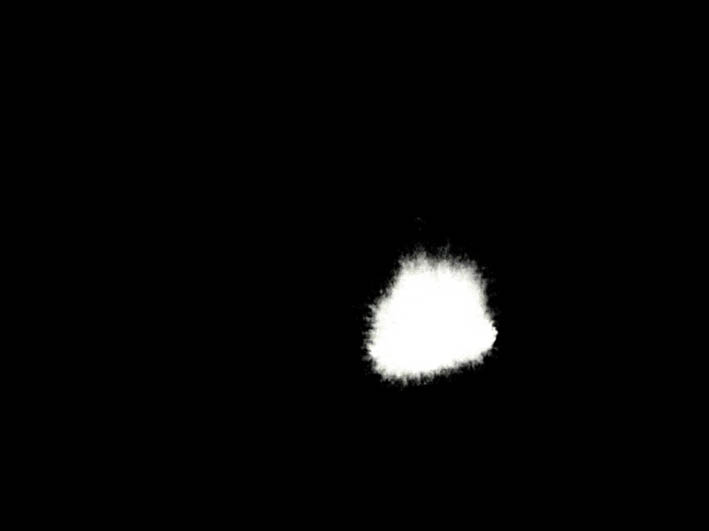
Wáng Bì 王弼 (226–249):
hànyǔ pīnyīn
道可道,非常道。
dào kě dào ,fēi cháng dào 。
名可名,非常名。
míng kě míng ,fēi cháng míng 。
無名天地之始。
wú míng tiān dì zhī shǐ 。
有名萬物之母。
yǒu míng wàn wù zhī mǔ 。
故常無欲以觀其妙。
gù cháng wú yù yǐ guān qí miào 。
常有欲以觀其徼。
cháng yǒu yù yǐ guān qí jiǎo 。
此兩者同出而異名﹐同謂之玄。
cǐ liǎng zhě tóng chū ér yì míng ﹐tóng wèi zhī xuán 。
玄之又玄,眾妙之門。
xuán zhī yòu xuán ,zhòng miào zhī mén 。
"The intellect ...
"does not want god inasmuch as he is God.
Why? Because, as such, he still carries a name.
And even if there were a thousand gods,
it would still break beyond:
it wants him where he has no name.
It wants something more noble, something better
than God as having a name."
Meister Eckhart's Mystical Philosophy.
Translation and commentary by Reiner Schürmann.
Lindisfarne Books, Great Barrington MA, 2001.
Lǎozĭ used the two meanings of Dào as a play on words, to introduce his "agnosticism" - here as the earliest overcoming of mythology in favor of a pure philosophy! - which, so early on, is only comparable to the Rigveda and to Protagoras!
01-06:
A Dào you can explain
is not the timeless Dào.
Concepts you can conceive
are not the timeless concepts.
World's beginning is inconceivable,
conceivable only as everything's origin.
Since "Dào" is a mere (auxiliary) designation for the unfathomable, that timeless transcendent primordial basis of all being and non-being, it cannot be explained in principle.
Accordingly, comprehensible concepts cannot be timeless for that unfathomable original beginning, because this ultimate original beginning of being from non-being and non-being from transcendent nothingness is unintelligible.
The Question of Being ("Why is something and not nothing?" - Leibniz et al.) remains timelessly metaphysical: the unfathomable can only be set as the origin of all forms of being (abstractions, things, events, living beings).
01-02 To explain means to situate in time and space, which is thus feasible with phenomena within our limited spacetime. Outside space and time, beyond the realm of reality, any claim to situate something ends up in the imaginary, inconceivably timeless abyss of absolute nothingness.
03-04 Correspondingly, within the subjective world of consciousness, the principle of naming as designation is suspended. Concepts of the inconceivable transcendence are vain un-words for imaginary timelessness; designations are only of use since the point at which nothingness emerged into any sort of beingness within spacetime.
05-06 Time started simultaneously as a projection of spacetime, hence time 'zero' is not understandable intellectually, but imaginable only as the primordial mother of ’every-thing’.
07-10:
Therefore: Without permanent desire,
contemplate its deep secret;
with permanent desire,
contemplate its limitations.
07-10 As long as our awareness is driven by desires, we perceive the surface and limitations of the phenomena of this mortal world; but when our consciousness is freed from desires, we behold and consciously perceive the subtleties and the mystery in the depths.
To adhere to the outline of the outer world lets us reveal the wonders of being; to be in harmony with the inner world of contemplation lets us illuminate the mystery of nothingness.
11-15:
These both emerge from one,
but differ in names:
together call them dark.
Darkness' even deeper darkness –
all mysteries' gate.
11-12 'Both of these' have been interpreted and referred to differently throughout the centuries, as:
[ Being & Nothingness (Buddhism),
[ beginning & mother [Wáng Bì]
[ with desire & without desire [et.al.],
[ nameless & named [v. Strauß],
[ mystery & limitations [h.a.]:
all those opposites bear different names, but emerge from out of the same origin: the great unity of opposites
13-15 Therefore, this unity may be called dark and obscure, profound and hidden, mysterious and mystical.
Dark as obscure and silent, made the beginning and that 'mother' arise: not 'defined' by Lǎozĭ, but merely 'designated' as the dark:
"The 'Dark' ... can not be designated as 'being thus' [and nothing else]. Should one designate it as 'being thus' [and nothing else], it would definitely [sic!] not be allowed to define it as one [specific] Dark.
Defining it as a [specific] dark, and nothing else, would be a definition, and that would be far off the mark. That is why Lǎozĭ says 'Dark and Dark-Again'." [Wáng Bì / Wagner 2003 p. 122-123].
The darkest of all darkness – this color of infinity; the last possible gate to 'Absolute Nothingness'... to the creative potential of transcendent Dào.
[
02 - The Unity of Opposites
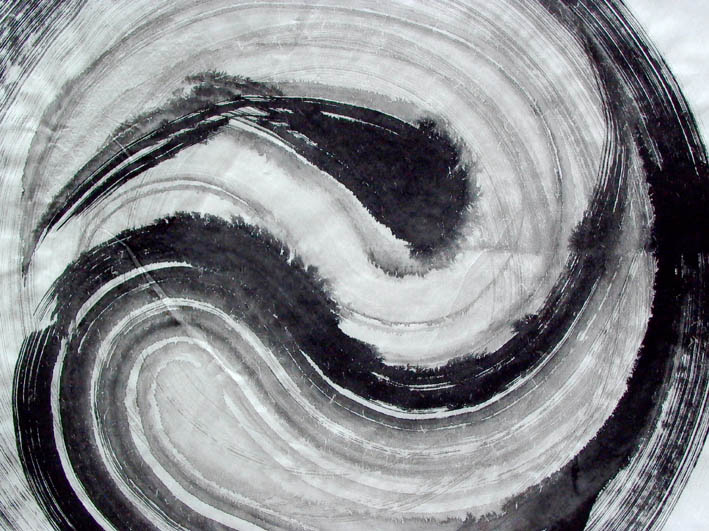
Wáng Bì 王弼 (226–249):
hànyǔ pīnyīn
天下皆知美之為美,斯惡已;
tiān xià jiē zhī měi zhī wéi měi ,sī è yǐ ;
皆知善之為善,斯不善已。
jiē zhī shàn zhī wéi shàn ,sī bú shàn yǐ 。
故有無相生,難易相成,
gù yǒu wú xiàng shēng ,nán yì xiàng chéng ,
長短相形,高下相傾,
zhǎng duǎn xiàng xíng ,gāo xià xiàng qīng ,
音聲相和,前後相隨。
yīn shēng xiàng hé ,qián hòu xiàng suí 。
是以聖人處無為之事,行不言之教。
shì yǐ shèng rén chù wú wéi zhī shì ,háng bú yán zhī jiāo 。
萬物作焉而不辭。生而不有,
wàn wù zuò yān ér bú cí 。shēng ér bú yǒu ,
為而不恃,功成而弗居。
wéi ér bú shì ,gōng chéng ér fú jū 。
夫唯弗居,是以不去。
fū wéi fú jū ,shì yǐ bú qù 。
Dào as the unity of all opposites is ultimately symbolized in the ancient Yin and Yang symbol 太極圖 Tài jí tú: flowing into each other in a complementary and dynamic fashion [.
01-02:
If everybody worldwide is aware of
beauty's acting as beauty,
then of ugliness, as well.
If everybody is aware of
goodness's acting as goodness,
then of the not good, as well.
01-02 This most basic natural law also shows its validity in the philosophical categories of esthetics and ethics: every human being becomes aware of how beauty and goodness, in their intuitive differences, simultaneously and inevitably create their own opposites: ugliness and evil.
03-08:
Therefore: Being and nothingness
mutually generate,
difficulty and easiness
complete each other;
length and shortness
mutually mould;
height and depth
lean towards each other;
sound and voice
mutually harmonize;
before and after
follow each other!
03-08 The same primordial principle, Heraclitus's enantiodromia – everything flows, changes and reversibly turns into its opposite – dominates the universe of reality, on the one hand, and the world of reality perception, on the other.
"Enjoying yourself and getting angry come out [thus] of the same door; therefore it is not possible to take up [only one of them] unilaterally. These six [pairs following the initial statement], they all bring out clear evidence that nothing in 'That-which-is-of-itself-what-it-is' 自然 can be taken up unilaterally" [* Wáng Bì / Wagner].
Rooted in the duality of being and nothingness ab initio, it must be just as true in the applied ontological levels of space and time, as well as for intellectual and emotional consciousness.
09-16:
Hence: Wise men stay
non-interfering in their affairs,
and practice teaching
without words.
Myriad creatures thus arise,
yet not declining;
they emerge,
yet not possessing;
they act,
yet not claiming.
They accomplish their tasks
without dwelling on it:
for just not dwelling on it,
so they do not vanish.
09-10 The fundamental Dàoist concept of 無為 wú wéi as effortless action is based on the principle of 自然 zì rán "of itself so", thus "naturally; spontaneously": in individual life as well as in governing a state.
Consequently, practicing Dào means interfering as little as possible in the harmony of Nature and her intrinsic, immanent power of self-regulation.
No intentional interference at all becomes damage prevention: effortless, doubtless, elegant – just as it is able to provide wordless teaching as an indiscernible model.
11-13 Accordingly, the disinterested impartiality and non-intervention of the sage allows the diversity of beings unceasingly to unfold.
Wordless teachers come forth to promote, not to own; their action without acting will never take any credit.
14-16 "It is exactly because that they do not install themselves [in these particular achievements] that they do not disappear." [*]: if they were only dependent on the Sage, they could not continue to exist.
Because of their selfless attitude, they fulfill their tasks, but they never dwell on it.
And just because they do not rest on their laurels, they will not fall into oblivion!
[
03 - Simplicity
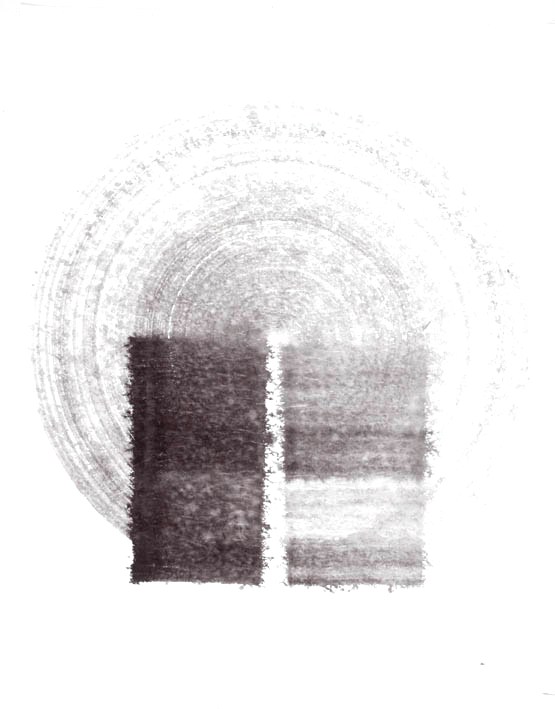
Wáng Bì 王弼 (226–249):
hànyǔ pīnyīn
不尚賢, 使民不爭。
bú shàng xián , shǐ mín bú zhēng 。
不貴難得之貨,使民不為盜。
bú guì nán dé zhī huò ,shǐ mín bú wéi dào 。
不見可欲,使民心不亂。
bú jiàn kě yù ,shǐ mín xīn bú luàn 。
是以聖人之治,虛其心,
shì yǐ shèng rén zhī zhì ,xū qí xīn ,
實其腹,弱其志,強其骨;
shí qí fù ,ruò qí zhì ,qiáng qí gǔ ;
常使民無知、無欲,
cháng shǐ mín wú zhī 、wú yù ,
使夫智者不敢為也。
shǐ fū zhì zhě bú gǎn wéi yě 。
為無為,則無不治。
wéi wú wéi ,zé wú bú zhì 。
[ The basic Dàoist principles are universal: they hold true for inanimate and animate systems, simple and complex forms of life, soulless beings and beings endowed with souls, and for individual and society.
[ In order to prepare the transfer of Dàoist insights onto the level of sagacious rulers, Lǎozĭ reveals the essential traps for the human heart: desire and covetousness.
01-06:
Not glorifying proficient ones
prevents people from competition.
Not overvaluing goods hard to obtain
let them not commit robbery.
Not to display desirable things
lets their hearts unconfused.
01-02 In reference to other people, this leads – as envy and jealousy or disguised as admiring and glorifying – to competition and the loss of the third of the Three Treasures in ch. 67.
Not exalting and glorifying the capable and honorable avoids the downward spiral of competition.
03-06 In reference to objects, rarity leads astray into robbery (ch. 53); wise men hide their treasures (ch. 70); wise leaders, their wealth and weaponry.
07-11:
Therefore, wise men's governing will ...
alleviate their desires,
satisfy their needs,
dampen their hearts,
strengthen their core.
07-11 Therefore, wise rulers, as role models, avoid all extravagance, exaggeration and excess (ch. 29), to dampen the people's desires, and to allay their hearts [ambition], but to strengthen the core of body and mind, and to foster their Inner Power.
"He empties [that which] has knowledge* [the heart] and fills [that which] has no knowledge [the belly]. Bones are without ambition and therefore strong. Ambitions create incidents and therefore lead to chaos. [In this manner] he permanently prompts the people to be without knowledge and desires." [* Wáng Bì / Wagner].
* "'Those who have knowledge' refers to those who have knowledge about [how to] act. If [they] engage non-interference, there will be nothing that is not well-ordered.” [Ditto for those who have desires]. [*].
12-15:
Constantly, they let people
without cunning and desire,
let those with knowledge
not dare to interfere.
To act without interfering
leaves nothing undone.
12-13 Competition gives birth to cunning – wise leaders always prevent such misuse of pure knowledge.
They do not let superior people dare to abuse the inferior ones – by interfering in the spontaneous self-regulating of social systems.
14-15 Non-interference means acting without acting: sagacious rulers trust in the fundamental Dàoist concept of 無為 wú wéi (ch. 02) as the effortless way to let nothing undone.
[
04 - Inscrutability
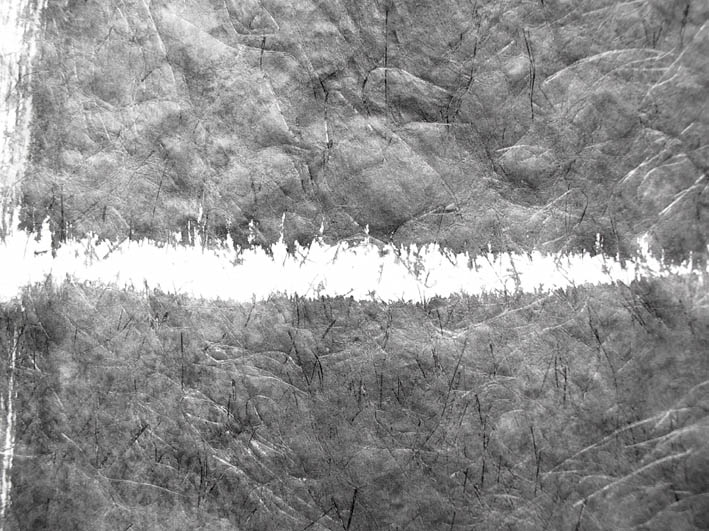
Wáng Bì 王弼 (226–249):
hànyǔ pīnyīn
道沖而用之或不盈。
dào chòng ér yòng zhī huò bú yíng 。
淵兮似萬物之宗。
yuān xī sì wàn wù zhī zōng 。
挫其銳解其紛,和其光,
cuò qí ruì jiě qí fēn ,hé qí guāng ,
同其塵,湛兮似或存。
tóng qí chén ,zhàn xī sì huò cún 。
吾不知誰之子,象帝之先。
wú bú zhī shuí zhī zǐ ,xiàng dì zhī xiān 。
[ "Dào is described as a paradoxical polarity: It stands for the emptiness of infinite potentiality." [Simon].
[ The transcendental part of Dào that goes beyond the border of singularity, Nothingness, means at the same "time" the ultimate potentiality.
01-04:
Dào: like pouring out, however, in use,
likely not to fill.
Abysmally deep, oh,
seemingly all beings' prime cause.
01-02 As the vacuum within the existing universe is already a plethora of virtual shortest-term beings, the creative emptiness in the imaginary realm of nothingness is all the more so infinitely overflowing.
Yet this formless void is never to be "filled" or to exhaust – wisely yearning for “time-wise” being.
03-04 The primordial breaking of the symmetry of the grand unity of being and non-being emerged from the purest potentiality.
Seeming absolutely inconceivable in its profundity, all being's prime cause is designated by all creatures as the most ancient ancestor: "time-wisely" yearning for timeless non-being.
05-08:
It blunts their sharpness,
dissolves their entanglement,
softens their glare,
becomes one with their dust.
05-08 Borrowed from ch. 56:
[ The balancing and redeeming essential characteristic of Dào – now in its immanent part – is elucidated by four illustrations.
[ Sharpness, entanglement, shine, and 'non-Oneness' are relieved by the gentleness of Dào: little by little, towards the originally unbroken symmetry.
[ At the end of the day of days, all created beings are released into oneness with their earthly dust; all objects, with their star dust.
This identification of Dào even with the dust of created beings was noted as being similar to the Christian idea of the synthesis of creator and created [v. Strauß 1870 p. 25].
09-12:
Concealed, oh,
it seems to 'exist' as pure possibility.
Whose child it be? I do not know:
evidently the prelude to the 'Lord' of Heaven!
09-10 The potentiality of Nothingness is already dreaming of the possibility of Something.
11-12 In the Dàodéjīng, 帝 dì, the 'Lord (of Heaven)', is mentioned only here: even this once highest god is reduced by Dào as its precursor.
The child looks for its ancestry: agnostic honesty worships the nameless, 'time-less', inconceivable Dào, the heavenly prelude to all 'created' (conceived) creators.
[
05 - Creative Emptiness
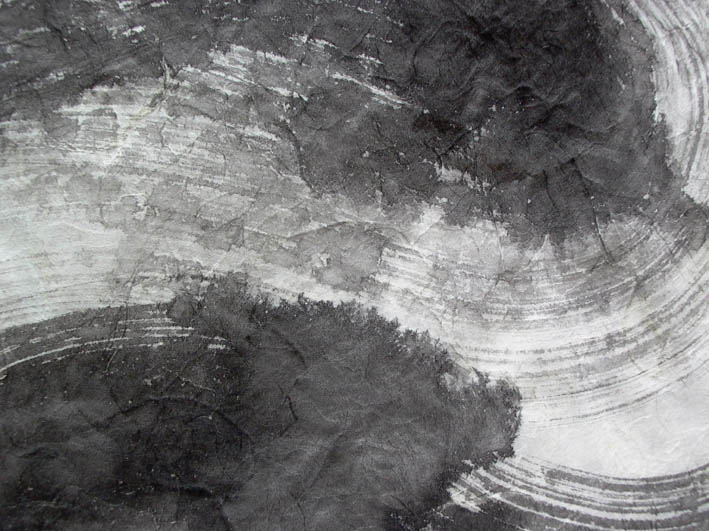
Wáng Bì 王弼 (226–249):
hànyǔ pīnyīn
天地不仁,以萬物為芻狗。
tiān dì bú rén ,yǐ wàn wù wéi zōu gǒu 。
聖人不仁,以百姓為芻狗。
shèng rén bú rén ,yǐ bǎi xìng wéi zōu gǒu 。
天地之間,其猶橐籥乎﹖
tiān dì zhī jiān ,qí yóu tuó yào hū ﹖
虛而不屈,動而愈出。
xū ér bú qū ,dòng ér yù chū 。
多言數窮,不如守中。
duō yán shù qióng ,bú rú shǒu zhōng 。
As a rule for social compatibility, Confucius's (孔夫子 Kǒng fū zǐ) humaneness (仁rén) is anthropocentric, hence biased, and not as universal as the Dào.
Mother Nature operates above all human claim of exceptionalism.
01-04:
Heaven and Earth are not 'humane' –
for all creatures are regarded as
straw dogs to sacrifice.
Neither are wise rulers 'humane' –
for all people are similarly regarded as
straw dogs to sacrifice.
01-04 At the end of their days... all creatures' temporary existence will be sacrificed like ritual straw dogs (sumptuously decorated, then carelessly thrown away) - for the higher idea of evolution: unbiased, impartial (ch. 79) vis-à-vis 'every-thing', and, to this extent, not "humane".
With "... Pity and interference, the entities would not persist in their entirety [because this pity and interference would be partial and prefer some over others]. If the entities would not persist in their entirety, then [Heaven and Earth] would fail to completely take care of [all of the entities]." [Wáng Bì / Wagner]
The sages live the Dào as Dé, before both are lost to humanity (ch. 18, 38), thus embodying the universal integrity of the Dào: as a role-model for an all-embracing ruler without any nepotism.
05-08:
Heaven and Earth – their interspace
resembles the bellows:
empty, and yet not collapsing:
in motion generating all the more.
Bellows or 'Drum or Flute': "...drum and flute are empty and hollow. [The flute] has no feelings [of its own to prefer one sound over the other]. [The drum] has no activity [of its own to create this resonance rather than another]."
Both, drum and flute, are inexhaustible, and so the space between Heaven and Earth is inexhaustible; keeping to the middle, they "discard their selves and put themselves at the service of other entities so that there is none that is not well-ordered." [*].
Being is born from Nothingness (ch. 40), that voluptuous, creative void.
05-08 [scholion]. There are more things in Heaven and Earth... [Hamlet I, 5], because of the inexhaustible driving force of the empty space between them: creatively fluctuating, but never collapsing – while forging our fate.
Once in motion, the perpetuum mobile of the Dào, symbolized as the bellows of Nature, will nurture and care for all entities continuously.
09-10:
Many words frequently exhaust themselves;
not just as if keeping your center.
Proverbial wisdom in rhyme:
窮 qióng + 中 zhōng, which recall Wittgenstein's "Where-of one cannot speak, thereof one must be silent." ["Wovon man nicht sprechen kann, darüber man man schweigen.", transl. by Ogden].
09-10 From the self-limiting of the surface to the depths of contemplation (ch. 1), the network of words must be exchanged for the sound of silence, the perplexity of the periphery for the security of the center.
Let go and find.
[
06 - The Mystical Female
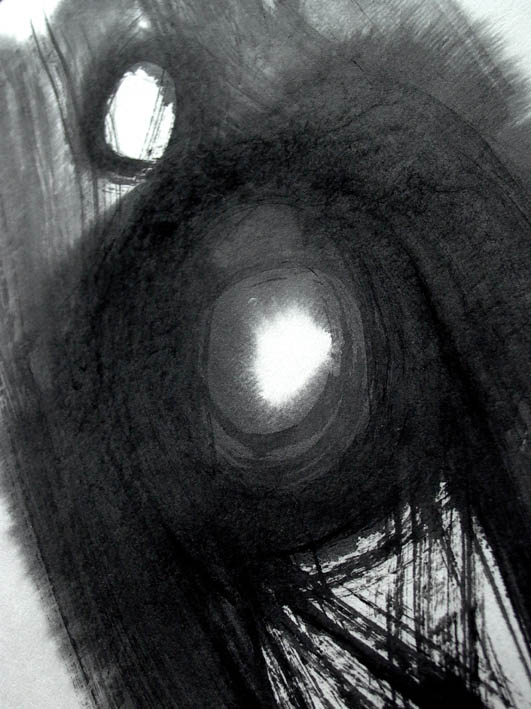
Wáng Bì 王弼 (226–249):
hànyǔ pīnyīn
谷神不死是謂玄牝。
gǔ shén bú sǐ shì wèi xuán pìn 。
玄牝之門是謂天地根。
xuán pìn zhī mén shì wèi tiān dì gēn 。
綿綿若存,用之不勤。
mián mián ruò cún ,yòng zhī bú qín 。
[ Mentioned in 列子 Lièzǐ (~ 440-360) as pre-Lǎozĭ rhymed (aa bbbb) teaching, going back to the 'Yellow Emperor'.
[ Alternative interpretation: life-prolonging breathing techniques by 河上公 Héshàng Gōng – ridiculed by 庄子 Zhuāngzǐ (~ 365-290) in ch. XV.
01-06
The spirit of the valley is immortal:
called the dark female...
Mystic female's gate –
called Heaven's and Earth's root:
intangible, though seemingly existing –
inexhaustible its use.
01 "The 'Spirit of the valley' is the non-valley in the middle of the valley" [王弼 Wáng Bì / Wagner, 2000, 210].
The Spirit (ch. 29) of the valley (ch. 39.04-05) is form- and motionless, passive-low (ch. 66, 32; 28) – as the empty middle surrounded by fullness (ch. 11, 5), calm as the highest entity.
This Yin perspective of the Dào is like a riverbed that flows out endlessly and whose flowing into being will never run dry.
02 Called (謂), but not defined (名) as, mysterious, dark (~Heaven) and female (~Earth): the transcendent, nameless, inexhaustible Dào, once it has passed through the birth canal of the Gate, becomes womb and nurturing mother of ‘every-thing’.
03-04 That mystic gate of the feminine (ch. 1) – between Beginning and Mother, gives life to Yin and Yang as the basis of all entities, also called the root (source and origin; ch. 16) of Heaven and Earth.
05-06 Intangible: Dào is immaterial and inconceivable, but, nonetheless, just as if existing: ... like a (never-ending) silken string, if one wishes that it is there, it does not show its form, if one wishes that it is not there, all entities indeed come into being by virtue of it.
Inexhaustible: no entity is not completed by it, but while being used, Dào always gives effortlessly.
[
07 - Everlasting unselfishness
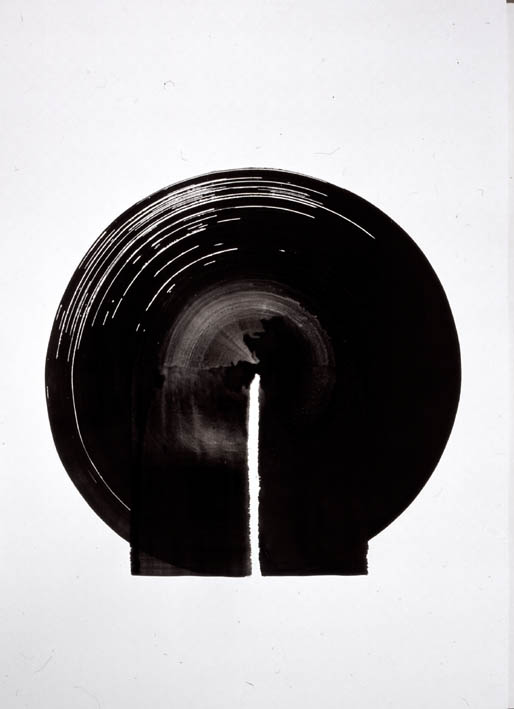
Wáng Bì 王弼 (226–249):
hànyǔ pīnyīn
天長地久。
tiān zhǎng dì jiǔ 。
天地所以能長且久者,
tiān dì suǒ yǐ néng zhǎng qiě jiǔ zhě ,
以其不自生,故能長生。
yǐ qí bú zì shēng ,gù néng zhǎng shēng 。
是以聖人後其身而身先,
shì yǐ shèng rén hòu qí shēn ér shēn xiān ,
外其身而身存。
wài qí shēn ér shēn cún 。
非以其無私邪!故能成其私
fēi yǐ qí wú sī xié !gù néng chéng qí sī
Only Dào is timeless.
Humility preserves, frugality fulfills.
01-04:
Heaven seems constant,
Earth seems enduring.
Therefore Heaven and Earth
can be constant and stable:
because they do not persist for themselves,
hence they can exist constantly.
01 "Heaven 'excels', Earth persists ... Should they live for their own interests, they would struggle with [other] entities. As they do not live for their own interests, the [other] entities relate back to them." [王弼 Wáng Bì / Wagner].
Hence, after having passed the Gate to non-nothingness, Dào is everywhere between Heaven and Earth unconditionally constant and enduring.
02 Still following the spirit of Dào, all world has the capacity (Dé) of being constant and enduring.
Hereby Heaven and Earth obey the laws of Nature, which in turn follow the model of Dào, touching its timelessness.
03-04 Dào is not selfish (ch. 2, 13, 19, 22, 26) and it acts without making demands (ch. 2, 34).
Accordingly, Heaven and Earth do not follow any purposes of their own, they do not "live" for themselves, and therefore they are able to persist and to be called "long-lived".
05-10:
Hence: Wise men
put last their own person,
and yet are they themselves ahead;
they renounce their self-concerns,
and yet is their person preserved.
Is that not, because
they have no self-interests?
Thus, they can fulfill
their private aims.
05-08 Wise men emulate Nature's unselfish, impartial, and unbiased Way.
Accordingly, they put their selves last, they pay no heed to their own interests and relinquish their own persons.
Yet the "motherly" paradox of Dào's acting without acting leads the sages ahead of all others and lets their persons be preserved.
09-10 Lǎozĭ's rhetorical question aims at aimless self-forgetfulness as the crucial trait of the sage’s nature.
In the end, he emphasizes just this quality as being essential to allowing them, paradoxically, to fulfill their own interests and to accomplish their personal aims.
V. Strauß compares that with "So the last will be first, and the first will be last." [Matthew, 20:16] and "And whosoever shall exalt himself shall be abased; and he that shall humble himself shall be exalted." [Matthew 23:12], in Nietzsche's version: "...and he that shall humble himself intends to be exalted."
[
08 - Flexibility without competition
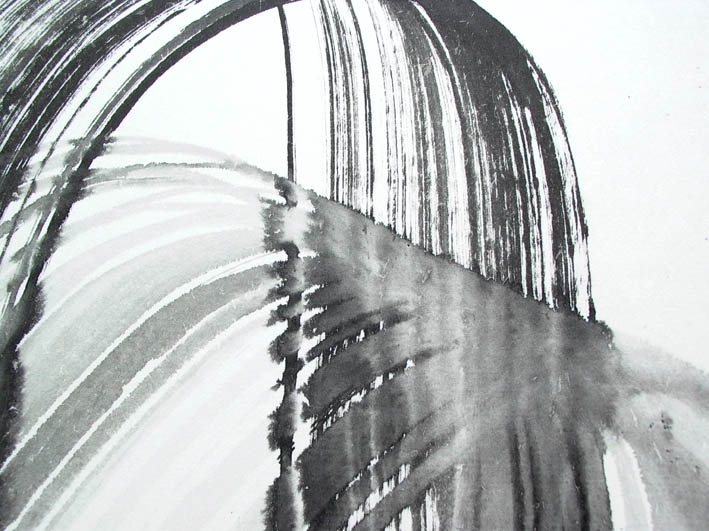
Wáng Bì 王弼 (226–249):
hànyǔ pīnyīn
上善若水。
shàng shàn ruò shuǐ 。
水善利萬物而不爭,
shuǐ shàn lì wàn wù ér bú zhēng ,
處眾人之所惡,故幾於道。
chù zhòng rén zhī suǒ è ,gù jǐ yú dào 。
居善地,心善淵與善仁,
jū shàn dì ,xīn shàn yuān yǔ shàn rén ,
言善信,正善治,
yán shàn xìn ,zhèng shàn zhì ,
事善能,動善時。
shì shàn néng ,dòng shàn shí 。
夫唯不爭,故無尤
fū wéi bú zhēng ,gù wú yóu
Dào - The Water Course [A. Watts].
01-05:
Supreme goodness is like water:
its goodness benefits all creatures –
yet without competing.
It dwells in places which everyone disdains –
hence, close to Dào.
01 Both the highest goodness and wise men (and rulers) who have reached the supreme goodness are symbolized by water: its yielding quality and adaptability, its readiness and unselfishness.
"The others abhor low [positions]" ... water is "close to", not identical with the Way, because it embodies an entity. [*王弼 Wáng Bì / Wagner].
'Close to' means here both 'similar' and 'nearby'; maybe the Old Master did this intentionally [v. Strauß 1870 p. 39].
02-03 Just as water is vital for the myriad of life forms, inconspicuous and unobtrusive goodness represents the ethical essence of wise rulers for all subjects.
For both, water and guidance, the intrinsic core of cooperativeness is inalienable: ever to meet, never to compete.
04-05 Indispensable too, both for the symbol of water and the supreme goodness of impartial governing, is the unrestricted readiness and availability to flow everywhere: also and especially into the lowest, most unattractive places, which any spirit of competition would disdain.
This is the Way... to attain nearness to Dào.
06-12:
Goodness:
In dwelling – low places,
in heart-mind – depth,
in giving – humaneness,
in conversation – sincerity,
in administration – order,
in business – competence,
in acting – timeliness.
Wise men's goodness follows the course of water.
The philosophical foundation and general principles of goodness – as unlimited flow and all-governing rule near to Dào! – are now to be elucidated by seven practical implementations as follows:
06-12 Goodness:
[ Good dwelling does not eschew low places; wise leaders live in lowliness and thereby ground their inner authority.
[ To a humble heart, goodness gives depth; to a mindful mind, profundity.
[ Good giving is cooperative, and, to this extent, humane and on an equal footing.
[ Goodness in talking is based on being sincere and truthful.
[ Good administration is done in a silent way: 'regulation without regimentation'.
[ Good business practices are premised on honest competence and select expertise.
[ The quality of acting requires timeliness, spontaneous actuation is based on a good sense of timing.
13-14:
For only no competing,
hence no resentment.
13-14 The rule of rules, not to enter into competition, is indispensable:
[ cooperation instead of competition,
[ open-mindedness instead of discrimination,
[ common good instead of individual advantage,
"This means that water corresponds in all these qualities to this Way." [*].
They constitute the spiritual framework: for a realm without rancor, for a resort without resentment.
[
09 - Letting Go
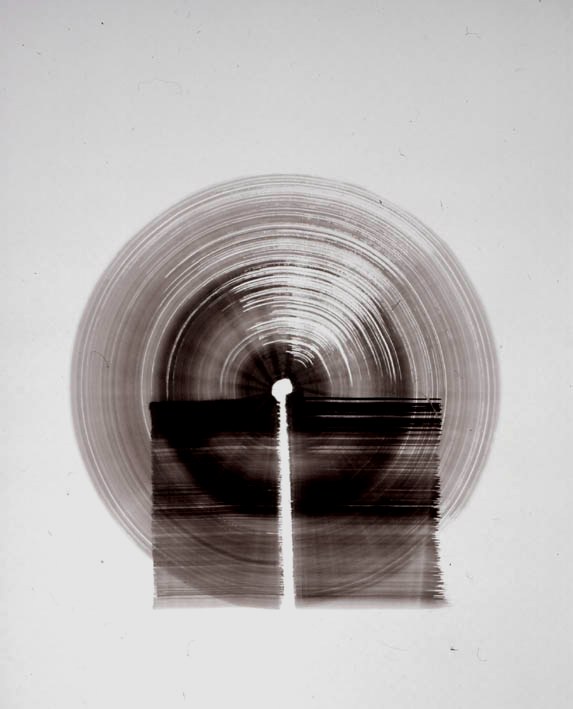
Wáng Bì 王弼 (226–249):
hànyǔ pīnyīn
持而盈之不如其己;
chí ér yíng zhī bú rú qí jǐ ;
揣而銳之不可長保;
chuāi ér ruì zhī bú kě zhǎng bǎo ;
金玉滿堂莫之能守;
jīn yù mǎn táng mò zhī néng shǒu ;
富貴而驕,自遺其咎。
fù guì ér jiāo ,zì yí qí jiù 。
功遂身退,天之道。
gōng suí shēn tuì ,tiān zhī dào 。
In light of the cyclical dance of the Yin Yang duality in all Nature, human attempts to maximize ways and means constitute short-lived episodes, which are doomed to fail.
01-04:
Maintaining and also overdoing things –
not as good as letting them end.
Polishing while sharpening –
cannot protect for long!
01-02 To hold a vessel with both hands and to fill it to the brim, to preserve something and to overdo it, to use something and to overstretch it at the same time – better to let it be.
"'To maintain' refers to [what in Lǎozĭ 38 is called] 'not to let go of the receipt / capacity.' If [he] already does let go of this capacity, but still adds on to it, [this results in] a situation where there is an unavoidable danger of being toppled." [*王弼 Wáng Bì / Wagner].
03-04 To polish and to grind a blade, to temper and to over-sharpen a double-edged sword – the path of perfection will not protect for long.
"If one has already polished the tip [of a sword] so that it becomes pointed, and grinds it in addition so that it becomes sharp, a situation [arises] where it is unavoidable that one will suffer a defeat." [*].
05-08:
Nobody can guard palaces
filled with gold and jade.
Wealthy and honored, yet haughty –
self-surrendering one's calamity.
After some useful equipment in war and peace, now wealth and fame get clarified:
05-06 Never display your treasures: precious things in palaces cannot be preserved for long... not as good as having nothing.
07-08 Also never display your merits: like wealth, also fame and honor are often linked to haughty arrogance.
This will bring calamity and disaster upon you – pride comes before the fall.
09-10:
Retreat after your work is done:
the Way of Nature.
Dào as Mother of every-thing is also method, process, procedure – as the Way of Heaven, as the Way of Nature.
09-10 When the task is accomplished, the work completed...
[ The Way of Dào demonstrates to a wise ruler how hereafter to withdraw oneself: Dào goes back to its invisible origin.
[ "The four seasons alternate, when the task [of one of them] is completed, there is a change [to the next one]." [*].
[ Both sages and wise leaders also return to their point of departure – and to the next phase in the everlasting cycle.
[
10 - Purity and Modesty
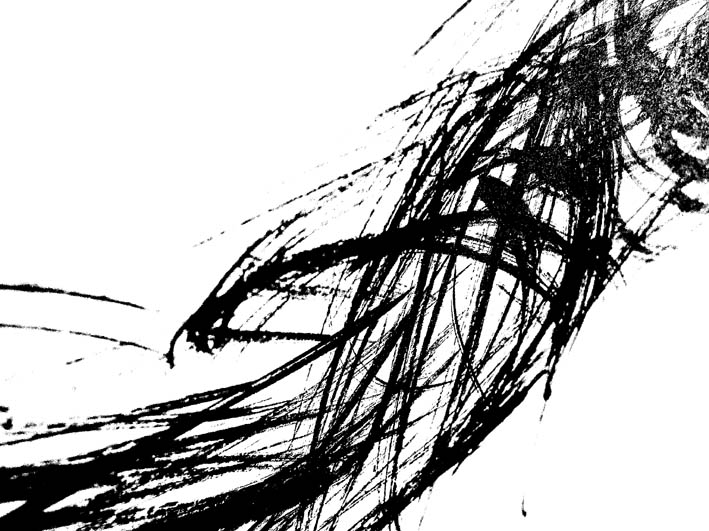
Wáng Bì 王弼 (226–249):
hànyǔ pīnyīn
載營魄抱一,能無離乎﹖
zǎi yíng pò bào yī ,néng wú lí hū ﹖
專氣致柔,能如嬰兒乎﹖
zhuān qì zhì róu ,néng rú yīng ér hū ﹖
滌除玄覽,能無疵乎﹖
dí chú xuán lǎn ,néng wú cī hū ﹖
愛國治民,能無為乎﹖
ài guó zhì mín ,néng wú wéi hū ﹖
天門開闔,能為雌乎﹖
tiān mén kāi hé ,néng wéi cí hū ﹖
明白四達,能無知乎。
míng bái sì dá ,néng wú zhī hū 。
生之,畜之,生而不有;
shēng zhī ,chù zhī ,shēng ér bú yǒu ;
為而不恃;長而不宰,
wéi ér bú shì ;zhǎng ér bú zǎi ,
是謂玄德。
shì wèi xuán dé 。
The statements "!" / questions "?" in 01-12, which demand a "yes", were called Dàoist Hymn [Waley] or catechism [Schwarz].
01-06:
Preserve spirit and soul, keep their unity,
can you be unsplit, indeed?
Focus your vital energy, reach suppleness,
can you be like a newborn child, indeed?
Wash away your dark visions,
can you be immaculate, indeed?
The lines 01-06 are focussed on individual self-improvement:
01-02 The general Dàoist principle of "Unity of Opposites" is here applied to the Spiritual soul of Yang (breathing / exercises, consciousness) and the Bodily soul of Yin (blood / circulation, perception) – and to how to combine both forces into undivided Oneness, into the Flow of Dào that lives in Dé.
Hence, Lǎozĭ seems to distinguish 營 yǐng the “spiritual soul” and 魄 bō the "mortal soul", which is attached to the body, in a manner similar to Aristotle's ψυχή and νοῦς [v. Strauß 1870 p. 46].
03-04 Focusing on the 氣 Qì (ch. 42), as liaison of both souls, allows the necessary yielding quality and suppleness of a newborn to be achieved (ch. 10, 28, 41); it preserves the abundance of its Inner Power (ch. 55), being reminiscent of the Upanishads ("The Brahmin should quit learning and become like a child."), and, later on, 耶穌 Yē sū.
05-06 Spotlessly cleansing the inner mirror of consciousness from dark visions can be accomplished: by being free of desires (ch. 1), by contemplating the blessings of nothingness (ch. 11, 14, 48), by making what is murky clear thanks to the circumspection of silence, and by creating serenity thanks to the circumspection of enduring movement (ch. 15).
07-12:
To love the people, to guide the country:
can you do that without cunning, indeed?
Like Heaven’s Gate opens and closes –
can you act in that female-passive way, indeed?
To reach an all-around understanding:
can you do it without cunning, indeed?
The lines 07-12 aim at supra-individual conclusions, mainly for the ruler of the state:
07-08 If the abovementioned individual ethical qualities are represented in the spirit and soul of the ruler, he will lead by way of disinterested love 愛 ài for the people, by way of non-interfering action without cunning, guidance without ruse.
09-10 According to a dark myth of creation [Wilhelm, 1910; Trauzettel, 1999], Heaven's Gates transform Dào's transcendent state of nothingness into 'every-thing' by constantly opening and closing "as phases of order and chaos, with pervasive effects on all under Heaven". [Wáng Bì 王弼].
Later on, Religious Dàoism chose the alternative, concrete meaning of nostrils, to underline their breathing techniques.
All changes and effects of Heaven's Gates are accomplished in a female way, not leading, but adapting spontaneously: like a hen is responsively caring for all, but not leading or actively interfering. Thus also a ruler, following this female principle, will enjoy subjects that follow him of their own accord.
11-12 A leader can achieve a deep and comprehensive understanding, without deception and delusion, without ruse or political cunning, because he has no personal interest.
Cf. ch. 37: "The Eternal of the Way is without interference. ... If dukes and kings were only able to hold on to [the Eternal of the Way], the ten thousand kinds of entities would change [for the better] of their own accord." [*].
13-17:
Creating and caring;
producing, yet not possessing;
dealing, yet not depending on;
conducting, yet not commanding –
this is called deep Inner Power.
13-16 Dé, the reification of Dào as Inner Power, or "subjective objectification"(!), comprises creating and caring for aspects of Dào:
[ of Nature (creating, not possessing),
[ of Humans (bringing about, not building on),
[ of the Earth (leading, not commanding).
17 After "Creating and caring" identical with ch. 51, 15-18!
[
11 - Creative Nothingness
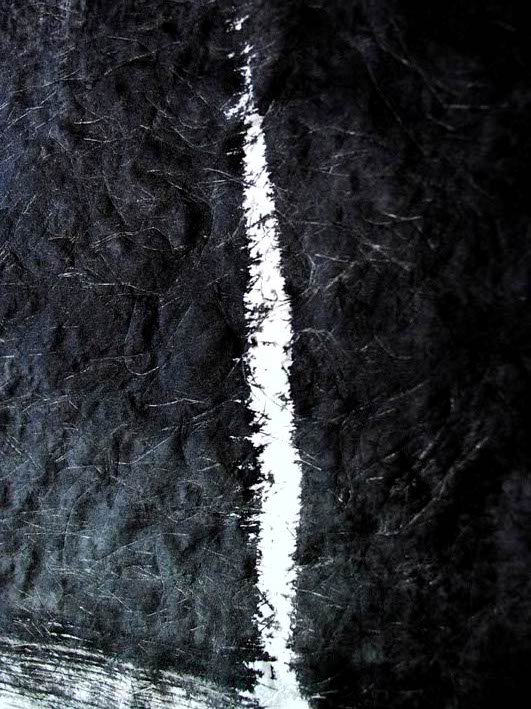
Wáng Bì 王弼 (226–249):
hànyǔ pīnyīn
三十幅共一轂,
sān shí fú gòng yī gū ,
當其無,有車之用。
dāng qí wú ,yǒu chē zhī yòng 。
埏埴以為器,
shān zhí yǐ wéi qì ,
當其無,有器之用。
dāng qí wú ,yǒu qì zhī yòng 。
鑿戶牖以為室,
záo hù yǒu yǐ wéi shì ,
當其無,有室之用。
dāng qí wú ,yǒu shì zhī yòng 。
故有之以為利,
gù yǒu zhī yǐ wéi lì ,
無之以為用。
wú zhī yǐ wéi yòng 。
In Western thought Being tends to dominate Non-Being: Being, in naive perception, as ontological bedrock, Non-Being as mere absence – as a placeholder... with echoes of the atom and void of Democritus.
In Chinese thinking, 無 wú and 有 yǒu have equal rights, they are complementary "twins", the present of something and of nothing (ch. 02, 04, 05, 14, 40, 43).
01-02:
Thirty spokes join on one hub:
just its non-being
is the chariot's usability.
01-02 The first of Lǎozĭ's three wisely chosen parables compares the thirty (= days of a month) spokes, oriented to and sharing the single hub in the center:
Matter changes into form, form becomes essence and purpose, condenses into nothingness as meaningful and useful void.
03-04:
Mould clay, so to form a vessel:
equally its non-being
is the vessel's usability.
03-04 The second example of a useless lump of clay, which is shaped into a useful vessel, is as fundamental as it is striking: only emptiness can be filled and fulfilled!
In "The Thing", Heidegger used Lǎozĭ's parable, oddly enough without mentioning the source, even though he did not hide his admiration for this ultimate profundity. His jug’s thingness is in fact the void inside it: shaping the void means to shape the jug. “The empty space, this nothing of the jug, is what the jug is as a holding vessel.” [Philosophy of Technology, 2th lecture].
05-06:
Chisel out doors and windows,
accordingly form a living space:
equally its non-being
is the room's usability.
05-06 The third elucidation of doors and windows in a house re-emphasizes the Yin function of 'no-thingness' inside the Yang basis of being.
No windows – no light, no life. No doors – a prison, a tomb. Nothingness gives and maintains life.
07-08:
Therefore: Being effects
accordingly advantages,
Non-being accordingly effects usability.
07-08 The Unity of opposites inside the world of things (Chang, Tsung-Tung, 1982) having now been illuminated three times, Lǎozĭ highlights the essential characteristics of the ontological siblings, sister Yin and brother Yang: usability and advantage.
[ "The three [wheel, vessel, room] are made from wood, clay, and mortar, respectively, but all [depend] on negativity for their usability. This [Laozi statement] means: Entities in order to be beneficial all depend on negativity for their usability." [Wáng Bì 王弼 / Wagner].
[ The 'void element' is "capable, being itself the minimum, to control the many..." [*].
[ The benefits of Being and the functionality of Non-Being flow into each other, building an ontological unity of Quantity and Quality.
"For all must fall into nothingness,
If it wants to persist in Beingness."
("One and All", Goethe).
[
12 - Unaddicted Harmony
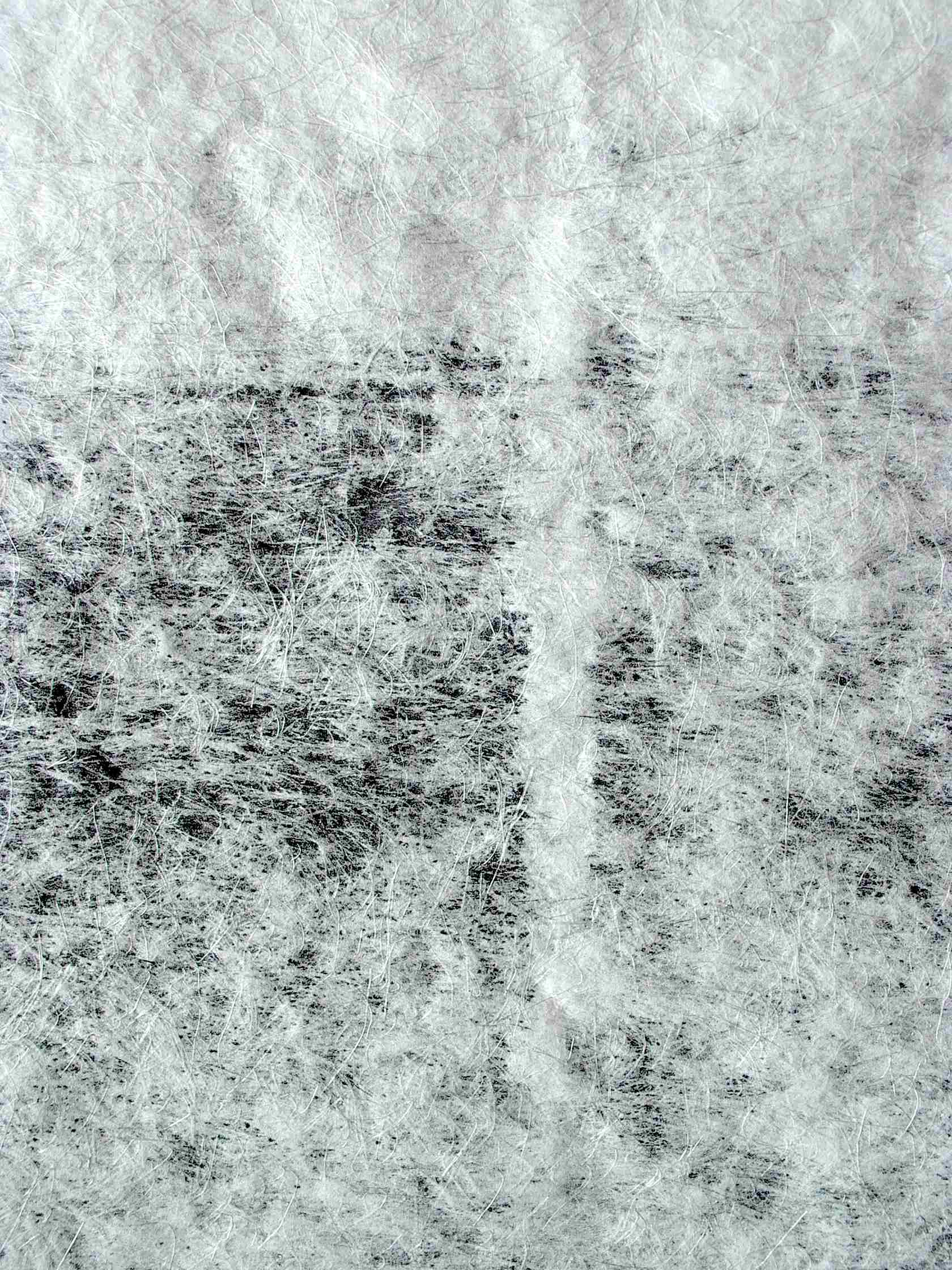
Wáng Bì 王弼 (226–249):
hànyǔ pīnyīn
五色令人目盲,
wǔ sè lìng rén mù máng ,
五音令人耳聾,
wǔ yīn lìng rén ěr lóng ,
五味令人口爽,
wǔ wèi lìng rén kǒu shuǎng ,
馳騁畋獵令人心發狂,
chí chěng tián liè lìng rén xīn fā kuáng ,
難得之貨令人行妨。
nán dé zhī huò lìng rén háng fáng 。
是以聖人,為腹不為目,
shì yǐ shèng rén ,wéi fù bú wéi mù ,
故去彼取此。
gù qù bǐ qǔ cǐ 。
[ In ch. 1 sensuality and spirituality were juxtaposed in complementary fashion, with regards to the perception of limiting or mysteries, surface or profundity.
[ Here, Lǎozĭ philosophically counterposes natural needs of human beings and pursuit of pleasure as harmful exaggerations of desire.
01-03:
Too many colors
blind the human eye;
too many tones
deafen the human ear;
too many flavors
dull the human taste.
01-03 Too many...
[ The concrete five colors – in ancient China blue(-green), yellow, red, white, and black – are the optical example of menacing sensory overload, threatening sensory and inner blindness.
[ The five sounds or notes of the old Chinese scale – prime, major second, major third, fifth, and major sixth, lead, as concrete acoustical illustration, in case of exorbitance to deafness and tin ear...
[ The five tastes or flavors – salty, bitter, sour, spicy, and sweet – when overused due to greed, make our mouth numb and lead to 'aberrations in taste'.
04-07:
Horse racing and battue hunting
let the human heart go mad,
goods hard to obtain
let block the human unfolding.
After three kinds of senses, Lǎozĭ adds two perils of passion:
04-05 Racings and raptures make the human heart confused, fever and fervor drive the human mind to madness.
06-07 "Goods that are hard to get block man's correct path. In that sense they 'block man's actions'." [Wáng Bì 王弼 / Wagner].
Treasuring rare goods (ch. 03), commerce and money (ch. 53), chasing after costly things – all that will inhibit the inner maturation and block the path.
08-10:
So wise men:
care for needs,
not for desires;
hence, they reject this
and choose that.
08-10 A wise ruler..
[ firstly cares for the elementary needs of all subjects before sophisticated desires, for the stomach, not the insatiable eye:
[ "'He who is for the belly' feeds his own person with other things. 'He who is for the eye' puts himself into service [of other things] with his eye. Therefore the Sage is not for the eye." [*].
[ The sage avoids all greed for profits (ch. 46), he rejects avarice and avidity, and instead he chooses to lose daily, to win the Dé of Dào.
[
13 - Autonomous Self-Esteem
Wáng Bì 王弼 (226–249):
hànyǔ pīnyīn
寵辱若驚,貴大患若身。
chǒng rǔ ruò jīng ,guì dà huàn ruò shēn 。
何謂寵辱若驚﹖
hé wèi chǒng rǔ ruò jīng ﹖
寵為下。
chǒng wéi xià 。
得之若驚失之若驚
dé zhī ruò jīng shī zhī ruò jīng
是謂寵辱若驚。
shì wèi chǒng rǔ ruò jīng 。
何謂貴大患若身﹖
hé wèi guì dà huàn ruò shēn ﹖
吾所以有大患者,
wú suǒ yǐ yǒu dà huàn zhě ,
為吾有身,及吾無身,
wéi wú yǒu shēn ,jí wú wú shēn ,
吾有何患?
wú yǒu hé huàn ?
故貴以身為天下,若可寄天下。
gù guì yǐ shēn wéi tiān xià ,ruò kě jì tiān xià 。
愛以身為天下,若可託天下。
ài yǐ shēn wéi tiān xià ,ruò kě tuō tiān xià 。
Human beings possess self-consciousness, therefore they act self-referentially; Lǎozĭ reveals this as crucial for people's value system.
01-02:
Favor and disfavor
frighten equally,
honors are big worries
similar to our selfness.
01 Favour and disfavour are unstable and can change into each other.
02 Being in a high social position is a disaster – for the leader's person and his selfhood.
03-07:
What is meant by: 'Favor and disfavor
frighten equally'?
Favour works degrading –
it is like frightening to attain it,
it is equally frightening to lose it –
that is meant by: 'Favor and disfavor
frighten equally'.
03-07 Surprising new considerations raise questions here – and look for answers to them:
"Where there is favor there necessarily is disgrace. Favor and disgrace are equal. If those below receive favor and disgrace, [equally] startling, then they will not be in a position to bring chaos to the empire." [*Wáng Bì 王弼 / Wagner].
A wise ruler, impartial, and acting without interference, will avoid both, favour and disfavour to spare his subjects any humiliating and embarrassment, when they sooner or later will obtain or lose them. That's why!
08-11:
What is meant by: "Honors are big worries
similar to our selfness"?
I thereby have big worries
because I am selfish.
If I reached selflessness, which worries
would I still have?
08-11 The second question, following the second statement above, focuses on honor and its own antagonist, the disaster of dishonor:
"Where there is splendor, there necessarily is disaster. Splendor and disaster amount to the same. If those below receive splendor and disaster as [equally] startling, then they will not be in a position to bring chaos to the empire." [*].
Worries will be inevitable as long as the leader's person and personality suffer – as painfully as the body can suffer – from selfness, always risking self-referentiality or even selfishness.
So, to avoid any worries, the Sage follows Lǎozĭ's advice in ch. 7: "they renounce their self-concerns, and yet is their person preserved."
12-15:
Therefore, they who appreciate to act
with their selfness for all world,
seemingly to them
one can give the world;
who love to act
with their selfness for all world,
seemingly them
one can entrust with the world.
Logically, the last part is now dedicated to the question of what best selection criteria allow an ideal ruler to be found.
His personality must not be altered or diminished by favour or disfavour, by honor or dishonor.
12-13 The first criterion considers for the candidate's intellectual approach to the realm (the world):
"'There is no other' entity by which his personality could be 'altered' [if makes use of the characteristics of soft water in overcoming the hard as the Laozi 78.1 says], that is why the text says 'being respected'. Once he has come to this point, then indeed he can be entrusted with All Under heaven." [*].
Those who appreciate caring for all the world with their whole person, they obviously are the right ones to whom the direction of the state should be given.
14-15 A more emotional aspect ensures the comprehensive suitability for being an unselfish, thoughtful ruler:
"There is no other entity capable of diminishing his personality, therefore [the text] says 'being cherished'. If he has come to this point then indeed he can be put in charge of All Under Heaven. If his personality can be altered or diminished neither because of favor of disgrace nor because of splendor or disaster, then indeed All Under Heaven can be handed over to him." [*].
They who love with all their personality to act on behalf of the world, seemingly one can entrust them, to act without acting, to rule the Middle Kingdom without commanding it.
[
14 - The Incomprehensibility of Dào
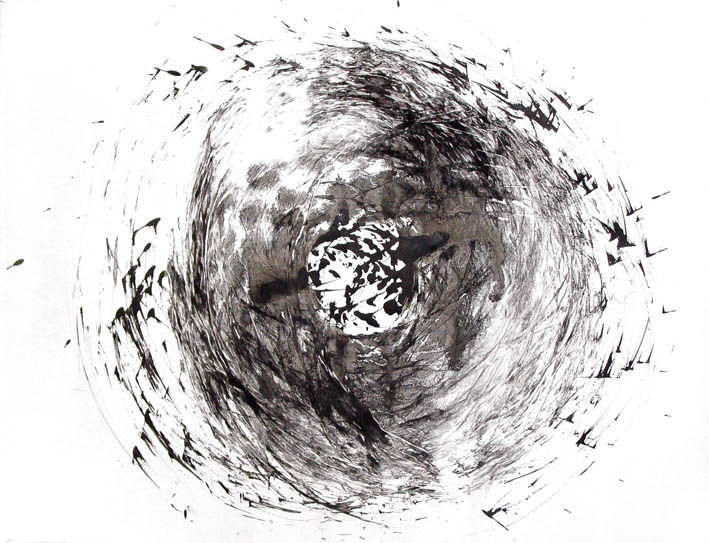
Wáng Bì 王弼 (226–249):
hànyǔ pīnyīn
視之不見名曰夷。
shì zhī bú jiàn míng yuē yí 。
聽之不聞名曰希。
tīng zhī bú wén míng yuē xī 。
摶之不得名曰微。
tuán zhī bú dé míng yuē wēi 。
此三者不可致詰,故混而為一。
cǐ sān zhě bú kě zhì jié ,gù hún ér wéi yī 。
其上不皦,其下不昧,
qí shàng bú jiǎo ,qí xià bú mèi ,
繩繩不可名,復歸於無物。
shéng shéng bú kě míng ,fù guī yú wú wù 。
是謂無狀之狀,無物之象,是謂惚恍。
shì wèi wú zhuàng zhī zhuàng ,wú wù zhī xiàng ,shì wèi hū huǎng 。
迎之不見其首,隨之不見其後。
yíng zhī bú jiàn qí shǒu ,suí zhī bú jiàn qí hòu 。
執古之道以御今之有。
zhí gǔ zhī dào yǐ yù jīn zhī yǒu 。
能知古始,是謂道紀。
néng zhī gǔ shǐ ,shì wèi dào jì 。
[ Because of Dào's namelessness and incomprehensibility in principle, without any way of intelligibility towards the transcendence of Dào, Lǎozĭ could have concluded "Whereof one cannot speak, thereon one must remain silent" [Wittgenstein].
[ Nevertheless he tries in several chapters to approach the unapproachable, to describe between the lines the indescribable: by means of a poetic approach, anticipating similar efforts of Negative Theology [e.g. Meister Eckhart].
01-06:
Look at it – nothing to see:
its name is plain (invisible);
listen for it – nothing to hear:
its name is empty (inaudible);
reach for it – nothing to grasp:
its name is subtle (intangible).
01-06 That which cannot be seen / heard / grasped, Wáng Bì calls *fine, inaudible, smooth:
"For these three [the senses of sight, hearing, and touch] it is impossible to come to a definition [of this], and thus, diffuse it is, [being] the One.
It is without shape or image, without sound or echo. That is why it is able to leave nothing unpenetrated and nothing unreached. It is not knowable and, even with my ear, eye, and touch I do not know to make a name [for it]." [*Wáng Bì 王弼 / Wagner].
Starting with this – 夷+微 interchanged in his commentary like in 馬王堆 Mǎwángduī A+B!), most translators abstracted from the literal meanings of yí-xī-wēi to invisibility, inaudibility, and intangibility as unidentifiable by way of three main senses.
Abel-Rémusat's JHWH = Jahveh hypothesis, mentioned by Hegel and discussed by von Strauß [1870 p. 61-75] in an ingenious fashion, was too farfetched in a sense! [h.a.].
The undefinable Dào, being the One, "leaves 'no-thing' unpenetrated and nothing unreached". [*].
07-12:
These three cannot be fathomed further –
hence, they merge and form a unity:
neither bright on top
nor dark below;
most boundless, and inconceivable,
returning home into Non-Being.
07-08 The single senses are limited: restricted to their specific qualities, they contribute their concrete aspects – as intermediate stages for higher conclusions about reality:
But when the senses merge to a bundle of little insights, they soar to a next level of abstraction, in order to take part in rational cognition on the long way to spiritual enlightenment.
09-12 "This One – its upper side is not bright; – its lower side is not dark. Dim is it and impossible to name.
It returns and relates [the entities] back to the 'no-thing'." [*].
On the ascent to higher realization, Yang (the sunny side of the hill) is not bright, Yin (its shadowy side) is not dark anymore.
Inconceivable, boundless, nameless: thus things and entities as temporary substances, follow the path home to 'no-thing' and non-entity, returning to Non-Being.
13-17:
This is called the shapeless' shape,
image of Non-Being;
called undifferentiated, incomprehensible:
Facing it, not to see its beginning,
following it, not to see its end.
13-15 "This [I] call the shape of the shapeless, the appearance of the 'no-thing'. One wishes to say that it does not exist? [The fact still remains] that the entities are based on it for their completion. One wants to say it exists? [The fact still remains] that it does not show its form. ... This [I] call undifferentiated and vague. That is, impossible to define." [*].
Approaching the Gate to the transcendent Dào again, the pale image of Non-Being radiates its shapeless shape.
Back to the undifferentiated beginning of the universe, forever unintelligible and incomprehensible, follows its last step of transfiguration into Absolute Nothingness.
16-17 Before and after, beginning and end, human being's pure form of intuition [Kant] vanish, and the creative Dào dreams of the next cycle.
18-21:
Hold on to antiquity's Dào,
thus mastering present's occurrences.
Can you understand antiquity's origin,
it is called Dào’s Golden Thread.
18-19 "Although antiquity and the present are different, their Way persists eternally. Only he who holds on to it is able to regulate the entities. 'Occurrence' means governmental business occurring." [*].
Beyond the Beyond, the sage (and the wise ruler) need an anchor in the past, to master the present, being enlightened by the insights of the ancients to cope with the affairs of Being: the burdens of daily life as well as the ruling the realm.
20-21 To understand the oldest beginning means to recognize the continuity of the Way.
"The featureless and nameless is the ancestor of the ten thousand kinds of entities. Although the present and antiquity are not the same, although times have changed and customs have changed, there definitely is no one [Sage Ruler] who has not based himself on this [featureless and nameless] by way of completing their regulated order. (...)
Although high antiquity is far away its Way still persists. That is why, although one is existing today, it is possible 'by means of this [present day reality] to cognize the oldest beginning." [*].
Consciousness needs remembrance, from high antiquity to the Here and Now, the anchor of Being and Time [Heidegger] is called Dào’s Golden Thread. 紀 jì means 'thread', then 'fabric', then the historical narrative... the 'fabric of world'. [following v. Strauß 1870 p. 78-79].
[
15 - The Inscrutability of the Wise Men
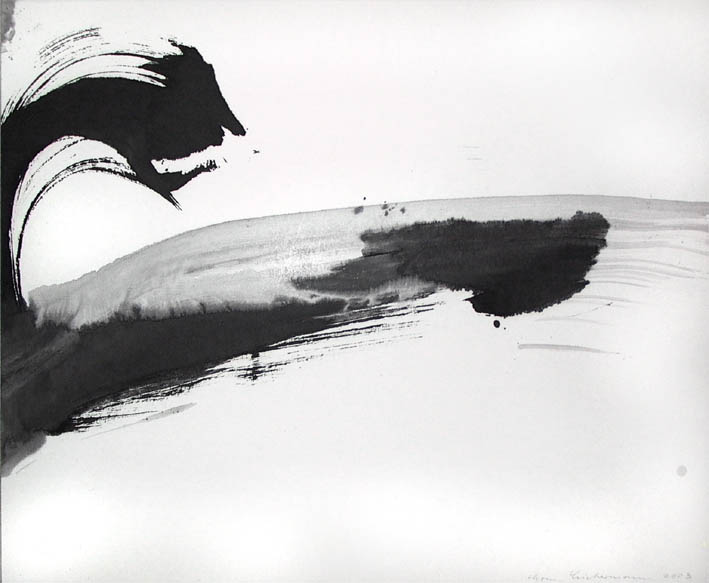
Wáng Bì 王弼 (226–249):
hànyǔ pīnyīn
古之善為士者,
gǔ zhī shàn wéi shì zhě ,
微妙玄通,深不可識。
wēi miào xuán tōng ,shēn bú kě shí 。
夫唯不可識,故強為之容。
fū wéi bú kě shí ,gù qiáng wéi zhī róng 。
豫兮[焉]若冬涉川;
yù xī [yān ] ruò dōng shè chuān ;
猶兮若畏四鄰;儼兮其若容;
yóu xī ruò wèi sì lín ;yǎn xī qí ruò róng ;
渙兮若冰之將釋;敦兮其若樸;
huàn xī ruò bīng zhī jiāng shì ;dūn xī qí ruò pǔ ;
曠兮其若谷;混兮其若濁;
kuàng xī qí ruò gǔ ;hún xī qí ruò zhuó ;
[澹兮其若海;飂兮若無止。]
[dàn xī qí ruò hǎi ;liù xī ruò wú zhǐ 。]
]孰能濁以[止]靜之徐清。
shú néng zhuó yǐ [zhǐ ]jìng zhī xú qīng 。
孰能安以動之徐生。
shú néng ān yǐ dòng zhī xú shēng 。
保此道者不欲盈。
bǎo cǐ dào zhě bú yù yíng 。
夫唯不盈故能蔽而新成。
fū wéi bú yíng gù néng bì ér xīn chéng 。
The deeper those ancient masters had penetrated into the mysteries of Dé and Dào, the further had they adopted their qualities: the manifest, obvious features and virtues of Dé as radiation of their Inner Power – as well as the hidden, obscure secrets of Dào as 'obnubilation' of their enlightenment.
01-05:
Antiquity's excellently practicing masters:
subtle, mysterious, and penetrating so deeply
impossible to comprehend.
Yet just for being inscrutable,
hence I strive for outlining their appearance.
01-05 Once again, the author of the Dàodéjīng tries to name the unnameable: to illuminate the unfathomable abyss of the transcendent Dào, as well as its reflection in the inscrutable masters of Antiquity, to outline them by allegories and metaphors with poetic license.
06-12:
Careful, oh, as if wading across a river in winter;
cautious like fearing neighbors on all sides;
courteous, like guests;
relenting, like ice that is going to melt;
genuine like uncarved wood,
vast like valleys, and
murky like muddy waters.
06-12 The mystical number of seven weak contours, three of them related to water again (!), gradually condense into a vivid inkling of an inexpressible impression.
[ "Someone crossing a [frozen] river in winter is hesitant about whether he should cross or not, and has an expression that makes it impossible to read his feelings." [* Wáng Bì / Wagner].
[ "If four neighbors join to attack the lord in the middle, he will be undecided, and one does not know which way he will turn. That in a person of 'highest receipt / capacity' [spoken of in Laozi 38.1] it is impossible to perceive any clues [in] his [expression] and it is impossible to make out [his] intentions is also like this". [*].
[ Formal like a guest, brittle like melting ice, genuine like an uncarved block, vast like a valley, murky like turbid water:
"Generally speaking, these 'they are like' all mean that one is incapable of [assigning a specific] shape and name to their countenance." [*].
The psychological dimension is noticeably hallmarked by an unnoticeable approach: delicately, and circumspect, the ancient sages trod their path.
A gentle course leads to a safe and secure way.
13-17:
Who is able to clear the turbid
by the wariness of silence,
or who is able to create calmness
by the wariness of enduring movement?*
Preserve such matters,
not to desire for abundance:
for only no excess can thus
shield you from continuous toil.
Who could be capable to (in spite of its being so difficult):
13-14 To treat the turbid – in a social situation or in oneself – that will need an application of the way of 無為 wú wéi: to let go with composure and circumspection, to attain transparency, and to reach the disentanglement by the sound of silence.
To treat the calmness – in myself or in a social situation – that will need an application of the way of 有為 yǒu wéi: to move with composure and circumspection, to attain liveliness, and to reach the disentanglement through the awakening of awareness.
15-17 Enshrine such methods, not to get overwhelmed by wishes, avoid excesses, exaggerations, and extremes (ch. 29).
Only not always filling up to the brim prevents from overflowing, thus to preserve entities from being forced continuously to toil.
[
16 - Returning to Constancy
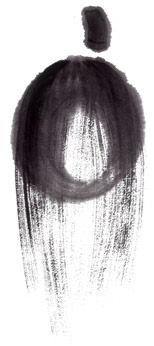
Wáng Bì 王弼 (226–249):
hànyǔ pīnyīn
致虛極守靜篤。
zhì xū jí shǒu jìng dǔ 。
萬物並作,吾以觀復。
wàn wù bìng zuò ,wú yǐ guān fù 。
夫物芸芸各復歸其根。
fū wù yún yún gè fù guī qí gēn 。
歸根曰靜,是謂復命;
guī gēn yuē jìng ,shì wèi fù mìng ;
復命曰常,知常曰明。
fù mìng yuē cháng ,zhī cháng yuē míng 。
不知常,妄作凶。
bú zhī cháng ,wàng zuò xiōng 。
知常容,容乃公,
zhī cháng róng ,róng nǎi gōng ,
公乃全,全乃天,
gōng nǎi quán ,quán nǎi tiān ,
天乃道,道乃久,沒身不殆。
tiān nǎi dào ,dào nǎi jiǔ ,méi shēn bú dài 。
Cyclic and eternal is the rhythm of Dào, growing and returning are the destiny of creatures: from contemplation to constancy, from reflection to release.
01-02:
Achieve emptiness in the ultimate,
keep calm in your core.
01-02 Utmost emptiness prepares truest tranquility, the enactment of non-action will dampen desire and achieve innermost calmness.
03-06:
All beings grow at once, but
I contemplate thereby their homecoming;
for creatures, divers and varied, though:
they all return home to their origins.
"The teaching of the eternal returning, from activity to inactivity, is the basic doctrine of Dàoísm" (Lin Yutang), s. ch. 25, 37, 40.
03-06 The perpetual cycle starts always and for 'every-thing' with the phase of growing towards the culmination of ripening.
The 24th hexagram of the Book of Change 易經 yì jīng, called 復 fù turning point, shows the Receptive Earth over the Rousing Thunder [51th].
Lǎozĭ, free of any desires (ch. 1), perceives from the beginning all subtlety and the mystery in the depths – all variety of entities, every single one amidst the myriads, will return: back to the roots, home to the origin, into the pivot of potentiality.
07-10:
Returning to the roots means calmness,
this is called return to destiny;
coming home to destiny means the Eternal,
aware of eternity means clear-sightedness.
For a chain of implications, the Dàodéjīng applies the Domino technique twice:
07-10 When the changeable things change over... to the calm anchor of Non-Being, it might be called the destiny of Being [Heidegger].
Coming home to destiny will forfeit the trappings of timeliness and the insignia of transiency, yet winning the constancy of the undesignated.
Having mirror-like [淮南子 Huái nán zi] knowledge of the eternal essence is called being enlightened, awareness of timelessness means clear-sightedness and embracing the encompassing [Jaspers].
11-17:
Not knowing eternity
rashly brings misery.
knowing eternity: being all-encompassing!
Being all-encompassing leads to impartiality,
impartiality leads to kingliness,
kingliness leads to Heavenliness,
Heavenliness leads to Dào.
11-12 The loss of knowledge of the eternal essence means: "evil penetrates into the allotted role" [Wáng Bì 王弼], in a chain reaction towards chaos and catastrophe.
13-17 After this brief warning, Laozi has a second positive Domino dialectics [Kalinke]: beginning with the consciousness of constancy, the sage or, respectively, the wise ruler will develop the psychological dimensions of ("leading to") ultimate tolerance, as well as impartiality, kingliness, and Heavenliness (kingly and heavenly statures) – leading at the end of all days to Dào.
18-19:
Dào leads to longevity:
the loss of the body is no threat!
18 Exceptionally,
[ Dào does not constitute here the "last word" in the chain of conclusions: Dào itself also leads to something...
[ They who fully penetrate to the ultimate emptiness and "negativity" – and attain the Eternal of entities (of the Way; ch. 52), they will ultimately not be exhaustible.
[ Hence, the Dào, since it ultimately cannot be exhausted, brings about longevity.
19 Avoiding several Christianized or poetically romanticized interpretations, 沒身不殆 mò shēn bù dài simply means: the end of our Self as person is no danger or threat – in light of returning: home to the root of nothingness, feeling secure in Dào.
More poetical: "Those who endure in Dào, will dive into the depth without danger." [Schwarz 1980 p. 66].
Cf. Lǎozĭ's variation in ch. 33: 死而不亡者壽 sǐ ér bù wáng zhě shòu = dying, yet no doom – longevity!
[
17 - Considerate Leadership
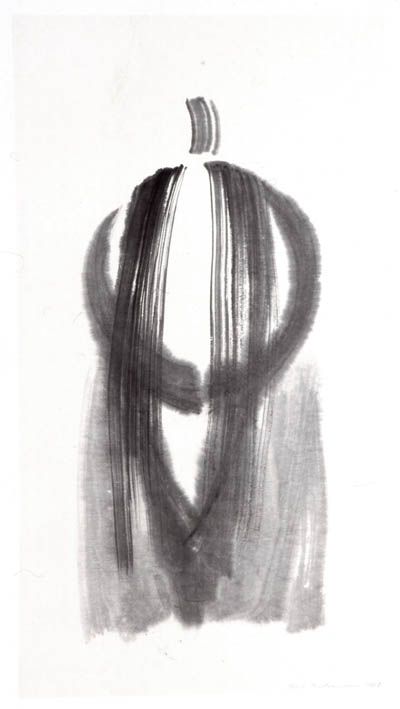
Wáng Bì 王弼 (226–249):
hànyǔ pīnyīn
太上,下知有之。
tài shàng ,xià zhī yǒu zhī 。
其次親而譽之。
qí cì qīn ér yù zhī 。
其次畏之。 其次侮之。
qí cì wèi zhī 。 qí cì wǔ zhī 。
信不足焉,有不信焉。
xìn bú zú yān ,yǒu bú xìn yān 。
悠兮其貴言,功成事遂,
yōu xī qí guì yán ,gōng chéng shì suí ,
百姓皆謂我自然。
bǎi xìng jiē wèi wǒ zì rán 。
Four kinds of rulers, the "highest on top", are ranked by their subjects' reactions:
01-04:
Highest on top: down here
they only know: they exist!
Their next highest are close and praised;
their next are feared;
their next are despised.
01-04 Rulers:
[ The greatest ruler let the subjects only know that he exists; because of his mature style of ruling lightly and unobtrusively in the background – leadership without interference 無為 wú wéi behind the scenes, and teaching without words – people feel free and self-confident in the absence of coercion: matters are brought about without being initiated by him [*Wáng Bì 王弼].
[ The second best to this ideal ruler is not able to rule without interference and with unspoken teaching, but he uses kindliness (like in ch. 38) and humaneness (ch. 17), combined with moral education; hence, he will already be perceived more: as close-by and praised.
[ The next ruler, ranked as third, lost the capacity of kindliness and humaneness, so he feels forced to use coercive measures, like the Legalists' deterrent: relying on "might and power" [Wagner], similar to 義 yì and 禮 lǐ (ch. 38).
[ The fourth and lowest rank will fall into disgrace and not be taken seriously anymore by his subjects: he rules by use of cunning and ruse; people try to circumvent him and not to follow his orders [*]; they learn, as well, guile, in order to evade the ruler and his regulations.
05:
Little trust to give,
little trust to get!
05 Where there is no trust, there is suspicion:
„Not trusting enough means not experiencing trust, right?”
When the full trust of ancient leaders in their subjects got lost, the subjects' doubts increased.
Trust, as a reciprocal, precious and subtle feeling of connection, can easily be destroyed, changing into the absence of all credibility, similar to 論語 Lún yǔ = Analects*
06-08:
Oh, circumspect noble words of the highest:
Tasks accomplished, affairs settled,
all other people say:
"We did it ourselves... spontaneously!"
06-08 Wise rulers' words, well-considered and true, precious and parsimonious, were not altered but followed, even if their intention could not be make out[*].
After tasks were achieved and works completed by unobtrusive non-interference, then people interpreted everything as natural and spontaneous, as if done by themselves!
[
18 - The Omen of Decay
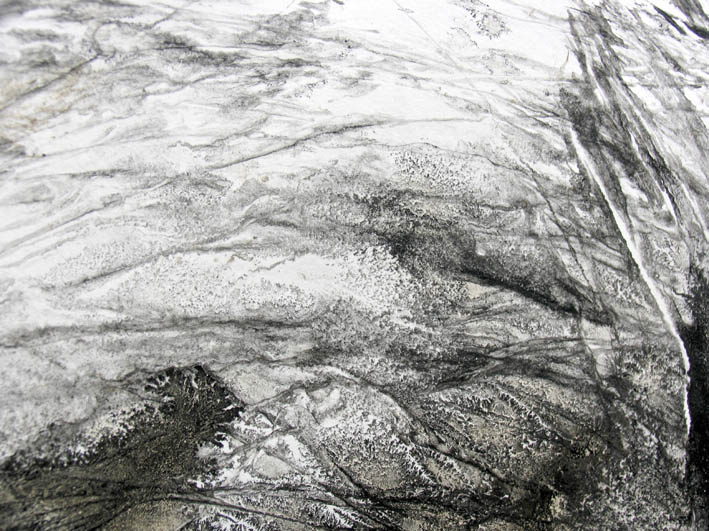
Wáng Bì 王弼 (226–249):
hànyǔ pīnyīn
大道廢有仁義;
dà dào fèi yǒu rén yì ;
慧智出有大偽;
huì zhì chū yǒu dà wěi ;
六親不和有孝慈;
liù qīn bú hé yǒu xiào cí ;
國家昏亂有忠臣。
guó jiā hūn luàn yǒu zhōng chén 。
The break in symmetry of the primordial Dào had started the evolution of things in the physical universe, as well as, later on, the differentiation of values in the social world.
01-02:
Great Dào abandoned:
humaneness and righteousness emerge.
Shrewdness and sophistry arise:
there is great hypocrisy.
01 This loss of original harmony, this paradise of "nobody wants anything" [河上公 Héshàng Gōng], leads firstly to "positive" attempts to compensate: idealized systems of values and formal regimentations of social behavior as Confucian 仁 rén humaneness or benevolence and 禮 lǐ ritual or ceremony.
The circular Dào reprobates to rectilinear rectitude or righteousness [Abbot], concerning civilization and culture. Beauty and ugliness originate from the same source (ch. 2) ...
02 More and more forced compliance leads, secondly, to competitive usage of intelligence: in close relations as cunning and ruse.
Compulsory participation will give rise to counter-movements and evasive strategies within society, the usage of wisdom will degenerate into sophistry and hypocrisy.
03-04:
Close relatives not harmonizing,
filial piety and paternal benevolence come up.
Are land and folk in confusion and chaos,
loyal patriots appear.
03 Already inside the social core unit of the family, corresponding patters determine the role behaviour of the basic relationships (father and son, older and younger brother, husband and wife).
This will be euphemistically expressed as piety and benevolence, embedded in rites and constraints.
04 At the summit of the state, the renunciation of the Dào will all the more so result in the loss the art of leadership without interference and in the moral confusion of the ruler.
Hence, to avoid chaos, he will adopt desperate measures to force law and order; thereby, the ruler's surveillance apparatus and the subsequent evasive behaviour of the subjects [Wagner] form a never-ending spiral.
Artificial conceptions of devotion arise, followed by a veritable army of officials and sycophants, who finally end up spying out each other with mutual distrust.
[
19 - Freedom through Modesty

Wáng Bì 王弼 (226–249):
hànyǔ pīnyīn
絕聖棄智,民利百倍;
jué shèng qì zhì ,mín lì bǎi bèi ;
絕仁棄義,民復孝慈;
jué rén qì yì ,mín fù xiào cí ;
絕巧棄利,盜賊無有;
jué qiǎo qì lì ,dào zéi wú yǒu ;
此三者,以為文不足。
cǐ sān zhě ,yǐ wéi wén bú zú 。
故令有所屬,
gù lìng yǒu suǒ shǔ ,
見素抱樸少私寡欲。
jiàn sù bào pǔ shǎo sī guǎ yù 。
The, at first glance, surprisingly uncompromising demands in ch. 19 are easier to understand as:
[ continuation of and unity with ch. 18 (and 20.1.);
[ ironic and consistent criticism of Confucian values, unmasking their renunciation of the Dào of Nature;
[ direct recommendations primarily to the ruler on how to bring people back to naturalness, simplicity, and genuineness (as continued in ch. 20, 22, 23, 28, 37, 38, 39, 80).
01-06:
Renounce sanctuaries,
discard bookishness:
people benefit a hundredfold.
Abandon benevolence,
reject righteousness:
people return to true filial piety
and parental love.
Renounce craftiness,
reject profit:
no robbers and thieves will exist anymore.
01-02 The pseudo-wisdom of a selfish ruler and a dominant class: their sanctimoniousness, cunning, and erudition must be abolished for the true wisdom of "Holy Simplicity".
Let the people rediscover the manifold of benefits of living their Dè: the Inner Power of innocent simplicity 樸 pǔ instead of competitiveness 爭 zhēng – “Blessed are the meek, for they will inherit the earth” (Matthew 5:5).
03-04 In social life, accordingly, the way from pseudo-culture back to Nature and naturalness [Rousseau, Thoreau] has to repudiate the social surrogate values:
Humaneness 仁 rén in favor of unselfish love 愛 ài, and moral rectitude 義 yì in favor of true, genuine, and spontaneous piety and love – without the detour of rites and ceremonies.
05-06 In daily practical and economic life, consequently, the sovereign has to discard cunning and ruse 巧 qiǎo and fierce competition and pure lust for profit 利 lì, to lead all subjects to cooperativeness and ethical consumerism again.
Taking advantage of one's fellow human beings by way of "legal" business will disappear, lost in meaninglessness, as will direct forms of theft, robbery and fraud.
07-11:
These three examples are insufficient
to consider a full depiction,
hence, let them have this addition:
Appear plain,
hold nativeness,
reduce selfishness,
diminish desires!
Abandon scholarship:
no worries anymore.
"With these three abolishments you may think that culture will be insufficient" [Karlgren].
07-08 In light of the significance of these threefold basics as crucial for living the spirit of Dào, Lǎozĭ adds some further illustrations:
09
Appear without pretensions 素 sù: manifest simplicity,
maintain nativeness 樸 pǔ: value the unadorned.
10
Reduce selfishness 私 sī: minimize interests,
curb desires 欲 yù: diminish greed.
11*
Abandon punditry 學 xué: stop bookish erudition,
no worries 憂 yōu: without fear.
[
20 - Profane Men and Wise Man
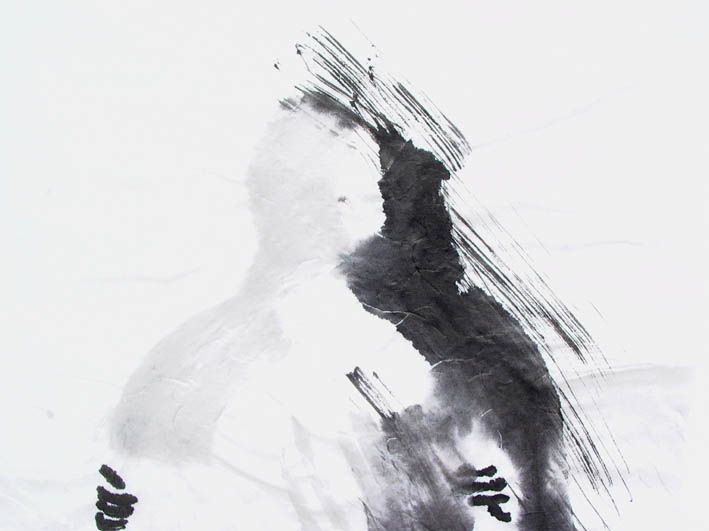
Wáng Bì 王弼 (226–249):
hànyǔ pīnyīn
絕學無憂,唯之與阿,相去幾何﹖
jué xué wú yōu ,wéi zhī yǔ ā ,xiàng qù jǐ hé ﹖
善之與惡,相去若何﹖
shàn zhī yǔ è ,xiàng qù ruò hé ﹖
人之所畏,不可不畏。
rén zhī suǒ wèi ,bú kě bú wèi 。
荒兮其未央哉!
huāng xī qí wèi yāng zāi !
眾人熙熙如享太牢 如春登臺。
zhòng rén xī xī rú xiǎng tài láo rú chūn dēng tái 。
我獨泊兮其未兆,如嬰兒之未孩;
wǒ dú bó xī qí wèi zhào ,rú yīng ér zhī wèi hái ;
儽儽兮若無所歸。
lěi lěi xī ruò wú suǒ guī 。
眾人皆有餘,而我獨若遺。
zhòng rén jiē yǒu yú ,ér wǒ dú ruò yí 。
我愚人之心也哉!
wǒ yú rén zhī xīn yě zāi !
沌沌兮俗人昭昭。
dùn dùn xī sú rén zhāo zhāo 。
我獨昏昏;俗人察察,我獨悶悶。
wǒ dú hūn hūn ;sú rén chá chá ,wǒ dú mèn mèn 。
澹兮其若海,飂兮若無止眾人皆有以,
dàn xī qí ruò hǎi ,liù xī ruò wú zhǐ zhòng rén jiē yǒu yǐ ,
而我獨頑且鄙。
ér wǒ dú wán qiě bǐ 。
我獨異於人,而貴食母。
wǒ dú yì yú rén ,ér guì shí mǔ 。
[ With 28 lines the longest of all chapters – and the most personal one with 7 我 wǒ (!):
[ 09-28 was called "The first Emotional Prose of Chinese literature" [Shen], whether it be a self-portrait [Ellen Chen] or not [Waley; Duyvendak].
Prose, full of ancient poesy!
01-05:
Abandon scholarship: no worries!
Approval and its difference to flattery:
how far mutually apart, eh?
Good and its difference to evil:
similarly mutually apart, what?
01 Abandon punditry 學 xué, stop bookish erudition: carefree 憂 yōu, without fear. [= 19.11.].
"If I were hitting the mark without knowledge, why should [I] strive for an enhancement [of my knowledge]?" [* Wáng Bì 王弼 / Wagner].
02-03 True agreement or hypocritic flattery, or yes & yes, Sir! or by son & by daughter [v. Strauß]: similar, and yet possibly very different!
Mǎwángduī 馬王堆: to shout angrily 訶, or to scold while laughing 呵; not in Guōdiàn 郭店, but in 北大 Běi Dà 何 how? or why?
04-05 Are Good 善 & Evil 惡, as clear opposites, more distant or similar to 唯 & 阿?! asks Lǎozĭ in Sokratic style.
Considering that opposites come from the same source (ch. 2) and Heraclitus's enantiodromia is valid as a principle for all yīn & yáng 陰 陽, from a Dàoist point of view, opposites are no implacable enemies, but rather complementary siblings in the womb of the One.
Even more depending on context and also intention, 唯 & 阿 can be similarly separated from each other – "yea and aye"!
06-08:
People, fearing something,
cannot elude fear:
loneliness, not yet ending, indeed!
06-08 Human fellows share the same, inevitable patterns of fear; of being praised & of suffering [*], first and foremost of self-renunciation [v. Strauß].
Deserted and alone, one still feels endlessly distant to the ordinary ones:
"'Deserted [I am], endlessly!' He is sighing about the distance separating him from the vulgar."
09-11:
Most people are merry and jolly,
as if revelling great sacrificial feasts
and ascending view terraces in springtime.
09-11 Sacrifices of a big ox were reserved for the upper ranks only.
Ordinary people enjoy their superficial hedonism, as if, on a big festival or on a delightful panoramic terrace, their view was from a great height – yet their insight was not deep.
Waley also quotes special "Springtime Terrace Plays" (promoting the fertility of the crops).
Wáng Bì: "Tailao sacrifice": "'The vulgar scholars are excited as if performing the Tailao sacrifice, as if going up a terrace in spring.' The vulgar scholars are beguiled by beauty and promotion, bedazzled by glory and profits. Their desires press ahead, their hearts are in competition."
[* p. 184]. Cf. 莊子 Zhuāng zǐ, ch. 19 "The Full Understanding of Life" [James Legge]! [h.a.].
12-14:
I alone... am quiet, alas,
so still without any omen,
like an nursling, not yet smiling;
worn and weary, alas,
like without any place to return to.
12-14 First "I" of seven here, and three statements about missing something:
[ alone and abandoned, as if otiose, and still without a sign, as if without destiny of being [Heidegger];
[ like a newborn, as if what to smile about has not yet predetermined;
[ helpless and aimless, as if without return to the soil, ubiquitary like the Dào: "everywhere and no-where" [Ellen Chen].
15-18:
Most people, they all have in abundance,
yet only I seem left behind.
I am also a simpleton's heart, indeed –
murky and confused, alas.
We follow now his subjective view:
15-16 Quite a few of those ordinary people seem to live in opulence, enjoying their plethora of superfluous things, "filling their chests and hearts to overflowing" [*] – yet I alone seem lagging behind, without their concerns and desires, as though I had lost them.
17-18 As the indifferent dimwit that I am, lackadaisical and undecided, my heart is turbid and confused, I have no ambition (to prefabricated fulfillment).
19-24:
Common people are bright and clear,
I alone am dim and darkened;
common people: strict and discerning,
I alone am dull and distracted.
I am surging, alas, such like the sea,
drifting, alas, like without any destination.
19-20 The ordinary folk are slight and luminous, and they let their light shine forth (as opposed to the sage, who is enlightened but does not investigate; ch. 58).
21-22 Normal people are so alert and discriminating: they investigate and differentiate (but also separate) – I seem to be dark and dull, opaque and obscure.
23-24 Undulating and turbulent like the sea, are my "feelings impossible to make out" [*].
I seem to be drifting without stability, without commitment: "like the high winds I never stop" [Chen].
25-28:
Most people, they all have clear motives,
but I alone am headstrong
like a backwoodsman.
I alone am different from other people –
but I cherish... the Nurturing Mother!
25-26 Everyone has a clear motive, normal people handle their affairs in a well-considered fashion, yet I seem to be obtuse and solitary, stolid and stupid, backwards and behind the times.
27-28 And now, after a long poetical preparation, Lǎozĭ drops a bombshell of ultimate irony: a unique rhetorical masterpiece – to disclosure the depth under the surface, the wisdom behind the philosophical curtain:
[ I alone desire to be different to the ordinary people... in that I honor the Nourishing Mother!
[ So, to express his estimation of the Dào, Lǎozĭ ("the Old Child", "the honorable old Master") uses here the metaphor of a nursing infant, who gives preference to his "wet nurse", while scorning the pleasures of all the others.
[ Those people esteem phantasmagoria, "the dazzle of worldly accoutrements" [*] – but wise men honor the nursing, nurturing, nourishing mother, the root of all life: Dào.
[
21 - Unfathomable Dào
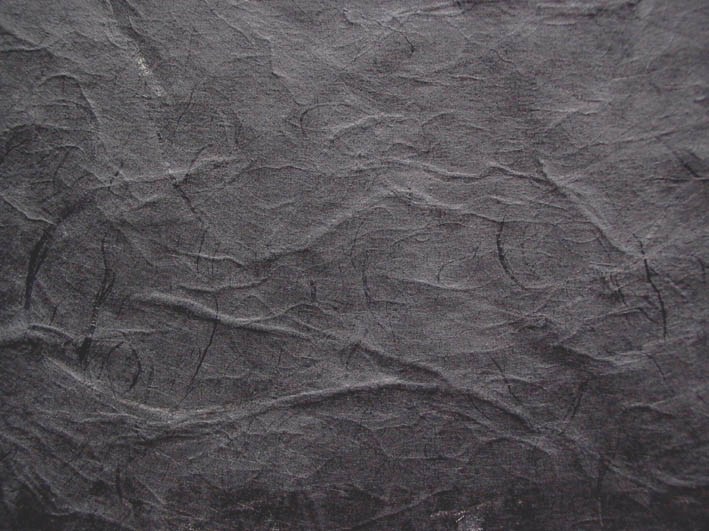
Wáng Bì 王弼 (226–249):
hànyǔ pīnyīn
孔德之容惟道是從。
kǒng dé zhī róng wéi dào shì cóng 。
道之為物惟恍惟惚。
dào zhī wéi wù wéi huǎng wéi hū 。
惚兮恍兮其中有象。
hū xī huǎng xī qí zhōng yǒu xiàng 。
恍兮惚兮其中有物。
huǎng xī hū xī qí zhōng yǒu wù 。
窈兮冥兮其中有精。
yǎo xī míng xī qí zhōng yǒu jīng 。
其精甚真。其中有信。
qí jīng shèn zhēn 。qí zhōng yǒu xìn 。
自古及今,其名不去以閱眾甫。
zì gǔ jí jīn ,qí míng bú qù yǐ yuè zhòng fǔ 。
吾何以知眾甫之狀哉!以此。
wú hé yǐ zhī zhòng fǔ zhī zhuàng zāi !yǐ cǐ 。
[ In this chapter, Lǎozĭ tries once more to describe the undescribable, using the poetical power of the vacuum between the lines, as well as – methodologically – the insight of intuition.
[ The Dàodéjīng offers in this chapter not less than a creative theory of creation from Nothingness to Being!
01-02:
The attitude of purest Inner Power
follows only Dào.
01-02 Here, the Dàodéjīng prepares a logical step-ladder, for approaching the "time before time", and tracing 德 Dè back to the pure potentiality of 道 Dào.
Inner Power's disposition (attitude) toward the true emptiness is crucial for one's capacity to act only in accordance with the Way of 道.
"The grandest forms of active force
From Tao come, their only source" [Legge].
("Als Quelle nur des Dàos Norm,
Bringt Innere Kraft zu höchster Form"; h.a.).
03-12:
In its acting as entity Dào
remains only indistinct and elusive;
Elusive and indistinct, alas,
are there images inside it;
indistinct and elusive, alas,
there are already beings indicated inside it;
secluded and unfathomably, alas:
in its inside, there are essences:
these are utmost genuine:
in its inside there is truthfulness.
The content of the following poetical paraphrases reminded many translators and commentators (though only partially!) of Plato's doctrine of forms.
03-04 Dào's acting (not on, but) as an entity [Wagner p. 443]: figurative, symbolic, metaphorical expressions, "vague" = shapeless, "diffuse" = unfettered, free [we follow now mainly 王弼 Wáng Bì].
05-08 Diffuse and vague, elusive and indistinct, alas, are there images that exist therein;
[ vague and diffuse, indistinct and elusive, are there beings that exist therein.
[ The beings are initiated by Dào's shapelessness, completed by its unlimitedness.
[ But the ten thousand entities are not aware why they are initiated and brought to completion.
[ The process from originally vague and shapeless images inside (the Dào) toward things and beings outside in the universe that is a sort of creative imagination of creation (!): from absolute emptiness to potential (ideas of) images to being in space-time.
09-10 Secluded and distant, deep and unfathomable, alas, inside there are essences.
"Secluded" and "distant", 王弼 Wáng Bì calls sighs: on account of their depth and abstruseness: not directly to perceive, albeit the ten thousand kinds of beings are based on these essences.
But there is hope: by determining their true nature (the Dào!), it becomes possible to perceive the entities indirectly, and thus, the Way becomes indirectly discernible through them – at least in some aspects of their "seed", which is present in the ten thousand kinds of entities! [Wagner, p. 443].
11-12 Because these essences are in fact truthful, there is credibility (credible evidence) inside.
When the entities have related back to the phase of "secluded" and "distant", their utmost true essence is understood, and the nature of the myriads of kinds is determined; trustworthiness becomes trust.
13-17:
From ancient times until today,
its name has been unforgotten,
for one discerns
all being's primordial beginning.
How do I know this all being's beginning?
Intuitively!
13-15 Because the ultimate absolute truth cannot be understood by a name, therefore is its (unforgotten) name called... namelessname!
In this name one discerns the primordial beginning of all entities; from ancient times to the present, everything occurred on the basis of this namelessness.
16-17 Finally, Lǎozĭ seems to be asked, how he can know anything about the features of the myriads of beings in the beginning, when obviously there is no direct experience about "Absolute Negativity" [Hegel] and the early periods of pure potentiality?
"From this", "for this reason": All the abovesaid has been obtained – merely from the insights of intuition.
[
22 - The Wisdom of Yieldingness
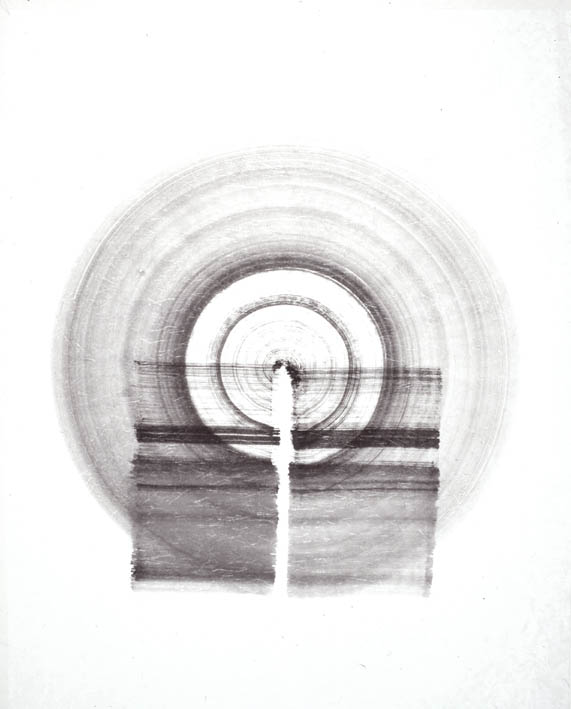
Wáng Bì 王弼 (226–249):
hànyǔ pīnyīn
曲則全, 枉則直,
qǔ zé quán , wǎng zé zhí ,
窪則盈,敝則新少則得,
wā zé yíng ,bì zé xīn shǎo zé dé ,
多則惑。是以聖人抱一,為天下式。
duō zé huò 。shì yǐ shèng rén bào yī ,wéi tiān xià shì 。
不自見故明;不自是故彰;
bú zì jiàn gù míng ;bú zì shì gù zhāng ;
不自伐故有功;不自矜故長;
bú zì fá gù yǒu gōng ;bú zì jīn gù zhǎng ;
夫唯不爭,故天下莫能與之爭。
fū wéi bú zhēng ,gù tiān xià mò néng yǔ zhī zhēng 。
古之所謂:「曲則全者」豈虛言哉!
gǔ zhī suǒ wèi :「qǔ zé quán zhě 」qǐ xū yán zāi !
誠全而歸之。
chéng quán ér guī zhī 。
"True words sound paradoxical..." (ch. 78): using the might and power of paradoxes provides us insight into the dynamics of development, as well as into the unity of opposites.
01-06:
Partial, then complete,
crooked, then straight;
empty, then filled,
worn out, then new.
Having little, then obtaining much –
yet too much, then confused!
Quotes of ancient aphoristic sayings, with their "balancing wisdom" [LaFargue] prepare the way for the application by a wise ruler.
Wáng Bì 王弼 correlates 01-04 to 09-16(!), as follows:
01-04 Maxims:
[ First maxim of the sages: fragments build a whole, even when they at first hide the results in the completed form: without showing themselves, they become complete (in their enlightenment).
[ Second maxim of the sages: thus bending results toward correctness, and doing so without self-righteousness, their being right shines forth.
[ Third maxim of the sages: a depression (in a riverbed) will be filled, without bragging their achievements will therefore be uncontested.
[ Fourth maxim of the sages: that which is worn out leads to something new, thus, without praising themselves, their capacity grows.
05-06 From four points of view on quality, the quantitative power of paradoxes are disclosed in the most incisive fashion: "Reduction results in attaining, increase results in delusion"!
For clarification, Wáng Bì 王弼 makes use of the metaphor of a tree: the higher the top of a tree, the further away it is from its root, the lower it is, however, the better it preserves the root...
Reducing allows the root to be preserved; increasing means: further away from one's true nature, hence in confused delusion.
07-18:
Hence: wise men keep to the Oneness,
and set an example for all world:
Not self-attentive,
therefore enlightened;
not self-righteous,
therefore prominent;
not self-faming,
therefore meritorious;
not self-admiring,
therefore enduring.
Just for not competing,
nobody worldwide can
compete with them.
07-08 These elucidations in all its qualitative and quantitative facets are now to be transferred to the ruling of an ideal leader: when they are able to embrace the One and cherish the unity of opposites, then they can be regarded as examples, then they can act als wise rulers, making the empire exemplary.
09-16 Wáng Bì's 王弼 abovementioned four maxims of not being
[ self-involved,
[ self-righteous,
[ self-praising, and
[ self-admiring
lead wise rulers to enlightenment, prominence, and merit, as well as to endurance and constancy.
17-18 Acting by non-acting, the humility of non-interference, the high art of non-competing (ch. 73) allow leaders to lead by not leading: unobtrusive and almost unnoticed, their subjects enjoy self-regulation and peace.
Only because sages never compete, nobody can enter in competition with them (pacifism)!
"Negative Morality", defined by what is not to do, can have positive goals and objectives, being reminiscent of the Sermon of the Mount [Wing-tsit Chan].
19-21:
The ancient's saying:
'Partial, then complete':
How could that be idle talk, indeed?
Truly, whole...
they return to Dào.
19-21 The quotes of ancient times are confirmed again: Lǎozĭ asks rhetorically, if From the Part to the Whole and the other examples could be mere empty words?
Because of their true, genuine wholeness, all entities (leaders and subjects) will return home, back to their roots, embracing the Oneness, home into the womb of Dào.
The Dào as a tool: like a compass, the Great One "observes the destiny under Heaven" [Ren, 1993].
[
23 - The Sustainability of Dào
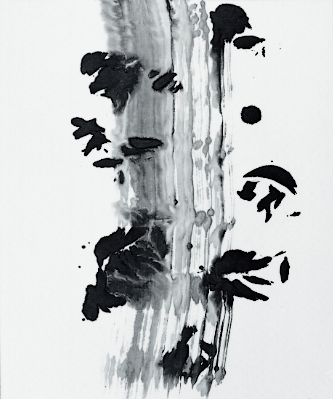
Wáng Bì 王弼 (226–249):
hànyǔ pīnyīn
希言自然。
xī yán zì rán 。
故飄風不終朝,驟雨不終日。
gù piāo fēng bú zhōng cháo ,zhòu yǔ bú zhōng rì 。
孰為此者﹖天地。
shú wéi cǐ zhě ﹖tiān dì 。
天地尚不能久,而況於人乎﹖
tiān dì shàng bú néng jiǔ ,ér kuàng yú rén hū ﹖
故從事於道者,同於道。
gù cóng shì yú dào zhě ,tóng yú dào 。
德者同於德。
dé zhě tóng yú dé 。
失者同於失。
shī zhě tóng yú shī 。
同於道者道亦樂得之;
tóng yú dào zhě dào yì lè dé zhī ;
同於德者德亦樂得之;
tóng yú dé zhě dé yì lè dé zhī ;
同於失者失於樂得之。
tóng yú shī zhě shī yú lè dé zhī 。
信不足焉有不信焉
xìn bú zú yān yǒu bú xìn yān
Both nature's way of self-regulation and the naturally way of following one's inner truth display similar wordless sustainability.
With Dào, with Dé?!
Attaining or losing them?!
01-07:
To make few words – Nature's way.
So, neither whirlwinds last all morning,
nor downpours last all day.
Who makes these things?
Heaven and Earth!
Even Heaven and Earth
not able to duration,
so the less do humans, eh?
01 Words about the Way are stale and bland (ch. 35), hence, Nature's ultimate clues are inaudible (ch. 14).
"Many words frequently exhaust themselves" (ch. 5): talking on and on about something inhibits, death will inhibit things, spontaneity releases.
02-03 Like all extremes, cyclones and cloudbursts are not enduring:
"Sunrise doesn't last all morning,
A cloudburst doesn't last all day..."
[Beatles].
"Nothing is as constant as change" [Heraclitus], the constancy of the universe is called evolution!
04-07 If even the initiators of those violent outbreaks, Heaven and Earth, are subject to this Law of Change, how could then human beings be capable of maintaining "an interfering government for long" [*Wáng Bì 王弼 / Wagner].
08-11:
Therefore pursue affairs by Dào:
those who follow Dào,
become one with Dào;
those who follow Inner Power,
become one with Inner Power;
those who follow Losing both,
become one with Loss.
08-09 Hence, wise men (and rulers) manage their affairs in accordance with the Dào – because all beings are completed by the Dào's shapeless and non-interfering guidance (ch. 02) and its wordless, "unspoken" teaching.
It thereby leaves all other beings their true nature [*]. [*Wáng Bì 王弼].
Those who follow the sage's example, practicing the Dào, will become substantially identical with it.
10-11 Those who attain the Dào [their root, 'true nature'; ch. 22] – by following their Inner Power! – i.e. by reducing they attain their root (ch. 22), will become substantially identical with attaining (and with their Inner Power!).
Correspondingly, those who lose the Dào (and their root by increasing), will become substantially identical with the loss.
12-17:
Those one with Dào:
Dào also gladly attains them;
those one with Inner Power:
Inner Power also gladly attains them;
those one with Losing Dào:
Loss also gladly attains them.
12-13 Those followers who are now identical with Dào will, so to speak, be 'gladly' incorporated and adopted by it, ..
Dào will "move towards them, promote and complete their striving, and it will be glad to preserve them" [von Strauß].
14-15 Those now identical with the personification of attaining Dào (by Inner Power), will be 'gladly' incorporated and adopted by attaining (Inner Power).
16-17 Those now identical with the personification of the loss of Dào (by no Inner Power), will be gladly incorporated and adopted by the loss (of Dào and Dé!).
Wáng Bì's commentary "This means: He adapts to their practice. That is why he makes [them] identical with [the Way, attainment, or loss] by way of corresponding to them." ...is 'unsatisfactory' in Wagner's view:
"He adapts to their practice..." is not the typical way of "a more explicit language in which most of the original textual ingredients are still visible." etc. [Wagner 2003 p. 445-446].
18:
Little trust to give,
little trust to get!
18 'Where there is no trust, there is suspicion.'
Like already in ch. 5, there referring more to the relationship between ruler and subject, here more in general:
„Not trusting enough means not experiencing trust, right?”
When full trust of ancient leaders in their subjects got lost, subjects' doubts increased.
Trust, as a reciprocal, precious and sensitive feeling of connection, can easily be destroyed, changing to the absence of all credibility.
[
24 - Avoidance of Sophistication
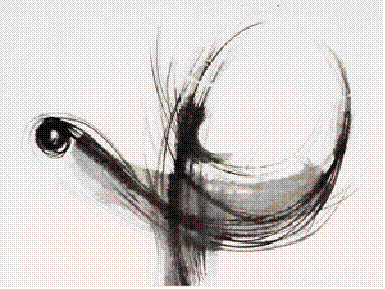
Wáng Bì 王弼 (226–249):
hànyǔ pīnyīn
企者不立;跨者不行。
qǐ zhě bú lì ;kuà zhě bú háng 。
自見者不明;自是者不彰。
zì jiàn zhě bú míng ;zì shì zhě bú zhāng 。
自伐者無功;自矜者不長。
zì fá zhě wú gōng ;zì jīn zhě bú zhǎng 。
其在道也曰:餘食贅形。
qí zài dào yě yuē :yú shí zhuì xíng 。
物或惡之,故有道者不處。
wù huò è zhī ,gù yǒu dào zhě bú chù 。
Partially drawing on ch. 22, the Dàodéjīng is here exposing unnatural traits and turgid behavior in the light of the Dào.
01-06:
On tiptoes you do not stand,
with stilted steps you do not walk.
Self-attentive ones do not become enlightened,
self-righteous ones do not shine forth.
Self-boasting ones are without merits,
self-praising ones do not outlast.
01-02 Two new examples of supposed self-aggrandizement are introduced before the examples already known from ch. 22:
Factitious attempts to snatch a higher rank or a more advanced position are doomed to failure:
A ruler "who takes a high stand will not stand [firmly]. The other entities [his subjects] will [, as a consequence of his example,] think such of [their own] advancement and consequently make [him] lose [his] security." [*Wáng Bì 王弼 / Wagner].
A ruler "who makes great strides will not make headway", [A ruler] who shows himself does not become enlightened. [A ruler] who is self-righteous will not have [his being right] shine forth. [A ruler] who brags will not have [his] achievements [uncontestedly]. [A ruler] who praises himself will not have [his capacity] grow. With regard to the Way I call these [attitudes] 'left-over food' and 'super-fluous actions.'" [*].
03-06 These lines 24.03.-24.06. are formally almost perfect inversions of the content in the (pairs of) lines 22.09.-22.16., with respectively 者 zhě in lieu of 故 gù – plus 24.05. 無 wú for 22.14. 有 yǒu, of course!
Mǎwángduī 馬王堆 A+B logically put ch. 24 between 21 and 23.
In ch. 22 Lǎozĭ shows, how not having negative traits like self-satisfied, self-righteous, self-praising, self-admiring leads to the positive consequences: enlightened, prominent, meritorious, enduring.
Here the 'Old Master' demonstrates inversely how having those negative traits leads to not having the same positive traits!
07-10:
This, with regard to Dào, too, means:
excessive food, turgid behavior –
creatures might detest that,
therefore Dào followers do not linger there.
07-10 The more abstract recommendations in ch. 29, to avoid excesses, exaggerations, and extremes, are here elucidated as conclusions of the above-mentioned correlations – in light of Dào:
Vain, presumptuous, pushy, turgid behavior is revolting... like leftover food: basically good, but in the meanwhile rotten.
All creatures disdain superfluous, overdone conduct as excessive excrescences.
[
25 - The Greatness of Dào
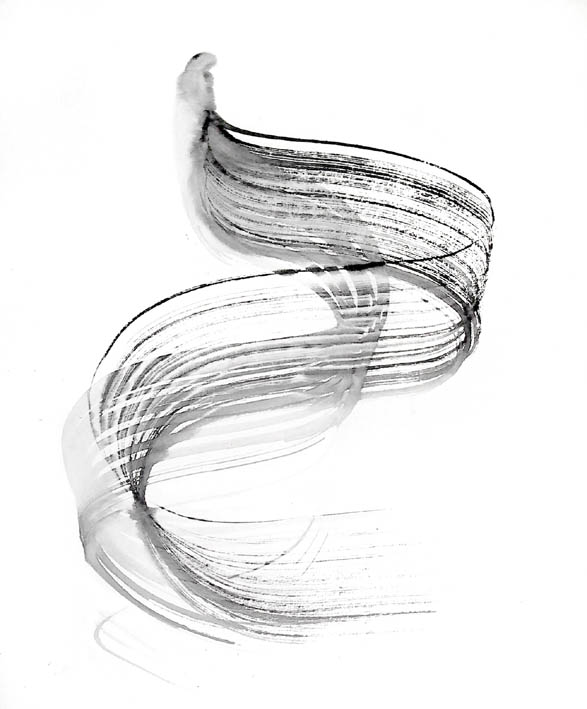
Wáng Bì 王弼 (226–249):
hànyǔ pīnyīn
有物混成先天地生。
yǒu wù hún chéng xiān tiān dì shēng 。
寂兮寥兮獨立不改,
jì xī liáo xī dú lì bú gǎi ,
周行而不殆,可以為天下母。
zhōu háng ér bú dài ,kě yǐ wéi tiān xià mǔ 。
吾不知其名,強字之曰道。
wú bú zhī qí míng ,qiáng zì zhī yuē dào 。
強為之名曰大。
qiáng wéi zhī míng yuē dà 。
大曰逝,逝曰遠,遠曰反。
dà yuē shì ,shì yuē yuǎn ,yuǎn yuē fǎn 。
故道大、天大、地大、人亦大。
gù dào dà 、tiān dà 、dì dà 、rén yì dà 。
域中有四大,而人居其一焉。
yù zhōng yǒu sì dà ,ér rén jū qí yī yān 。
人法地,地法天,天法道,道法自然
rén fǎ dì ,dì fǎ tiān ,tiān fǎ dào ,dào fǎ zì rán
Once more one of those chapters... where Lǎozĭ tries to explore the unexplorable, to designate the unnamable, to reveal the ephemeral.
[ In ch. 14, he uses negative considerations, to approach the Pure Intuition.
[ In ch. 21, we find his visionary providence poetically between the lines.
[ In ch. 25, the way to the Substantiality of the Absolute is paved with the power of poesy and aesthetic contemplation.
01-05:
There was an entity,
nebulous and perfect,
born before
Heaven and Earth.
Silent and void, alas,
unique and unalterable,
universally circulating,
yet inexhaustible:
so it might be regarded as
world's Primal Mother.
01-02 In the "Axial Age" [Jaspers, 1949, following Anquetil-Duperron, 1771, v. Strauß, 1859(!) & v. Lasoulx, 1870], philosophy emerged in several advanced civilizations independently from each other, "thus spoke": Zarathustra, Confucius, Lǎozĭ, Buddha, the Prophets, and the Pre-Socrates.
In the "mythological-evolutionary" cosmogony of the Dàodéjīng, on the shoulders of creation myths, the ultimate beginning vanishing into the fog of that period before becoming the Primal Mother of Heaven and Earth, via the perfect symmetry of the grand unification, back to the original chaos of formless form, the unavoidable void of Non-Beingness and into the transcendence of the Absolute Nothingness.
03-05 *Wáng Bì 王弼 elucidates Lǎozĭ's adjectives:
[ Vacant: and still is Dào, "without form and substance";
[ alone: "no other beings' companion";
[ unchanging: "never losing its eternal essence";
[ traveling: all around to every place, "but evades all danger".
Hence: Dào is "the mother of Heaven and Earth", able to keep intact its "grand shape" [*Wagner, p. 201+448].
06-08:
I do not know its name;
to designate it, I call it Dào;
forced to give it a name,
I call it great.
06-08 There can be no timeless name for Dào (ch. 01):
[ To define its shape, because any transcendent inconceivable something "comes to completion out of the diffuse" and is "without form" (ch. 41)
[ A temporary name of practical purposes and as a stop-gap measure, a mere designation... shall be Way (Dào), because "there is no being which is not based on it".
[ To indicate a first impression of its nature, essence, and substance, a (forced) second designation... shall be Great. ("Passing through": no place to which it does not have access).
09-11:
Great means traveling,
traveling means far-reaching,
far-reaching means returning.
09-11 Meanings:
[ Great means "passing through" (traveling): not fixed to one substance only, there is no place to which is does not get [*]:
[ Passing through means to get far: "reaching the distant end", not biased or restricted to one-sided directions.
[ Far-reaching means to return to the roots, to one's timeless nature.
12-13:
Therefore are: Dào great, Heaven great,
Earth great, also wise Kings great.
The Middle Kingdom has four Great ones,
also the King, resides of them as one, indeed!
12-13 The Great ones are regarded at first as descending, from abstract to concrete, from high to low, taking their power into consideration.
Below the Dào are Heaven, then Earth, and also – yet not sounding Dàoist prima facie – the King (the 'Son of Heaven'), as highest representative of Man.
The ruler deserves to be called great not just by position, i.e. his office, but if matching the others, as a great mediator between the three Great ones.
14-17:
Men follow Earth,
Earth follows Heaven,
Heaven follows Dào,
Dào follows its own nature.
14-17 Now, the Great ones are regarded as ascending: from the King, as the representative of human beings, who follows the Earth as his example, norm, and guide, towards the Earth which follows Heaven's guide, towards Heaven, which follows the leadership of that which cannot be designated, called "Beyond" – Dào [*].
Dào, as Being-as-such, already perfected in Chaos, follows finally its own Way: because of its ultimate degree of freedom, by itself, spontaneously, ... entirely naturally.
[
26 - Serenity
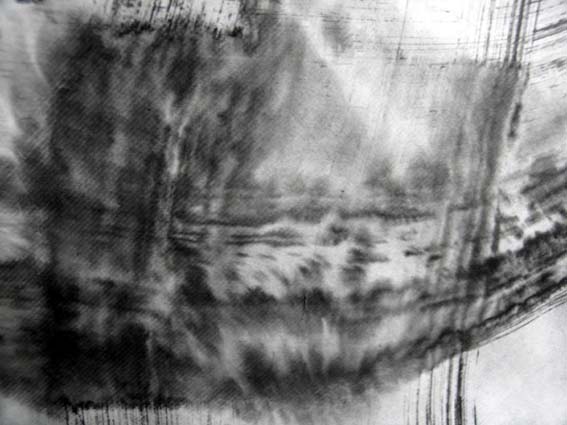
Wáng Bì 王弼 (226–249):
hànyǔ pīnyīn
重為輕根,靜為躁君。
zhòng wéi qīng gēn ,jìng wéi zào jūn 。
是以君子終日行不離輜重。
shì yǐ jūn zǐ zhōng rì háng bú lí zī zhòng 。
雖有榮觀燕處超然。
suī yǒu róng guān yàn chù chāo rán 。
奈何萬乘之主而以身輕天下。
nài hé wàn chéng zhī zhǔ ér yǐ shēn qīng tiān xià 。
輕則失根,躁則失君。
qīng zé shī gēn ,zào zé shī jūn 。
[ The example of the sage might mould the ideal ruler, to cultivate serenity (ch. 16) and Inner Power (ch. 54), purity and tranquility (ch. 45) [Hán Fēizǐ 韓非子, ch. 21].
[ The wise men show the way how to avoid the sources of selfishness and the traps of temptations (ch. 44, 46) and to solve difficulties even before they arise (ch. 63, 64).
[ They show them the way towards a well-balanced harmony of seriousness and serenity.
01-02:
Heavy serves as root of the light,
calm as mastery of the restless.
We follow here some illustrations by the unsurpassable Victor v. Strauß (1870!):
01 The heavy mountain bears the forest, whose wood bears the light leaves and blossoms, the gentle haze of clouds rises from the heavy waters – these paradigms show: the heavy is the bedrock of the weightless.
02 The immovable riverbed dictates the course of the moving water, the restless wind breaks against solid walls – these paradigms show: calmness masters the commotion.
03-06:
So wise men walk all day,
not leaving their baggage's heaviness.
Although they have brilliant prospects,
they stay composed, thus transcending them.
03-04 The wise will walk the whole day long, without leaving their heaviness: only the bare necessities as baggage, the burden of their life, their cheerful seriousness.
True rulers do not depart from the rules of responsibility.
05-06 Wise men and rulers are not distracted by magnificent mansions and prosperous prospects, nor by tempting towers and towering temptations: they remain calm and aloof [Wáng Bì 王弼], unhurried and indifferent [Chan], quiet and undisturbed [Duyvendak], serene like a swallow's flight [v. Strauß].
07-10:
How could rulers
of myriads chariots,
due to pure selfishness,
take lightly all world?
Lightness lets lose roots,
restless lets lose sovereignty.
07-08 Ten thousand chariots are the power of an emperor: selfish rulers are breezy and frivolous, impetuous and thoughtless, with regard to their own person.
09-10 "The light [and impetuous] cannot press down [sic!; 'suppress'] the heavy [and calm]. 'He will lose the basis' means he will harm his own person. 'He will lose his princely [position]' means he will lose his position as the [sic!] prince."
Hence, they will lose their basic roots, as well as their sovereign position, and thereby their integrity – without heavy waters and the immovable riverbed...
[
27 - True Mastership
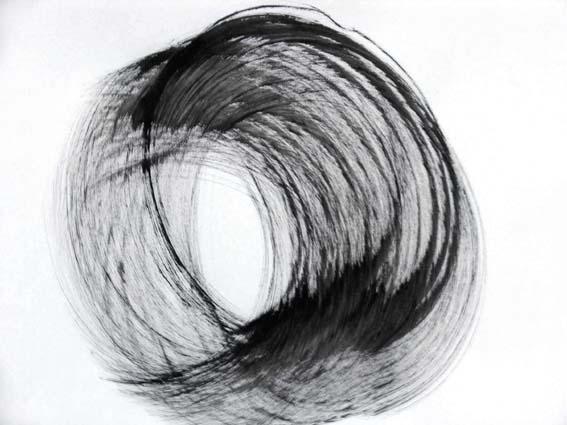
Wáng Bì 王弼 (226–249):
hànyǔ pīnyīn
善行無轍跡。善言無瑕謫。
shàn háng wú zhé jì 。shàn yán wú xiá zhé 。
善數不用籌策。善閉無關楗而不可開。
shàn shù bú yòng chóu cè 。shàn bì wú guān jiàn ér bú kě kāi 。
善結無繩約而不可解。
shàn jié wú shéng yuē ér bú kě jiě 。
是以聖人常善救人,故無棄人。
shì yǐ shèng rén cháng shàn jiù rén ,gù wú qì rén 。
常善救物,故無棄物。是謂襲明。
cháng shàn jiù wù ,gù wú qì wù 。shì wèi xí míng 。
故善人者不善人之師。不善人者善人之資。
gù shàn rén zhě bú shàn rén zhī shī 。bú shàn rén zhě shàn rén zhī zī 。
不貴其師、不愛其資,
bú guì qí shī 、bú ài qí zī ,
雖智大迷,是謂要妙。
suī zhì dà mí ,shì wèi yào miào 。
This chapter shows the Dàoist way to understand goodness and efficacy in practical tasks, in treating human beings and other creatures, as well in in teaching and education.
01-07:
Good travelers
leave neither track nor trace;
good speakers
make neither faults nor flaws;
good reckoners
use neither tallies nor tablets;
good locksmiths
need neither bar nor bolt –
yet not to open;
good binders
take neither rope nor knots –
yet not to loosen.
Dào's way to solve problems is not sophisticated, but simple, avoiding artificial means, preferring natural, plain, humble solutions, often using the hidden power of paradox.
We follow here Wáng Bì 王弼 "himself"(!): the sage let people act by their natural spontaneity, without interfering by initiating.
01 Hence, travelers on foot or travelers with a baggage cart "attain their goals, but there are no tracks": guiding tracks of the sage.
02 "Blameless" will be the one whose speech "adapts to the nature of other beings... without analyzing them".
03 Good calculators do not need any 'counting rods' or other artificial means like a tally [stick], but 'it tallies'... [the calculations add up].
04-05 "Mastery reveals itself in simplicity": a masterly closer (locksmith) is able to lock very simply and reliably without using bar and bolt [lock and catch].
06-07 To tie strings without any knots, and "still the tie cannot be undone": the sage "neither gets other beings ready nor makes them do something".
Like in all five examples, people are not controlled, thus they can follow their own nature.
08-13:
Therefore, wise men are...
always good at protecting people,
hence without ever abandoning men;
always good at saving creatures,
for never abandoning creatures.
This is called: following enlightenment.
Dàoist "humanism" is based not on regulating human behavior through punishment, but on learning from example and on compassion, never abandoning Human Dignity [Simon] (ch. 49).*
08-09 After goodness in individual abilities (01-07, Lǎozĭ turns to social goodness: wise men are human beings who help other human beings or even save them. This goodness is constant, this helping is a way of saving them.
10 No restrictions, no conditions, no segregations: Dàoist helping means saving all human beings: never abandoning any human being.
11-12 Dàoist helping also means saving all creatures: never abandoning any creature.
13 This saving people and creatures – saving Human Dignity and the dignity of all life – happens
[ in accordance with,
[ harmonizing with,
[ and based on
enlightenment and spiritual clarity.
14-18:
Hence: good men are
not good men's teacher,
not good men are good men’s challenge.
Not honoring their teacher,
not loving their challenge:
although knowledge, great delusion;
this means an Essential mystery.
Teaching is not mere knowledge transfer, but learning from the example, in 'modern' motivational style.
True education is devotion from both sides, teacher and student, with mutually illumination.
14-15 Good and bad people, teachers and students, being each other's task, share a challenging 'win-win-situation'; hence, in a Dàoist perspective, they are each the other's treasure.
16-17 Honoring the good as the example that teaches, and loving the not so good as a challenging treasure: this constellation is crucial; without such honoring and loving: pure indoctrination, mere bedazzlement. [Hán Fēizǐ 韓非子, ch. 21].
18 This passage (14-18) is full of deep wisdom:
要妙 Essential Mystery [W, H, F],
妙要 Mystery of the Essential [M, m, B].
---------------------------------------------------------
*"Human dignity shall be inviolable." German Basic Law, §1; Charter of Fundamental Rights of the European Union.
[
28 - Visionary Power
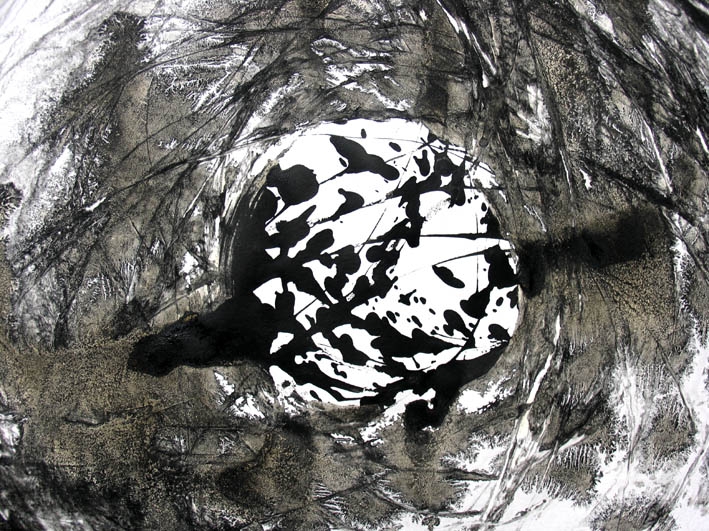
Wáng Bì 王弼 (226–249):
hànyǔ pīnyīn
知其雄,守其雌,為天下谿。
zhī qí xióng ,shǒu qí cí ,wéi tiān xià jī 。
為天下谿,常德不離,復歸於嬰兒。
wéi tiān xià jī ,cháng dé bú lí ,fù guī yú yīng ér 。
知其白,守其黑,為天下式。
zhī qí bái ,shǒu qí hēi ,wéi tiān xià shì 。
為天下式,常德不忒,復歸於無極。
wéi tiān xià shì ,cháng dé bú tuī ,fù guī yú wú jí 。
知其榮,守其辱,為天下谷。
zhī qí róng ,shǒu qí rǔ ,wéi tiān xià gǔ 。
為天下谷,常德乃足,復歸於樸。
wéi tiān xià gǔ ,cháng dé nǎi zú ,fù guī yú pǔ 。
樸散則為器,聖人用之則為官長。
pǔ sàn zé wéi qì ,shèng rén yòng zhī zé wéi guān zhǎng 。
故大制不割。
gù dà zhì bú gē 。
[ Dào lets the Inner Power of Dé work from below, and the harmony of Yin and Yang work from within, to lead creatures home to limitlessness and primordiality.
[ As rulers, wise men, in the unadorned spirit of Dào, masterfully lead all entities, out of lowest riverbed (ch. 61), in lenient devotion.
[ Perfectly parallel, the first three paragraphs follow the poetic pattern:
Know - preserve - form - constant - return... from the contrastive pairs 'manhood / woman-hood', 'lightness / darkness', and 'favour / disfavour' home to childlikeness, limitlessness, and primordiality!
01-06:
Know your manhood,
keep your womanhood:
become world's riverbed.
Becoming world's riverbed,
constant Inner Power will not leave you:
return, home to childlikeness.
The soul is androgynous, with Yin and Yang in harmonious development.
Literally, cock (in the foreground) and hen (in the background) symbolise manhood (Yang: the sunny side of the hill) and womanhood (Yin: the shady side of the hill).
01-03 Aware of its male traits, but preserving the female traits, Yang is wisely mellowed by Yin, and proves to be the bottom of the valley, the world's riverbed: confluence of all rivers and of all spirits (ch. 61, 66).
04-06 As world's riverbed, Inner Power will continuously and sustainably serve the other entities to return to the irreproachableness of a newborn child (ch. 55), and at the same time, serve large empires to flow downwards below the small states to win them (ch. 61).
07-12:
Know your lightness,
keep your darkness:
to become world's model.
Becoming world's model,
constant Inner Power will not deviate:
to return, home to limitlessness.
07-09 To be aware of Yang's brightness, clarity, and lucidity, but preserving Yin's obscurity, vagueness, and diffuseness: thus wise men become a model for the world.
10-12 As the world's model, Inner Power will not diverge from the Great One: hidden and inconspicuous, the power of integrity and virtue will, without ulterior motive and impartially, help the other beings to return to the Ultimate Nothingness. [“Infinity” Mair 1990, p.93]
13-18:
Know your favor,
keep your disfavor:
become world's valley floor.
Becoming world's valley floor,
then constant Inner Power is ample:
to return, home to nativeness.
13-15 Aware of Yang's favour, fame, and grandeur, but preserving Yin's disfavour, anonymity, and humility:
thus wise men become the bottom of the valley of the world.
16-18 As the bottom of the valley of the world, they will have enough and sufficient Inner Power, to return to the original simplicity of 樸 pǔ, that 'raw wood' of unadorned primordiality (ch. 32, 37, 57).
19-22:
Nativeness, once dispersed,
becomes then a mere tool.
When wise rulers use it,
then they develop it to officials and elders:
For 'Great carvings arise without shavings'.
The Unadorned is the truth of simplicity in naturalness.
19-21 Once dispersed, this no-frills 'raw wood' of the unadorned becomes a mere tool, an instrument with an intention, like officials as tools of the state; hence, the genuine simplicity will be destroyed.
But wise men develop into high dignitaries*, as a wise ruler into a true Sovereign for a long time.
22 Hence, the sage does not lead through sheer knowledge and political gamesmanship, but by way of ingenious plainness, ruling with leniency and in an undemanding fashion, in devoted humility:
"A master craftsman is able to restrict himself!"
_______________
* "eldest officials"
[
29 - Non-Intervention
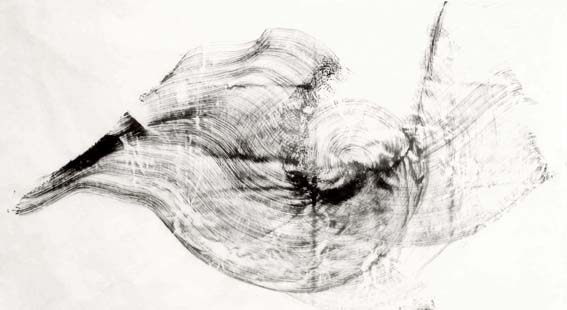
Wáng Bì 王弼 (226–249):
hànyǔ pīnyīn
將欲取天下而為之,吾見其不得已。
jiāng yù qǔ tiān xià ér wéi zhī ,wú jiàn qí bú dé yǐ 。
天下神器,不可為也,
tiān xià shén qì ,bú kě wéi yě ,
為者敗之,執者失之。
wéi zhě bài zhī ,zhí zhě shī zhī 。
夫物或行或隨、或歔或吹、
fū wù huò háng huò suí 、huò xū huò chuī 、
或強或贏、或挫或隳。
huò qiáng huò yíng 、huò cuò huò huī 。
是以聖人去甚、
shì yǐ shèng rén qù shèn 、
去奢、去泰。
qù shē 、qù tài 。
[ Non-Intervention is crucial for the unfolding of creatures as well as communities: because of the spiritual essence of "All under Heaven".
[ Appreciating variety and changeability of all things and beings, the Sage keeps to the Middle Path and to human dignity.
01-02:
Should you intend to take hold
of all world and interfere with it?
I see: that will not succeed, finally.
01-02 "All world" (everything under Heaven) also means in relatively isolated Old China... the Chinese empire!
To take hold of the state, to take over the empire: he, whoever tries this, will not succeed by any interfering (being overactive), nor by way of violent military-political annexation, but only by "acting without acting"! 無為 wú wéi (ch. 48).
Weapons are ill-omened tools, and you cannot reach your goal by (delight in) killing (ch. 30, 31).
03-06:
The world as a spiritual vessel
cannot be interfered, as well:
interfering ones destroy it,
grasping ones lose it.
03-04 The realm is not just a thing – it is a vessel filled with spirit!
Spiritual means "without form" (ch. 41), a vessel is a combination of something formless and a form, the shapeless mind fills the shape of matter: like human beings, the world is a vessel, full of spirit.
One can only act upon a form, but not upon something that is formless; hence, it is hopeless to interfere in an empire... and still hold on to it.
05-06 Because the nature of the myriad of entities' is spontaneous self-regulation 自然 zì rán, one can be receptive to them and permeate them, but not to act upon them or get them to do something [Wáng Bì 王弼].
Interfering will unavoidably destroy the essence of their shapeless, timeless nature, therefore capturing a state (as a multitude of beings) must unavoidably lose it.
07-10:
So some creatures advance, some follow,
some sniffle, others blow,
some vigorous, some weak,
some destroy, others get destroyed.
07-10 Individual and supra-individual processes demonstrate the changeability of 'every-thing'.
When there is no impulse or interference from outside [Wáng Bì 王弼], they follow the options of their Way, at first growing stronger, later on aging and departing from this life (ch. 30).
Four antithetic and parallel juxtapositions indicate the variety and destiny of all creatures; thus, a wise ruler will promote his subjects' own nature, as well as the self-development of the state... neither deceiving nor confusing either of them.
11-13:
Therefore, wise men avoid
extravagancies,
exaggerations,
excesses.
11-13 It follows from the above-mentioned insights that the sage – and the wise ruler – value the nature of all creatures; consequently, it is logical that they avoid all kinds of coercion, all action beyond natural adapting, all "loss of the center":
[ they avoid committing excesses, they do not strive for great heights,
[ they avoid the propensity to exaggerate, they are not presumptuous,
[ they evade any use of extremes, they keep to the center.
Thus, preserving the Golden Mean, they prevent the people's doom, debasement, and indignity.
[
30 - The Power of Ahimsa अहिंसा
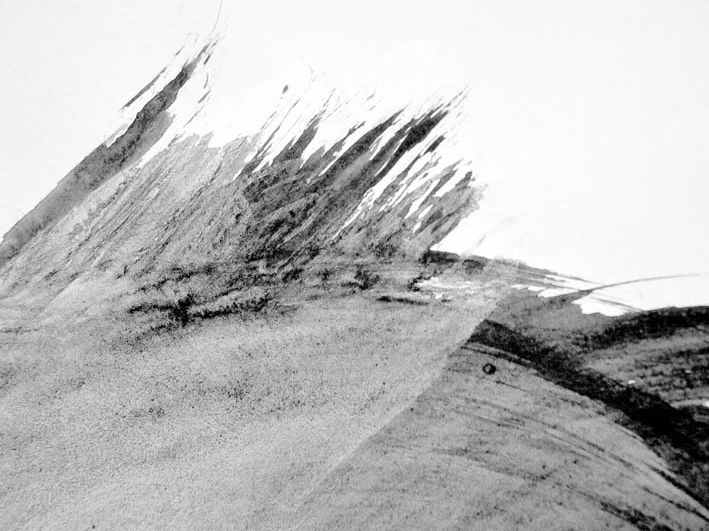
Wáng Bì 王弼 (226–249):
hànyǔ pīnyīn
以道佐人主者,不以兵強天下。
yǐ dào zuǒ rén zhǔ zhě ,bú yǐ bīng qiáng tiān xià 。
其事好還。師之所處荊棘生焉。
qí shì hǎo hái 。shī zhī suǒ chù jīng jí shēng yān 。
軍之後必有凶年。善有果而已,
jun1 zhī hòu bì yǒu xiōng nián 。shàn yǒu guǒ ér yǐ ,
不敢以取強。果而勿矜。
bú gǎn yǐ qǔ qiáng 。guǒ ér wù jīn 。
果而勿伐。果而勿驕。
guǒ ér wù fá 。guǒ ér wù jiāo 。
果而不得已。果而勿強。
guǒ ér bú dé yǐ 。guǒ ér wù qiáng 。
物壯則老,是謂不道,不道早已。
wù zhuàng zé lǎo ,shì wèi bú dào ,bú dào zǎo yǐ 。
[ This chapter is about the Power of अहिंसा, ahiṃsā, f., Sanskrit, "do not harm" = non-violence.
[ In Greek antiquity, even for the frequently compared Heraclitus, war was "The Father of all things".
[ During the Warring States Period, war was for Lǎozĭ a despicable means for achieving political aims.
01-03:
In the spirit of Dào, a people's leader
does not use weapons to attack all world:
In his affairs he prefers the retreat.
01-03 In contrast to ancient Greek Thought, war and weapons were considered by early Dàoists as destructive and myopic, the craft of war as calamitous (ch. 31).
Even if one had no choice, using weapons for defense are regarded as ultima ratio.
Attacks tend to provoke counter-attacks! In managing their affairs, wise leaders will rather strive for Returning: back to the non-violent beginning, to the roots of Oneness (ch. 34).
04-07:
Troops' encampments
let there grow thorns and thistles;
after great wars,
famine years will certainly follow.
Good ones achieve results,
yet stop then,
not daring,
thus to seize everything violently.
04-05 The epilogue to war is initially suppressed and ignored, but afterwards heinous and shameful troops bring about horrific evils: thorns and thistles [Genesis 3:18; Matthew 7:16], ruined agriculture and devastated fields, famines and diseases leave the people hungry and hopeless.
06-07 Good leaders, in the spirit of Dào, "will just get (things) done and that is all" [Wáng Bì 王弼].
Forced to bring a stop to terror and chaos, they will neither conquer nor annex, they only result at which they aim is peace and order.
08-12:
They achieve results,
yet do it not bragging,
they achieve results.
yet do it not boasting,
they achieve results.
yet do it not haughtily,
they achieve results.
yet have no choice.
They achieve results
yet do it not violently.
08-12 Thus, having got things done, good leaders do not need to show off, they do not feel any vain sense of triumph, but rather grief and sorrow like at funeral rites (ch. 31).
Wise rulers achieve peace and order BY only using weapons, when; due to circumstances, they have no alterntive: il "ne combat que par necessité" (they fight only if necessary) [Stan. Julien, 1842!].
Non-violence is the legitimate daughter of non-action 無為 wú wéi; pacifism and (reluctant) self-defense are the last step before "Love your enemies" [Matthew 5:44].
13-15:
Entities overgrow, then they age,
called not in Dào:
not in Dào ends prematurely.
13-15 Those who do not follow the way of reluctant self-defense, who attack without necessité, who misuse victory – those violent leaders will achieve temporary power, but they will be subject to a higher law:
Not following Dào's spirit, not "on the (right) Way" means quickly finished; like "Hence, neither whirlwinds last all morning, nor downpours all day" (ch. 23), swift military might will not endure.
The more quickly overgrown and prematurely changed, the farther from Dào's immutability and constancy, the sooner will premature aging and senescence follow, ending in dào-less downfall and decease, in demise and death.
[
31 - Victories for Peace
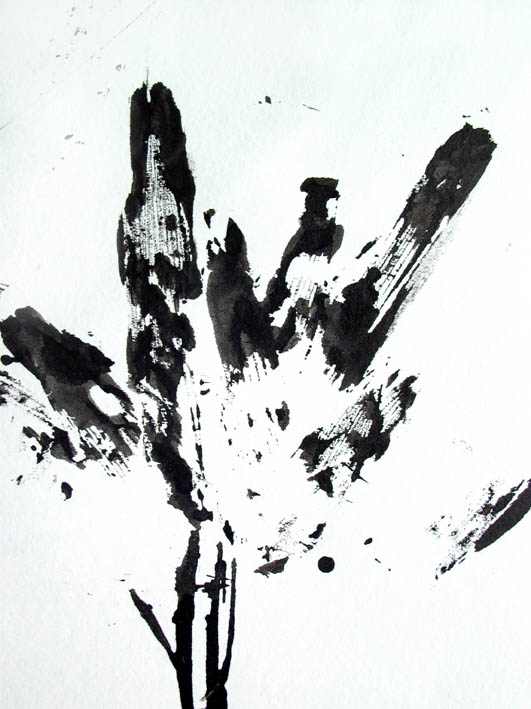
Wáng Bì 王弼 (226–249):
hànyǔ pīnyīn
夫佳兵者不祥之器,物或惡之,故有道者不處。
fū jiā bīng zhě bú xiáng zhī qì ,wù huò è zhī ,gù yǒu dào zhě bú chù 。
君子居則貴左,用兵則貴右。
jūn zǐ jū zé guì zuǒ ,yòng bīng zé guì yòu 。
兵者不祥之器,非君子之器,
bīng zhě bú xiáng zhī qì ,fēi jūn zǐ zhī qì ,
不得已而用之,恬淡為上。
bú dé yǐ ér yòng zhī ,tián dàn wéi shàng 。
勝而不美,而美之者,是樂殺人。
shèng ér bú měi ,ér měi zhī zhě ,shì lè shā rén 。
夫樂殺人者,則不可得志於天下矣。
fū lè shā rén zhě ,zé bú kě dé zhì yú tiān xià yǐ 。
吉事尚左,凶事尚右。
jí shì shàng zuǒ ,xiōng shì shàng yòu 。
偏將軍居左,上將軍居右。
piān jiāng jun1 jū zuǒ ,shàng jiāng jun1 jū yòu 。
言以喪禮處之。殺人之眾,
yán yǐ sàng lǐ chù zhī 。shā rén zhī zhòng ,
以悲哀泣之,戰勝以喪禮處之。
yǐ bēi āi qì zhī ,zhàn shèng yǐ sàng lǐ chù zhī 。
[ As a continuation of ch. 30 [lines 01-12], in the first pacifism in human history! (with self-defence), weapons as tools of warfare are now evaluated in greater details.
[ The traditional meanings of left and right in the military ranking and in civil ceremonies are here critically reinterpreted by Lǎozĭ, with a touch of humor(!), to illustrate the "loss in a win" and the appropriate grief and mourning instead of a sense of triumph after a victory.
[ Ch. 31 is one of the two chapters (along with ch. 66) not commented by Wáng Bì 王弼 as the earliest commentator of the Dàodéjīng; according to early reports, he regarded it as not original or as, in part, a commentary on ch. 30 [nonetheless ch. 31 is reproduced in all other sources, see below].
[ The lines 04-07 & 17-18 are discussed by various authors as comments that were integrated into the text later on.
[ Wáng Bì 王弼 mentioned ch. 31 only in his commentary to ch. 30: "... (the ruler) does not emulate the way of the military, but [, as the Laozi 31 says,] 'makes use [of the troops] only because he cannot help it,' what is there to brag and boast about?" [Wagner p. 222].
01-03:
Even finest weapons are
inauspicious instruments,
creatures might detest them –
wherefore Dào followers do not hold them.
01-03 The glorification of the brilliantly designed weapons of many leaders cannot hide the fact that they always are foreboding ill-omened tools, made to hurt and to kill fellow human fellows.
Creatures fear and loathe all kinds of arms and weapons, since they are injured, wounded, or killed by them.
Followers of the Dào, however, impartially show compassion and love to all entities, therefore they refuse to possess or to use other harmful tools.
04-11:
At home, then noblemen value the left side,
using weapons, then they value the right side:
weapons are ill omen's,
but not at all noble-men's instruments.
Having no choice but using them,
peace and quiet will do best.
Do win, yet not enjoying;
but delight of that were joy in killing men;
for those with delight in killing men
cannot find fulfillment on Earth then, indeed.
04-05 Because the vast majority of people are right-handed, weapons are generally used with the stronger and more skillful right arm.
At home, however, noble people use the left side for peaceful and happy occasions.
Leniency and indulgence correspond to Yin on the left side, harshness and intransigence to Yang on the right side.
06-08 Inauspicious, ill-omened tools like weapons of all sorts are normally not used by noble people who follow the Dàoist principles.
This first ever clear pacifism permits the practice of self-defense as ultima ratio, in case of emergency when there is no other choice.
Even then, persons defending themselves in the spirit of Dào will look to do the least possible harm and for a way to return to tranquility and peace.
Weakness is the true strength.
09-11 Even a victory that has been inflicted is not at all gratifying, because it has been gained by bloodshed.
To enjoy winning in war would mean to relish the killing of human beings – a total estrangement from Dào's realization in life: Dé, the Inner Power.
Even killing criminal evildoers by way of death sentence and execution would mean taking the place of the Great Carpenter. Doing the work of the natural Grim Reaper, one would hurt one's hands indeed (ch. 74).
Human beings who delight in killing other human beings: they will not manage to find their true purpose and destiny on Earth.
12-16:
On auspicious affairs
they favor the left,
on inauspicious affairs
they favor the right.
The deputy general in military
stands on the left,
the top general in military
stands on the right,
saying: let's place them like at funeral rites!
12-13 If there are occasions for celebrating happy moments, then in Chinese custom, those positive experiences are attributed to the left side; unhappy, painful events, on the other hand, like funerals for instance, these negative experiences correspond to the right side.
These sorts of civil customs, on auspicious or inauspicious occasions, 'invite' comparison with the military ones...
14-16 In old Chinese military customs, a similar dichotomy in fact existed: lower-ranking officers stood on the left; higher-ranking ones, all the way up to the top general, on the right.
The greater the responsibility for killing people in military actions, the greater the correspondence to civil burials: this symbolizes the ill-omened interference in the spontaneous 自然 zì rán self-regulation of Nature and... the Grim Reaper.
Thus Lǎozĭ points to the fact that those who have killed the most are placed on side for burials ...
17-18:
Were numerous of people killed,
in grief and sorrow beweep them;
place even battle winners
like at funeral rites!
17-18 It follows that killing many human beings is not an occasion to celebrate victory with a sense of triumph, but rather to place the victors on the side of the burial, in order appropriately to weep for the victims!
This awareness allows adequate feelings to be regained in time: "... when armed forces confront one another, the more compassionate ones prevail" (ch. 69).
[
32 - Transcendency
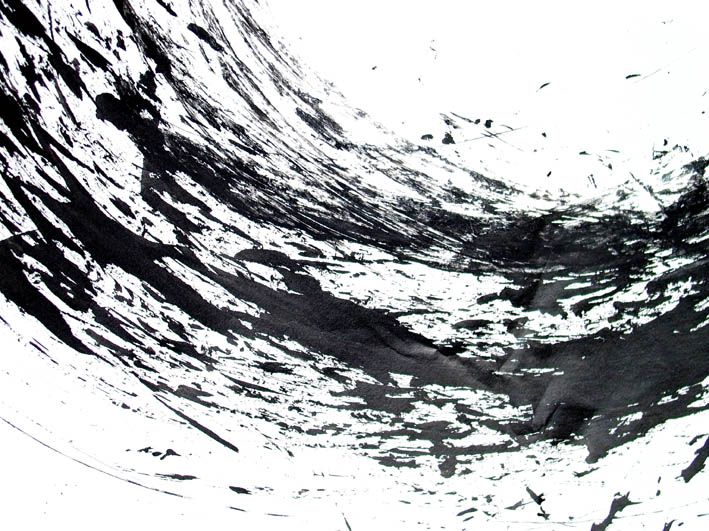
Wáng Bì 王弼 (226–249):
hànyǔ pīnyīn
道常無名。
dào cháng wú míng 。
*樸雖小1天下莫能臣也。
*pǔ suī xiǎo 1tiān xià mò néng chén yě 。
侯王若能守之,萬物將自賓。
hóu wáng ruò néng shǒu zhī ,wàn wù jiāng zì bīn 。
天地相合以降甘露,民莫之令而自均。
tiān dì xiàng hé yǐ jiàng gān lù ,mín mò zhī lìng ér zì jūn 。
始制有名,名亦既有,
shǐ zhì yǒu míng ,míng yì jì yǒu ,
夫亦將知止,知止可以不殆。
fū yì jiāng zhī zhǐ ,zhī zhǐ kě yǐ bú dài 。
譬道之在天下,猶川谷之於江海。
pì dào zhī zài tiān xià ,yóu chuān gǔ zhī yú jiāng hǎi 。
After treating the practicality of pacifism in ch. 30 & 31, Lǎozĭ goes back to the roots of primordial simplicity and the transcendency of the Dào, as the foundation of the development of social organization and communication.
01-02:
Dào: forever nameless.
Nativeness, although small, nobody
worldwide can make it serviceable, too.
01-02 The transcendental aspect of Dào, 'disguised' in absolute nothingness, "without shape and attachment" (ch. 21), will be timelessly incomprehensible (ch. 01), while preparing the tiniest and minutest something ever ("Big"(!) Bang).
The intelligent, the brave, the skillful, and the strong can be put to service for abilities, wars, business, burdens. [following Wáng Bì 王弼].
Yet, the ultimate naturalness of the uncarved block 樸 pǔ (ch. 15, 28, 32, 57), as primordial simplicity, is protected by its unadorned quality against use and misuse.
"Nothing too much" Μηδὲν ἄγαν (mēdén ágan) [Solon... s. * in ch. 33]. Keep to the unadorned and reach the Way!
03-06:
If prince and king could hold to that,
all entities were by themselves like guests.
Heaven and Earth would mutually unite,
for sending down sweet dew.
The people, under nobody's order,
and yet by themselves orderly.
03-04 If only the royal leaders could "embrace the unadorned" (ch. 19), and their spirit were "not hurt by desires" – all subjects would 'submit of their own accord, freely like guests', and "~ find by themselves their balance." [Wilhelm].
05-06 "Heaven and Earth being in harmony will induce sweet dew to fall"* – reminding a bit of
„Es war, als hätt' der Himmel
die Erde still geküsst...“
,It was as if the Sky
had silently kissed the Earth"
in: Eichendorff's „Mondnacht“
This manna-like reward would come "automatically without their striving for it" [*Wáng Bì 王弼 / Wagner], accordingly to an egalitarian-democratic intent [Kalinke].
Without interference by the wise ruler, thus by way of their true nature, the subjects become voluntarily virtuous, "regulated without being given [particular] orders" [*].
07-10:
Regulations started,
there are names.
If in turn, designations already exist,
then, in turn, you should know to cease:
if you know to cease,
so you cannot be endangered.
07-10 The beginning of language as communication is not attributed to a transcendent being or to an idea, but to people's practical social organization: "the Unadorned has dispersed" and the Sage as the Great Regulator... deploys officials and elders." (ch. 28). Then names and classifications will determine 'the honorable and the lowly'... [Wáng Bì 王弼].
To master the dangers of description and naming, as well as the loss of primordial simplicity 樸 pǔ, only understanding how to cease, and to stop hazardous developments, will help to manage the resulting social conflicts.
11-12:
Symbolizing Dào's existing in the world:
like the flow from rivulets
into rivers and ocean…
11-12 To symbolize the Way, which is practiced 'Everywhere Under Heaven', the suppleness of water is used again: "The rivulets ... are not striving [to flow into] the rivers and seas", and the flow is "not caused by the rivers and seas calling them" [Wáng Bì 王弼 / Wagner], they flow of their own volition!
Natural, spontaneous self-regulation without interference thus illustrates the mysterious course of the water, as well as the mystery of the Way of the Dào.
_________________
* "Sweet dew" [Chinese myth]: the morning dew would taste like honey, when the realm is in perfect peace.
[
33 - Enlightenment
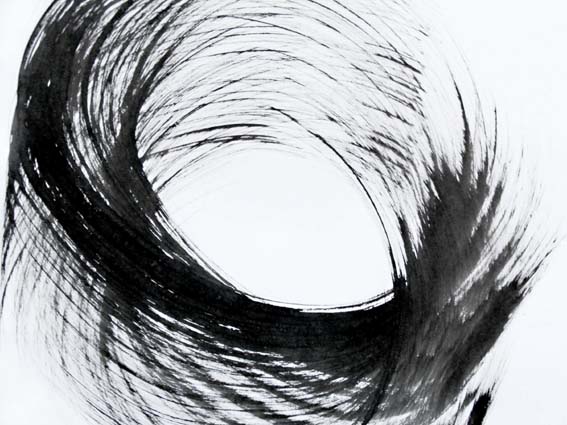
Wáng Bì 王弼 (226–249):
hànyǔ pīnyīn
知人者智,自知者明。
zhī rén zhě zhì ,zì zhī zhě míng 。
勝人者有力,自勝者強。
shèng rén zhě yǒu lì ,zì shèng zhě qiáng 。
知足者富。強行者有志。
zhī zú zhě fù 。qiáng háng zhě yǒu zhì 。
不失其所者久。
bú shī qí suǒ zhě jiǔ 。
死而不亡者,壽。
sǐ ér bú wáng zhě ,shòu 。
A chapter famous for both the Chinese "Gnothi seauton" at the beginning and the "dying, yet no doom" line at the end – with multiple interpretations.
01-04:
Knowing others – intelligence,
knowing oneself – enlightenment;
overcoming others – force,
overcoming oneself – strength.
01-02 [A ruler who]
[ knows, understands, sees through others... (merely) has intelligence (knowledge about them): yet this "is nothing compared to seeing through oneself". [Wáng Bì 王弼 / Wagner]*
[ knows, understands, sees through himself... has enlightenment (knowledge about one-self): because there "is nothing compared to using one's intelligence on oneself... the other entities will then not evade you!"*
- Of course, this passage was often compared with "Gnothi seauton":
γνῶθι σ[ε]αυτόν, gnōthi s[e]auton; nosce te ipsum, temet nosce = "Know Thyself".*
03-04 [A ruler who]
[ overcomes, defeats, vanquishes others.. (merely) has force (control of them): yet this "is nothing compared to vanquishing oneself [as] there is no other entity able to wear down one's strength.*
[ overcomes, defeats, vanquishes himself... has strength ("powerfully practices [the Way]"): if "one's strength is used on oneself, the other entities will be without cunning".*
05-08:
Knowing, when enough: wealth,
forceful advancing: willpower;
not losing one's place: endurance;
dying, yet no doom: longevity!
05-06 [A ruler who]
[ "knows how to have enough, will be wealthy ... will automatically have no loss" [*].
[ "powerfully practices [the Way], will impose his will. [*].
Cf. ch. 41: Superior scholars hear of Dào, strive and practice it: "Practising [the Way] to the utmost of his capacities ... he will necessarily have his will satisfied."*
07-08 [A ruler who]
[ "does not go astray from his place, will stay long [at it]. If with "enlightenment he investigates himself (...) and measures his strength and acts [accordingly]"*, not leaving his place, he will endure.
[ "while mortal [himself], does not [assume that the Way] perishes will live a long life." If the Dào of life is not lost, is not doomed, does not perish, and thus oneself, though mortal, does not perish, then "one will manage it to complete one's years.
When the body dies, the Way still persists; all the more does the Way not end while the body is still alive." [Wáng Bì 王弼 / Wagner].
Laozi beholds death as returning, back to the roots of Being, where the Dào is at home.
Thus, our existence is part of the Life of Dào again, as before, when a part of Life in Dào had come into existence, mediated by the Inner Power of Dé.
Dào's ability to point to the Unity of Opposites, in the case of Yin and Yang as death and life, can inspire our tiny grain of time to that mystic yearning and longing – to be a part of the Flow again in the Ocean of Timelessness.
_______________________
*Temple of Apollo at Delphi by Chilon of Sparta = one of the „Seven Sages“**. 1st source: Heraclitus: “All men have a share in self-knowledge and sound thinking” (B116).
**„Seven Sages“: Thales of Milet, Pittakos of Mytilene, Bias of Priene, Solon of Athen, Kleobulos of Lindos, Chilon of Sparta, Myson of Chen[-ai]
{not Periander!}.
[
34 - Unselfish Grandeur
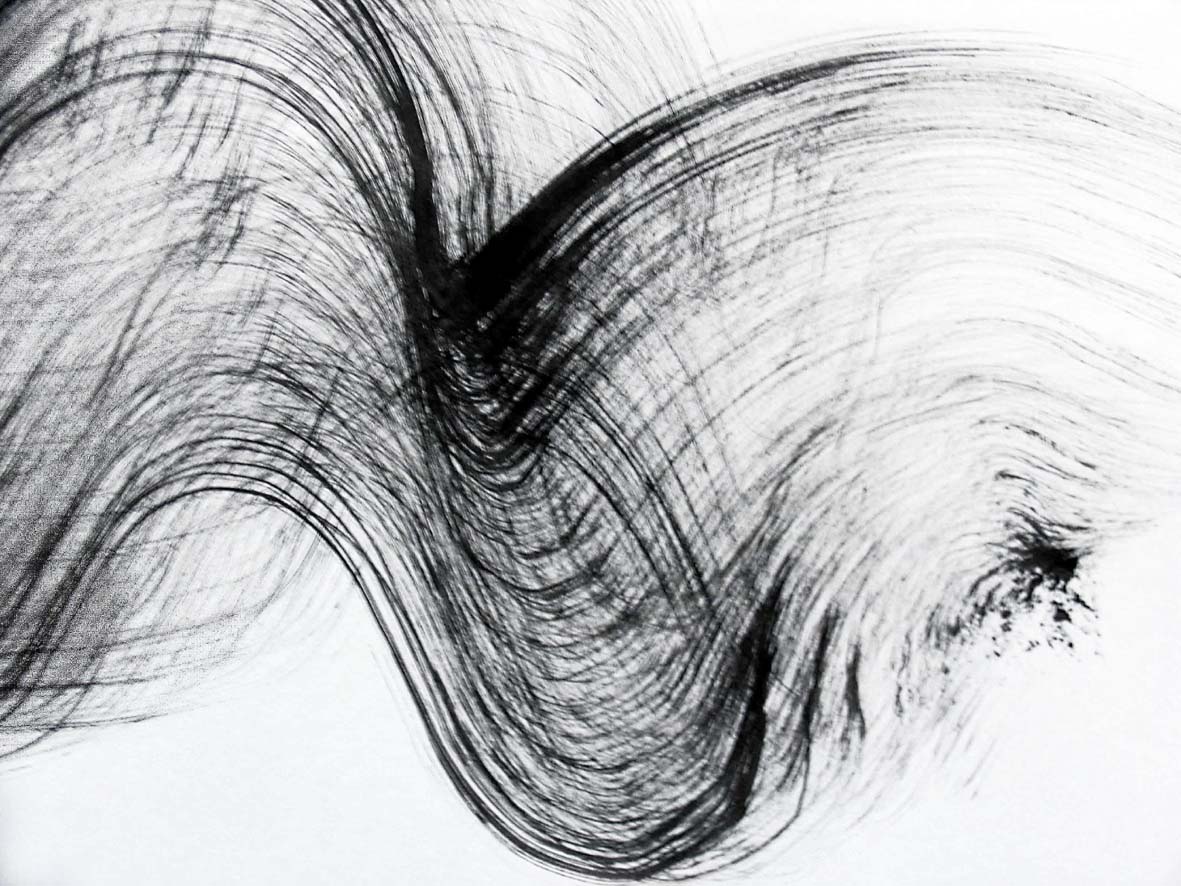
Wáng Bì 王弼 (226–249):
hànyǔ pīnyīn
大道氾兮,其可左右。
dà dào fán xī ,qí kě zuǒ yòu 。
萬物恃之以生而不辭,功成而不名有。
wàn wù shì zhī yǐ shēng ér bú cí ,gōng chéng ér bú míng yǒu 。
衣養萬物而不為主,常無欲可名於小。
yī yǎng wàn wù ér bú wéi zhǔ ,cháng wú yù kě míng yú xiǎo 。
萬物歸焉,而不為主,可名為大。
wàn wù guī yān ,ér bú wéi zhǔ ,kě míng wéi dà 。
以其終不自為大,故能成其大。
yǐ qí zhōng bú zì wéi dà ,gù néng chéng qí dà 。
Revisiting the topic of ch. 32, Lǎozĭ is approaching Dào's omnipresence and greatness in being small – as the unselfish Mother of the myriads of beings, accomplishing its work and completing its grandeur without raising claims, and as a role model for the Sages.
01-04:
Great Dào, all-overflowing, oh,
it's able to be everywhere.
Myriads of creatures depend on it, also for
being born, but they are never refused.
its achievements are completed,
but not claimed as possession.
01-02 Dào is great, and it overflows everything, floating and billowing left and right, ahead and behind, above and below, ubiquitous in space and time!
Its aqueous adaptability invariably lends all entities its support; its "Nothingness can permeate all things, even the gapless!" (ch. 43).
03-04 The myriad of creatures is dependent on Dào, firstly insofar as their primordial images (ch. 21) are born into being; secondly within the period of their life, they will be unconditionally maintained by it. They are nurtured and never rejected, and Dào does not give any orders to them.
All Dào's works and merits are accomplished, all its actions and achievements are completed without any express claiming of possession: Heaven's Honey, Dào's Dew (ch. 32) are for free.
05-06:
It dresses and feeds all beings,
but it is not becoming their lord and master;
constantly without desire,
it can be named small.
05-06 Dào clothes the ten thousand entities, it rears and feeds all beings, and yet it never makes itself their lord and master, their commanding overlord.
As it does all this without need and unselfishly, and vanishes without any claim or desire, with unconditional love and care: that is why it can be described as small.
07-08:
Myriads of creatures return to it,
but it is not becoming their lord and master:
it can be named as great.
07-08 Countless creatures return to it, honoring and valuing Dào 道 with Dé 德 (ch. 51), yet it will never become their commanding overlord, their lord and master.
"But a force caused them not to known which they are based" [Wáng Bì 王弼 / Wagner], that is why Dào can be described as great.
09-10:
Because it finally
does not consider itself as great,
therefore it can complete its greatness.
09-10 Metaphysical paradoxes are instructive practical examples of the Unity of Opposites.
Dào does not consider itself as great, it shows no intention to be concerned about itself, and the Sage, following Dào's example, does likewise.
Therefore Dào and Wise men equally unselfishly have the capacity to accomplish their work and to complete their grandeur.
[
35 - Incorruptibility
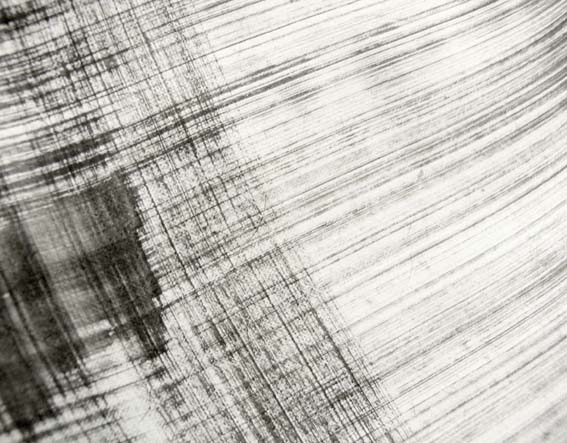
Wáng Bì 王弼 (226–249):
hànyǔ pīnyīn
執大象天下往。
zhí dà xiàng tiān xià wǎng 。
往而不害安平太。
wǎng ér bú hài ān píng tài 。
樂與餌,過客止。
lè yǔ ěr ,guò kè zhǐ 。
道之出口淡乎其無味。
dào zhī chū kǒu dàn hū qí wú wèi 。
視之不足見。
shì zhī bú zú jiàn 。
聽之不足聞。
tīng zhī bú zú wén 。
用之不足既。
yòng zhī bú zú jì 。
The first lines resume the last one of ch. 34. on wise men's (and rulers') Way; the middle part compares distractions and detours with the Way beyond the senses (in the last paragraph).
01-02:
Keep to the Great Image:
all the world will come to you,
yet not suffering harm –
secure and supremely peaceful!
01-02 The first line here subsequently explains the last one in ch. 34: the Sage follows Dào's example, equally unselfishly to accomplish their work and to complete their grandeur.
Holding on to the Great Image (of the imageless Dào) would make all entities come to the wise men (or ruler), attracted by its all-embracing and penetrating Inner Power of Dé.
No creature would suffer any damage, hurt, or harm, instead they will enjoy utterly peaceful security, embracing the One (cf. ch. 22: enlightened, prominent, meritorious, and enduring).
03-05:
Music together with alluring food...
let even passing wayfarers halt;
yet Dào's speech,
alas, seems bland and tasteless.
03-05 But there are many distractions for the wayfarers in all of us! Music, along with seductively fragrant dishes and delicacies like sweet rice cake, let the passing wanderer stop and stay a while.
But when Dào speaks, its words sound stale and bland, insipid and tasteless!
06-08:
Look at it – it seems invisible,
listen to it – it seems inaudible,
but use it – it seems inexhaustible!
06-08 To look at Dào is not sufficient to see it, so it seems invisible; to listen to it is not enough to hear it, so it seems inaudible: it cannot be handled by eye and ear for the wayfarer, who is lured by music and delicacies and misses salt and spices... [**v. Strauß, 1870 p. 167].
And now Lǎozĭ artfully uses the same sentence structure to emphasize the opposite meaning, when it comes to using the Dào: then nothing is sufficient to exhaust it!
The wayfarer could, all entities can endlessly apply the Dào; the Old Master demonstrated "the contrast between the perishability of earthly, sensual pleasures, and the imperishability of that what Taò [sic!] grants" [**].
[
36 - The Power of Paradox
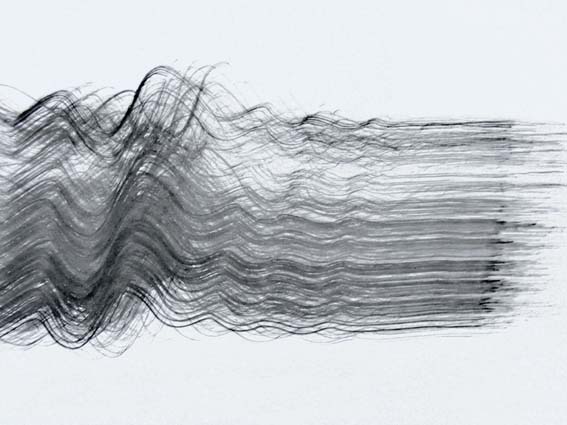
Wáng Bì 王弼 (226–249):
hànyǔ pīnyīn
將欲歙之,必固張之。
jiāng yù xī zhī ,bì gù zhāng zhī 。
將欲弱之,必固強之。
jiāng yù ruò zhī ,bì gù qiáng zhī 。
將欲廢之,必固興之。
jiāng yù fèi zhī ,bì gù xìng zhī 。
將欲取之,必固與之。
jiāng yù qǔ zhī ,bì gù yǔ zhī 。
是謂微明。柔弱勝剛強。
shì wèi wēi míng 。róu ruò shèng gāng qiáng 。
魚不可脫於淵,國之利器不可以示人。
yú bú kě tuō yú yuān ,guó zhī lì qì bú kě yǐ shì rén 。
[ Lǎozĭ takes an unequivocal stand on not using weapons and violence (ch. 30, 31), he illustrates the practicability of pacifism (ch. 32), how to overcome oneself, to find endurance and longevity (ch. 33), to follow Dào's unselfish grandeur (ch. 34), and to preserve the peaceful, inexhaustible Great Image (ch. 35) [cf. v. Strauß' outline].
[ But now, he emphasizes the secret power of paradox intervention and how leniency and meekness to prevail, without showcasing one's superiority.
01-09:
Should you just intend
to contract something,
you must definitely first expand it;
should you just intend
to weaken something,
you must definitely first strengthen it;
should you just intend
to abolish something,
you must definitely first let flourish it;
should you just intend
to take away from something,
you must definitely first give it:
This is called subtle insight.
01-08 As one of the (Dàoist) principles of paradox, one again Heraclitus' enantiodromia – 'every-thing' is flowing, changing and transforming itself reversibly into its opposite (ch. 2) – is used in four variations(!) to illustrate a hidden Law of Nature, here even applicable like a "crisis as opportunity" by way if "paradox intervention" [Kalinke].
[ Wise men (and rulers) with patient timing (starting with 無為 wú wéi) certainly achieve best results efficiently and effortlessly.
[ This principle was misused by Legalists like Hán Fēizǐ 韓非子 as a Machiavellian strategy to conquer states, but of course "such self-serving manipulation is not consistent with Daoist sensibilities" [Ames & Hall].
[ On the other side, these recommendations can be applied to wipe out the "violent and brutal'" and to "do away with upheavals and riots" by way of self-destruction instead of physical punishment; but expansion that goes further than is required is also dangerous, "because of the growing hostility of the violent" [*Wáng Bì 王弼 / Wagner].
09 To know this paradox and its application means subtle clarity ("reconditum clarere") [**v. Strauß], insight in the concealed secret behind it, "wonderfully minute and obscure, yet brilliant" [Chang], "insight in the minute" (the nature of entities) [*].
10-13:
Soft and weak overcome hard and strong.
Fish never should be taken off
from the depths,
accordingly the state's sharp tools
should never be displayed to the people.
10 "Soft overcomes hard, weak overcomes strong" has come to epitomize Dàoist philosophy:
[ "... in the whole world, nothing is softer and weaker than water, and yet: in attacking the firm and strong, nothing can surpass it"; but...
[ "In the whole world, there is no one who would not know it, yet no one can put it into practice" (ch. 78).
[ Why is the yielding superior to the unyielding, the delicate to the rigid?! "Hence, rigidity and strength are companions of death, softness and slightness are companions of life" (ch. 76).
11-13 A fish out of the deep water "will necessarily be lost", not being in its natural element anymore; similarly, if the ruler displays his practical instruments (for example, those for physical punishment) out for display, threatening with weapons and violence, that "inevitable, it will also be a failure", and will evoke a counter strike [*]:
Human beings will also not be found again in their element (of pliability!).
[
37 - The Victory of Contentedness
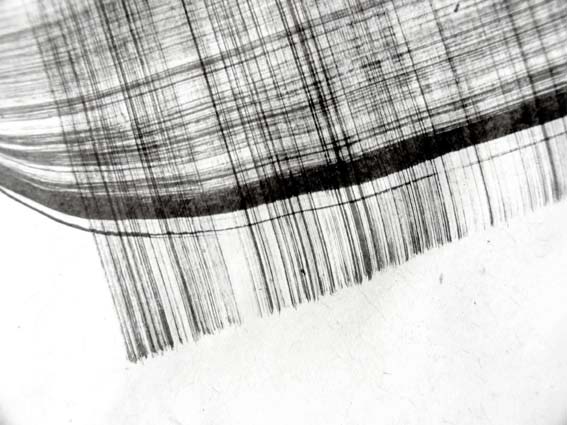
Wáng Bì 王弼 (226–249):
hànyǔ pīnyīn
道常無為,而無不為。
dào cháng wú wéi ,ér wú bú wéi 。
侯王若能守之,萬物將自化。
hóu wáng ruò néng shǒu zhī ,wàn wù jiāng zì huà 。
化而欲作,吾將鎮之以無名之樸。
huà ér yù zuò ,wú jiāng zhèn zhī yǐ wú míng zhī pǔ 。
無名之樸,夫亦將無欲。
wú míng zhī pǔ ,fū yì jiāng wú yù 。
不欲以靜,天下將自定。
bú yù yǐ jìng ,tiān xià jiāng zì dìng 。
At the end of the first part, some true basics of the 道德經 Dàodéjīng are treated in a concise form:
無為 wú wéi Non-interference
樸 pǔ Simplicity
無名 wú míng Namelessness
無欲 wú yù Desirelessness
自定 zì dìng Self-determination
01-02:
Dào constantly acts without interfering,
and yet nothing remains undone.
01-02 無為 wú wéi and 自然 zì rán are two pillars of Dàoist philosophy.
[ The first offers all systems the possibility to run, without disturbing them by artificial interference.
[ The second allows all beings to run freely and undisturbed, spontaneously and naturally; hence, it leaves nothing undone.
[ All "... ten thousand kinds of entities" appeal to Dào "... to be begun and perfected" [*Wáng Bì 王弼 / Wagner].
[ All rulers should "observe Dào's methods", how by its power as Unmoved Mover [Aristotle] of everything it combines "Non-Doing and Doing in a mysterious way" [**v. Strauß, 1870 p. 172].
03-06:
If prince and king
could hold to this,
all beings would develop naturally.
They would develop,
and yet desires would grow:
I would calm down them by
the natural simplicity
of that namelessness.
03-04 If only the royal rulers could "embrace the Unadorned" (ch. 19), and their 'spirit not hurt by desires' – all subjects would develop and 'submit of their own accord', and "~ find by themselves their balance" [Self-organization of Nature; ch. 32 / Wilhelm].
05-06 If, in spite of this development, desires should form and arise – wise men would "quiet them down by means of the simplicity of the Nameless" (but without becoming their overlord) [*].
07-09:
For this nativeness of
the nameless will also
lead to desirelessness.
Without desire, thus calmness:
all the world will become self-regulating.
07 Immersion and contemplation into the plainness (of the uncarved wood) 樸 pǔ and the naturalness of the unnameable will bestow an absence of needs (esp. for competition), as well:
"Not to desire means to be satisfied" [** p. 174].
08-09 Absence of desire allows people to become calm: all passion overcome, peace and calm emerge, in each and everyone, as well as in the community and the realm.
This condition of tranquility and serenity makes "All Under Heaven", hence the whole world, determine itself, the state becomes naturally regulated, without any coercion, of its own volition.
[
Part 2: Dé 38–81
德 Inner Power

© Adrian Chan-Wyles, PhD, (ShiDaDao) 2014. http://icbi.weebly.com/etymology-of-the-ideogram-lsquodaorsquo.html
![]() www.icbi.weebly.com/icbi-projects.html
www.icbi.weebly.com/icbi-projects.html ![]() Qianfeng
Daoism (UK) - Introduction
Qianfeng
Daoism (UK) - Introduction ![]() Etymology
of the Ideogram ‘Dao’
Etymology
of the Ideogram ‘Dao’
德 etymology = "The steps of a perfected heart/mind, a straight footstep from the heart/mind" [Nina Correa, p. 268].
The parts Dào and Dé have been interchanged in the Mǎwángduī scripts: chs. 1-37 follow chs. 38-81; furthermore, ch. 24 precedes chs. 22 and 23, chs. 40 and 41 have been interchanged, and chs. 80 and 81 are placed after ch. 66.
38 - The Power of Non-Intentionality
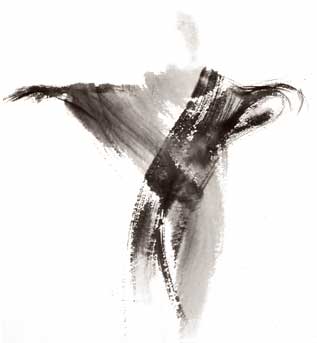
Wáng Bì 王弼 (226–249):
hànyǔ pīnyīn
上德不德是以有德。
shàng dé bú dé shì yǐ yǒu dé 。
下德不失德是以無德。
xià dé bú shī dé shì yǐ wú dé 。
上德無為而無以為。
shàng dé wú wéi ér wú yǐ wéi 。
下德無為而有以為。
xià dé wú wéi ér yǒu yǐ wéi 。
上仁為之而無以為。
shàng rén wéi zhī ér wú yǐ wéi 。
上義為之而有以為。
shàng yì wéi zhī ér yǒu yǐ wéi 。
上禮為之而莫之以應,則攘臂而扔之。
shàng lǐ wéi zhī ér mò zhī yǐ yīng ,zé rǎng bì ér rēng zhī 。
故失道而後德。失德而後仁。
gù shī dào ér hòu dé 。shī dé ér hòu rén 。
失仁而後義。失義而後禮。
shī rén ér hòu yì 。shī yì ér hòu lǐ 。
夫禮者忠信之薄而亂之首。
fū lǐ zhě zhōng xìn zhī báo ér luàn zhī shǒu 。
前識者,道之華而愚之始。
qián shí zhě ,dào zhī huá ér yú zhī shǐ 。
是以大丈夫,處其厚,不居其薄。
shì yǐ dà zhàng fū ,chù qí hòu ,bú jū qí báo 。
處其實,不居其華。故去彼取此。
chù qí shí ,bú jū qí huá 。gù qù bǐ qǔ cǐ 。
[ A sophisticated chapter on the unsophisticated
(!) Dàoist Ethics, about Dé 德, Inner Power, in the ethical point of view also as "Virtue" (ch. 2, 10, 34, 51), compared with the Confucianist values like (in descending order) 仁 rén Humaneness (benevolence), which acts without intentional acting, but interfering, 義 yì Justice (interfering and intentional), and 禮 lǐ Morality (interfering and enforcing).
[ We follow here especially ** v. Strauß's [1870 (!) p. 175-179] unsurpassed pioneering achievement and * Wáng Bì 王弼 in Wagner's ingenious and congenital rendering ["A Chinese Reading of the Daodejing", 2003].
01-10:
Highest Inner Power
reveals no Inner Power,
so it is Inner Power;
lower Inner Power
conceals no Inner Power,
so it is without Inner Power.
Highest Inner Power
acts without interfering,
and also without intentional acting;
lower Inner Power
acts without interfering,
yet with intentional acting.
Highest Humanity
acts interfering it,
yet without intentional acting;
highest justice
acts interfering it,
and also with intentional acting.
Highest Morality
acts interfering it,
yet, if nobody conforms it,
then they roll up their sleeves
and even enforce it.
01-04 With greater Inner Power one does not need to show it: "Whoever has the greatest power of comprehension "does not make anything of" [it]. [*Wáng Bì 王弼 / Wagner].
[ "Insofar as he 'possesses the receipt/capacity,' he is beyond letting it go; insofar as 'he does not make anything of the receipt/capacity,' he is beyond getting it." [*].
[ With lower Inner Power one wants to showcase it: "He with the inferior receipt/capacity does not let go of" [it]. "That is why he is without [it]." [*].
[ "Lower Virtue" claims to be "infallible" as moral law, so it is not Virtue in a higher 'innocent' sense [**v. Strauß 1870 p.176-177].
05-06 Accordingly, a high Dé "does not interfere and still nothing remains undone", the low Dé "interferes with them [the other entities], but has no ulterior motive." [*].
Higher Virtue is "without doing", someone with higher virtue "... does not act as if doing something, and acts as if not doing something", and does so unintentional. Lower Virtue, however, places value on doing intentionally, "...it wants to have the consciousness of doing good works, and wants to be recognized" [**].
07-08 The comparison with the Confucianist values begins here: only Inner Power was regarded and compared in itself: between higher and lower form, however Lǎozĭ considered this distinction as unnecessary after the Inner Power was already lost.
[ Humaneness 仁 rén (benevolence): "... the highest kindliness interferes (actively)" ... "but has no ulterior motive"; [*]. –
[ "High kindliness deserves this name only by becoming doing, by doing" ... "Humaneness would be worthless, when it remained only feeling and word" [*].
[ Justice 義 yì: "... the highest righteousness interferes" ... "but has ulterior motive" [*]. – Justice as only principle is defined as intentional and interfering; it is included in humaneness, but kindliness is not included in righteousness [*].
09-10 The third Confucianist value:
Morality 禮 lǐ (or Ritual) is for Lǎozĭ's taste so far from Dé that he puts it near to violence (!): 禮 lǐ's decay from (originally) a spiritual vessel for sacrifices to a secular ritual, changed more or less to politeness and deference, means a practiced code of behavior. This is not only interfering and intentional, but has to be enforced in all cases of contradiction or objection [*].
Accordingly, Lǎozĭ delivers a devastating judgement, in 王弼 Wáng Bì's words: He who possesses the highest ritual interferes with other entities, but "...when no one is heeding [his orders], he will roll up [his] sleeves and use violence [to enforce his will].
11-18:
Hence: Lose Dào,
and it is followed by Inner Power,
lose Inner Power,
and it is followed by humanity;
lose humanity,
and it is followed by justice,
lose justice,
and it is followed by morality.
Truly, this morality
is loyalty's and sincerity's thinning out,
and also confusion's beginning.
Prophets are Dào's embellishment,
but also folly's beginning!
11-14 The stepladder from Dào and Dé (Inner Power), via Humanity and Justice to Morality... (or in 王弼 Wáng Bì's / Wagner's parlance: Way, capacity, kindliness, righteousness, ritual) is a brief summary of the ten preceding lines: a spiritual cascade, with the "Flow of Ethics" [Confucianism] from sublime transcendence to hollow ritual.
15-16 Morality / Ritual as lowest step in the flow of social life: 老子 Lǎozĭ again emphasizes its negative consequences.
Meaning and protection by way of the Ritual will thin out 'like forest foliage', developing into an ornamental form without content, and ending in hypocrisy and anarchy, in chaos and confusion.
17-18 Periods with hypocritical ornamentation and enforced rituals make ruler and subjects rely on "Dào's blossoms": superficial embellishment, separated from the roots of Dào, outer knowledge instead of inner wisdom.
"Foreknowledge is [the result] of the Way's becoming an [external] ornament, and [thus] the beginning of stupidity [violent and counter-productive government]" [*].
If a ruler "exhausts his intelligence in order to create foreknowledge... ", then secret information and secretive cunning seem at first to enrich the ruler's renown, but "genuineness and honesty become even more damaged" [* p. 246].
19-24:
Therefore: Great, respected masters
reside in Dào's profoundness,
not merely staying on its surface.
They reside in its substance,
not staying in its embellishment.
Hence, rejecting this and choosing that.
19-24 "Therefore"... now 老子 Lǎozĭ finally draws a conclusion: out of all abovementioned negative aspects and perils, towards positive ways to live (the Dào in Dé) like great, highly respected masters – recommended for leaders, as well.
[ The Great Man, the True Sage, the ruler in the spirit of Dào: "resides in their [truthfulness' and credibility's] abundance, and does not take residence where they have worn thin" [*].
[ He "resides in its [the Way's] substantialness, and does not take residence where it [has become] an ornament" [*].
[ Wise men and rulers take the fruit, not the blossom, they prefer the inner content, not the outer husk: hence, they reject the latter and take the former. [*].
[
39 - Harmony through Simplicity
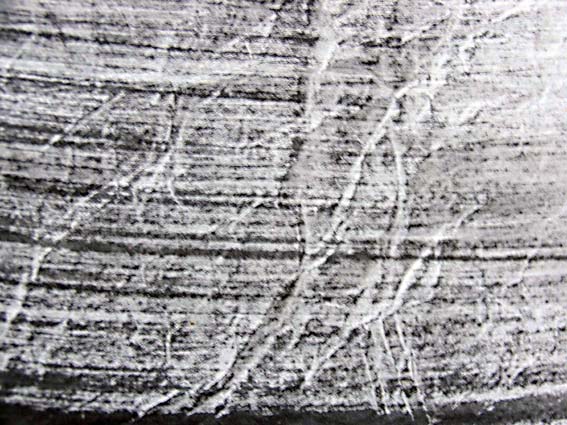
Wáng Bì 王弼 (226–249):
hànyǔ pīnyīn
昔之得一者。天得一以清。
xī zhī dé yī zhě 。tiān dé yī yǐ qīng 。
地得一以寧。神得一以靈。
dì dé yī yǐ níng 。shén dé yī yǐ líng 。
谷得一以盈。萬物得一以生。
gǔ dé yī yǐ yíng 。wàn wù dé yī yǐ shēng 。
侯王得一以為天下貞。其致之。
hóu wáng dé yī yǐ wéi tiān xià zhēn 。qí zhì zhī 。
天無以清將恐裂。地無以寧將恐廢。
tiān wú yǐ qīng jiāng kǒng liè 。dì wú yǐ níng jiāng kǒng fèi 。
神無以靈將恐歇。谷無以盈將恐竭。
shén wú yǐ líng jiāng kǒng xiē 。gǔ wú yǐ yíng jiāng kǒng jié 。
萬物無以生將恐滅。侯王無以貞將恐蹶。
wàn wù wú yǐ shēng jiāng kǒng miè 。hóu wáng wú yǐ zhēn jiāng kǒng juě 。
故貴以賤為本,高以下為基。
gù guì yǐ jiàn wéi běn ,gāo yǐ xià wéi jī 。
是以侯王自稱孤、寡、不穀。
shì yǐ hóu wáng zì chēng gū 、guǎ 、bú yù 。
此非以賤為本邪﹖非乎。
cǐ fēi yǐ jiàn wéi běn xié ﹖fēi hū 。
至譽無譽。不欲琭琭如玉珞珞如石。
zhì yù wú yù 。bú yù lù lù rú yù luò luò rú shí 。
Ch. 38 showsthe possible decline from Dào and Dé via the Confucianist values 仁 rén Humaneness and 義 yì Justice down to interfering and enforcing 禮 lǐ Morality and bloodless ritual, with a step-by-step loss of Dào's Unity and Oneness.
In ch. 39, with strong relations to the evolutionary aspects in ch. 42, the fundamental significance of Oneness (ch. 22) for several great entities is illustrated, all the way up to cosmic dimensions:
[ the stabilizing harmony between the One and the Many,
[ the interdependence of everything,
[ the consequences for the ruler's humility and simplicity.
01-08:
Once those attained Oneness:
Heaven attained Oneness,
thus clearness,
Earth attained Oneness,
thus peace,
Spirits attained Oneness,
thus impacts,
valleys attained Oneness,
thus abundance.
myriad creatures attained Oneness,
thus liveliness;
princes and kings attained Oneness,
thus they ran worldwide as standard.
All this caused it!
01-08 昔之得一者: ~"That which [entities] attain as the (most) ancient is the One." [王弼 Wáng Bì / Wagner 2003, p. 253.].
一yī Oneness, unity of One with itself, is the venerable beginning of Being and Entities. ("All-Oneness by Aloneness", Möller)
The Great Entities – Heaven and Earth, Spirits and Valleys, Myriads and King – attained Oneness for their completion (clearness, peace, impacts, abundance, liveliness, standard). All this is developed and manifested!
Hence, as long as they attain the One, the positive consequences are:
[ Heaven will be clear (through the One!),
[ Earth will be calm,
[ spirits will be efficacious,
[ valleys will be full,
[ princes and kings will be the standard for All Under Heaven through the Oneness [following 王弼 Wáng Bì's / Wagner *].
09-14:
Heaven without such clearness
will fear to tear apart,
Earth without such peacefulness
will fear to split;
Spirits without such effect
will fear to exhaust themselves,
Valleys without such abundance
will fear to dry out;
Myriad creatures without such liveliness
will fear to die out.
Princes and kings without such role models
will fear to being toppled.
09-14 After the positive consequences, Lǎozĭ systematically juxtaposes the negative consequences of not having attained Oneness, they fear, are in danger of...:
[ Heaven – being torn apart,
[ Earth – to split,
[ spirits – getting into unrest,
[ valleys – being drained,
[ prince and king – being toppled [*].
In the Chinese original, the terms of positive and negative consequences have an "interlocking rhyming pattern"! [Wagner 2003 p. 466-467], see the Pīnyīn 拼音 column with yellow highlighting.
15-22:
Hence: the noble use the ordinary
to serve as root,
the high use the low
to serve as base.
Hence: Princes and kings call themselves
lonely, orphaned, and worthless.
Is that not for the ordinary serve
as foundation, indeed?
Isn’t it?
Hence: Reaching manifold fame
is like without fame.
Do not desire to glitter and glisten
like a gem,
rather be raw and rough
like memorial stones.
15-16 The noble / high (princes and kings) use the ordinary / low (people, subjects) to serve as root / base.
Thus, the rulers recognize that they form a unit with all subjects, and actually one of the least [as symbolical mentioned in old rituals for princes and kings, mentioned in the Book of Documents 書經 shū jīng [*].
17-19 Cf. ch. 42.08.!
[ They call themselves lonely, orphaned (widowed), and worthless (needy): "Therefore to be esteemed takes [acting as if] being despised as its root, and to be elevated takes [acting as if] as if being lowly at [its] base" [*]: serving as a foundation for the ordinary...
[ Reminiscent of the king as "the first servant of the state" [Frederick the Great];
[ "And whosoever shall exalt himself shall be abased; and he that shall humble himself shall be exalted" [Matthew 23:12; Luke 14:11, 18:14].
20 We follow here not 譽 = CARRIAGE:
[ "Therefore they regard their large numbers of carriages as having no carriage" [Henricks, 1989, p. 100],
[ "All parts of a coach are not yet a coach" [Wing-tsit Chan; v. Strauß et. al.].
but (follow) 譽 = FAME: e.g.
[ "The highest fame is to be without fame" 莊子 Zhuāng zǐ (369-286 BC) or: [yinde 46/18//11] = "Highest fame does not require fame" [following P. J. Lin's 王弼 Wáng Bì translation; E. Schwarz, H. Knospe & O. Brändli].
[ ~"Highest glory belongs to the inglorious" [Ch'u Ta Kao et. al.];
[ ~"Increasing glory ends ingloriously." [cf. Gia English; E. Rousselle; G. Debon; J. Ulenbrook].
21-22 "In polished jade and cut stone, the substance is fully realized in [their] form" [*].
琭琭 lù lù is also onomatopoetic for the jingling jade stones on the belt of noble people (soundstones were used as music instruments as well) [following Schwarz].
[
40 - Returning to Non-Being
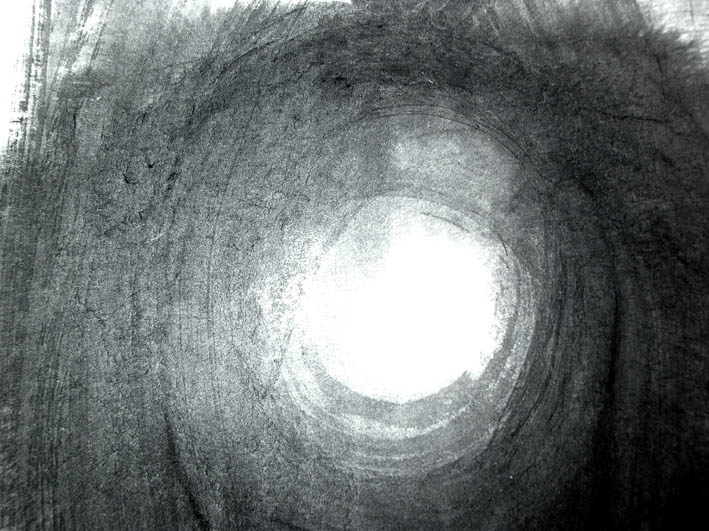
Wáng Bì 王弼 (226–249):
hànyǔ pīnyīn
反者道之動。
fǎn zhě dào zhī dòng 。
弱者道之用。
ruò zhě dào zhī yòng 。
天下萬物生於有,有生於無。
tiān xià wàn wù shēng yú yǒu ,yǒu shēng yú wú 。
One of the shortest (along with ch. 18) and deepest chapters of the 道德經 Dàodéjīng, on:
[ The Way of the WAY
[ The Way of BEING
01-02:
Returning: Dào's movement;
yielding: Dào's use.
[ The Way of the WAY:
01 反 fǎn: Returning and/or turning into its opposite.
出生入死 Going out into life and back into death (ch. 50):
[ Dào's movement means returning from the beginning: Dào moves to (creates, nurtures) and fro (develops, completes).
[ Passing begins with coming, coming ends with passing; genesis and demise of stars, entities, states are Yang and Yin of Oneness.
[ Timeliness and timelessness are each other's respective solution.
02 弱之勝強 The weak overcomes the strong:
The soft overcomes the hard (ch. 78), pliability overcomes rigidity.
"Nothingness permeates even the gapless" (ch. 43): the Way of weakness and softness, suppleness and pliability are Dào's custom and practice, its method and form of mastering.
03-04:
All entities are born from Being,
yet Being is born from Nothingness.
[ The Way of BEING:
03 德 Dé: Potentiality becomes Entity:
After the transcendent Dào had come through the Gate of Nothingness (ch. 01, 06, 10), now as Mother of everything, Beingness as such was distinguishable from Non-Beingness, hence, the myriads of entities could come into Existence.
04 道 Dào: Non-Being becomes Being:
The mother of all questions, for the first time clearly, then similarly well-formulated and considered by three philosophers of the "Land of Poets and Thinkers" (»Land der Dichter und Denker«):
Leibniz: "Why is there something rather than nothing?" (»Warum gibt es etwas und nicht vielmehr nichts?«). – Many earlier thinkers had asked why our universe is the way it is, but he was wondering and pondering... why there is a universe at all, via
Schelling "Why is there something at all, why is there not Nothing?" (»Warum ist überhaupt etwas, warum ist nicht nichts?«) to
Heidegger "Why is there 'That what exists' ["'Why are there beings'] at all and not rather Nothing?" (»Warum ist überhaupt Seiendes und nicht vielmehr Nichts?«) as the Question of Being (Being as beings in general).
Two millennia earlier, Lǎozĭ contemplated this question already philosophically, not longer in a merely mythical-mystical way: the 'Old Master' did not opt for a Steady State model, as physicists did until Einstein/Hubble, but for a Big-Bang model ["Gate"], and – perhaps as the first ever – an honest Agnostic approach to an "unnamable" and inconceivable, Transcendental Identity, merely designated as Dào, which is before and beyond our spatio-temporal universe and is perceptively hinted at between the lines in poetry.
Dào created Godlike, but impartial and impersonally: Game, Rules, and Players, on all levels, from "Quantum-Monads" to life, consciousness, and conscientiousness, enlightenment and Love.
They all come temporally into Beingness / Existence and back to Non-Beingness, to their roots, longing and yearning home into a familiar, redeeming Nothingness.
[
41 - Unimposing Dào
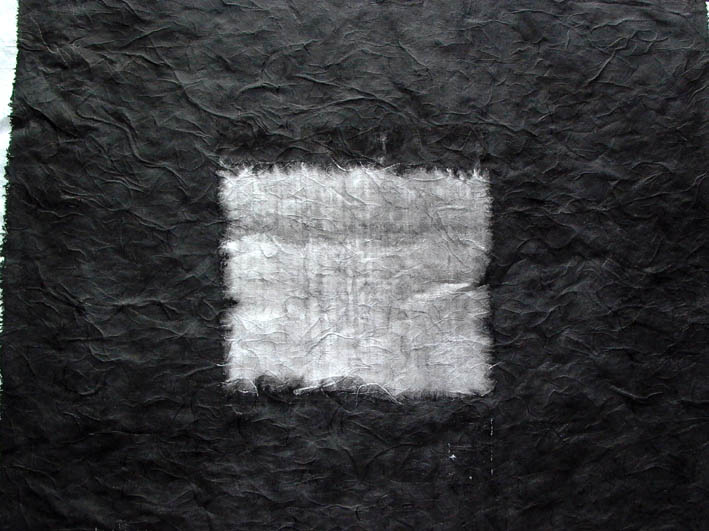
Wáng Bì 王弼 (226–249):
hànyǔ pīnyīn
上士聞道勤而行之。
shàng shì wén dào qín ér háng zhī 。
中士聞道若存若亡。
zhōng shì wén dào ruò cún ruò wáng 。
下士聞道大笑之。
xià shì wén dào dà xiào zhī 。
不笑不足以為道。
bú xiào bú zú yǐ wéi dào 。
故建言有之。明道若昧。
gù jiàn yán yǒu zhī 。míng dào ruò mèi 。
進道若退。夷道若纇。
jìn dào ruò tuì 。yí dào ruò lèi 。
上德若谷。大白若辱。
shàng dé ruò gǔ 。dà bái ruò rǔ 。
廣德若不足。建德若偷。
guǎng dé ruò bú zú 。jiàn dé ruò tōu 。
質真若渝。大方無隅。
zhì zhēn ruò yú 。dà fāng wú yú 。
大器晚成。大音希聲。
dà qì wǎn chéng 。dà yīn xī shēng 。
大象無形。道隱無名。
dà xiàng wú xíng 。dào yǐn wú míng 。
夫唯道善貸且成。
fū wéi dào shàn dài qiě chéng 。
[ Different levels of understanding the Dào show all the more its grandeur.
[ In twelve established sayings, still mostly rhymed, Lǎozĭ poetically gives us a glimpse behind the scenes of the surface (ch. 01):
[ treating the paradoxes of Dào (lines 06-08), of Dé and its purity and truth (09-13), and of greatest forms and gifts (14-17).
[ Nothing provides and completes as Dào (18-19).
01-04:
Superior scholars hear of Dào,
endeavor and practice it.
Mediocre scholars hear of Dào:
unsure, if it exists, if not?
Inferior scholars hear of Dào,
they greatly laugh at it.
Not laughed at,
it were insufficient to consider Dào!
01-04 士 shì: 一 one of something pronounced like 十; an (honorable) gentleman, (in antiquity): a scholar.
Superior, average, and inferior scholars, coming into contact with Dào, in ancient times mostly by hearing (!), react differently, depending of their capacity, open-mindedness, and spiritual understanding:
[ superior ones make an effort and are deeply moved, they walk on the Way and have the will and inner strength to practice it powerfully (ch. 33);
[ average ones encounter Dào halfheartedly: unsure, whether it exists or not, they seem to be touched but not permeated by it;
[ inferior ones, open for sensuous, but not spiritual experience, laugh at it, because they find the idea of something invisible and (in Kant's sense) supersensible ridiculous – but just that is a proof of Dào's transcendence: "were they not ridiculing it, it would not qualify to be taken for the Way" [* 王弼 Wáng Bì's / Wagner].
05-08:
Therefore, there is the established saying:
'Enlightening Dào – like dark,
advancing Dào – like retreating,
smoothing Dào – like bumpy.'
05-08 The next three lines are clearly marked as an ancient saying, rhyming paradoxes [except 退 now tuì], as the next five lines do as well.
Dào, being enlightening, advancing, smoothing, seems, for the unexperienced who follow the outer appearance only, dark, retreating, bumpy:
[ enlightening: The Dào of the Sage "enlightens but does not investigate (ch. 58) [dark and hidden actions of the populace]" [*].
[ advancing: The Dào of the Sage "puts his own person in the background (ch. 07) and [achieves in this way] that his own person comes to be to the fore; disregards his own person and [achieves in this way] that his own person will last" [*].
[ smoothing: The Dào of the Sage "...bringing about Great Evenness is to go by the nature of entities (ch. 27) and not to hold onto equalizing by way of 'cutting off from' the entities" [*]. – Great carvings arise without shavings. (ch. 28): "the Great Regulator ... regulates without any cutting off" (Oppression) [*].
09-13:
Highest Inner Power seems common,
great purity seems stained;
comprehensive Inner Power seems insufficient,
steadfast Inner Power seems like elusive,
pure truth seems changeable.
09-13 Five more Paradoxes, No. 4 - 8 (of 12): one of the Dàoist techniques to say the inexpressible.
Highest, comprehensive, and steadfast Dé 德, Dào in (real) life as Inner Power, seems common, insufficient, and elusive.
大白 Great purity (integrity) and 質真 pure truth (real authenticity) seem like stained, and changeable (dirtied).
14-17:
A greatest square seems without corners,
greatest talents mature still late,
greatest music lies in silent sound,
greatest form remains without contour.
14-17 The last four paradoxes add to the variety by the way two 'geometric' examples (square and form in general), framing two 'cultural' ones (music and talent in general):
the Old Master's études for expanding consciousness, opening the mind for the unlimited, reaching poetically for the image of transcendence:
[ greatest squares need no corners or outlines; the Sage "makes square but does not trim" (ch. 58) [*].
[ greatest gifts (instruments, devices) ripen late, often in "the nick of time" [*],
[ greatest sounds are inaudible (ch. 14), but spiritual,
[ greatest form (shape) does not need any contour, when finally everything is found within, nothing beyond anymore.
18-19:
Only Dào, so hidden and nameless,
does well provide and does complete.
18-19 All in all, those ancient, established rhymed sayings intend to say between the lines: the hidden and nameless Dào only can provide well for all creatures, and what is more: complete them.
[
42 - Non-Violent Evolution
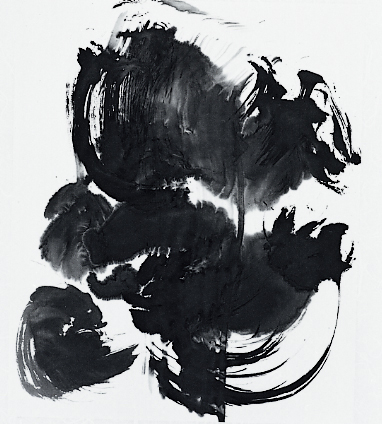
Wáng Bì 王弼 (226–249):
hànyǔ pīnyīn
道生一。一生二。二生三。三生萬物。
dào shēng yī 。yī shēng èr 。èr shēng sān 。sān shēng wàn wù 。
萬物負陰而抱陽,沖氣以為和。
wàn wù fù yīn ér bào yáng ,chòng qì yǐ wéi hé 。
人之所惡,唯孤、
rén zhī suǒ è ,wéi gū 、
寡不穀,而王公以為稱,
guǎ bú yù ,ér wáng gōng yǐ wéi chēng ,
故物或損之而益,或益之而損。
gù wù huò sǔn zhī ér yì ,huò yì zhī ér sǔn 。
人之所教,我亦教之,
rén zhī suǒ jiāo ,wǒ yì jiāo zhī ,
強梁者,不得其死。
qiáng liáng zhě ,bú dé qí sǐ 。
吾將以為教父。
wú jiāng yǐ wéi jiāo fù 。
[ There is a long tradition of discussing this chapter as composed of (two or) three independent parts: a theory we do not follow here.
[ A more profound analysis of the three contents unveils indeed very well an artful triptych of evolution in Lǎozĭ's train of thought:
[ a cosmogony towards harmony in the physical world (lines 01-06)
[ leads to a psychological reframing and philosophical re-interpretation of values in the individual existence of entities (07-11), and hence to
[ a clear commitment to politics and teachings of non-violence (12-15).
01-04:
Dào created Oneness,
Oneness created Twoness,
Twoness created Threeness;
Threeness created myriads of things.
01-04 The Dàodéjīng's essentials of any cosmogony in a nutshell, symbolized, as it were, in a modern numerical way (!):
0 - 1 - 2 - 3 - ∞
0 - 1: Dào created Oneness / Oneness:
First step and inner core of creation, in accordance with the Leibniz question (in ch. 40) from (absolute) Nothingness to Beingness (through 'All Mysteries' Gate', ch. 01).
1 - 2: Oneness created Duality / Twoness:
Normally interpreted as the tension between Yin and Yang (as two "sides of one coin", positive and negative energy/charge of 'every-thing'), besides other interpretations.
*王弼 Wáng Bì calls One and "One" (as the word for One) after the beginning of naming already as Duality; accordingly Zhuāngzi 莊子 (5,2).
2 - 3: Twoness created Threeness / Threefoldness:
Traditionally interpreted as 陰 yīn, 陽 yáng, and 氣 qì as their natural tension/energy (from physical tension to spiritual); again simplified as "Twoness plus Oneness = Threeness" in Wáng Bì & Zhuāngzi.
3 - ∞: Threeness created Multiplicity / Manifoldness
(Myriads of things, "10,000"; cf. Oneness & Manyness in Plato's Theaetetus):
Here, both philosophers emphasize that after Threeness the realm of Dào as such is left, arguing that "up to the number three, no actual entity is involved, and only from then on the realm of the ten thousand entities begins, while up to the three it is the 'realm of the Way'" [*].
[Zhuāngzi, transl. by Graham, p. 56]. In his huge library, Wáng Bì had access to (probably the only copy at the time) of Zhuāngzi [Wagner, 2003 p. 470].
E.g. von Strauß ("Monas, Dyas, Trias"), by help of ch. 01, 06, 21 + 25, tries to analogize this trinity of Oneness, Twoness, and Threeness "inside the realm of the Dào" to the Christian Trinity, with the Self-unfolding of the Dào up to the "Spirit of the Valley" in ch. 06 [1870 p. 198-201].
In spite of the 10,000 forms of entities, one can know their "Master", because this trinity of Oneness, Twoness, and Threeness had come out of one "ether of emptiness" [* Wáng Bì].
Hence, the way back to the 'Roots' means: Multiplicity/Plurality – Difference – Continuity – Dào [following Ames & Hall].
05-06:
All creatures carry Yin
and embrace Yang.
The flow of vital forces
effects their harmony.
05-06 To carry (or to turn away from)
陰 yīn (the 'shadowy side of the hill'), and to embrace (or to turn to)
陽 yáng (the 'sunny side of the hill') let flow
氣 qì 'breath', 'air', vital energy in harmony – on the individual, social and universal level.
07-11:
In principle, people's detest is,
to be just lonely, orphaned, and worthless;
however, kings and dukes
thereof made names of honor!
Hence: sometimes beings lose something,
and yet they win;
sometimes they win something,
and yet they lose.
07-09 In contrast to ordinary people, (wise) rulers recognize that they form a unit with all subjects and are actually one of the least, as symbolically mentioned in old rituals for princes and kings, Book of Documents 書經 shū jīng [s. ch. 39.15-16].
They call themselves lonely, orphaned (widowed), and worthless (needy): "Therefore to be esteemed takes [acting as if] being despised as its root, and to be elevated takes [acting as if] as if being lowly at [its] base" [*]: serving as a foundation for the ordinary... [s. ch. 39.17-19.].
'Aloneness' of the ruler serves them as "claim to rule in the 'All-Oneness' " [Möller].
10-11 This 'lose-win- and win-lose' paradox (cf. ch. 29.07-10.) is obviously an old saying, quoted by Lǎozĭ, it was of course often compared with biblical lines, like in our ch. 39.17-19.
"And whosoever shall exalt himself shall be abased; and he that shall humble himself shall be exalted" [Matthew 23:12; Luke 14:11, 18:14] or Luke 17:33: "Whoever tries to keep their life will lose it, and whoever loses their life will preserve it."
More in Lǎozĭ's diction: "They who divest themselves of their Self, will win it, they who place first their Self, will lose it." [v. Strauß, 1870 p. 201].
12-15:
What others teach,
I teach, as well:
'Brutal, violent ones will
not get their natural death'.
I will use this as my
teaching's starting point.
12 Sometimes referred to the sentence before, but mostly to the following one!
13-14 梁 liáng violent, lit./etym.: "(bridging) beam" (solid, rigid); one of Lǎozĭ's unambiguous statements on non-violence (ch. 30, 31, 36).
Again the 'win-lose' paradox, here: no "natural death" (already Stan. Julien, 1842, Le Livre de la Voie et de la Vertu. Par le Philosophe Lao-Tseu: "mort naturelle") as consequence for the aggressor:
"...all who draw the sword will die by the sword." [Matthew 26:52.]
15 Lǎozĭ even uses the non-violence as his "starting point of his teaching": in the next chapter and in general throughout the 道德經 Dàodéjīng!
[
43 - The Victory of Softness
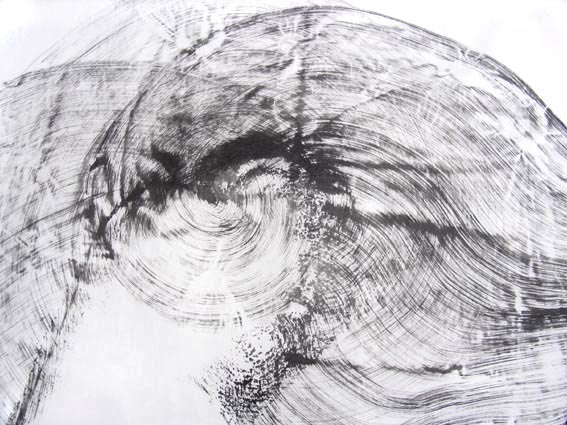
Wáng Bì 王弼 (226–249):
hànyǔ pīnyīn
天下之至柔,馳騁天下之至堅。
tiān xià zhī zhì róu ,chí chěng tiān xià zhī zhì jiān 。
無有入無間,吾是以知無為之有益。
wú yǒu rù wú jiān ,wú shì yǐ zhī wú wéi zhī yǒu yì 。
不言之教,無為之益天下希及之。
bú yán zhī jiāo ,wú wéi zhī yì tiān xià xī jí zhī 。
[ As softness and weakness gets through hardness and strength, and as pliability and non-violence penetrate all rigidity and violence, all the more so:
[ Dào's aspect of transcendent Nothingness can 'tunnel' the gapless, thus it is the role-model for the irresistibility of 無為 doing by non-doing and 不言teaching by non-teaching.
01-02:
World's softest
swiftly gets through world's hardest.
01-02 As epitome of Dàoist philosophy, the power of softness and weakness is illustrated mainly four times in the 道 德 經 Dàodéjīng, by partly different characters with almost identical meaning:
in ch. 36:
柔 róu soft + 弱 ruò weak
勝 shèng overcome
剛 gāng hard + 強 qiáng strong,
here in ch. 43:
柔 róu soft
馳騁 chī-chěng (swiftly) gets through
堅 jiān hard,
in ch. 76:
柔 róu soft + 弱 ruò weak
// (+ more on aging/dying),
堅 jiān hard + 強 qiáng strong (rigid)
and in ch. 78:
弱 ruò weak
勝 shèng overcomes
強 qiáng strong,
...with two levels of meaning: physically (water / stone) and spiritually (indulgence / violence)!
Here Lǎozĭ prepares the deepest possible comparison – with the "softness" of Nothingness!
03:
Nothingness interpenetrates even the gapless.
03 "Without being" (that which has nothing), Nothingness as Dào's transcendent creative aspect and phase of potentiality [still not yet 'being' like entities], is even softer than water, softer than softness, because "for water there is nothing that it does not get through, for 'ether' [of Nothingness] there is nothing that it does not penetrate" [* 王弼 Wáng Bì's / Wagner].
While water penetrates every gap (opening, interspace), nothingness can 'tunnel' through every wall [quantum]: Nothingness is able to permeate even the gapless, unsplit, continuous, the spirits and everything that has a soul [Héshàng Gōng 河上公].
04-07:
Therein, I realize the benefit
of acting without interfering:
Wordless teaching
and non-interfering's benefits –
only few worldwide can reach them!
04-07 From these two phenomena of permeating qualities of water and nothingness, Lǎozĭ 'surmises' the benefits of Non-doing and Non-teaching:
[ all rigidity and violence could never resist the permeating power of Dào in its "robe of nothingness", and therefore:
[ 無為 wú wéi is so irresistible in its long-term power: only 有為 yǒu wéi meets (enduring) resistance, Non-doing finally wins because of its ultimate softness and its non-violent power of permeation,
[ 不言 bù yán, the teaching without words, as a example by virtue of the natural authority of purity, has the same irresistible benefits, being able to unfold and complete a human being's personality by noninterference.
But, alas, only a few reach that in this world, only few Under Heaven are able to understand it; reminding of "Many are called but few are chosen." [Matthew 22:14].
[
44 - True Values
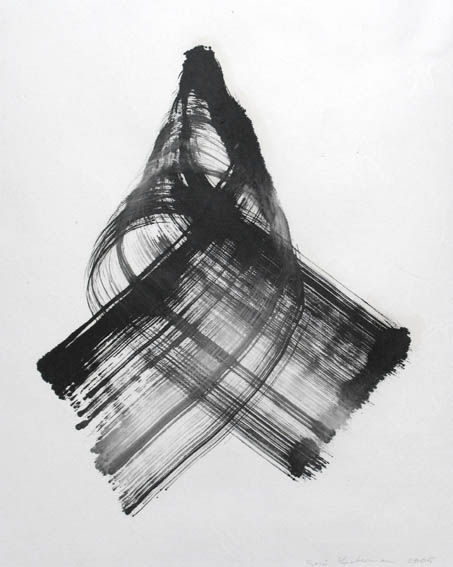
Wáng Bì 王弼 (226–249):
hànyǔ pīnyīn
名與身孰親。
míng yǔ shēn shú qīn 。
身與貨孰多。
shēn yǔ huò shú duō 。
得與亡孰病。
dé yǔ wáng shú bìng 。
是故甚愛必大費。
shì gù shèn ài bì dà fèi 。
多藏必厚亡。
duō cáng bì hòu wáng 。
知足不辱。
zhī zú bú rǔ 。
知止不殆。
zhī zhǐ bú dài 。
可以長久。
kě yǐ zhǎng jiǔ 。
[ A "philo-sophisticated (!) dyadic questionnaire" on favorite values prepares asking for the costs of reputation and wealth.
[ Understanding to suffice and to stop in time will be neither disgrace nor menace and allow to endure.
01-03:
Fame or person, what is closer?
Person or goods, what is more?
Gain or loss, what is worse?
01-03 To make the reader aware about his crucial values, Lǎozĭ prefers to ask (like Socrates), in either-or 'Hamlet' style [Kalinke], using a modern psychological set of three dyadic individual questions (for the comparative data level)!
孰 shú is used throughout the Dàodéjīng as a rhetorical question for evident answers, 身 shēn (also 'Self') means here mostly person (or body) [*Wagner p. 471-472].
[ 孰 person "joint" to 名 fame or name / reputation (which one is closer or dearer?) ... (unfortunately) often fame;
[ 孰 person "joint" to goods / wealth (which one is increased?) ... (unfortunately) often goods;
[ 得 gain (of fame or goods!) or 亡 loss (of person...ality and body ... "wealth or health"?!) – "who is it that [after all] causes the affliction [done to one's person? The others in their envy, of course]" [* 王弼 Wáng Bì's / Wagner]. And the loss is a double one: of person ('soul') and of oneself at the end of one's life [v. Strauß].
Dàoist simplicity can have a sophisticated touch...
04-08:
Truly, therefore: loving too much
certainly leads to big costs,
hoarding too much surely to vast losses.
Knowing to suffice is no disgrace,
knowing to stop no menace;
thus, you can long endure.
04-05 The Seven Sages in Ancient Greece: "The middle course is the best" [Cleobulos of Lindus]. "Nothing too much" [Solon of Athens].
The Old Sage in Ancient China: too much...
[ "loving" (passion, desire) / hoarding of
[ fame / goods leads inevitably to great
[ "expenditures / losses", because of less
[ interacting with / dispersing among entities,
[ striven for (fame) / attacked (for goods)...
06-07 Knowing, understanding ...
[ to stop (to halt) // to suffice (to be satisfied; ch. 07, 46)
[ craving (for more fame) // with goods (already), hence
[ without danger // no loss!
08 [In this way] it is possible (to excel and) last to long [*].
"If man knows how to stand still and to be content with what he has, then he has good luck and wealth in himself.
Mastering himself, he does not weigh down his mind; ruling a country, he does not oppress the people; That's why he can long endure".
[~Héshàng Gōng 河上公, quoted: V. v. Strauß].
[
45 - The Paradox of Truth
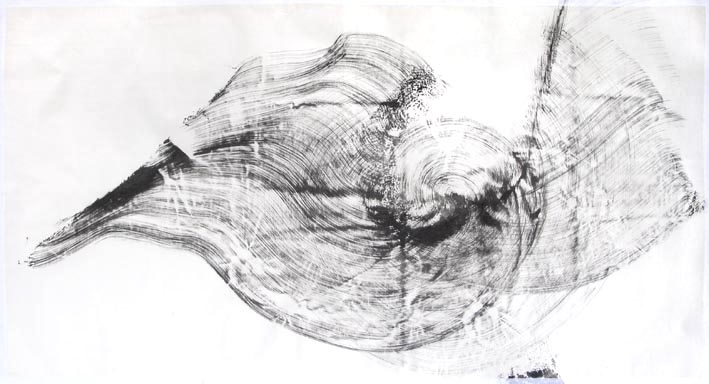
Wáng Bì 王弼 (226–249):
hànyǔ pīnyīn
大成若缺,其用不弊。
dà chéng ruò quē ,qí yòng bú bì 。
大盈若沖,其用不窮。
dà yíng ruò chòng ,qí yòng bú qióng 。
大直若屈。
dà zhí ruò qū 。
大巧若拙。
dà qiǎo ruò zhuō 。
大辯若訥。
dà biàn ruò nè 。
靜勝躁,寒勝熱。
jìng shèng zào ,hán shèng rè 。
清靜為天下正。
qīng jìng wéi tiān xià zhèng 。
Within the last chapters, the Dàodéjīng uses several kinds of paradoxes:
[ Beings can win and yet lose, lose and yet win (ch. 42),
[ the softest get through the hardest, nothingness even through the gapless (ch. 43),
[ loving too much means great costs, hoarding too much means a great loss (ch. 44),
– and here follow some paradoxes of the truth behind the initial appearance: "something seems like nothing, the substantial seems insubstantial" [Cheng].
01-04:
High perfection seems insufficient,
but not debased its use.
Great fullness seems empty,
but inexhaustible its use.
01-04 Because Dào completes in adjusting to the entities [* 王弼 Wáng Bì's / Wagner], great completion looks scattered and cracked like broken earthenware – yet the fact that its use is not at all worn out, discloses the truth, Dào, the base of 'every-thing': it is never debased.
Dào "gives in adaptation to the entities" [*], but impartially without favorites (ch 79), not loving and respecting anybody especially, therefore great fullness seems empty, yet the fact that no use can exhaust it discloses the truth: Dào is timelessly inexhaustible.
05-07:
Great straightness seems crooked,
great skill like clumsy,
great eloquence seems stammering.
05-07 This poetic triplet follows the same logic of Dào's adjustments behind the scenes: Great...
[ straightening / skillfulness / eloquence enjoy Dào's adaptation to the entities, not going 'by one single standard', not 'contriving special features' [*], as if they were
[ crooked / clumsy / stuttering, yet the fact that they are never restricted in their use (in accordance with the two prior paradoxes), precisely this discloses the truth.
[ The Paradox of Truth also proves the truth behind the paradoxes.
08-10:
Movement overcomes cold,
stillness overcomes heat.
Purity and tranquility act
as universal guidelines.
08-10 The well-known physical effects that cold will be overcome by movement, and heat by stillness, serve Lǎozĭ as starting point for an ethical and political consideration.
The heat of people's desires and passion, as well as political firebrands, call for a "correct regulator for All Under Heaven".
Again, heat will be overcome by stillness: calmness 靜, combined with purity 清, will successfully fight the heat, because "bustling activities contravenes the nature of entities", but being "calm keeps intact the true essence of entities" [*], hence, 清靜 pure tranquility [also in Wáng Bì's commentary to ch. 72.01.] will become the correct regulator for the state, well-guided by his example, that 'Great Regulator' of all beings.
Wagner also refers to ch. 60: the wise ruler manages the affairs of the state like frying small fish...: "bustling activity [as in stirring the fish] will cause much damage", but with serenity cook and ruler leave the true essence intact [p. 472].
[
46 - Peaceful Frugality
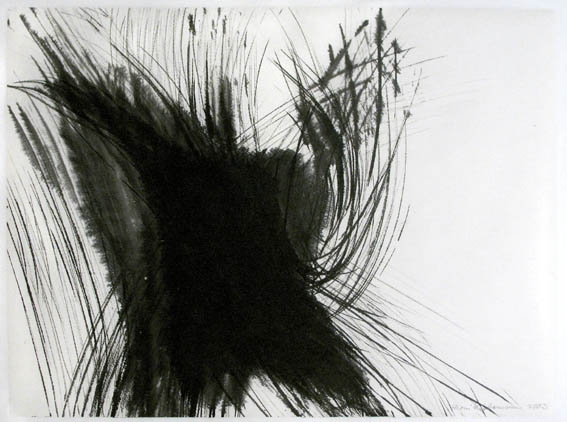
Wáng Bì 王弼 (226–249):
hànyǔ pīnyīn
天下有道,卻走馬以糞。
tiān xià yǒu dào ,què zǒu mǎ yǐ fèn 。
天下無道,戎馬生於郊。
tiān xià wú dào ,róng mǎ shēng yú jiāo 。
[罪莫大於可欲] 禍莫大於不知足。
[zuì mò dà yú kě yù ] huò mò dà yú bú zhī zú 。
咎莫大於欲得。
jiù mò dà yú yù dé 。
故知足之足常足矣。
gù zhī zú zhī zú cháng zú yǐ 。
[ In Ancient China, the 'world' for the most part means ... the Middle Kingdom!
[ When 'All Under Heaven', the world, the realm has the Way (or does not), what does this mean?
[ When the state is ruled by a wise king in the spirit of Dào (or not) – what will be the consequences?
01-02:
A world with Dào turns race horses
back for fertilizing the fields,
a world without Dào lets grow up war horses
in the outskirts.
01-02 A world with Dào, thanks to a wise ruler who "knows how to be satisfied" and "how to halt" [* Wáng Bì / Wagner, ch. 44], brings the riding horses (war horses) back to fields and meadows, to collect and transport the dung as fertilizer: useful, nurturing work in periods of peace.
A world without Dào, there "cravings and desires are without restraint" [*], for ruler and subjects strive for external things, not for internal matters.
Hence, war horses are raised in the outskirts of the cities for the troops, to serve and transport warriors and chariots: useless, destroying work in periods or war.
From a Dàoist point of view, not knowing how to be satisfied and how to stop leads to a double damage, to deeper disaster:
[ firstly, to the exhaustion of the individual vital energy 氣 qì,
[ secondly, to diremption [Hegel] and division among the people, and therefore to quarrels, fights, and wars.
03-07:
No crime is bigger
than to know desire;
no calamity is bigger
than not to know contentment;
no fault is greater
than desire for profit.
So, knowing enough of enoughness
is constantly enough, indeed!
03-05 No crime, evil, fault, disaster, no guilt, sin, calamity... is greater than
[ knowing and living the way of desires, cravings, avidity;
[ not knowing the Dào of enoughness (frugality), contentment, sufficiency (ch. 33);
[ striving for profit, for gain (ch. 42), material wealth, and social renown – both personally and between states (between nations: wars of conquest).
Desire prevents contentment and increases dis-satisfaction; discontent and inner unrest make it an addictive game for more possessions (a loss in death, a waste of time in life) and the curse of not-enoughness (frugality).
Counterstrategies are to be found in both personal regeneration of 氣 qì, and governmental control of desires.
06-07 The blessing of enoughness (frugality) is the inner equilibrium of both, basic needs and fulfillment, self-actualization, and creativity: that epitome of inherent worthiness and dignity.
Knowing enough of enoughness (frugality) is constantly enough: "... the satisfaction of [a ruler] who knows how to be satisfied [provides] eternal satisfaction" [*].
[
47 - Perception and Insight
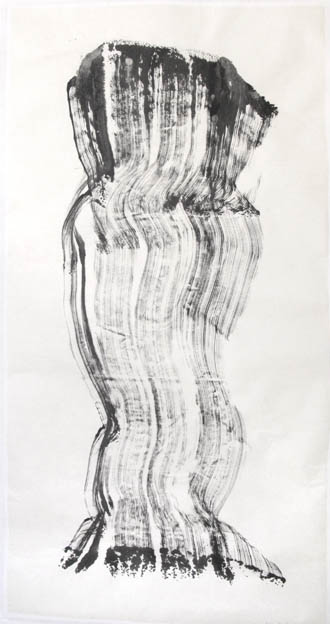
Wáng Bì 王弼 (226–249):
hànyǔ pīnyīn
不出戶知天下。
bú chū hù zhī tiān xià 。
不闚牖見天道。
bú kuī yǒu jiàn tiān dào 。
其出彌遠,其知彌少。
qí chū mí yuǎn ,qí zhī mí shǎo 。
是以聖人不行而知。
shì yǐ shèng rén bú háng ér zhī 。
不見而明。
bú jiàn ér míng 。
不為而成。
bú wéi ér chéng 。
[ Dàoist epistemology: Empirical or intuitive knowledge?
[ rom mystical experience as "religious empirism" [Ellen Chen] to empirical knowledge and to meditative contemplation and introspection: as a philosophical method, to achieve clarity and enlightenment.
[ Introspection is not physically interfering in the object of knowledge: the 無為 wú wéi method among the ways of cognition, so to speak.
01-04:
Without going out of doors,
realize all world;
without looking out of the window,
behold the heavenly Dào.
They who travel far away,
they realize far less!
01-02 Let's see at first the comments of Wáng Bì 'himself' on this [*Wagner p. 277 (+473!)], (cf. ch. 49) [*]:
[ 'Not going out of doors' in order to cognize All Under Heaven ... As processes have a principle,
[ 'not peeping out of the window' in order to cognize the Way of Heaven ... As things have a master(plan)**.
He starts by quoting Confucius [the 繫辭傳Xici zhuan comment to the 易经 Yijing]: "What is (everyone) in All Under Heaven thinking about and cogitating about?! In All Under Heaven...:
[ although the 'roads (of thinking)' are 'manifold', 'what they lead to' is the same [end];
[ although the 'thoughts' are 'hundredfold', 'what they are directed to' is 'one'".
** Principle 宗 zōng and master(plan) 主 zhǔ are inverted in the commentary to ch. 49.
So, Wáng Bì concludes [*]:
[ "The ways have a Great Eternal.
[ The ordering principles have a Great Meaning."
And additionally, he refers to the wise ruler in ch. 14, 18-21: "Holding on the Way of antiquity, it is possible to regulate occurrences in the present", ..."one has something by which to understand the primordial beginning."
Dàoist thinking is focussed not on things and events in the realm of beings, but on rules and laws behind things and events in that transcendental sphere of non-being.
03-04 "The further one ventures out, the less one understands" [*].
Principle and Master(plans) (ch. 47 + 49) behind all entities are "fathered" in Nothingness and "born" in Oneness, but search and care for the manifold, invisible, inaudible, and intangible (ch. 14), therefore no need to use doors and windows of the "house of being" [language, Heidegger]: leaving it further attempts to clarify more details, but confuses the clarity and enlightenment about the Whole.
05-07:
Hence, wise men do not travel, yet know;
they do not inspect, yet describe;
they do not act, yet complete.
05-07 Hence, the introspective sage:
[ needs no empirical studies of objects to understand the needs of subjects;
[ understands the principles of entities [*], and hence, without investigation of the outer structure, designates their needs by correct names;
[ is "clear about the nature of entities" [*], and therefore only focuses on the nature of beings and the Being, to avoid any interference; nevertheless achieves complete clarity.***
Without acting, the introspective sage attains the optimum; accordingly, high Inner Power "does not interfere and still nothing remains undone" (ch. 38.05.).
___________________
*** 韓非子 Hán Fēizǐ uses "He has clarity [明 míng] without seeing" – instead of (the correct) naming [名 míng].
[
48 - Less is More!
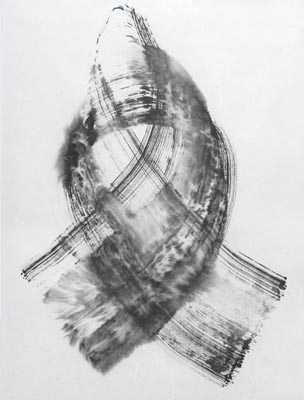
Wáng Bì 王弼 (226–249):
hànyǔ pīnyīn
為學日益。
wéi xué rì yì 。
為道日損。
wéi dào rì sǔn 。
損之又損,以至於無為。
sǔn zhī yòu sǔn ,yǐ zhì yú wú wéi 。
無為而不為。
wú wéi ér bú wéi 。
取天下常以無事,及其有事,不足以取天下。
qǔ tiān xià cháng yǐ wú shì ,jí qí yǒu shì ,bú zú yǐ qǔ tiān xià 。
[ The paradox of gain and loss has many branches.
[ 老子 Lǎozĭ shows how to get or not to get 無為 wú wéi and, as a ruler, how to win or not to win the realm.
[ In comparison with the Confucian way of extensive learning, to gain knowledge by interfering, the Dàoist way of intensive learning intents to lose knowledge by non-interfering, thus more to 'hear' the sound of Nature, to nestle into the flow of untouched reality.
01-05:
Practice learning: daily accumulation,
practice Dào: daily release.
Releasing it, again releasing:
thus, come to non-interfering action;
acting without interfering:
yet nothing is left undone.
01-02 A ruler who everyday practices learning, employing "effort and desires", "to enhance his capabilities and increase his learning” //
or: a ruler who practices Dào, “to return to emptiness" and to nothingness [following * Wáng Bì / Wagner].
[ The Loss: of 'worldly and unauthentic, one's own and egoistic' [following v. Strauß]...
[ the Gain: of easing one's burden: relief by release, practicing non-doing 無為 wú wéi, attaining true Being – in Dào.
03-04 "As long as there is interference, there will be some things that are missed" [*].
Repeatedly letting go leads to 無為 wú wéi as non-interfering.
05 When and only when non-interference is achieved, "then indeed will there be 'nothing' that is 'not done' " [*], hence, distinct from a Buddhist 'quietism'.
"In no way is this non-doing doing nothing, in no way passivity, dullness of the soul, crippling of impetus. It is the actual doing of man. Which is done by them, as if they did not. It is working without giving weight to the works." [Jaspers, Laotse, 1957 p. 299].
06-08:
Always by not bustling, win the world.
To attain it by bustling:
insufficient to win the world.
06 A ruler takes hold of the state only by continuously not involving himself and intervening in governmental actions: "in his activities he eternally goes by [the nature of entities]" [*].
Cf. Wáng Bì's commentary in ch. 49.01.-02.: "Wise men are without everlasting heartfelt wishes, so they make other people’s affairs of the heart to their heartfelt wish."
07-08 When the ruler tries to attain the control by creating official procedures and by involving himself in them, he will fail: he "would also not qualify for getting hold of All Under Heaven" [*], because he would have lost the roots of everything: 道 Dào.
The 道德經 Dàodéjīng will illustrate this chain of thought again in ch. 57.11.-13.:
"I act without intervening, and yet the people will change by themselves; I prefer stillness, and yet the people will become righteous by themselves; I act without being busy, and yet the people will prosper by themselves".
[
49 - Goodness and Faithfulness as Examples
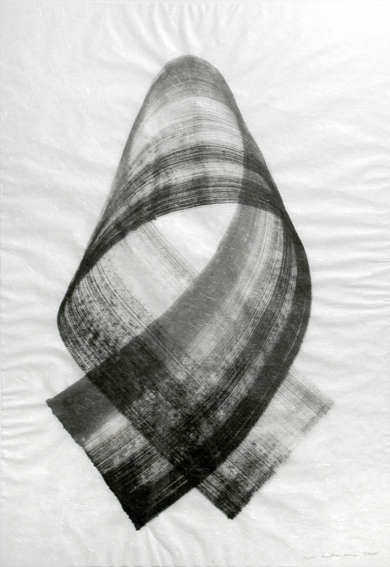
Wáng Bì 王弼 (226–249):
hànyǔ pīnyīn
聖人無常心。
shèng rén wú cháng xīn 。
以百姓心為心。
yǐ bǎi xìng xīn wéi xīn 。
善者吾善之。
shàn zhě wú shàn zhī 。
不善者吾亦善之德善。
bú shàn zhě wú yì shàn zhī dé shàn 。
信者吾信之。
xìn zhě wú xìn zhī 。
不信者吾亦信之、德信。
bú xìn zhě wú yì xìn zhī 、dé xìn 。
聖人在天下歙歙焉,為天下渾其心。
shèng rén zài tiān xià xī xī yān ,wéi tiān xià hún qí xīn 。
百姓皆注其耳目,聖人皆孩之。
bǎi xìng jiē zhù qí ěr mù ,shèng rén jiē hái zhī 。
A 'gigantic' chapter about:
[ The wise ruler's 'heartfelt wish',
[ the first ethical claim in history, bearing similarities to the Sermon on the Mount,
[ the wise man's working toward harmony for all... as his children.
Note: *Wáng Bì's use of introspection is here similar to the use in ch. 47 [*Wagner p. 473].
01-02:
Sages are without
everlasting heartfelt wishes.
Therefore they make
other people’s ambitions
to their own heartfelt wish.
01-02 A Sage lives without a permanent and fixed ambition, the affairs of his heart are not the aims of his own.
He considers the (heartfelt) wishes of the 'hundred families' (or clans), and ultimately those of all other people, as his own, because his activities are eternally guided 'by the nature of (all) entities' [~ *].
Wise men's ambitions, being not rigid but yielding like the water, equal to Dào, are open-minded and magnanimous: the subjects' necessities and needs are the wise ruler's vision.
03-08:
To good ones I am good,
to bad ones I am good, as well!
Inner Power is benevolent...
To true ones I am true,
to untrue ones I am true, as well!
Inner Power is true...
03-05 For these... pre-Christian eminently ethical lines, 老子 Lǎozĭ changes to the "I"-mode 吾 wú instead of the usual "Wise men / the Sage".
No quotation of ancient times, no epigone's flourishes: here the Old Master himself fascinates the millennia: "to bad ones I am good, as well":
[ Confucius still mirrored the Old Testament's Jewish "eye for an eye" level of retaliation [going back up to Hammurabi Ex. Law #196: "If a man destroy the eye of another man, they shall destroy his eye"].
[ Lǎozĭ anticipates the future New Testament-Christian ethical level of forgiveness: "Turning the other cheek..." [Matthew 5:39] –
[ as a prelude to the Sermon on the Mount: not out of pity, but in keeping with the transcendence of Dào's spirit and Dé's Inner Power, which is benevolent as such:
[ "...wise men are always good at protecting people, hence without ever abandoning men; always good at saving creatures, for never abandoning creatures..." (ch. 27, 08-12).
[ 老子 Lǎozĭ (and 400 years later, 耶穌 Yē sū, even more directive, "Love your enemies!") opened not less than the second ethical phase of humankind, from revenge and retaliation to forgiveness and benevolence (ch. 67), which is still only recognized and put into practice on a part of the Earth!
06-08 After goodness, trust is the second unconditional gift to all entities:
[ Trust facilitates goodness, goodness facilitates trust.
[ Trusting the non-trustworthy allows the greatest trustworthiness possible to be attained.
[ "You do not trust enough? – You’ll earn // then not enough trust in return!" (ch. 17.05 & 23.18).
09-13:
Wise men: amidst the world,
quietly and humbly acting in the world,
undetermined in their affairs of the heart.
All people fix to them their ear and eye:
for wise men they all are like children...
09-11 "As for the Sage's presence in the world" ...he is one with it. [Henricks, 2000 p. 120],
[ he acts "quietly and humbly", "this and that way" 歙歙 [augmentative doubling], acting discreetly and silently, "obediently accumulating" [Shen, Shan-zeng, 2004, p. 211],
[ 'floating' in his aims and ambitions, his heartfelt wishes: in his consciousness "people's assessment is mandatory" [Shen Shanzeng, 2004 p. 211].
12-13 They fix their ear and eye to the Sage, and hence their mind, wit, sense, and intellect, for "everyone makes use of his intelligence" [* Wáng Bì / Wagner].
[ For wise men they all are like children."
[while I, the] Sage, make all or them into infants. [That is to say I] get them all to be in harmony and without desires like infants 孩 hái." [*p. 283].
Cf. infant in:
[ ch. 10.04. 嬰兒 yīng ér:
The translation "[...a ruler] ... to be able to be like a baby - ah!" is interpreted (by *Wáng Bì) as "to be without desires".
[ ch. 55.02.: 赤子 chì zǐ:
The translation "[...a ruler] who has the fullness of capacity in himself is like an infant" is commented "An infant is without cravings and without desires, and [thus] does not offend the multitude of [other] beings." [*] –
With the apex of [vitality and] harmony (ch. 55.07. + 55.09). [* p. 474!].
[
50 - Death and Life
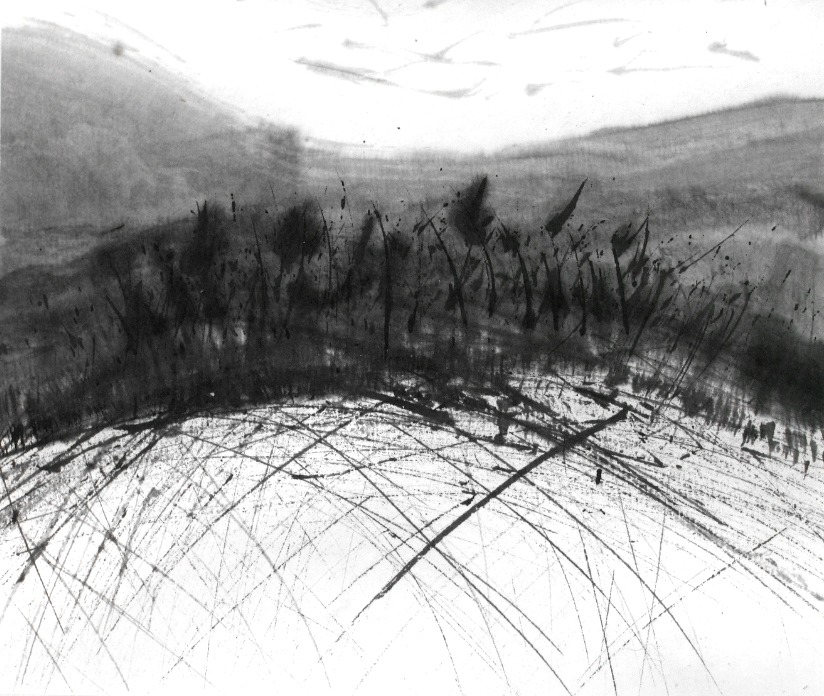
Wáng Bì 王弼 (226–249):
hànyǔ pīnyīn
出生入死。
chū shēng rù sǐ 。
生之徒,十有三。
shēng zhī tú ,shí yǒu sān 。
死之徒,十有三。
sǐ zhī tú ,shí yǒu sān 。
人之生,動之於死地,亦十有三。
rén zhī shēng ,dòng zhī yú sǐ dì ,yì shí yǒu sān 。
夫何故﹖以其生生之厚。
fū hé gù ﹖yǐ qí shēng shēng zhī hòu 。
蓋聞善攝生者,陸行不遇兇虎,入軍不被甲兵。
gài wén shàn shè shēng zhě ,lù háng bú yù xiōng hǔ ,rù jun1 bú bèi jiǎ bīng 。
兇無所投其角。
xiōng wú suǒ tóu qí jiǎo 。
虎無所用其爪。
hǔ wú suǒ yòng qí zhǎo 。
兵無所容其刃。
bīng wú suǒ róng qí rèn 。
夫何故﹖以其無死地。
fū hé gù ﹖yǐ qí wú sǐ dì 。
This chapter is dedicated to people's attitudes to and treatments of life and death.
[ Life and death are two sides of one coin: life is permanent dying, back to the roots of Oneness.
[ There are three types of people in terms of how they treat life and death: 'extreme clinging to life, unheedingly throwing it away, and living in a inhibited way lead people to a meaningless death and let miss them the essence of life.' [following Braunsperger].
[ True guardians of life are said to have no mortal spots.
01-07:
Going out into life and
back into death:
Three in ten are followers of life,
three in ten are followers of death.
Men of life,
moving to their deadly places...
also are three in ten!
For what reason?
Because they live life's super-abundance.
01 "... come forth into the realm of life [but] enter into the realm of death." [* Wáng Bì / Wagner].
Starting life means having started already to die, life itself is dying, a permanent movement towards death. [following v. Strauß, with some spiritual speculations, referring to Héshàng Gōng 河上公, too].
02 "Of those who seize the way of their being alive, [that is] utterly complete the ultimate of life, there are three out of ten;" [*].
Sometimes 十有三 is incorrectly interpreted as 十三 as "5 senses + 8 openings", or "4 extremities + 9 openings" [Hán Fēizǐ 韓非子], or "7 affective states and 6 needs" or 13 "companions of life / death", but Wáng Bì already explains: "... as if [the text] said 'there are three parts out of ten parts'."
03 "Of those who seize the way of death, [that is] utterly complete the ultimate of death, there also are three out of ten;" [*]. Not only because of diseases, accidents, and disasters [Simon], but also "seizing the way of death actively".
04-05 "but 'people's' 'making too much of life' instead prompts them [to] go to the realm where there is no life." [*].
06-07 "But why {is it that the people who make much of life but nonetheless in all their actions go to the realm of death also number three out of ten}? – Because they make too much of life!" [*].
Unnatural "excesses, exaggerations, and extremes" (ch. 29, 12-13), which wise men avoid, will reduce life energy 氣 qì.
08-13:
For one hears: Good guardians of life
travel through the country,
not meeting buffalo and tiger.
They crossing battlefields
not wearing shield nor sword.
Buffaloes find no place
to thrust their horn,
tigers find no place
to hit their claws upon.
Swords find no place
to insert their blade.
08-10 Lǎozĭ is cautiously using "... one hears" for these obviously invulnerable "good guardians of life", traveling the country and crossing the battlefields with fantastic achievements... defying:
[ buffalos,
[ tigers,
[ swords.
11-13 They all, as reported!, are not able to harm the Sage with their
[ horns,
[ claws,
[ blades,
because:
[ "they are not separated from their root through cravings,
[ "they do not pollute their true essence through desires,
[ "they cannot run into adversity even when 'traveling over land'." [*].
"Even life and death are not able to change him [the spiritualized man]". [Zhuāng zǐ 莊子 2,11 / Wohlfahrt, 2003 p. 42, 57].
14-15:
For what reason?
Because they have no mortal places!
14-15 "Because such a one is [in] a realm without death." [*]. This one is No. 10 in 10.
Imitating the infant with its full capacity (Dé, ch. 55), means, then, resisting wasps and vipers, wild beasts and birds of prey, because they are free of cravings and desires.
"Life is the companion of death, death is the beginning of life. Who understands their workings? Man’s life is a coming together of breath. If it comes together, there is life; if it scatters, there is death.
And if life and death are companions to each other, then what is there for us to be anxious about?" [Zhuāng zǐ 莊子 / Graham 1986 p. 235].
[
51 - The Way and its Power
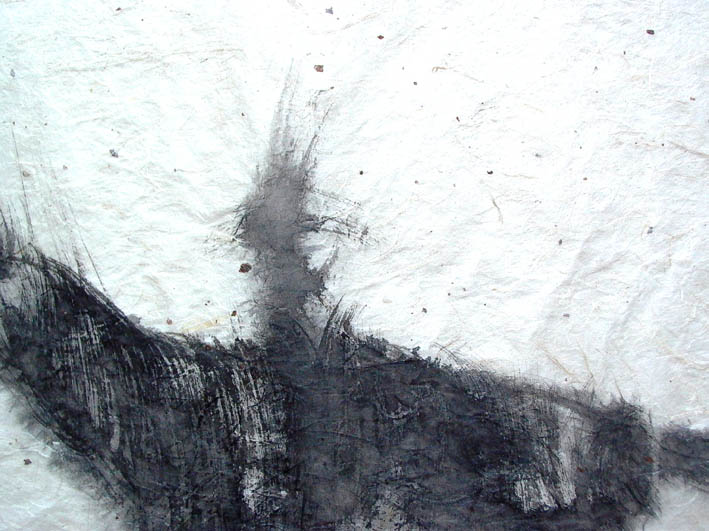
Wáng Bì 王弼 (226–249):
hànyǔ pīnyīn
道生之,德畜之,
dào shēng zhī ,dé chù zhī ,
wù xíng zhī ,shì chéng zhī 。
物形之,勢成之。
是以萬物莫不尊道,而貴德。
shì yǐ wàn wù mò bú zūn dào ,ér guì dé 。
道之尊,德之貴,夫莫之命而常自然。
dào zhī zūn ,dé zhī guì ,fū mò zhī mìng ér cháng zì rán 。
故道生之,德畜之。
gù dào shēng zhī ,dé chù zhī 。
長之育之。亭之毒之。養之覆之。
zhǎng zhī yù zhī 。tíng zhī dú zhī 。yǎng zhī fù zhī 。
生而不有,為而不恃,長而不宰。
shēng ér bú yǒu ,wéi ér bú shì ,zhǎng ér bú zǎi 。
是謂玄德。
shì wèi xuán dé 。
[ Dào and Dé create and nourish the entities, and are therefore constantly and naturally honoured and valued by them:
[ Dào, after having created the myriads, 'dé-legates'(!) some motherly duties...
[ Dé, the reification of Dào as Inner Power, or "subjective objectification"(!),
comprises creating and caring Dào aspects of Nature, of Earth, and of Human Being.
In Western (Aristotelian) terminology, Dào is:
[ causa sui (cause of itself),
[ movens immotus (unmoved mover),
[ causa essendi (intrinsic basis and primal ground of all Being):
Dào's potentiality becomes actuality through Dé,
Dé transforms causa formalis to causa materialis (which is perceptible by the senses) [Schwarz, Ernst 1970 ff.].
01-06:
Dào creates them,
Inner Power nourishes them;
entities shape them,
circumstances complete them.
Therefore: none of the myriad of creatures,
are not honoring Dào,
and also valuing the Inner Power.
01-04 Dào and Dé:
Dào creates 'every-thing', and hence all entities too; Dé mediates with the help of its Inner Power between this transcendent (impartial and impersonal) 'creator' and the immanent (subjective and personal) 'creatures' – thereby nurturing, shaping, completing them:
[ "Tau produces and Virtue nourishes; everything takes form, and the forces bring to perfection." [Chalmers];
[ "Le Tao produit les êtres, la Vertu les nourrit. Ils leur donnent un corps et les perfectionnent par une secrète impulsion." [Julien].
[ "Once entities are created, they are nourished... Once they are nourished, they assume form. Once they have assumed form, they fully develop." [* Wáng Bì / Wagner]:
[ Created by Dào, nourished by Dé; because of Dào, no entity does not assume form, no entity does not fully develop. Generally speaking...:
[ "...that by which entities are generated, that by which achievements are brought about have something that is the base [for them]." [*].
[ Different designations exist depending on what Dào is seen as the basis for [*].
05-06 Why do all entities honor Dào and value Dé?
"The Way is that which is the basis for the [ten thousand kinds of] entities. Receipt / capacity is that which the [ten thousand kinds of] entities receive [from the Way].
It is on the basis of the [former that they] indeed receive [the latter]... Losing [their receipt / capacity] will hurt them; that is why they cannot but 'value' [the Capacity they receive]." [*]. {= 'Receptivity' and 'comprehension'; h.a.}.
07-09:
Dào's honoring and
Inner Power's valuing:
for just nobody's command,
and yet happening constantly by itself.
07-09 Nobody, even not Dào itself, commands the entities to honor it and to value its powerful nurturing, yet it happens constantly by 自然 zì rán: “by itself”, naturally, spontaneously.
The ten thousand kinds of entity honor and value Dào and Dé unknowingly and unconsciously; combined with consciousness, it occurs humanely – with an invitation, in a certain sense, to 'come closer' to Dào! [following ** v. Strauß, 1870 p. 221-222].
10-14:
Hence: Dào creates,
Inner Power nourishes them:
Lets grow and brings up them,
shelters and completes them,
nurses and covers them.
10-14 道 Dào, after having created 生 the myriads, obviously 'dé-legates' (!) several motherly duties... [omitted in Wagner, M, m, B, but in W, H, F! s. below in raw texts];
德 Dé, by its feature (inside living systems!) of Inner Power, reflects life from birth to death [Shen Shanzeng 2004 p. 243]:
畜 xù nourishes (raises),
長 zhǎng (lets grow) develops,
育 yù (nurtures) raises, brings up,
亭 tíng shelters, (erects; * specifies = 'groups their shapes'),
毒 dú completes (= 'perfects their substance') [modern: poisons],
養 yǎng nurses, raises, brings up (protects),
覆 fù covers (= buries; shields).
[ "preserves, brings up, educates, completes, matures, provides for, shields." [** von Strauß];
[ "nourishes, lets grow, nurtures, specifies (= 'groups their shapes'), completes (= 'perfects their substance'), protects, covers." [* Wáng Bì / Wagner].
15-18:
Producing, yet not possessing;
dealing, yet not depending on;
conducting, yet not commanding –
this is called deep Inner Power.
15-17 Dé, the reification of Dào as Inner Power, or "subjective objectification" (!), comprises creating and caring Dào aspects of:
[ Nature (producing, not possessing),
[ Earth (leading, not commanding),
[ Human Being (bringing about, not building on).
18 "Deep Inner Power" again, after identical lines as in ch. 10. 13-16 (17)!
[
52 - Sense and Sensuousness
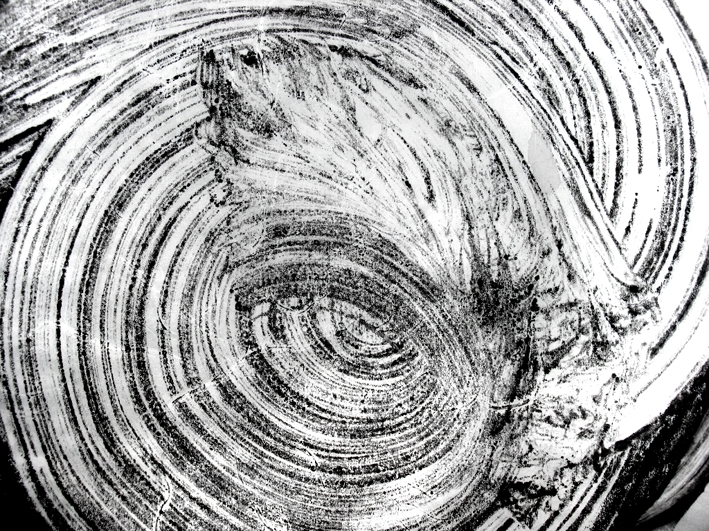
Wáng Bì 王弼 (226–249):
hànyǔ pīnyīn
天下有始,以為天下母。
tiān xià yǒu shǐ ,yǐ wéi tiān xià mǔ 。
既得其母,以知其子。
jì dé qí mǔ ,yǐ zhī qí zǐ 。
既知其子,復守其母,沒身不殆。
jì zhī qí zǐ ,fù shǒu qí mǔ ,méi shēn bú dài 。
塞其兌,閉其門,終身不勤。
sāi qí duì ,bì qí mén ,zhōng shēn bú qín 。
開其兌,濟其事,終身不救。
kāi qí duì ,jì qí shì ,zhōng shēn bú jiù 。
見其小曰明,守柔曰強。
jiàn qí xiǎo yuē míng ,shǒu róu yuē qiáng 。
用其光,復歸其明,無遺身殃。
yòng qí guāng ,fù guī qí míng ,wú yí shēn yāng 。
是為習常。
shì wéi xí cháng 。
[ The revealed Dào as 'primordial Mother' lets understand all entities their childship, thus feeling salvaged.
[ Sensorial 'openings' and spiritual 'gates' to the world outside determine whether life's end is arduous or redeemed.
[ Smallness and pliability help to return to enlightenment; to practice Dào steadfastly will avoid calamities and protect you as a person!
01-04:
The world had an origin,
accordingly considered as
all world's primordial mother.
Once found your mother,
by way of understanding your childship,
once understood your childship,
in turn keep to your primordial mother:
lifelong not in danger.
01-02 "Being good at beginning it [All Under Heaven], it will consequently [also] be good at maintaining and nourishing it. That is why [the text says] 'As All Under Heaven has a beginning, this [beginning],' as a consequence, 'may [also] be taken for All Under Heaven's mother.'" [* Wáng Bì / Wagner]: after ch. 1 & 52, Dào generates and sustains all entities, while Dè only expresses what the entities attain (get) on the basis of "the Way"! [following * Wagner 2003 p. 480].
As still transcendent nothingness, Dào first transforms ('fatherly') potentiality through the mysterious ('Big Bang-like') Gate into the actuality of beingness as such.
Then as ('motherly') beginning of 'every-thing', after having created the myriads, Dào 'délegates' (!) some motherly duties... (ch. 52): Dè maintains by its Inner Power all entities and all subjectivity.
03-04 "'Mother' as [the same as] 'root':
[ The 'off-spring' are the stem and branches. He gets hold of the root by way of understanding the stem and branches [springing form it], and does not [then] discard the root in order to go after the stem and branches." [*].
[ Having found one's ultimate mother of 'every-thing' (the revealed Dào – on this side of the 'Gate') means to understand one's status as a child down to the root, yearning back to the root at one's natural end:
[ not to be in danger one's whole life long, secure and rescued, because:
- "preserved, brought up, educated, completed, matured, provided for, shielded (s. ch. 51!)." [** v. Strauß],
- "nourished, let grow, nurtured, 'specified', 'completed', protected, covered." [* Wáng Bì].
05-10:
Stuff your openings,
block your doors:
until end of life not troublesome.
Open your mouth,
increase your affairs:
until end of life unredeemed.
05-07 'Openings' and 'gates'... closed:
[ "'Openings are the basis from which desires for actions are pursued." (Quoted in 王弼's commentaries in ch. 56 & 65): the people's doors!
[ Mouth, eyes, ears: the senses are 'mediating organs' from the subjective world to the one outside (ch. 06, 10, 50).
[ "There will be no actions [to take care of,] and he [can] be eternally withdrawn. That is why [the text says,] 'he will to the end his life not [have to] toil'!" [*].
[ Are those sensorial openings (and those spiritual doors) more and more closed, are animalism and sensuousness abandoned, then their attention is not focussed on their body and its desires, and the loss of them by death: the sorrows of death will disappear, as well! [following ** v. Strauß, 1870 p. 233].
08-10 'Openings' and 'doors'... opened:
[ "If he does not block its [All Under Heaven's] source [of desire for action], but manages its [All Under Heaven's] actions, that is why [, as the text says,] even 'to the end of his life he will never be saved'!" [*].
[ If those sensory openings (and spiritual doors) are more and more opened up, letting the external world in, to promote the 'worldly affairs', then their attention is focussed on their body and its desires, and the loss of them by death...
Because that what they can lose is too big a part of their personality, of their self, thus, the sorrows of death will never disappear! [following **; see ~Plato / Phaedo 66a]:
"...nor any of the other senses along with his thinking (μετὰ τοῦ λογισμοῦ), but rather employs pure, absolute reason (τῇ διανοίᾳ) in his attempt to search out the pure, absolute essence of things, and by freeing himself, so far as possible, from eyes and ears, and, in a word, from his whole body, because he is convinced that its companionship disturbs the soul and hinders it from attaining truth and wisdom (φρόνησιν)?"
11-15:
To see the small
speaks of enlightenment,
to keep to yieldingness
speaks of strength.
Use this insight to return,
home to enlightenment,
without losing your Self in calamity:
it is served by practicing constantly.
11-15 Enlightened rulers use what is small, strong rulers use weakness, not showing off their greatness, but rather using this clarity (light of knowledge) to return home to the (root of) enlightenment [...but do not use intelligence to spy on other entities *].
Practicing steadily the way of Dào protects you from losing your personality even in a disaster ['being in agreement with the Eternal' of the Way (ch. 32) *].
[
53 - Right Ways and Going Astray
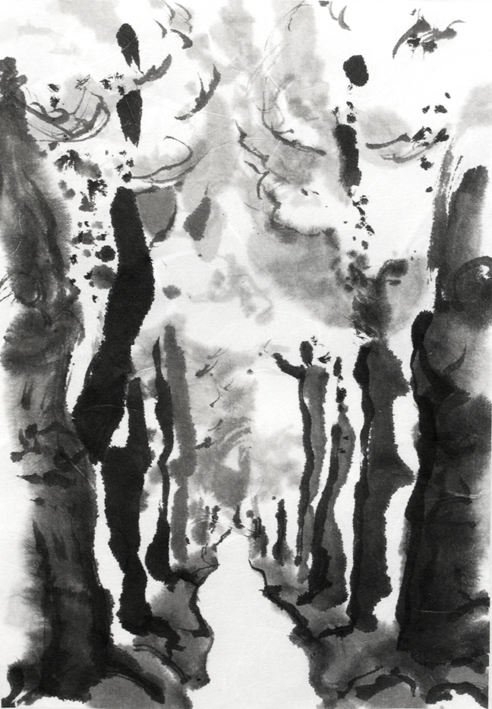
Wáng Bì 王弼 (226–249):
hànyǔ pīnyīn
使我介然有知,
shǐ wǒ jiè rán yǒu zhī ,
行於大道,唯施是畏。
háng yú dà dào ,wéi shī shì wèi 。
大道甚夷,而民好徑。
dà dào shèn yí ,ér mín hǎo jīng 。
朝甚除,田甚蕪,倉甚虛。
cháo shèn chú ,tián shèn wú ,cāng shèn xū 。
服文綵,帶利劍,
fú wén cǎi ,dài lì jiàn ,
厭飲食,財貨有餘。
yàn yǐn shí ,cái huò yǒu yú 。
是謂盜夸。非道也哉。
shì wèi dào kuā 。fēi dào yě zāi 。
[ Overdoing civilization in a sophisticated manner: paradise lost. [Cf. Braunsperger, p. 166], exploitation of people and environment...
[ "There are those 'robbers' (dào 盜) who live an opulent life-style on the backs of the common people. They are not to be confused with proper rulers who take the lead as 'way-makers' (dào 道)..." [Ames & Hall p. 160].
[ The state is supposed to serve life, not to control it and its purposes! [following v. Strauß, 1870 p, 237].
[ The ideal ruler follows the principles of the Sage who follows Dào: 老子 Lǎozĭ's politics is always based on ultimate ethical grounds.
01-03:
If I possessed only
a little grain of 'knowledge',
I would walk on the great Dào,
only my deviation from it
were still to fear.
01-03 "Assuming it would be possible for me to curb [All Under Heaven's] having knowledge, and have [it] march on the Great Way, [the] only [thing I] would [then] be worried about would be that [I] might [still] interfere [with it]." [*Wáng Bì / Wagner].
04-08:
This great Dào is very straight;
but people prefer byways:
Courts very splendid,
but fields exceedingly weedy,
the granaries utterly empty.
04-05 "The Great Way is vast in its correctness and smoothness, but the people nonetheless reject it and do not abide by it. They rather follow the heterodox bypaths, and how much more [would they do this] were [I] in turn to interfere [with them] and to act on [them], thereby blocking the midst of the Great Way!" [*].
The way of Dào is straight(-forward), a shortcut with respect to all byways; even and smooth, therefore frictionless; level, not bumpy; peaceful instead of arduous like the loops of the byways.
06-08 An old rhymed saying?! "A splendid palace built, indeed, // yet every field is full of weed." [Debon p. 129 / h.a.].
[ "As the consequence of the court's being so tidy, the field will be full of weeds and the granaries will be utterly empty.
[ [I] take care of one [thing, that is, keeping my court really tidy], and the multitude of damaging effects ensues." [*].
[ Simon [p. 162] associates the saying "Peace to the shacks! War on the palaces!" with the French Revolution, but in fact it was first written by Georg Büchner, [The Hessian Courier, 1834].
09-14:
Their clothes colorfully embroidered,
they belt sharp swords;
supersaturated with food and drink,
property and possession exist in surplus:
these are called bragging by robbers:
not at all Dào, indeed!
09-12 Luxury of the few means poverty of the many:
[ If clothes are not just simple and beautiful (ch. 80.13.), but their precious embroidery too [thus, more than sufficiently] colorful, they could blind the eyes and the 'Inner Eye'... (ch. 12.01.).
[ "In the spirit of Dào, a leader of the people does not use weapons." (ch. 30.01.).
Sharp swords at home as pure status symbols, adorned for showing off, could deafen the Inner peace.
[ "Flavorful be their food..." (ch. 80.12.): if it satiates, but does not oversatiate, this prevents the human sense of taste from being dulled (ch. 12.03.).
[ A surplus of worldly goods means a disharmonious and unpeaceful society.
13-14 "If things are not gotten [by the people] by means of the Way, they [have] all [been gotten] [through] heterodox [means]. (...) then that is robbery.
If [people are] in an honored [position], but have not gotten it by means of the Way, [they] have usurped the position. (...) [Their being in it] is [empty] bragging.
(...) everything that is at variance with the Way is [merely] robbery and [empty] bragging." [*].
Again a pun on two meanings of dào (here with different characters and the same sound) by the Old Master: 盜 dào (= robber, burglar)!
[
54 - Social Maturing
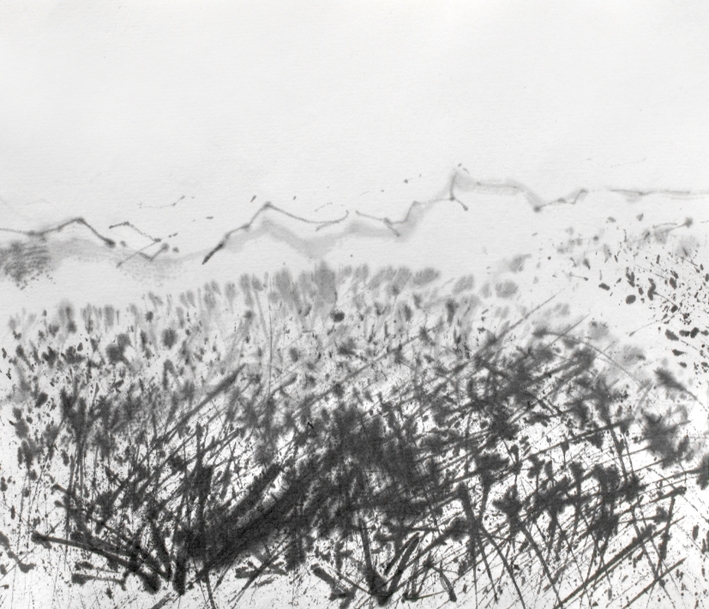
Wáng Bì 王弼 (226–249):
hànyǔ pīnyīn
善建者不拔。
shàn jiàn zhě bú bá 。
善抱者不脫。
shàn bào zhě bú tuō 。
子孫以祭祀不輟。
zǐ sūn yǐ jì sì bú chuò 。
修之於身其德乃真。
xiū zhī yú shēn qí dé nǎi zhēn 。
修之於家其德乃餘。
xiū zhī yú jiā qí dé nǎi yú 。
修之於鄉其德乃長。
xiū zhī yú xiāng qí dé nǎi zhǎng 。
修之於邦其德乃豐。
xiū zhī yú bāng qí dé nǎi fēng 。
修之於天下其德乃普。
xiū zhī yú tiān xià qí dé nǎi pǔ 。
故以身觀身,以家觀家,
gù yǐ shēn guān shēn ,yǐ jiā guān jiā ,
以鄉觀鄉,以邦觀邦,以天下觀天下。
yǐ xiāng guān xiāng ,yǐ bāng guān bāng ,yǐ tiān xià guān tiān xià 。
吾何以知天下然哉﹖以此。
wú hé yǐ zhī tiān xià rán zāi ﹖yǐ cǐ 。
Some Confucian influence, esp. with Confucius' "Record of Rites" [s. *below], has been discussed [Simon, Jacobs, Schwarz, Ames & Hall, et.al.]:
For the elements of self-improvement, but 'other-wise'... the aspect of administration from below (not only by the state), exudes the spirit of Dào.
01-03:
Well-anchored ones will not be uprooted,
well hold on ones
not go astray.
Thereby, children and grandchildren,
worshipping their ancestors,
are not interrupted.
01-02 Those with strong roots and who know how to conserve are protected:
"He consolidates his root and then only he takes care of his stem and branches...". [cf. "物有本末 "Things have their root and their branches." Confucius, 禮記 lǐ jì, "Record of Rites" *].
"He has no craving for having more and manages to do what he is capable of. [*Wáng Bì / Wagner].
03 "If sons and grandsons transmit this Way [of 'anchoring' that is, consolidating the root, and 'holding on to the One'] by way of examining themselves, then this Way 'will not be interrupted."
Note: 老子 Lǎozĭ says: "The sons and grandsons bring sacrifices without interruption." [see analysis: Wagner 2003 p. 480-481].
Again an Confucian element, maybe mixed into the 道德經 Dàodéjīng by someone, at an early stage, in an attempt to reconcile Dàoist and Confucianist thoughts.
老子 Lǎozĭ had already outgrown this spirit of rituals.
04-08:
Cultivate it in your Self,
then your Inner Power becomes genuine;
cultivate it in the family,
then your Inner Power becomes plentiful;
cultivate it in the community,
then your Inner Power becomes enduring;
cultivate it in the country,
then your Inner Power becomes overflowing;
cultivate it in all world,
then your Inner Power is all-encompassing.
04-08 "[The text] proceeds from one's own person to the others. As a consequence of one's cultivating it [this Inner Power] with regard to one's person, it [the person] will [realize its] true [nature].
As a consequence of one's cultivating it [this Inner Power] with regard to one's family, it [the family] will have abundance. As long as one's cultivating it does not deteriorate, what one effects [through the cultivation of this Inner Power] becomes ever broader and greater." [*].
**cf. partly parallel Confucius' 大學 dà xué.
09-13:
Hence: according to your Self
consider yourself,
according to your family
consider your family,
according to the community
consider the community,
according to the country
consider the country,
according to all world
consider all world.
09-13 "The others [persons, families, districts, states] all are there in the same way [as one's own]" [*].
"The Daodejing like the Daxue rehearses the concentric and mutually entailing circles through which the rippling effect of cosmic cultivation takes place, beginning here with one's own personal character and extending through the familiar social and political institutions to include the farthest reaches of the cosmos. Such overlapping and synergistic cultivation of a cosmic ethos establishes a touchstone – a standard of quality – that can be appealed to in continuing and sustaining the process." [Ames & Hall].
*** cf. Confucius' 大學 dà xué.
14-15:
Whereby I realize
all world as such, indeed?
Intuitively!
14 "On the basis of the intentions of the Hundred Families of All Under Heaven one understands the Way of All Under Heaven." (...) [*]
Note: Only the element 'All Under Heaven' has no counterpart, therefore Wáng Bì adds the following two attributes [see Wagner p. 368+482], referring to ch. 73.07-08.:
"The Way of All Under Heaven is, with regard to deviation and conformity, auspiciousness and inauspiciousness, altogether like the Way of men." [*].
15 (to Lǎozĭ): "Through this" [the above = on understanding: persons - families - districts - state; h.a.)]. –
Here Wáng Bì refers to ch. 47.01., to explain his...
Method of Introspection:
"This means: What is it through which I manage to cognize All Under Heaven? I examine myself by way of cognizing it [All Under Heaven], and I do not strive [for this cognition] on the outside.
This is what [in Laozi 47.1.] is called '[Only when] not going out of doors [into All Under Heaven one has something] by means of which to cognize All Under Heaven'." [*]
[
55 - The Power of Virtue
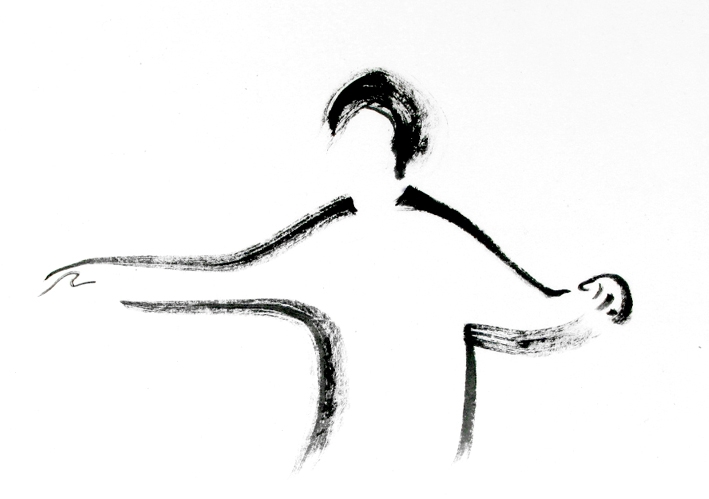
Wáng Bì 王弼 (226–249):
hànyǔ pīnyīn
含德之厚比於赤子。
hán dé zhī hòu bǐ yú chì zǐ 。
毒蟲虺蛇不螫,猛獸不據,攫鳥不摶。
dú chóng huī shé bú shì ,měng shòu bú jù ,jué niǎo bú tuán 。
骨弱筋柔而握固。
gǔ ruò jīn róu ér wò gù 。
未知牝牡之合而全作,精之至也。
wèi zhī pìn mǔ zhī hé ér quán zuò ,jīng zhī zhì yě 。
終日號而不嗄,和之至也。
zhōng rì hào ér bú á ,hé zhī zhì yě 。
知和曰常。知常曰明。
zhī hé yuē cháng 。zhī cháng yuē míng 。
益生曰祥。心使氣曰強。
yì shēng yuē xiáng 。xīn shǐ qì yuē qiáng 。
物壯則老。
wù zhuàng zé lǎo 。
謂之不道,不道早已。
wèi zhī bú dào ,bú dào zǎo yǐ 。
[ Dè, by its Inner Power, makes the newborn child inviolable against wild beasts, and makes the wise ruler keep his ethical integrity.
[ The newborn child, by virtue of its weakness and softness, without consciousness and without desires, is the apex of the true essence and of inner harmony.
[ Living life in excess instead of participating in the Eternal, and overdoing life will invite the misfortune; what is not in Dào can end prematurely and unnaturally.
01-04:
Keeping Inner Power's fullness
is similar to a newborn child:
Wasps, scorpions, vipers and snakes do
not hurt it,
wild beasts do not seize it, and
birds of prey do not claw at it.
01-02 "An infant is without cravings and without desires, and [thus] does not offend the multitude of [other] beings." [*Wáng Bì / Wagner]. – The opposite is the violent ruler... (ch. 30) [p. 482].
03-04 The [wise] ruler with full Dè / Inner Power will not offend all the kinds of entities, and they will be "not detrimental to his intactness." [*].
Cf. ch. 50.08.-13. ('Buffaloes, tigers, swords...'), and more in general ch. 10, 20, 48, 76).
05-09:
Its bones are feeble, its sinews soft,
and yet its grip is strong.
Not yet knowing the union
of male and female,
but its virility is raising already:
a culmination of vital force!
It might cry all day long,
yet not getting hoarse:
a culmination of harmony, as well.
"The newly born child is an image of the fullness of potency (...) being supple yet firm, flexible yet potent. The baby, unconsciously and without motivation, is the embodiment of harmony and equilibrium." [Ames & Hall p. 163].
05 The grip can hold so firmly just because of the weakness and softness...
This 'weakness [in the sinews] and softness [in the bones]' allow a newborn to be "not struggling [with other entities] but [still] not having anything broken is altogether like him." [*].
"The gripping by hand, for all delicacy and weakness, may be an allegory for the man of perfect virtue, who, despite his gentleness and soft disposition, persistently remains faithful to his purposes." [** v. Strauß, 1870 p. 246].
06-07 The culmination of the true essence:
[ 精 jīng "...is linked by Wáng Bì to the true core of entities, which is linked to the Way; cf. Wáng Bì on Lǎozĭ 21.5, where the term jīng 精 is explained as zhen jing 真 精, 'true essence'." [* p. 482].
[ In the main sources (see below):
WHF, GMmB = 全峻脧, 然朘朘狻 !
[ "The child, the sage and the water (as a symbol of the Dau) share the attribute of apparent weakness, which in reality holds the potentiality of great power effects." [Schwarz p. 186].
08-09 A baby has "...no mind for struggle and desire; that is why, although it emits sounds all day long, it does not become hoarse... this is the culmination of the harmony." [*].
"So also all utterances of the man of perfected virtue are continually friendly and evenly gentle, because he is (in addition to full of creative power, also) full of inner consonance, of inner harmony." [**].
10-13:
Knowing harmony
means having the Eternal,
knowing the Eternal
means being enlightened.
Overacting life
is called ominous,
ambition engaging our breath of life
is called violence.
10-11 Having the Eternal:
[ "Entities take harmony as the Eternal. That is why, as a consequence of one's having knowledge of harmony, one attains the Eternal.
[ "What is neither bright nor dark, neither warming nor cooling, that is the Eternal. It is formless and it is impossible to see it. That is why [the text] says: 'Having knowledge of [this] Eternal means being enlightened!'" [*].
12-13 Having life in excess:
[ "[But for a ruler] having life in excess means distress;
[ One should not let life become excessive. If one goes into excess, then one will die young.
[ Having the heart engage the vital breath means becoming violent. The heart should be without having [particular ambitions]. [*]; "Wáng Bì associates this comment with Lǎozĭ 42.03:" Those who are violent and brutal will not fulfill their [natural] death. "[Wagner p. 483]; 55.16. below!
[ "What is meant is the devotion of the heart to the sensory life force, its bondage to it." [**v. Strauß].
14-16:
Overgrown creatures grow old then;
I call it not in Dào.
Not in Dào means: to end prematurely.
14-15 "If an entity grows mighty, it will age [quickly]. This I call 'not on [= according to] the Way.'"
16 (from 55.12.-13.): "Wáng Bì links this commentary to Lǎozĭ 42.3.:
[ 'Those who are violent and brutal will not meet their [natural] death.'" [Wagner p. 483].
[ "What is not on the Way is quickly finished."
- Cf. ch. 30 ("'Growing mighty' means a rapid surge of military might."
- And ch. 23 ("'A cyclone does not outlast a morning, and a cloudburst does not outlast a day.'
[ That is why [the text says that such a] rapid surge [in military might] is by necessity 'not on the Way' ad 'quickly finished'." [Wagner p. 483].
[
56 - Silent Enlightenment
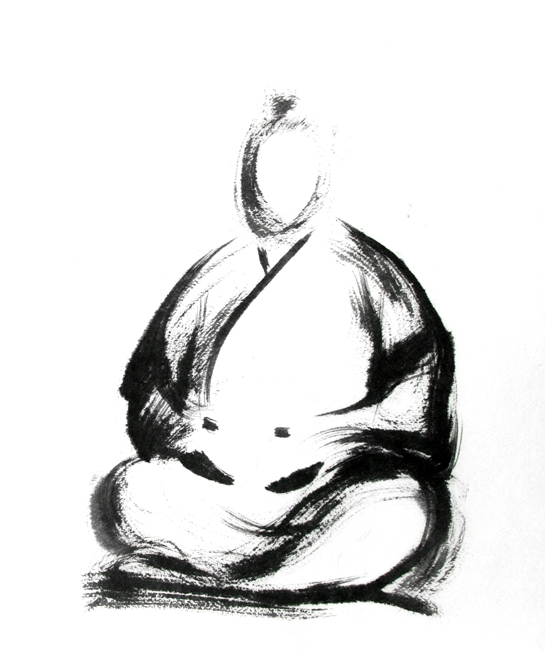
Wáng Bì 王弼 (226–249):
hànyǔ pīnyīn
知者不言。
zhī zhě bú yán 。
言者不知。
yán zhě bú zhī 。
塞其兑,閉其門,
sāi qí duì ,bì qí mén ,
挫其銳,解其紛,
cuò qí ruì ,jiě qí fēn ,
和其光,同其塵,是謂玄同。
hé qí guāng ,tóng qí chén ,shì wèi xuán tóng 。
故不可得而親。
gù bú kě dé ér qīn 。
不可得而疏。不可得而利。
bú kě dé ér shū 。bú kě dé ér lì 。
不可得而害。不可得而貴。
bú kě dé ér hài 。bú kě dé ér guì 。
不可得而賤。故為天下貴。
bú kě dé ér jiàn 。gù wéi tiān xià guì 。
One of 39 chapters in an 'interlocked parallel style' [*Wagner following G. Schlegel, s. 2000 p. 95; 2003 p. 309-310; Simon p. 174]: lines 2-7 'completed' by 9-14; 1 by 15.
Lines 01-08, on an ideal Master of Dè with perfect Inner Power, could also already be referred to the 'Wise Ruler'.
01:
Knowers do not talk;
talkers do not know.
01 Knowledge is not wisdom:
In addition to Lǎozĭ, the ingenious satirist **莊子 Zhuāngzǐ (369-286 BC) also propagated the sage's "wordless teaching" 不言之教 (ch 02.10,, 43.05.) by way of his example, but not power through words and robbery through knowledge for the sake of control:
"Are the people who call the vulgar world 'knowers', are there some who do not help the big robbers to amass treasure!" (莊子 ch. 10). Pseudo-sages help the seigneurs [feudal lords] "to support their predatory actions". [Schwarz p. 189].
"For all the objects of knowledge are infinite, yet knowledge is always finite. But because it also knows this, it never finds itself mature enough to satisfy its object while talking about it. Yes, one can say that the best that the real truth seeker has realized is not communicable, is inexpressible.
He who speaks much of what he has come to know, proves thereby that his mental activity is still moving around his object and is not yet absorbed in the thing itself, that he does not yet know the greatness and depth of it, and that he does not know what really needs to be known." [** Victor v. Strauß, 1870 p. 250 / h.a.].
Speaking and recognizing, language and cognition (aspects in ch. 01, 05, 14, 21, 48, 53, 71): who knows truly knows that he knows nothing (ch. 71.01). ~ Socrates who concludes: "... ἔοικα γοῦν τούτου γε σμικρῷ τινι αὐτῷ τούτῳ σοφώτερος εἶναι, ὅτι ἃ μὴ οἶδα οὐδὲ οἴομαι εἰδέναι." / "... I seem, then, in just this little thing to be wiser than this man at any rate, that what I do not know I do not think I know either." [Plato, Apology 21d–22a].
The hidden 玄 xuán: the true sage cannot say anything about it, so he has to be silent about it [~ Wittgenstein, 'Tractatus', last sentence].
02-08:
Close your openings,
shut your doors.
Smoothen your sharpness,
untie your entanglements,
moderate your splendor,
become one with your dust of Earth:
This means Mysterious Oneness!
02-03 "[So that they] have in themselves and conserve the[ir] unadorned [true nature]." [*Wáng Bì / Wagner].
Cf. ch. 52.03., where 其 refers to 'All Under Heaven', here to 物, as mentioned in Wáng Bì's commentary.
04-07 "[that is,]:
[ "... eliminates the sources for struggle." [*].
[ "If he has nothing which [he considers] particularly illustrious, then none of the entities has anything in particular for which to struggle." [*].
[ "If he has nothing which [he considers] particularly lowly, then none of the entities has anything to be particularly ashamed of." [*].
[ ~ ch. 04.05.-08.: "...these sentences are said of the Way itself as a model for the Great Entities including the Sage Ruler." [Wagner, 2003 p. 484].
So, here...
[ the balancing and redeeming character of Dào –now in its immanent part – is elucidated in four illustrations.
[ Sharpness, entanglement, glare, and 'non-Oneness' are relieved by the gentleness of Dào: little by little, towards the originally unbroken symmetry.
[ At the end of the day of days, all creatures are released in oneness with their earthly dust, all objects with their star dust.
This identification of Dào even with the dust of the creatures was mentioned as similar to the Christian idea of the synthesis of creator and creature [v. Strauß, 1870 p. 25].
08 玄同 xuán tóng ~ Mysterious Oneness:
[ "unio mystica": mystic union.
[ "Being identical with That-which-is-Dark." [*];
[ "Primordial Non-duality" [Luhman, 1989 p. 48; cf. Simon p. 174].
"Mysterious sameness is like the deep ocean waters, with the choppy waves of individual existences ebbing and flowing on the surface.
Deep water and surface are the same (water) yet appear different. What is the reality of this apparent difference? Fleeting.
Sameness holds the deeper reality, though that doesn't feel like it when you're bouncing around on the surface. No wonder it feels mysterious" [Abbot, 56 comm.].
09-15:
Hence: unattainable by approach,
also by alienation;
unattainable by advantage,
also by disadvantage;
unattainable by appreciation,
also by degradation.
Therefore, it acts worldwide as highest.
09-14 "That is why [the other entities] ...
[ If they were able to come close [to him], then they would be able to get distant [from him].
[ If they were able to benefit [him], then they would be able to hurt [him].
[ If they were able to honor [him], then they would be able to put him down lowly." [*].
15 "There is no entity that could add anything to him." [*].
[
57 - Silent Simplicity, Noble Greatness!
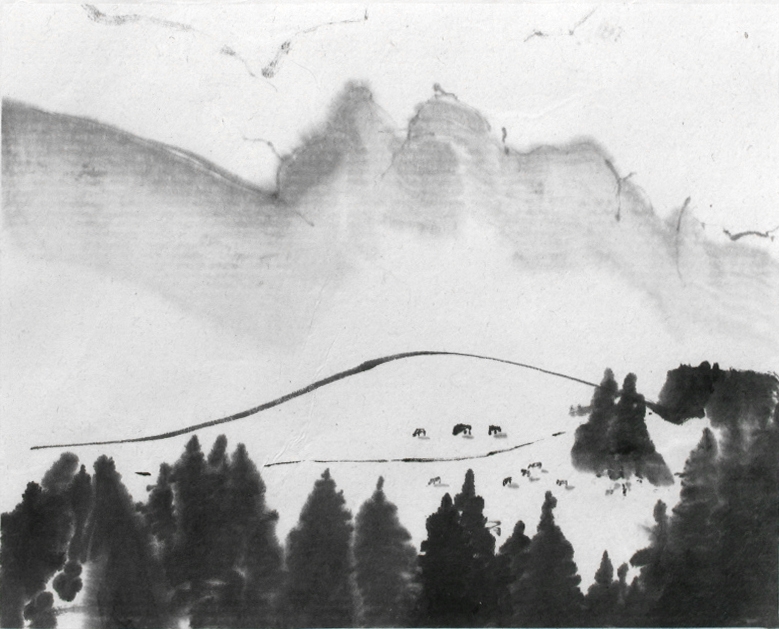
Wáng Bì 王弼 (226–249):
hànyǔ pīnyīn
以正治國,以奇用兵,以無事取天下。
yǐ zhèng zhì guó ,yǐ qí yòng bīng ,yǐ wú shì qǔ tiān xià 。
吾何以知其然哉﹖以此。
wú hé yǐ zhī qí rán zāi ﹖yǐ cǐ 。
天下多忌諱而民彌貧。
tiān xià duō jì huì ér mín mí pín 。
民多利器國家滋昏。
mín duō lì qì guó jiā zī hūn 。
人多伎巧奇物泫起。
rén duō jì qiǎo qí wù xuàn qǐ 。
法令滋彰盜賊多有。
fǎ lìng zī zhāng dào zéi duō yǒu 。
故聖人云我無為而民自化。
gù shèng rén yún wǒ wú wéi ér mín zì huà 。
我好靜而民自正。
wǒ hǎo jìng ér mín zì zhèng 。
我無事而民自富。
wǒ wú shì ér mín zì fù 。
我無欲而民自樸。
wǒ wú yù ér mín zì pǔ 。
The Dàoist way of 'ruling without ruling' is contrasted to traditional Confucian and militaristic style of government and is explained in a fourfold argumentation.
In the spirit of Dào, the 'wise ruler' is emphatically urged to be an example of non-intervention: the people then become transformed - upright, enriched, and simple by themselves.
01-05:
By righteousness ruling the country
lets by cunning use weapons;
only by non-bustling win all world.
Whence I know that so, indeed?
By these reasons:
01-03 Lines 1,2 and 3 compare three styles of ruling:
Confucianism (traditional, righteous (over-)regulating) = as basic affirmation,
Militarism (cunning use of troops) to enforce law and order = as negation,
Dàoism (not busy, non-interfering, leading by being an example) to win the whole world, to conquer the hearts = as conclusion – and 老子's advice. [following Henricks, 2000 p. 69].
"'If a state is ruled
[ by means of standards,' the cunning use of the military will arise...
[ 'by means of not busying [with government] activity,' [the ruler] will be able to 'get hold of All Under Heaven'...
[ by means of the Way, the state will be at peace." [*Wáng Bì / Wagner].
[ Cf. ch. 48.06.-08.: "His getting hold of All Under Heaven is due to [his] eternally not engaging in [government] activity", ruling by means of the Way "will emulate the root as a means of bringing to rest the stem and branches [growing from it]",
but the ruler will rule by way of standards (righteous principles) and "establish punishments as the means to take on the stem and branches", hence, the root not securely grounded, and stem and branches droopy, "the people will have nothing to attach themselves to." [*p. 312-313].
04-05 'I know that this... is so... from the following... It is a fact that'...
06-09:
The more all world avoids taboos,
but the poorer people;
the more 'sharp' devices,
but the more confused country and people;
the more men's crafty skills,
but the more strange things come up;
the more law and order announced,
the more robbers and thieves exist instead!
06 When prohibitions and taboos by the government restrict the freedom of the subjects, experience shows that natural self-development is inhibited, so that not more order but rather more impoverishment results. [cf. ** v. Strauß].
"The 'increase in taboos' has the purpose of putting a stop to poverty, but [ends up with] the people's being even poorer." [*].
07 The term 'sharp devices' is often used for weapons (ch. 80); the more weapons exist for the people, the more riots and uprisings will 'darken' the country.. [**].
"'Profitable instruments' are generally instruments by means of which to profit oneself. If the people get strong the state weakens... That he 'increases the beneficial instruments' has the purpose of strengthening the state, but [ends up] with the state's getting 'paler'." [* p. 313-314].
08 If people develop too many varieties of 'artistry' and the rulers create artificial 'business ideas', foolish luxuries and dependencies arise:
Increasing 'knowledge', "craftiness and deceit come about, 'depraved activities' will arise." [*].
09 'The more law and order are proclaimed', and 'the more beautiful objects are displayed, the more robbers and thieves emerge:
Because all those measurements of the ruler "...discard the root by way of regulating the stem and branches... it comes to this [rise of evil, increase in beautiful objects, multiplication of robbers, and use of the military against them]." [*].
10-14:
Hence, wise men advise:
I act without intervening,
and yet the people
by itself becomes transformed;
I prefer stillness,
and yet the people
by itself becomes of integrity;
I act without busyness,
and yet the people
by itself becomes enriched;
I am without desire,
and yet the people
by itself becomes simple.
10 Hence, the words of the Sage:
11-14 "I [as a ruler would] ... and the people would on their own:
[ not interfere, ... transform themselves [for the better];
[ emulate stillness, ... rectify themselves;
[ not engage in [government] activities ... become rich;
[ [In short,] desire to have no desire ...become simple and unpretentious."
[ "What the ruler desires will be quickly followed by the people ['s own ambitions]...
These four [statements] are [specifications of the general strategy] to emulate the root as a means to bring the stem and branches to rest." [*].
Non-intervention and serving as an example instead of a criminal code that only fuels criminality,
through peace and serenity of the wise ruler to the integrity and love of the people,
abandonment of busy activity and hectic regulation allows for economically satisfied livelihood,
avoiding artificial skills and senseless luxury allows for the happiness of primordial simplicity and naturalness (ch. 80)!
Even Confucius, with all his love of regulation, had already seen the merits of non-interference as avoidance of compulsion, when he mentioned an ideal sage as king (Analects, 15.5):
"The Master said, 'If anyone could be said to have effected proper order while remaining noncoercive, surely it was the sage King Shun. What did he do? He simply assumed an air of deference and faced due south.'" [Ames & Hall p. 167].
[
58 - Gentle Leadership
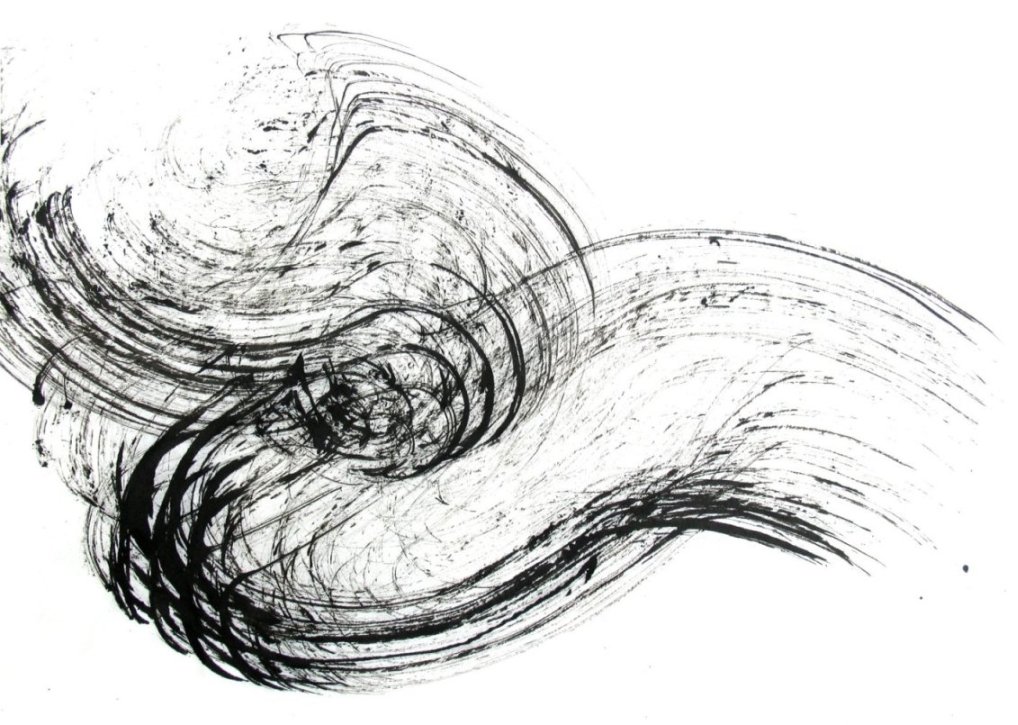
Wáng Bì 王弼 (226–249):
hànyǔ pīnyīn
其政悶悶,其民淳淳。
qí zhèng mèn mèn ,qí mín chún chún 。
其政察察,其民缺缺。
qí zhèng chá chá ,qí mín quē quē 。
禍尚福之所倚。
huò shàng fú zhī suǒ yǐ 。
福尚禍之所伏。
fú shàng huò zhī suǒ fú 。
孰知其極,其無正。
shú zhī qí jí ,qí wú zhèng 。
正復為奇,善復為妖。
zhèng fù wéi qí ,shàn fù wéi yāo 。
人之迷其日固久。
rén zhī mí qí rì gù jiǔ 。
是以聖人方而不割。
shì yǐ shèng rén fāng ér bú gē 。
廉而不劌。直而不肆。光而不燿。
lián ér bú guì 。zhí ér bú sì 。guāng ér bú shuò 。
[ "Enforcing order produces disorder." [Ames & Hall p. 168]. Wise rulers follow the principle of 無為 wú wéi: restrained and unobtrusive, never controlling or even spying out.
[ Human existence cannot be insured: between good luck and bad luck, there is only a thin membrane.
[ The highest principle is no principle: not suffocated by norms and standards, by laws and punishments, societies will develop simply and in a self-motivated manner.
[ To conclude the chapter, the Old Master characterizes the wise ruler succinctly in poetic lines.
01-04:
Whose government is
restrained and unobtrusive,
its people is genuine and pure.
Whose government is
controlling and spying out,
its people is devious and divided.
01-02 "[A ruler] who is good at regulating government will have neither shape nor name, neither [government] activity nor standard that could be pointed out. [His government] is 'hidden [from view]' [but] eventually will bring about the Great Order.
His people will have nothing to struggle about and compete for, wide and grand [they are in their] generosity...". [* Wáng Bì / Wagner].
03-04 The ruler who controls and spies "… establishes punishments and names [corresponding to social ranks] and publishes rewards and punishments in order to bring the cunning and deceiving under control.
[People] are assigned to different categories… and split up, “… [so that] the people are concerned with struggle and competition."
05-06:
Bad luck: good fortune's underlays,
good luck: misfortune's lurking place.
05-06 Misfortune, on which all happiness 'rests', or happiness, under which misfortune already 'lurks' [Wilhelm] ('crouches', lies below, hides) ...
Wáng Bì compares through this gem of a two-liner the two abovementioned ruling styles, in order to draw a conclusion about which is better in the following lines...
"The purpose of misfortune is to awaken and strengthen the moral forces of man, which are the foundation of his happiness ... Whoever uses his misfortune wisely will thereby provide a basis for his happiness." [** v. Strauß].
07-12:
Who understands the Highest,
is without rigid guidelines!
Principles, once perverted,
become strange,
goodness, once perverted,
becomes evil.
The days of men's delusion:
has been certainly for a long time...
07-08 Hardly anyone would understand that the 'hidden' style, by way of great changes for the better, is thus the epitome of good ruling:
The highest form in the matter of ruling, without any rigid principles and standards in the spirit of non-interference, has to enable governing without government!
09-10 "[A ruler] who rules the state by means of standards will" in turn "make cunning use of the military." ...as already explained in ch. 57.01.-02.!
Hence:
[ Standards, even if originally with good intentions, but "in principle", because strong and rigid, instead of weak and yielding, tend to get perverted and 'strange'.
[ Goodness, without the Inner Power of Dè, but deployed to control the subjects, also tends to get perverted and 'strange':
[ If a ruler "...establishes the good in order to harmonize the ten thousand kinds of entities, then in turn he will experience the distress of evil." [妖, *].
Let's dig a bit deeper here:
"The term yāo 妖 only appears once in Wang Bi's Laozi Commentary. Wang Bi's standard term for "evil" is xié 邪. In his Commentary on the Zhuoyi, S. 16.a3, Wang Bi talks of the yaoxie zhi dào 妖邪之道, the "way of the evil". For this reason I have adopted this meaning in the present context." [Wagner, 2003 p. 485].
11-12 The people's delusion lasted so long because of the long-lasting loss of the Way itself:
"[On the other hand, it is true that] the delusion of the people has definitely already been around for a long time.
This means: The delusion of the people and [their] loss of the Way definitely has lasted for a long time already. It will not do [simply] to hold ruling [by means of] a standard and goodness responsible for it." [* Wáng Bì / * p. 319].
Here again, let us dig a bit deeper:
This passage was discussed by different authors as corrupt. See Wagner in his Translations Notes [Wagner, 2003 p. 485; * 2002 p. 153 ]:
"Hattori Nankaku, Hatano Taró, and Lou Yulie all assume that his commentary segment is corrupt. The thought expressed in my translation as given above does not appear elsewhere in Wang Bi's surviving work. It does, however, fit Wáng Bì's thinking. I have therefore made use of it; cf. my Language, Ontology, and Political Philosophy, p. 153."
13-17:
Therefore, wise men are:
outspoken, yet not offending;
pointed, yet not piercing;
direct, yet not dissolute;
brilliant, yet not blinding.
13-17 May the poetic splendor of this stanza be accentuated by alliterations! [h.a.].
"This is why the Sage..."
[ 方而不割 makes square but does not trim,
[ 廉而不劌 makes clean but does not injure,
[ 直而不肆 straightens but does not bully,
[ 光而不燿 enlightens but does not investigate.
He..:
[ "guides the other entities and has them do away with their evil, but he does not trim [them]",
[ "makes the people pure and has them do away with the pollution [of their true nature], but does not injure and wound [them]",
[ "guides the other entities and has them do away with their depravities, but does not shock and suppress [them]",
[ "clears up what has deluded them [the people], but does not by means of [his] enlightenment shed light on and search out their [the people's] secret hideouts." (ch. 41.06) [*].
The "Holy Man" [** v. Strauß 1870 p. 261-262] is, as a model, to be followed:
fair, not hurtful,
modest, not insulting,
honest, not arbitrary,
bright, not dazzling.
_________________________________________________________________________________________________
[Wagner, Rudolf G.: "Language, Ontology, and Political Philosophy in China", 2002, 261 pp.].
[
59 - Moderation
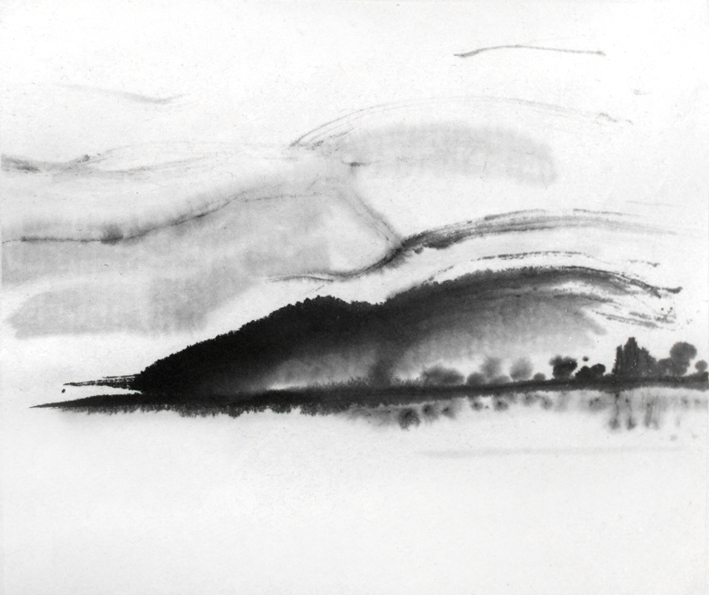
Wáng Bì 王弼 (226–249):
hànyǔ pīnyīn
治人事天莫若嗇。
zhì rén shì tiān mò ruò sè 。
夫唯嗇是謂早服。
fū wéi sè shì wèi zǎo fú 。
早服謂之重積德。
zǎo fú wèi zhī zhòng jī dé 。
重積德則無不克。
zhòng jī dé zé wú bú kè 。
無不克則莫知其極。
wú bú kè zé mò zhī qí jí 。
莫知其極可以有國。
mò zhī qí jí kě yǐ yǒu guó 。
有國之母可以長久。
yǒu guó zhī mǔ kě yǐ zhǎng jiǔ 。
是謂深根固柢,長生久視之道。
shì wèi shēn gēn gù dǐ ,zhǎng shēng jiǔ shì zhī dào 。
[ In lines 1-4 & 5-7, 老子 Lǎozĭ once again uses the 'domino technique': a chain of associations as a logical design, with suggestive effect through plausibility (Kalinke; cf. ch. 16).
[ According to the spirit of Dào, only the matriarchal state, which is governed by maternal principles (line 7), corresponds to the 'Nourishing Mother' (ch. 20) as that 'Mysterious Female' (ch. 06), the Immanent Dào on this side of the 'Gate', which is able to deeply root and firmly establish all entities.
[ Ch. 59 leads from "self-cultivation and the nourishing of one's life-force" to a second, political level: "establishing a vision for the human community, and in bringing this vision to fruition." [Ames & Hall p. 170].
01-04:
Reign people, serve Heaven:
nothing compares moderation:
for only moderation means
timely forethought.
Timely forethought means
'Their ample accumulation of Inner Power';
ample accumulation of Inner Power,
then: 'Nothing is not to cope with'.
01 嗇 sè [literally = stingy, miserly], means here a provident and circumspect sort of thrift, cf. 'frugality' in ch. 67 as one of the Three Treasures:
[ "When governing people and serving Heaven, nothing is comparable to thriftiness." [** v. Strauß].
[ "In governing people and in serving heaven nothing compare with frugality" [Cheng].
[ Nothing 'surpasses' being 'reductive', referring to farming (reducing the variety of plants in a field to one plant only): comforting the 'Hundred Families' by simplifying...
"... Wang read 嗇 as meaning "sparing" or "reductive," and based his comment on the standard use of 嗇 as ... "harvesting," "gathering in," or "husbandry," which early commentators saw as derived from the meaning of 嗇 and combines felicitously [Ames & Hall p. 170] the two meanings of harvesting and saving! [a. *Wáng Bì / Wagner p. 321 + 485!].
02 服 fú, interpreted as 'forethought' or as 'return':
[ "Only saving, in other words, timely provision: thrifty people provide for the needs of the future in good time." [**].
[ "It is a fact that only by being reductive will [a ruler] have them [the 'Hundred Families'] return soon. – [That is,] return to the Eternal." [*].
03 'Provide for the needs in good time' does not mean just for himself, the ruler, but for all them who need:
[ Dé is not merely subjective 'virtue', but also Inner Power to help all others. [a. **1870 p. 264].
[ "Only by putting emphasis on accumulating receipt/capacity without desiring perked-up acceleration will he eventually be capable of having [the Hundred Families] return early to their Eternal" [*].
04 After his emphasis only on accumulating Dè, "there will be nothing that he does not bring under control." [*].
Once the most extensive of these powers has been achieved, nothing becomes impossible or insuperable for a ruler who "...won the hearts of the subjects in gratitude, love and trust through right and abundant benefits." [**].
05-07:
Nothing is not to cope with,
then: 'Nobody knows his limits';
if nobody knows one's limits,
one can run the country.
Run a country by motherly principles,
for a long time can it thereby endure.
05 Once everything has been brought under control, "...there will be no one [among the Hundred Families] who will know his [the ruler's] perfection ... due to the fact that his Way is inexhaustible." [*].
Then no one knows about the 'summit' 極 jí, the limits of this power, for which nothing is insurmountable.
06 If the ruler has gained, through accumulated benefits, such inner power over the people that no one can fathom their limits, no adversary will dispute his reign, so that he can thoroughly govern for the good of the people.
Just because nobody knows about the wise ruler's perfection, he could 'possess the state', but... "Were he to manage the state by means of an exhaustible [way], he would not be capable of possessing the state." [*].
07 The peace of a country is 'brought by its mother':
[ Accumulating Dè as Inner Power means "...focussing only on its [All Under Heaven's] root, and only then managing the stem and branches."
[ A ruler following this way "will indeed manage to reach his [natural] end."
[ Or: a matriarchal state will endure for a long time...!
08-09:
It's called: rooted deeply, based as strong –
prolonged life,
enduring Dào's perspective!
08-09 "This I call the Way of:
[ deeply [implanting] the root,
[ consolidating the base,
[ prolonging life.
[ widening the perspective." [*].
Root: cf. ch. 06, 16, 26, 39, 54.
[
60 - Domination without Damage
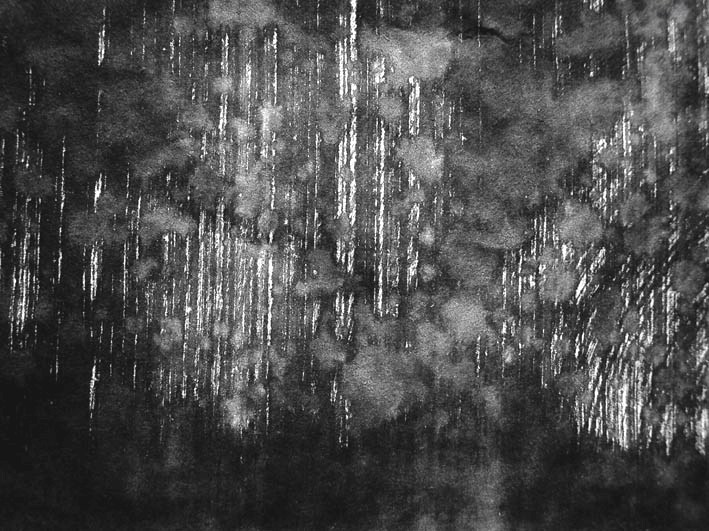
Wáng Bì 王弼 (226–249):
hànyǔ pīnyīn
治大國若烹小鮮。
zhì dà guó ruò pēng xiǎo xiān 。
以道蒞天下,其鬼不神。
yǐ dào lì tiān xià ,qí guǐ bú shén 。
非其鬼不神,其神不傷人。
fēi qí guǐ bú shén ,qí shén bú shāng rén 。
非其神不傷人,聖人亦不傷人。
fēi qí shén bú shāng rén ,shèng rén yì bú shāng rén 。
夫兩不相傷,故德交歸焉。
fū liǎng bú xiàng shāng ,gù dé jiāo guī yān 。
Govern gently, encounter the world with Dào – and the 'spirits' (spirits of the dead and beneficial spirits) do not harm – as well as wise men do not harm: enlightenment through the Dào should be able to put the ghosts and demons (of pre-philosophical belief-systems) in their place.
01-07:
Rule large states gently,
like frying small fish.
Using Dào, approach all world!
Its evil spirits
will not haunt;
not only its evil spirits
will not haunt,
its good spirits, too,
will not harm men.
Not only its good spirits
will not harm them:
Wise men will not harm men, as well!
Neither fish nor states should be dismembered through too much intervention; cook and king are subject to the same law of the One (ch. 39):
01-02 „Héshàng Gōng 河上公 means that if you cook small fish, do not remove the intestines, do not remove the scales, and do not dare to stir them out of fear that they will be overcooked; and if the government becomes burdensome to the country, the subjects became indignant, etc." [** v. Strauß 1870 p. 267].
"Introducing new laws and regulations will generally change the benefits and harms ...
If the tasks of the state are so numerous that one has to put off the people frequently, their benefit remains small; and when one too often moves back and forth a great vessel that one is keeping, it will suffer much damage.
If you fry small gobies and push them around too often, you ruin their preparation.
If one rules a large country and changes the laws too often, the people will suffer.
Therefore, a gentleman who has the Way, appreciates emptiness and silence and takes law changes seriously. So it says:
'Rule a great country,
As if you roasted little gobies'".
[Hán Fēizǐ 韓非子; following Debon].
"Bustling activity [as in stirring the fish] will cause much damage [to the small fishes], [but] if he es calm, then he will keep their true [essence] intact.
This is why the bigger the state but the calmer its lord, the broader, as a consequence, will he be able to influence the hearts of the many." [* Wáng Bì / Wagner].
03-05 "If he manages a big state ... [he acts] as if he were frying small fish, [but] if by means of the Way he governs All under Heaven ... its ghosts do not [manifest themselves as active] spirits." [*].
06-07 Spirits do no harm, when the entities keep their nature; ... so people will not know anymore that the 'spirits are spirits.
"...iIf the Sage also 'does not harm people', then [they] also do not know the Sage to be sagely" [*].
08-09:
Since both of them do not mutually harm,
so their Inner Powers
will here combined return!
08-09 As spirits and the Sage are in accordance with the Way, ...
[ they 'interact in returning' them [the people to the root]. [*].
[ Spirits are neither good or bad, and they can be friendly or hostile... but they tend more to be friendly and beneficial, when a sage rules the state or public life...
The main purpose of this chapter could be: "... to reduce the dissolute popular belief in the [鬼] guǐ to a certain extent and to dispel the fear of them by way of belief in the beneficial consequences of keeping Tào out of harm's way" [**].
[
61 - First Servants
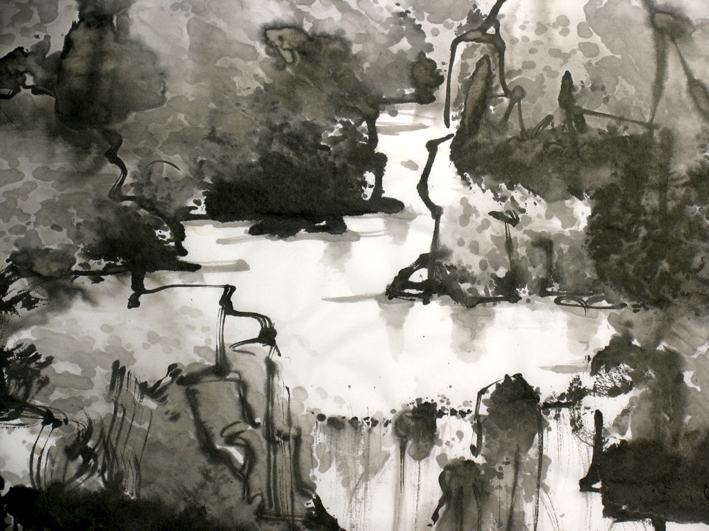
Wáng Bì 王弼 (226–249):
hànyǔ pīnyīn
大國者下流,天下之交。
dà guó zhě xià liú ,tiān xià zhī jiāo 。
天下之牝。
tiān xià zhī pìn 。
牝常以靜勝牡。
pìn cháng yǐ jìng shèng mǔ 。
以靜為下。
yǐ jìng wéi xià 。
故大國以下小國,則取小國。
gù dà guó yǐ xià xiǎo guó ,zé qǔ xiǎo guó 。
小國以下大國,則取大國。
xiǎo guó yǐ xià dà guó ,zé qǔ dà guó 。
故或下以取,或下而取。
gù huò xià yǐ qǔ ,huò xià ér qǔ 。
大國不過欲兼畜人。
dà guó bú guò yù jiān chù rén 。
小國不過欲入事人。
xiǎo guó bú guò yù rù shì rén 。
夫兩者各得所欲,大者宜為下。
fū liǎng zhě gè dé suǒ yù ,dà zhě yí wéi xià 。
If large states are formed out of many small states, the necessary unification processes are problematic.
Laozi represents this by the relationship of the sexes, whereby the feminine principle is attributed the superiority.
In the peaceful case, the identity of the small states is not lost, in the sense of a confederation of states or a federal republic. [see Simon p. 190].
01-05:
Large realms, they flow downwards:
all world's confluence,
all world's female principle.
Constant femaleness, by her peace of mind,
prevails over maleness,
by a calmness acting from below.
01-03 "The big state becomes overbearing, domineering, trying to devour or oppress the smaller ones and make them subservient by force.
Small states, insisting on their independence, grow haughty, become hindrances for the big ones and irritate them.
In order to forestall such evils and the resulting turmoil, Laò-tsè [sic!] urges the practical exercise of an ethical motive. (Reminiscent of [1. Peter 5: 5, Ephesians 5:21.] 'All are subject to one another.' " [** v. Strauß, 1870 p. 272].
"Rivers and seas ... take their place in low[-er reaches]; as a consequence, the hundred streams flow towards them. If a big state [area], [although] covering a big [area] takes a lowly place, All Under Heaven will flow towards it." [* Wáng Bì / Wagner].
"It [will be the] point where All Under Heaven converges. Being [like the female] calm and without cravings, the other entities will render themselves to it o their own accord. (cf. ch. 28, 32, 06)." [*].
04-05 "If [the big state] because of its calmness again is able to adopt a lowly [position], the other entities will therefore render themselves to it." [*].
Emphasizing the lower position and yin, Laozi again discusses the use of yin and winning softness:
"A large country is like the sea: all rivers flow into it. Therefore it 'receives all that flow into it.'
'Intercourse with the world' refers to yin and yang. The Feminine is yin or the female principle. 'The feminine always conquers the masculine through tranquility' is related to a line in the Book of Change, I Ging: 'heaven gives and the earth receives.'" [Man-jan Cheng / Gibbs, 1971 p. 187].
06-11:
Hence: big states, accordingly
go below small states,
and win the small states then;
small states, accordingly
go below big states,
and win the big states then.
Hence: some go below,
in order to win,
others go below,
and are won.
Ruling and being ruled ('taking' and 'being taken') are the two sides of a medal, in a 'fiduciary relationship', "...justified by the quality of care and service that is invested in it." [Ames & Hall p. 173],
06-07 "If the big state proceeds by way of lowering itself' is as if the text said 'if with a big state one takes a position] below the small states.'
08-09 (Then it will get hold of the small states.) The small states will as a consequence [of the big state's lowering itself] associate themselves with it. The big state will accommodate them." [*].
10-11 "As long as [the big state] cultivates a humble and lowly [position], they will [as the next sentence of the Laozi says] 'each attain their [proper] place.'" [*].
12-15:
Big states desire nothing more than
to unite and bring together people;
small states desire nothing more than
to join and serve people.
For each of them gets
what they wish,
great ones should act from below!
The superiority of the lower over the upper, as in the flowing of the waters, as in the coexistence of the sexes, so also between state entities.
The deeper water eventually absorbs the higher, the feminine gathers the powers of the masculine.
"Therefore, it is proper for the great state to wait and take the lower way, and the small states will surrender to it of their own accord." [Möller p. 93].
12-13 "If a small state cultivates a lowly [position], it will not achieve more than to keep intact, but will not be able to get All Under Heaven to render itself to it [the small state]." [*].
14-15 "That is why [the text] says: 'For each to get what they desire, it is mandatory for the big [state] to adopt a lowly [position and not for the small one]!'" [*].
[
62 - Source and Refuge
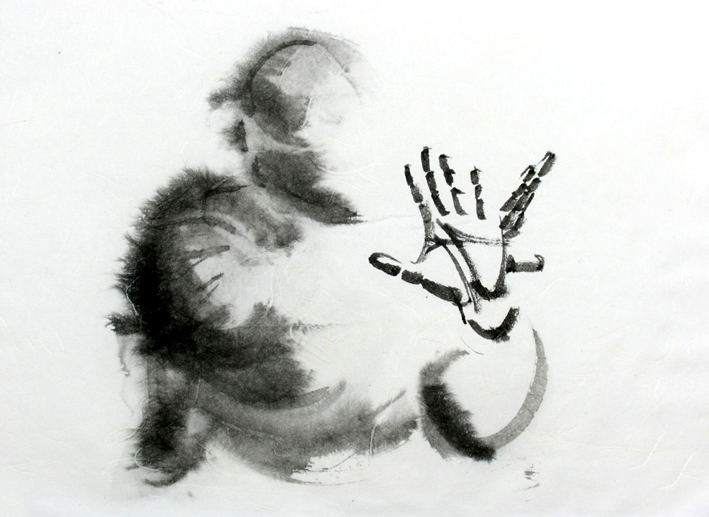
Wáng Bì 王弼 (226–249):
hànyǔ pīnyīn
道者萬物之奧。
dào zhě wàn wù zhī ào 。
善人之寶,不善人之所保。
shàn rén zhī bǎo ,bú shàn rén zhī suǒ bǎo 。
美言可以市尊。美行可以加人。
měi yán kě yǐ shì zūn 。měi háng kě yǐ jiā rén 。
人之不善,何棄之有。
rén zhī bú shàn ,hé qì zhī yǒu 。
故立天子、置三公,
gù lì tiān zǐ 、zhì sān gōng ,
雖有拱璧以先駟馬,不如坐進此道。
suī yǒu gǒng bì yǐ xiān sì mǎ ,bú rú zuò jìn cǐ dào 。
古之所以貴此道者何。
gǔ zhī suǒ yǐ guì cǐ dào zhě hé 。
不曰:求以得,有罪以免邪﹖
bú yuē :qiú yǐ dé ,yǒu zuì yǐ miǎn xié ﹖
故為天下貴。
gù wéi tiān xià guì 。
[ Dào: a mystery, hidden in all things, a treasure for the good, a shelter for the not good, who should not be abandoned (ch. 27).
[ Even a big precious jade disc (held during the enthronement of an emperor and the installation of the 'Three Ministers', is not comparable with just sitting, promoting this Dào!
[ That's why it is the epitome of search and find, guilt and forgiveness.
01-03:
This Dào – all creatures' flow of inspiration:
good people’s treasure,
bad people’s protection.
01 "The Way is what covers [all] the ten thousand kinds of entities. 'Cover' is like 'spread over.' It is an expression that each one of them attains [the Way's] protection." (cf. ch. 51). [*Wáng Bì / Wagner].
Note: 奧 ào is also the South-West corner in the house, a sanctuary for meditation or prayer.
Grain was kept there as well, and the lady of the house slept here. The master of the house stayed during the day in the eastern part and in the evening came to his wife; symbol of importance.
Duyvendak 1954 provided the following translation: "The way for the thousand things like the South-West corner of the house." [p. 133], and Ariane Rump 1979 "tao is the storehouse of all things." [p. 175].
02-03 "They treasure it in order to make use of it. They protect it means that through it they stay unharmed." [*].
04-07:
Pleasant words can be used
to bargain;
honorable deeds can be used
to support others.
Not so good people...
why to reject even their existence?
04 With friendliness and diplomacy one achieves the most:
"If [someone good] says beautiful words about it, it is possible to surpass with the price of all the goods [in the market]." [*].
05 "'If someone in an honored [position] would practice' it [the Way], then [even people] further away than a thousand miles would respond to him." [*].
06-07 "The not so good ones have to protect the Way in order to escape [punishment]" [*].
08-12:
Hence: if enthroning an emperor,
installing three ministers,
although having jade discs,
to hold two-handedly,
driving up in a four-in-hand...
were not like just sitting,
promoting this Dào!
08-09 "This means to practice the Way in an honored position." [*].
Notes:
卿 qīng = minister (senior official) for education, warfare and economics [R. G. Henricks p. 146];
三卿 sān qīng = ("Three Ministers") "the three highest advisors of the Emperor": the 'Great Leader', 'Great Teacher', 'Great Guardian'.
拱璧 gǒng bì = (disk of jade), originally "round, polished blue nephrite disk, which the high dignitaries, when talking to the emperor, 'held with both hands' so as not to breathe upon him." [v. Strauß 1870 p. 279].
10-12 Making the emperor honorable and giving importance to the ministers... People with precious jade discs ('so large that one needs two arms to hold them) or 'with [their] four horses in front of their [carriage]... "...this still would not compare to their 'promoting this Way by [just] sitting [in their official seat]." [*].
13-17:
What was the Ancient's reason
accordingly to esteem this Dào?
Is it not said:
"Who seeks, will find it", and
"Who has guilt, will be forgiven"?
Hence, it acts as world's highest.
13 The reason 'why the ancients valued this Way':
14-16 "Did they not say: [If the good ones] strive by means of it [the Way], they will achieve it, while those [the not good ones] who have committed crimes avoid [punishment] by means of it [the Way]?
[If the good ones] strive by means of it, then they achieve what they strive for. If [the not good ones] avoid [punishment] by means of it [the way], they manage to avoid it." [*]; (and indeed by nothing else).
"Why did the ancients revere this Tào? Not because he is found by daily searching and forgives those who are guilty?" [** v. Strauß 1870 p. 277].
17 "There is nothing that it [this Way] does not bring about. That is why it is [most] valued in All Under Heaven." [*]. ("Therefore he is honored by all the world", see ch. 56).
[
63 - The Lightness of Being
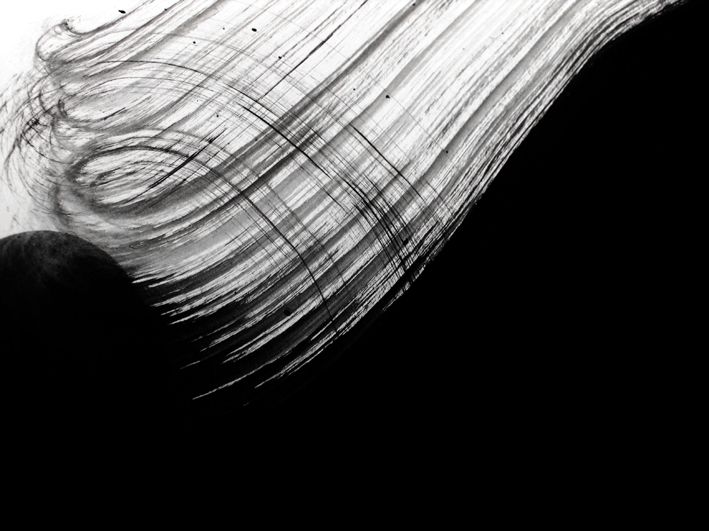
Wáng Bì 王弼 (226–249):
hànyǔ pīnyīn
為無為,事無事,味無味。
wéi wú wéi ,shì wú shì ,wèi wú wèi 。
大小多少,報怨以德。
dà xiǎo duō shǎo ,bào yuàn yǐ dé 。
圖難於其易,為大於其細。
tú nán yú qí yì ,wéi dà yú qí xì 。
天下難事必作於易。
tiān xià nán shì bì zuò yú yì 。
天下大事必作於細。
tiān xià dà shì bì zuò yú xì 。
是以聖人終不為大,故能成其大。
shì yǐ shèng rén zhōng bú wéi dà ,gù néng chéng qí dà 。
夫輕諾必寡信。多易必多難。
fū qīng nuò bì guǎ xìn 。duō yì bì duō nán 。
是以聖人猶難之,故終無難矣。
shì yǐ shèng rén yóu nán zhī ,gù zhōng wú nán yǐ 。
[ A collection of rules or suggestions to the ruler begins with the core rule of not intervening in natural processes.
Some 'paradoxes' of 'becoming aware' follow, and a remarkable departure from the retaliatory thought that was still stamped as 'right' in Confucius (to repay rancor with an attitude of righteousness).
[ Then comes variations on the advice to approach problems when they are still small, since all greatness comes from the small.
[ Without flippantly making promises, the sage (ruler) does great things far from selfish intent, recognizing problems as early as possible, in statu nascendi, and therefore he remains free from problems (ch. 36, 52).
01-05:
Doing without ado,
business without busyness;
taste in the tasteless,
greatness in small, many in few.
Answer resentment with Inner Power.
01-02 'Non-interference', 'wordless teaching', and "taking the subdued and insipid as relish, is the epitome of [creating] order!" [* Wáng Bì / Wagner].
03-05 "If there is a small resentment, it is not worth reciprocating. If it is a big resentment, then it is a case where All Under Heaven desires the execution [of the culprit]. [His] going along with what All Under Heaven agrees on is [meant by his] 'receipt/capacity'." [Dé; *].
"Those who {re-}pay injury with kindness [Teh] are also merging their minds with the world." (ch. 49) [Man-jan Cheng / Gibbs, 1971 p. 191; & "The Sage treats everyone as his children." (ch. 49.13)].
Note: 'A small resentment' {rancor} 'it is not worth reciprocating' is only in Wáng Bì's commentary, in his citation of Laozi the little and the great rancor is answered by Dè!
Lun-yu 14.36: Someone asks, "What should one think of the word {Should one repay rancor with virtue?} 'Does resentment neglect virtue?'" The Master said, "Then how shall we repay virtue? Forgive resentment with upright attitude and virtue with virtue!" [per Debon].
06-11:
Plan difficult things while being easy,
do great things while being small.
All world's difficult affairs
certainly arise from easy ones;
all world's great affairs
certainly arise from little ones.
06-07 "[He] makes plan against [eventual] difficulties when things are still easy [to resolve]. He acts on [what is eventually] big while it is still minute." [*].
08-09 "Because the difficulties in All Under Heaven inevitably grow out of easily [resolvable troubles]." [*].
10-11 "Because the big affairs in All Under Heaven necessarily grow out of minute ones." [*].
12-17:
So, wise men effect
no great things after all,
hence they can
complete their greatness.
For easy promises inevitably
find little trust,
much ease certainly
makes many difficulties.
So, wise men
treat things as problems,
hence, they keep, after all,
without problem, indeed!
"However, those who, conversely, undertake exaggerations and try to implement this with pathos, will run the risk of failing, because they find it difficult to find their way back to reality on the basis of their extravagant idealism." [Möller p.194].
12-13 "The Sage only by not acting upon [things] that have already become big is in the end able ot complete their greatness. [Ditto with the difficulties." ... [*].
14-15 "He who makes promises easily, inevitably finds little trust. ... he who takes many [things] lightly will inevitably have many difficulties." [*].
16-17 "That is why the Sage treats even [light problems] as difficulties. [Ditto with trust.]" [*].
[
64 - First Steps to Completion
Wáng Bì 王弼 (226–249):
hànyǔ pīnyīn
其安易持,其未兆易謀。
qí ān yì chí ,qí wèi zhào yì móu 。
其脆易泮,其微易散。
qí cuì yì pàn ,qí wēi yì sàn 。
為之於未有,治之於未亂。
wéi zhī yú wèi yǒu ,zhì zhī yú wèi luàn 。
合抱之木生於毫末。
hé bào zhī mù shēng yú háo mò 。
九層之台起於累土。
jiǔ céng zhī tái qǐ yú lèi tǔ 。
千里之行始於足下。
qiān lǐ zhī háng shǐ yú zú xià 。
為者敗之,執者失之。
wéi zhě bài zhī ,zhí zhě shī zhī 。
是以聖人無為故無敗,無執故無失。
shì yǐ shèng rén wú wéi gù wú bài ,wú zhí gù wú shī 。
民之從事常於幾成而敗之。
mín zhī cóng shì cháng yú jǐ chéng ér bài zhī 。
慎終如始則無敗事。
shèn zhōng rú shǐ zé wú bài shì 。
是以聖人欲不欲,不貴難得之貨。
shì yǐ shèng rén yù bú yù ,bú guì nán dé zhī huò 。
學不學,復眾人之所過,
xué bú xué ,fù zhòng rén zhī suǒ guò ,
以輔萬物之自然而不敢為。
yǐ fǔ wàn wù zhī zì rán ér bú gǎn wéi 。
Further rules of conduct, including for the ruler, pick up from ch. 63: Control over worldly events through 'strategic non-intervention' (see ch. 02, 16).
"The sage [ruler] acts by not acting, learns non-learning, strives to strive for nothing.
If he succeeds in reducing only to what is naturally necessary, it is easy for him to influence the course of things without intervening, for he is in harmony with it and shies away from the uncontrollable." [Kalinke p. 128].
01-06:
What is calm is easy to hold,
what has not yet omens
is easy to forestall.
The brittle is easily broken,
the tiny easily dispersed.
Handle things
while not yet there;
rule them
before in disorder.
"All beginnings are imperceptible and slight, those of the bad as well as those of the good, and the former are considered here first.
So long as only the preconditions of evil are present, it is itself a something dormant, which has not yet been stirred, and so it is still easy to handle, to halt. It is like a seed which one deprives of the possibilities of germination." [** v. Strauß 1870 p. 287].
01-02 Still secure, easy to maintain; no signs of danger, 'easy to take precautions against':
"Because [the Sage Ruler as Xici 8.5.a3ff. says about the Gentleman in a quotation from Confucius] 'while being in security [in his position]' ...
'does not forget the [threat of] danger' and [thus] maintains this [security], and while still 'in existence' ...
'does not forget [the threat of his physical] demise', and [thus] takes precautions against this [danger and demise] in a situation where [still] no effort [is needed]." [* Wáng Bì / Wagner].
03-04 "Although [the threats] have moved from non-existence to existence, because of their being 'soft' and 'minute' they still do not qualify for prompting a big effort".
Four statements, so far, for 'careful consideration of the outcome' of small beginnings... [*].
05-06 Handle things while still 'secure' and 'no signs of danger' exist... when disturbances are 'still minute and soft'!
07-12:
A tree, only together to embrace,
grew out of a hairline shoot;
a nine-storied tower
arose from a small heap of soil;
a journey of a thousand miles always
started from your feet down there.
"One should 'with a careful eye on the outcome' eliminate [even] minute [threats], and with a careful eye on the minute eliminate [threatening] chaos." [*].
07-08 "A tree that can only be encircled with both arms grows out of a tiny shoot." [*].
09-10 "A terrace nine stories high is begun with a handful of earth." [*].
Nine as a magical number: nine levels of Heaven, nine governmental departments, 'Nine Songs' (shaman songs, see Waley, "Nine songs: a study of shamanism in ancient China");
Nine-storey towers or terraces as a symbol of the nine-layered sky (nearness of the ruler to sky / Heaven!). [per Schwarz, pp. 203-204].
11-12 "A march of a thousand li begins under the foot [where one stays]." [*].
Usually translated as 'a first step', but correctly: 'foot-under' = underfoot (that which is under one’s foot).
"In the more recent colloquial language 足下 zú xià is a courtesy term instead of the second person pronoun." [**].
"Three Parables on the origin of the great out of the small:
[ the first (shows) the organic growth of tenderest germs by constant self-expansion,
[ the second, increasing from small beginnings through continual external additions,
[ the third, is the growing up through the continual repetition of the beginning..." [**].
13-16:
Interfering ones destroy other entities,
holding fast ones lose them.
Therefore, wise men act without interfering,
thus without destroying them,
without holding fast onto something,
thus without losing them.
13-14 "If they [other entities] are brought to order by means of prodding and interference, one inversely creates causes for [government] action...
if they [other entities] are held onto by means of [their] shapes and names, cunning and perversion will amply sprout." [*].
15-16 No interference, no destroying; no holding tight, no losing...
17-19:
People pursue their affairs
often till near completion,
and yet ruin them.
So, be careful
at the end as at the beginning:
then without ruining affairs.
17 "...when people go about [their] business, they always destroy them [the other entities] when they are about to complete [their business]...
That is, they [people] do not 'carefully consider the [eventual] outcome.'" [*].
18-19 "[Only] if one carefully considers the eventual outcome as being just the [extreme development of a small] beginning will there be no failure of activity." [*].
20-22:
Hence, wise men desire
not to desire,
not valuing goods,
hard to get;
they learn
not to learn like others:
they return to places
most people pass by.
So, they support
all creatures' natural development,
yet do not dare to interfere.
20 No desires, no high value attached to goods that are hard to get...:
"Even when goods [in his hands] that are hard to get are [only] tiny, greed and robbery are evoked by them." [*].
21 "He studies not the study [only] in order to redress the superfluities of the men of the crowd." [*].
22 "(The holy man:) ... helps all beings to attain their freedom, and yet dares not to do ...
He helps all beings to their 'thus-by-itself', i.e. to their freedom or independence; for it is nothing else when someone is as he is by himself." [** v. Strauß, 1870 p. 290].
[
65 - Plain Naturalness
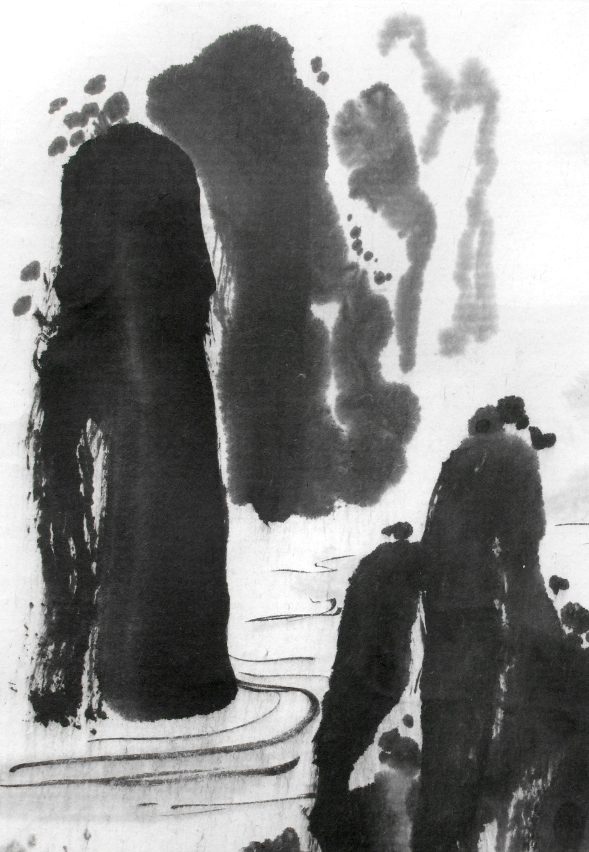
Wáng Bì 王弼 (226–249):
hànyǔ pīnyīn
古之善為道者,非以明民,將以愚之。
gǔ zhī shàn wéi dào zhě ,fēi yǐ míng mín ,jiāng yǐ yú zhī 。
民之難治,以其智多。
mín zhī nán zhì ,yǐ qí zhì duō 。
故以智治國,國之賊。
gù yǐ zhì zhì guó ,guó zhī zéi 。
不以智治國,國之福。
bú yǐ zhì zhì guó ,guó zhī fú 。
知此兩者,亦稽式。
zhī cǐ liǎng zhě ,yì jī shì 。
常知稽式,是謂玄德。
cháng zhī jī shì ,shì wèi xuán dé 。
玄德深矣、遠矣!與物反矣。
xuán dé shēn yǐ 、yuǎn yǐ !yǔ wù fǎn yǐ 。
然後乃至大順。
rán hòu nǎi zhì dà shùn 。
Does he [Laozi] recognize ... "that the emphasis Confucius places on knowledge and wisdom also has its downside?" [Henricks 1989 p. 153].
"Plain simplicity and authenticity of the ruler and the population would be a desirable concretion of Dào, would be Dé, which, as a result of his reference back to Dào, created the Great Harmony." [Simon p. 204].
"Since governing, in turn, means good and healing governance, thus the opinion prevails that a government cannot easily make the people happy, if the unilateral, unethical formation of understanding predominates, which, because here we can only speak of average common understanding, necessarily results in the self-conceit of shallowness, dissatisfaction, and dishonesty." [** v. Strauß 1870].
"This chapter is an example of applying Daoist natural cosmology normatively to the pursuit of an anarchistic political order. It is also a good example of how Daoism entails an epistemology of immediate feeling." [Ames & Hall p. 180]. (cf. ch. 03, 57; 18, 19, 20, 33, 47, 48, 59).
01-05:
The ancients
who well practiced Dào still,
did not use it to enlighten people,
but wished thereby
to keep them simple-hearted.
For a people is hard to rule,
when it uses its shrewdness too much...
01-03 Against the Confucian idea of providing knowledge as 'enlightenment', Laozi focuses on the natural preservation of the people:
'Good at the Way', the ancients did not 'enlighten' people: 'showing [them] cunning and deceit'; 'to keep simple-hearted': not to make them sophisticated, 'to preserve the true essence'. [* Wáng Bì / Wagner].
04-05 Not sophisticated intellectuality, but wisdom embedded in nature, in dealing with the natural resources in themselves and in the environment, leads to wisdom of the ruler and unspoiled simplicity of the people:
"With the increase in their intelligence [comes] cunning and deceit that is why they are 'hard to keep in order'."
治 zhì 'to rule' & 智 zhì 'knowledge, cunning' provide Lǎozĭ here with another example of his wordplays (same sound, different characters)!
06-09:
Hence, to use shrewdness to govern a state,
means the country’s plague,
not to use shrewdness to govern it
is the country's bliss.
06-09 "'Intelligence' is like tricks. [As the Lǎozĭ said in 65.2,]:
[ 'That people are hard to keep in order, is due to their intelligence being increased' [*].
[ Better 'to clog up people's openings' and 'shut their doors' (ch. 52), to make them without know-ledge and desires (ch. 03).
[ If a ruler uses intelligence and tricks to get people moving "what is [in fact] moved will be their depraved hearts."
Blocking with cunning and tricks, people will know the tricks and 'thwart and evade them'.
More cunning devices make falsehood and deceit sprout.
10-13:
One should know these two statements,
also as proven role models.
Constantly to know proven role models
is called Mystic Inner Power.
10-11 "That which is the common model for old and new times cannot disappear." [Wáng Bì on Lǎozĭ 22.6 and on Lǎozĭ 28.2].
12-13 "To be able [as a ruler] to know these common rules I call [having] 'the capacity coming from That-which-is-Dark'."
14-16:
Mystic Inner Power is profound
and far reaching, indeed!
Well, it offers creatures a return:
so they obtain, after all, then Great Harmony!
14 "The capacity coming from That-which-is-Dark is deep, is distant." [*].
15-16 "He will provide the other entities with a return: A return to their true [essence] and [they] will arrive at the Great Adaptation [to the Way]" [*].
[
66 - Leading from Below
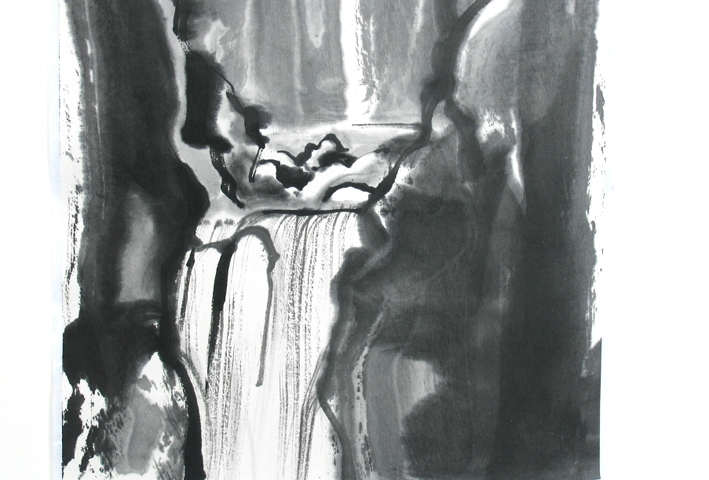
Wáng Bì 王弼 (226–249):
hànyǔ pīnyīn
江海之所以能為百谷王者,
jiāng hǎi zhī suǒ yǐ néng wéi bǎi gǔ wáng zhě ,
以其善下之,故能為百谷王。
yǐ qí shàn xià zhī ,gù néng wéi bǎi gǔ wáng 。
是以聖人欲上民,必以言下之。
shì yǐ shèng rén yù shàng mín ,bì yǐ yán xià zhī 。
欲先民,必以身後之。
yù xiān mín ,bì yǐ shēn hòu zhī 。
是以聖人處上而民不重,處前而民不害。
shì yǐ shèng rén chù shàng ér mín bú zhòng ,chù qián ér mín bú hài 。
是以天下樂推而不厭。
shì yǐ tiān xià lè tuī ér bú yàn 。
以其不爭,故天下莫能與之爭。
yǐ qí bú zhēng ,gù tiān xià mò néng yǔ zhī zhēng 。
Ch. 66 is one of the two chapters (along with ch. 31) that have no commentary by Wáng Bì 王弼,
In further advice to the ruler, Laozi argues against competition and struggle, because competitive behavior forces a foreign will on natural processes in an aggressive and destructive way. [cf. Hsu 1976 p. 305].
A wise ruler takes a humble attitude towards the people without any goals of one's own .
"He carries out the will of the people without his power being felt." [Simon p. 206].
(Cf.. ch.. 08-10, 13, 17, 22, 28, 35, 51, 59, 76-78, 81).
01-03:
Why can rivers and seas act
as the many hundred valleys' kings?
Because they excellently go below them,
so they can act
as hundred valleys' kings.
01-03 "Streams and seas, whereby they are able to be king of the 'Hundred Rivers' is that they submit well to them. Therefore they are kings of the 'Hundred Rivers'...
All waters rush obediently to streams and seas, and willingly recognize them as their masters, but only because, though they are the greater and mightier, they do not rise above them, but rather demean themselves, in a good way, among them.
'... and whoever humbles himself will be exalted.' Applied: here to the highest persons in the kingdom." [** v. Strauß 1870 p. 295].
04-05:
So wise men, wishing to be above people,
certainly put themselves
explicitly below them;
wishing to be ahead of people,
they surely put themselves behind them.
04-05 "Therefore if the holy man wishes to be above the people, he must submit to them in word; if he wishes to lead the people forward, he must sit behind them in his person.
'In his person', this shows that the holy man not only in speech, but also in his actual behavior, follows and subordinates his person and his personal interests to the people; that is, to the interests of the whole." [**].
06-10:
Hence: wise men stand above,
yet people are unburdened;
they stay ahead,
yet people are undamaged.
So all world joyfully supports them,
yet not being weary.
Because they do not compete,
hence, worldwide nobody is able
to compete with them.
06-07 "Therefore the holy man remains above and the people are carefree, he remains ahead and the people are undamaged.
Because the holy ruler in word and reality subordinates himself to the people, as he must, to fulfill the purpose of his position, he remains above
without being heavy, annoying, oppressive to the people; he stays ahead without the people being damaged or injured; for both his words and his behavior testify to the fact that caring for the well-being of the people is for him above all personal interests." [**].
08 "Therefore all the world is pleased to obey him and never tires of it." [**].
09-10 "Because he does not argue, no one in the world can argue with him." [**].
______________________
"Far from being merely passive players buffeted about in the emerging order, both sages and seas actively coordinate the massive quantum of energy that flows into them from their constituents, and maximize its circulation to the advantage of all. Because such coordination benefits all equally, the streams and the common people defer happily to their coordinators.
What distinguishes the contribution of both the waterways and the sages is that they are able to be as effective as they are because they use accommodation rather than coercion as the basis for organizing their worlds." [Ames & Hall p. 182].
[
67 - The Three Treasures
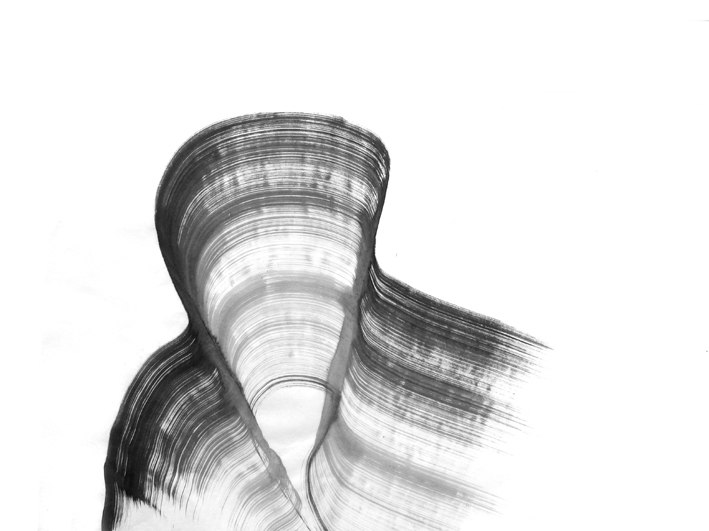
Wáng Bì 王弼 (226–249):
hànyǔ pīnyīn
天下皆謂我道大似不肖。
tiān xià jiē wèi wǒ dào dà sì bú xiāo 。
夫唯大故似不肖。
fū wéi dà gù sì bú xiāo 。
若肖,久矣!其細也夫。
ruò xiāo ,jiǔ yǐ !qí xì yě fū 。
我有三寶持而保之:
wǒ yǒu sān bǎo chí ér bǎo zhī :
一曰慈, 二曰儉,三曰不敢為天下先。
yī yuē cí , èr yuē jiǎn ,sān yuē bú gǎn wéi tiān xià xiān 。
慈故能勇,儉故能廣,
cí gù néng yǒng ,jiǎn gù néng guǎng ,
不敢為天下先故能成器長。
bú gǎn wéi tiān xià xiān gù néng chéng qì zhǎng 。
今舍慈且勇,舍儉且廣,舍後且先,
jīn shě cí qiě yǒng ,shě jiǎn qiě guǎng ,shě hòu qiě xiān ,
死矣!夫慈以戰則勝,以守則固。
sǐ yǐ !fū cí yǐ zhàn zé shèng ,yǐ shǒu zé gù 。
天將救之以慈衛之。
tiān jiāng jiù zhī yǐ cí wèi zhī 。
[ This chapter is considered to be the key to Daoist ethics. [Ellen Chen 1989 p. 208].
[ Dào is concretized in the 'Three Treasures' of compassion, frugality, and humility.
[ 慈 cí compassion is formed from the sign for heart 心 xīn and a phonetic part 兹, which is, moreover, commented on 愛 ài love. The meaning here in ch. 67 corresponds most to compassion, but also adjectivally to: gentle, compassionate, kind, humane.
01-07:
Worldwide everybody calls my Dào great,
seemingly incomparable;
truly: only therefore great because
apparently incomparable.
If it were comparable,
long since
it were insignificant, too – truly!
01-07 "'It would already have become minute a long time ago' is as if [the text] said 'its becoming minute would have happened long ago.'
Were [my greatness] comparable, then it would lose that through which it is great. That is why [the text] says:
'Were it comparable [to anything others considered great], it would already have become minute a long time ago.'" [* Wáng Bì / Wagner].
08-12:
I have three Treasures,
to hold and cherish them:
the first is called Compassion,
the second Frugality, and
the third: "Not daring to act
ahead of everybody" (Humility).
08-09 The first treasure ('gem', 'jewel') is compassion, the second one is frugality, the third is a sentence that paraphrases humility:
[ Compassion or mercy, love descending like parent-child, sympathy, kindness;
[ Frugality or austerity;
[ Humility or modesty (from: 'not to dare to be ahead').
10 "It is a fact that it is due to [my] compassion, that [I am] able to be valiant;
[As the Laozi says in 67.6 and 67.7] 'It is a fact that as to compassion, one will win [only] if one abides in [open] battle by it, and one will be safe [only] if in the defense [of a city] one abides by it.' That is why [I am] 'able to be valiant.'" [*].
11 "It is due to [my] frugality [I am] able to be generous;
[If I as a ruler] make frugality a rule and cut down wasteful expenses, All Under Heaven will not be in need. That is why [I am] 'able to be generous'." [*].
12 "It is due to [my] not daring to come to be to the fore in All Under Heaven that [I am] able {to} complete instruments for [All Under Heaven] and be the leader.
It is only as a consequence of [the Sage's] 'putting his own person in the background' and 'disregarding his own person' [as the Laozi says in 7.2.] and becoming that to which the other entities render themselves, that he is able indeed to 'establish and complete instruments for the benefit of All Under Heaven' [as the Xici 7.9b.8ff. say about the Sage] and to be the leader among the entities." [*].
13-15:
With Compassion–
thus I can be lionhearted,
with Frugality –
thus I can be high-hearted,
"Not daring to act
all world ahead" (Humility!) –
thus I can complete
my potential and lead them.
13 Compassion 慈 cí with the substantial sign for heart 心 xīn allows one to be correspondingly courageous (brave), analogously French courageux (coeur!), German beherzt.
14 Frugality allows one to be munificent, generous and big-hearted.
15 "Precisely because I shied away from taking first place in the imperial government, I can manage to be the first among the gifted people." [** v. Strauß 1870 p. 301].
16-21:
Nowadays they reject Compassion,
moreover like to be lionhearted,
they reject Frugality,
moreover like to be high-hearted,
and they reject to stand behind,
moreover like to be ahead –
deadly, indeed!
For Compassion, used in fighting,
thus wins,
used in defence,
it resists.
16 "Nowadays... rulers discard their compassion and yet [strive to be] valiant,
'and yet' [strive to be valiant] is like 'get hold of' [being valiant].
17 "Discard their frugality and yet [strive to] be generous discard their keeping in the background and yet [strive to] be to the fore..." [*].
18-19 Inability to humbleness and great ambition: a 'deadly 死 sǐ cocktail'!
20-21 [This is so because] it is a fact that as to compassion, one will win [only] if one abides in [open} battle by it. [*].
And one will be safe [only] if in the defense [of a city] one abides by it.
22-23:
When Heaven wishes to save you,
it protects you through Compassion!
22-23 He whom Heaven intends to save it will guard by means of compassion. [The same applies for frugalities and not daring to come to be to the fore.]". [*].
The original meaning 'way' was extended not long before Laozi to the comprehensive term of 'Dào' 道.
In ch. 6, 莊子 Zhuāng zǐ deals with the spatial and temporal infinity of the perfect man who has become one with Dào:
"Well, you can hide the little in the big, and yet there is always the danger that it will elude one, but if you hide the universe in the universe, it will never slip away."
[
68 - True Leadership
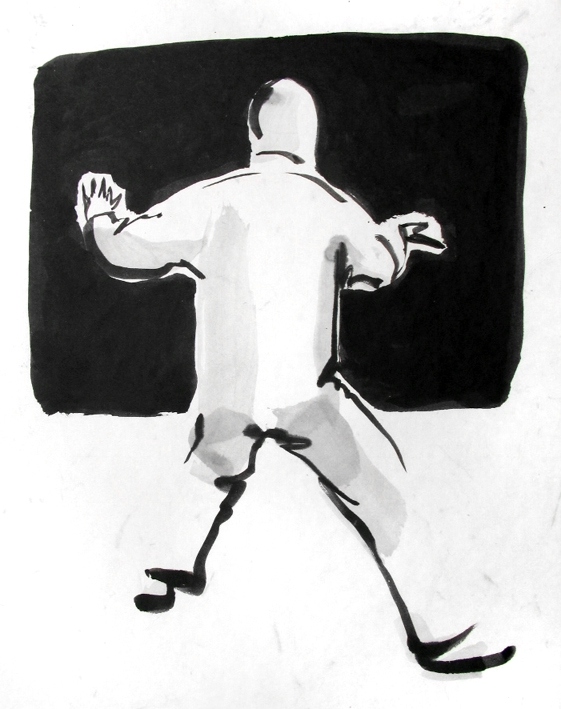
Wáng Bì 王弼 (226–249):
hànyǔ pīnyīn
善為士者不武。
shàn wéi shì zhě bú wǔ 。
善戰者不怒。
shàn zhàn zhě bú nù 。
善勝敵者不與。
shàn shèng dí zhě bú yǔ 。
善用人者為之下。
shàn yòng rén zhě wéi zhī xià 。
是謂不爭之德。
shì wèi bú zhēng zhī dé 。
是謂用人之力。
shì wèi yòng rén zhī lì 。
是謂配天古之極。
shì wèi pèi tiān gǔ zhī jí 。
Early Daoism takes a quasi-pacifist attitude in the (natural) right to defense, but if possible without bloodshed, not martial and passionate, but 'with human love and virtue'.
In dealing with subjects, the wise ruler shows true leadership of Inner Power, as the, so to say, 'supreme subject' and 'first servant of the state'.
"So war be damned, curse the work of arms!
The sage has nothing to do with her delusion.
He will only swing the weapon as a last-ditch rescue,
to force life through the death upon the world."
[Li Tai-bo, 701-762 / Klabund,
'Tränen und Rosen', 1965 p. 30].
01-04:
Good officers are not martial,
good fighters not infuriated,
good conquerors of enemies not engaged,
good superiors act like subordinately.
Far from any readiness to launch a war of aggression, a case of necessary defense against attackers can require one to lead, to fight and to win..
A morally mature army commander does not love to search for a battle, he does not lose control through passionate anger, 'approaches with human kindness, he moves away with virtue, brings the enemies to the surrender voluntarily, if possible without bloodshed' [per Héshàng Gōng 河上公].
01-04 "'Officer' is a commander of soldiers.
[ To be 'martial' means to appreciate being at the fore and to suppress others.
[ They kept [their] own persons] in the background [like the Sage according to Laozi 7.2] and did not [press to be] at the fore, they fell in but did not sing the lead [as, according to Wang Bi on Laozi 10.5, the hen does whose attitude the Sage is emulating].
[ [That is so because] 'he, who is good at overcoming, enemies do not engage with them.' That is, do not engage in fighting!
[ He who is good at using others, lowers himself beneath them." [* Wáng Bì / Wagner].
05-08:
Called non-competitiveness' Inner Power,
it means superiors' leadership;
called resembling Heaven:
in antiquity the highest!
"Here is shown that the ability not to engage in fighting – which was the culmination of 'not martial, not angered' – was meant to be moral, since it is now called virtue.
That is called 'man-using power'." [** v. Strauß 1870 p. 304].
05-06 "This [not engaging in fighting] I call the capacity for not fighting.
That [lowering oneself as an officer beneath one's men] I call making use of the strength of others.
Were he using others but not lowering himself beneath them, then [their full] strength would not be used. [*; see p. 490].
07-08 "These [two abilities] I call matching Heaven. They are the ultimate [achievement] of antiquity." [*].
The real power to use human beings consists in their own service as a supreme subject!
"Un prince est le premier serviteur et le premier magistrate de l'Etat. – A prince is the first servant and the first magistrate of the state." (Frederick the Great).
[
69 - Victorious Retreat
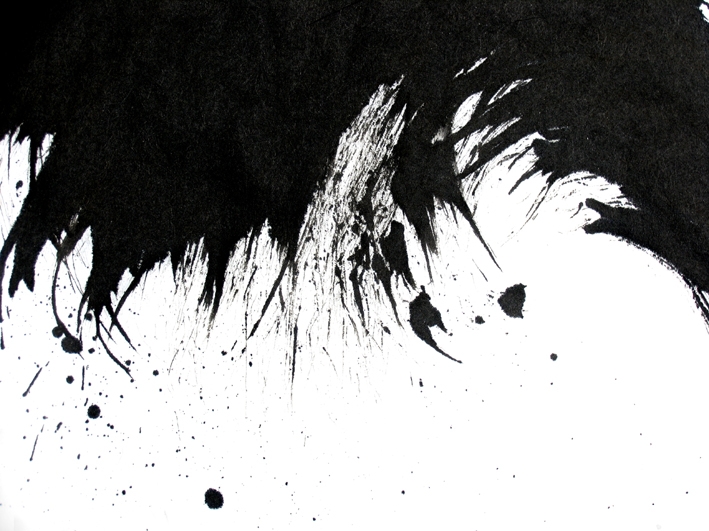
Wáng Bì 王弼 (226–249):
hànyǔ pīnyīn
用兵有言:吾不敢為主而為客。
yòng bīng yǒu yán :wú bú gǎn wéi zhǔ ér wéi kè 。
不敢進寸而退尺。
bú gǎn jìn cùn ér tuì chǐ 。
是謂行無行。
shì wèi háng wú háng 。
攘無臂。扔無敵。執無兵。
rǎng wú bì 。rēng wú dí 。zhí wú bīng 。
禍莫大於輕敵。
huò mò dà yú qīng dí 。
輕敵幾喪吾寶。
qīng dí jǐ sàng wú bǎo 。
故抗兵相加哀者勝矣。
gù kàng bīng xiàng jiā āi zhě shèng yǐ 。
In the period of the "Warring States" (481-221 BC), Laozi transfers the principles of humility and frugality to military action, in case, in spite of a fundamentally pacifist orientation, it is necessary in the sense of the ultima ratio for defense.
"Lao-tse loathed the militarism of his time". [Héshàng Gōng 河上公 / Erkes 1958 p. 119, 235].
01-05:
On using weapons there are sayings:
"I do not dare to act as a host,
but rather act like a guest".
"Not daring to advance an inch,
but rather I retreat a foot."
01-05 "Those who [truly understand how to] use soldiers have too many sayings that run; 'I do not dare act the master, but act the guest; I do not dare advance an inch but retreat a foot.'" [* Wáng Bì / Wagner].
"I do not force anyone into battle, but if he urges me, I am ready although still hesitant even then." [** v. Strauß 1870 p.306].
06-09:
This is called:
"To advance without going forward,
to reject without arms,
to throw back without attacking,
to capture without weapons."
06-09 Carried by humanity even in combat, moral superiority will, more than all weapons, overcome any ruthless, foaming-at-the-mouth fighter.
Remarkable 'Poetic paradoxes' of the four lines!
"This [I] call march on a no-march, roll up the sleeves on the no-arm, take hold of the no-weapon, and throw back the no-enemy.
'To march' refers to marching in a battle. This means: If [as a commander] one makes use for warfare of modest reserve pity, and compassion, as well as [an attitude] of not daring to stand above other entities [these three being the 'three treasures' of the Sage in Laozi 67, namely, frugality, compassion, and not daring to come to the fore in All Under Heaven], then this is like marching on a no-march, rolling up the sleeves on the no-arm, taking hold of the no-weapon, and throwing back the no-enemy, which means there is nothing to offer resistance to such a one." [*].
10-13:
No calamity is bigger
than underestimating opponents;
underestimating the opponent
almost loses my three Treasures.
Hence: when fighting forces
mutually face,
the pitying ones prevail.
10-11 Those who attack frivolously (ch. 26) attack, while underestimating their opponents, injure themselves. The prudent hesitation of the good man, as one of the Three Treasures (ch. 67), is the result of compassion in the sense of merciful love (ch. 30 + 31).
"In the long run, it is not the brute force that will win, but the state that only takes up the fight as a last resort and only enters into it with a heavy heart, so that it pursues a far-sighted and thoughtful policy all around." [Braunsperger p. 210].
The fact that the merciful one will prevail has even made Shakespeare say: “When lenity and cruelty play for a kingdom, the gentler gamester is the soonest winner”. [Henry V].
"[Another one of their sayings is]:
[ 'There is no greater misfortune than not having enemies, Not having enemies would be about equal to the demise of my [the sage commander's] treasures."
[ This means: practice pity and compassion as well as modest reserve, and I do not desire by 'imposing violent [rule]' [as the Laozi says in ch. 30.4 about 'someone who is good at it (using troops)' and who 'will just get ([things) done'] [*] [to come to the point that] there is no enemy [of mine] in All Under Heaven.
[ If unintentioinally it eventually should come to the point that there is no enemy [left], I would consider this to be a great misfortune. The 'treasures' are the 'three treasures' [of Laozi ch. 67.2]." [* Wáng Bì / Wagner p. 357].
12-13 "That is why when troops are raised {deployed}to meet each other, those with pity [for each other] will win.
'Raise' means to 'bring forward.' 'To meet' means 'to confront'. Those with pity will necessarily take care of each other and will not rush after spoils and shirk hardships. That is why they will necessarily 'win'". [**].
________________
* Wang Bi's commentary to Laozi 30.4 reads: "'Get [things] done' is like 'bring order.' [The above phrase] means: someone who is good at using troops will just set his mind on bringing order to troubles and that is it, but he will not by means of military force impose violent [rule] in All Under Heaven."
** "The same argument is made in Wang Bi's comm. on Laozi 67.6." [* Wagner 2003 p. 491].
[
70 - But Few are Chosen
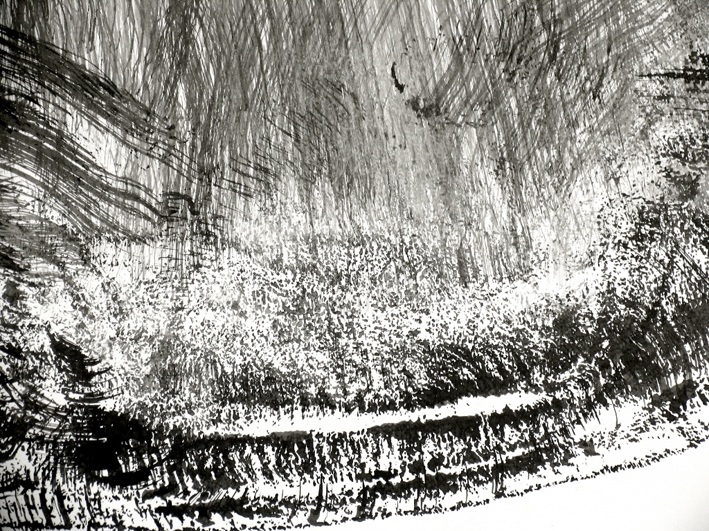
Wáng Bì 王弼 (226–249):
hànyǔ pīnyīn
吾言甚易知、甚易行。
wú yán shèn yì zhī 、shèn yì háng 。
天下莫能知、莫能行。
tiān xià mò néng zhī 、mò néng háng 。
言有宗、事有君。
yán yǒu zōng 、shì yǒu jūn 。
夫唯無知,是以我不知。
fū wéi wú zhī ,shì yǐ wǒ bú zhī 。
知我者希,則我者貴。
zhī wǒ zhě xī ,zé wǒ zhě guì 。
是以聖人被褐懷玉。
shì yǐ shèng rén bèi hè huái yù 。
"The unassuming carries what is precious inside himself and only a small circle of connoisseurs knows about it, They worship him." [Simon p. 70].
"Because seeing they don’t see, and hearing, they don’t hear, neither do they understand." [Matthew 13:13].
01-04:
My words are very easy to understand,
very easy to follow;
but nobody worldwide can understand them,
no one can follow them.
01-02 "It is possible to understand [his words] 'without going out of doors' and [without] 'looking out of the window' [as the Laozi says in 47.1 about understanding All Under Heaven]. That is why [the text] says: '[My words] are very easy to understand'!"
'Without his acting on them [the other entities] he [the Sage] gets [them] completed' [as the Laozi 47.4 says].[*] That is why [the text] says: ''[My words] are very easy to put into practice'!" (cf. ch. 49). [* Wáng Bì / Wagner].
03-04 "[The others] are deluded by excitement and desires; that is why [the text] says: 'No one is able to understand [my words]'!
[The others] are led astray by the glory and profit; that is why [the text] says: 'No one is able to put [my activities] into practice'"![**] [*].
05-10:
My words follow rules,
my deeds follow a ruler.
For only without understanding,
therefore I am not understood.
They who understand me, are rare,
accordingly I am appreciated.
05-08 "This is because his 'words have the principle' and his 'activites have the ruler.'
That is why people with understanding cannot fail to understand him." [*].
09-10 "'Insofar as I [he] [pursue(s) to the very end] the deep' [, as the Xici 7.8.a9, says about the Sage,], there are few of those who understand me. The fewer there are of those who understand me, the more I also shall be without equal. That is why [the text] says:
'The fewer there are of those who understand me the more I am honored!'" [*].
11-12:
Hence: Wise men wear coarse clothes,
but in their heart a jewel.
11-12 "'He wears coarse cloth' is identical with [what the Laozi says in 56.6 about the wise ruler, and in 41 about the wise ruler, and in 4.1 about the Way, namely,] 'he joins in the same dust with them [the other entities].'
'He carries a piece of jade in his bosom' means he is treasuring his true [nature]. The reason the Sage is hard to understand is [in fact] that he 'joins in the same dust [with them]' but does not stand out, that he carries a piece of jade in his bosom but does not let it show. That is why he is hard to understand but honored!" [*].
Daoist knowledge and understanding is not encyclopaedic, but full of "Sensitivity to minimal differences that allow to perceive seismographic changes and to use them (... as long as they are small)." [Kalinke p. 130]. (ch. 47, 52, 64).
___________________________
* Cf. ch. 47; s. Wagner, 2003 p. 491].
** Nearly word-for-word like Wang Bi's commentary to Laozi 20.09.-11.: "The vulgar scholars are beguiled by beauty and promotion, bedazzled by glory and profits." [Cf. Wagner, The Craft of a Chinese Commentator, p. 128].
[
71 - Illusion and Wisdom
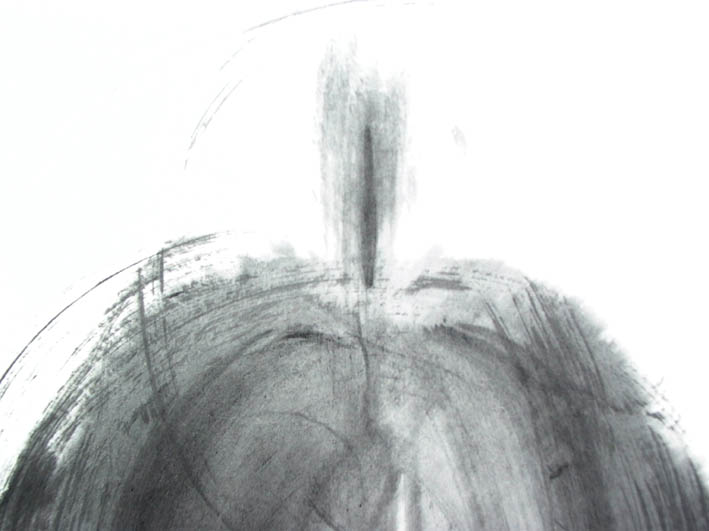
Wáng Bì 王弼 (226–249):
hànyǔ pīnyīn
知不知上,不知知病。
zhī bú zhī shàng ,bú zhī zhī bìng 。
夫唯病病,是以不病。
fū wéi bìng bìng ,shì yǐ bú bìng 。
聖人不病,以其病病。
shèng rén bú bìng ,yǐ qí bìng bìng 。
夫唯病病,是以不病。
fū wéi bìng bìng ,shì yǐ bú bìng 。
[ "The saying is a virtuoso play on sound and language concerning the concepts 知 zhī 'know' recognize 'and 病 bìng* 'sick', here grasped as shortage." [Simon p. 71]. [* 'failure, mistake'].
[ To desire non-desire, but also to know non-knowledge, is at the same time the highest and the return to the origin. [see Ellen Chen 1989 p. 216].
[ 病 bìng in modern Chinese for disease entails a blockage of qi. "In this case, epistemic disease is the blockage of access to immediate experience". [Ames & Hall p. 189].
01-04:
“I know that I know nothing.” –
the highest.
Not knowing (not) to know –
a deficiency:
for only deficiency of this deficiency
is therefore no deficiency.
“I know that I know nothing.” –
the highest.
Not knowing (not) to know –
a failing:
for only failing this failing
is therefore no failing.
[ "It is a fact that only [a ruler] who recognizes trouble as trouble [caused by the application of knowledge which one should avoid] will therefore not have trouble. [* Wáng Bì / Wagner].
[ "Cognition has the unconditioned and the unlimited, only if it recognizes its conditionality and limitations, i.e. its non-recognition, in relation to him;
Which is precisely for this reason the highest, because it includes the recognition of the absolute exuberance of its object.
It is also only thus that the Socratic knowledge of ignorance has its great significance..." [** v. Strauß 1870 p. 312].
[ "The fish trap is how you catch the fish. Having caught the fish, forget the trap. The snare is how you catch the rabbit. Having caught the rabbit, forget the snare.
Words are how you capture meaning. Having caught the meaning, forget the words. Where am I going to find someone who has forgotten the words, so that I can have a word with him?" [莊子 Zhuāngzǐ (369-286 B.C.)].
01-02 "If [a ruler] knows that [he should] not [make use of] knowledge, he will be esteemed.
If [a ruler] does not know about knowledge [not being fit for application], he will be in trouble." [* Wáng Bì / Wagner].
03-04 "It is a fact that only [a ruler] who recognizes trouble as trouble [caused by the application of knowledge which one should avoid] will therefore not have trouble." [*].
Or: "If one only feels 'aggrieved by this 'disease', i.e., if he only feels and understands the abnormal state as such, then, 'in this way', he 'passes' beyond it, and insofar he is not ill." [**].
"Our life is limited, but knowledge (differentiating knowledge) is limitless." With our limited life it is dangerous to approach the limitless (the limitless possibilities of differentiating knowledge), but those who have realized this and are still struggling for knowledge move on in even greater dangers."
[莊子 Zhuāngzǐ].
05-07:
Wise men have no deficiency:
because of that deficiency of this deficiency,
therefore they have no deficiency.
Wise men are not failing:
because of that failing this failure,
therefore they do not fail.
05-07 "The Sage's not having trouble is due to his recognizing trouble as trouble [in this sense]. That is why he does not have trouble.
He who 'recognizes trouble as trouble' understands the reason for which trouble comes about [namely, the application of knowledge in government]." [*].
[
72 - True Authority
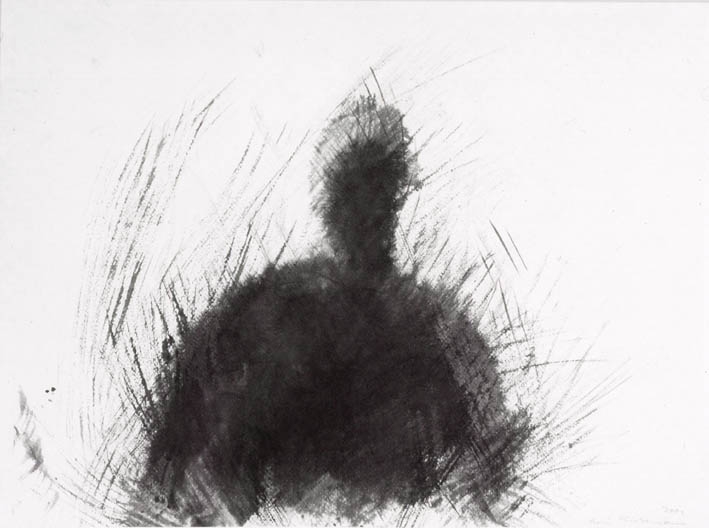
Wáng Bì 王弼 (226–249):
hànyǔ pīnyīn
民不畏威,則大威至。
mín bú wèi wēi ,zé dà wēi zhì 。
無狎其所居,無厭其所生。
wú xiá qí suǒ jū ,wú yàn qí suǒ shēng 。
夫唯不厭,是以不厭。
fū wéi bú yàn ,shì yǐ bú yàn 。
是以聖人自知不自見。
shì yǐ shèng rén zì zhī bú zì jiàn 。
自愛不自貴。
zì ài bú zì guì 。
故去彼取此。
gù qù bǐ qǔ cǐ 。
[ The life forms of the people are to be respected, it must not be suppressed. The ruler should neither seek nor accept any personality cult.
[ Per Chen Guying [1984 p. 333], in this chapter the rulers are warned not to use instruments of power that are too harsh.
[ This chapter also introduces a discussion of criminal law and the death penalty in the two following chapters.
01-06:
When people do not awe the authorities,
then the Great Authority will come.
Without constriction be their place to dwell,
without suppression their place to live:
for only not suppressed,
they are thereby not depressed!
01-02 "If [the ruler] leaves his purity and calmness {serenity} (Laozi 15) and acts out his excitements and desires, abandons his modesty and his 'putting himself [in the] background' (Laozi 07 + 67) and applies {puts} his authority and power [to use}, then the other entities will make trouble and the people will become wicked.
Once [his] authority is not able [anymore] to establish control over the people, and [once] the people are unable to bear his authority [any longer], then high and low are in great turmoil: Heaven's death penalty [for the ruler] will come." [* Wáng Bì / Wagner].
03-04 "'Being without recklessness is what makes him [the ruler] have rest', 'being without repression is what makes him [the ruler] have [keep] his life" means that he definitely should not apply the power of [his] authority."
Wáng Bì explained that additionally by: "Having 'purity' and 'calmness' (Laozi 15.4) and [thus] being 'without interference,' (Laozi 2.2), (Laozi calls 'having rest.'
Being modest and 'putting [one's person as a ruler] in the background' (Laozi 7.2 and 67) [and thus] 'not filling [it] up' (Laozi 15.6 ff.), [Laozi] calls 'having life'." [*].
05-06 "That is, that he himself does not repress. As he does not repress himself, there will therefore be no one in All Under Heaven to repress him." [*]. (ch. 75, 80).
07-11:
Therefore: Wise men know themselves,
but do not note themselves.
With self-esteem,
yet not with self-overestimation:
hence, they leave this and prefer that.
07-08 "He does not himself show what he knows by way of shedding light on the behavior in and out of office [of others]." [*].
"According to Laozi 58.10, the Sage 'enlightens but does not investigate,' 方而不割, which is commented on by Wang Bi: 'By means of enlightenment he clears up what has deluded them [the people] but does not by means of his enlightenment shed light on their [the people's] secret hideouts. this is what is said [in Laozi 41.3] 'It is the [Sage's] Way of enlightening to be well-nigh dark.'" [Wagner 2003 p. 493].
09-10 In power, the wise man is also subject to constant temptations, especially the temptations to abuse his power. "But by knowing the subtle forms of shame emanating from a status of authority, he can maintain his authority without arousing hat-red." [Kalinke p. 132].
"Would he exalt himself, the other entities would be reckless with and repress [his] rest and life."
11 "That is why he rejects the latter and keeps the former."
[the latter = 'to make a show and to exalt himself', the former = his own knowledge and the love for himself]. [*].
"It is only by being people-centered that those entrusted with governing can exercise the authority appropriate to bringing proper order to the world. If the people feel mistreated and become estranged from those holding political responsibility, the days of the present regime are numbered, and political change is imminent." [Ames & Hall p. 191].
[
73 - Tacit Victories
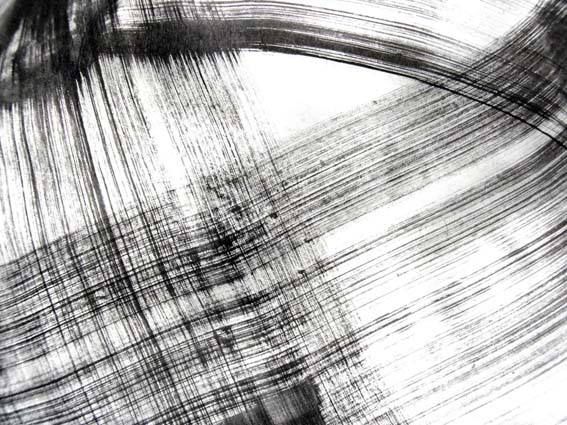
Wáng Bì 王弼 (226–249):
hànyǔ pīnyīn
勇於敢則殺。
yǒng yú gǎn zé shā 。
勇於不敢則活。
yǒng yú bú gǎn zé huó 。
此兩者或利或害。
cǐ liǎng zhě huò lì huò hài 。
天之所惡孰知其故。
tiān zhī suǒ è shú zhī qí gù 。
是以聖人猶 難之 天之道不爭而善勝。
shì yǐ shèng rén yóu nán zhī tiān zhī dào bú zhēng ér shàn shèng 。
不言而善應。
bú yán ér shàn yīng 。
不召而自來。
bú zhào ér zì lái 。
繟然而善謀。
chán rán ér shàn móu 。
天網恢恢疏而不失。
tiān wǎng huī huī shū ér bú shī 。
The further advice to the (wise) ruler remains true to the maxim of gentleness and non-intervention:
"Ruling without aggression, conviction without speech, legitimacy of the ruler by the followers, ataraxy without lacking a plan." [Simon p. 224].
01-03:
Courage to dare: killing then,
courage not to dare: living then –
these two might benefit, or harm.
01 (Daring ...): "By necessity he 'will not come to his natural death' [as the Laozi says in 42.3 about 'those who are violent and brutal']".
02 Not daring...): "By necessity he will complete his [allotted] life [span]." [* Wáng Bì / Wagner].
03 "Both are courage, but what they effect is different.
They differ with regard to benefit and harm." [*].
"To impose death is a risk; what you risk in doing so, you do not risk when you pardon; but for both, one needs courage, because you always take on a great responsibility." [** v. Strauß 1870 p. 318].
04-06:
Heaven's dislike:
who would actually know its reason?
Hence, even wise men find this difficult.
04-05 "This means: 'Who is able to understand Heaven's intentions? Only the Sage.'".
06 "It is a fact that, if already the insight of the Sage 'considers difficult' the 'courage' 'to dare,' how much more [will this be the case] for those lacking the insight of the Sage, but desiring to put into practice [what follows from] these [two statements in text 1 and 2]. That is why [the text] says: 'Already [the Sage] considers it difficult.'!" [*].
07-10:
Heaven’s Way: not competing,
but best in winning,
not speaking,
but best in responding,
not calling,
but letting come by itself;
At ease so, certainly,
but best in planning.
07 "[As the Laozi says about the Sage in 22.7] 'It is a fact that only because he does not struggle [,] no one in All Under Heaven is able to struggle with him." [*].
08 "That following [his teachings] brings luck, deviating from them, misfortune [is meant by] 'not to speak but still being good at being followed." [*].
09 "If he positions himself in a lowly [station], the other entities will on their own submit themselves to him.". [*].
10 "As [the Xici 7.10a1, says, 'Heaven] lets hang down the images and shows fortune and misfortune' ['and the Sage imitates them'], he establishes a warning before something has happened.
[As the Xici 8.5.a3 says about the Gentleman] 'While being in security [in his position] he does not forget the [threat of] danger' and [, as the Laozi says about the Sage Ruler in 64.1,] while 'there are still no signs [of danger to his life]' he 'takes precautions.' That is why [the text] says 'to be at ease but still be good at taking precautions.". [*].
11-12:
Heaven's Net: vast and wide,
wide-meshed, but impermeable.
11-12 "The net of Heaven is vast, [its mesh] is wide, but still nothing gets lost." [*].
Many interpretations are possible here and have been implemented: from the inability of the guilty to escape the comprehensive punitive authority (the ruler or even Heaven) to nature as a celestial net that encompasses all being and cannot be dominated, but should be a model for man and his actions.
"The Tao of nature is intelligent and powerful, it realizes its plan without effort, and it responds to potentially destabilizing extremes with unalterable precision." [Wing].
The model of 天 tiān, Heaven: "Real strength entails flexibility, real wisdom entails uncertainty, and real endurance entails patience. So, too, real courage is most effective only when it is tempered by prudence." [Ames & Hall].
[
74 - Death and Deadliness

Wáng Bì 王弼 (226–249):
hànyǔ pīnyīn
民不畏死,奈何以死懼之。
mín bú wèi sǐ ,nài hé yǐ sǐ jù zhī 。
若使民常畏死,而為奇者,
ruò shǐ mín cháng wèi sǐ ,ér wéi qí zhě ,
吾得執而殺之,孰敢。
wú dé zhí ér shā zhī ,shú gǎn 。
常有司殺者殺。
cháng yǒu sī shā zhě shā 。
夫代司殺者殺,是謂代大匠斲。
fū dài sī shā zhě shā ,shì wèi dài dà jiàng zhuó 。
夫代大匠斲者,希有不傷其手矣。
fū dài dà jiàng zhuó zhě ,xī yǒu bú shāng qí shǒu yǐ 。
[ Death and the death penalty are discussed in terms of their effect or non-effect and their implementation.
[ The ultimate legitimation of the end of life is the responsibility of the Great Carpenter, a powerful symbolization of the Dào.
[ "The death penalty is an intervention in what is as it is 自然 zì rán (here: human life), that will take a bitter revenge [Simon p. 74].
[ "Whoever wants to supplant the celestial messenger of death, loses his principles." [Héshàng Gōng 河上公 / Erkes 1958 p. 126, 242].
01-06:
People, not afraid of death,
how could one threaten them with death?
If you cause people
fearing death continuously,
and evildoers –
I would find and seize them...
but to execute them –
who would dare?
"Odd and uncommon [acts] to confuse the true [essence] [Laozi] calls '[committing] outrages.'" [* Wáng Bì / Wagner].
01-02 "...how could they be frightened by [the threat] of death?" [*].
"Experience teaches us how indifference to death can proliferate in such conditions, but, at the same time, crime increases, because the death threatened by the law and imposed by the judge is then no longer a deterrent for the people." [** v. Strauß 1870 p. 321].
03-06 "And, even if people could be made continuously afraid of death, and one [, that is, a ruler, personally] would be able to consign those committing outrages to execution, who would there be to dare [to do theses executions]? [No one]." [*].
'Let him who is without sin cast the first stone.' [John 8:7].
Note: Like here, 吾 wú can be treated as 'one', and it occurs in classical authors like Mengzi and others. [see Wagner 2003 p. 494].
07-11:
Always there were official executioners
for putting to death.
Yet, replacing them for executing
means replacing the Great Carpenter
to chop down.
Yet truly: When replacing
the Great Carpenter as cutter,
rarely they had not
hurt their hands, indeed!
07 "[No one, because] there are always [people] handling executions who do the executing." [*].
08-09 "It is a fact [, however,] that to replace [the people] handling executions at executing is replacing the Great Carpenter at cutting [wood]." [*].
10-11 "It is a fact that few among those replacing the Great Carpenter at cutting will [get away] with their hands unharmed.
Those committing deviations will be loathed and resented by those going along; those who are not humane will be hated by those who are humane [and these other people will handle the execution of such villains automatically]. [*].
"According to the Taoist view, the killing of a human - whether inside or outside the law - is an unnatural act that ultimately destroys the social structure, and the leader will harm himself if he assumes power that is anchored neither in himself nor in the organization.
Any laws, restrictions, or punishments that inhibit the natural growth and independent development of human consciousness will destroy both the organization and its leaders." [Wing].
[
75 - Tax Riots
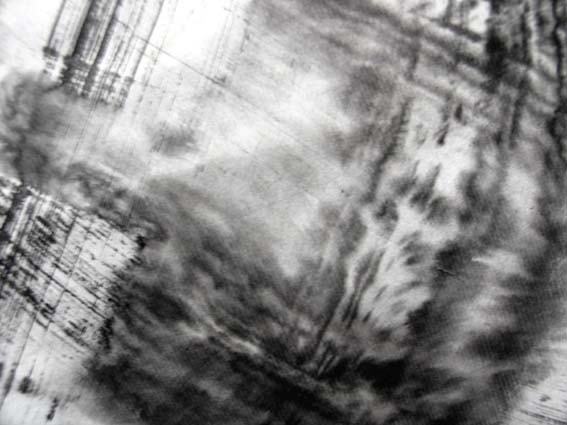
Wáng Bì 王弼 (226–249):
hànyǔ pīnyīn
民之饑以其上食稅之多,是以饑。
mín zhī qí yǐ qí shàng shí shuì zhī duō ,shì yǐ qí 。
民之難治以其上之有為,是以難治。
mín zhī nán zhì yǐ qí shàng zhī yǒu wéi ,shì yǐ nán zhì 。
民之輕死以其求生之厚,是以輕死。
mín zhī qīng sǐ yǐ qí qiú shēng zhī hòu ,shì yǐ qīng sǐ 。
夫唯無以生為者,是賢於貴生。
fū wéi wú yǐ shēng wéi zhě ,shì xián yú guì shēng 。
[ "The exploitation and oppression of the people are a special kind of targeted intervention on the part of the rulers ...
[ The text analyzes, without calling to rebellion, but it emboldens the exploited inasmuch as it suggests that they perceive the significance of their existence: There is no unworthy life." [Simon p. 75].
01-06:
The people starve...
because their authorities
eat up tax-grain in heaps...
therefore they starve.
People are hard to rule,
because their authorities
practice interference –
so they are hard to rule.
01-03 "That people do not gather the harvest is due to their ruler's eating too much tax-grain."
Note: 饑 jī here: The causes of famine more than the famine itself! [see Wagner p. 495].
"The rulers themselves, the upper class, are to blame for the hunger of the people; they take too much away from them in taxes, in order to live in opulence themselves.
Since the levies consisted for the most part of natural produce and crops, their excesses had immediately to bring about want in the already numerous populations, and the expression that the levies were consumed, actually 'eaten', is therefore fitting." [** v. Strauß 1870 p. 324-325].
04-06 "That is why they do not gather the harvest! That people are hard to rule is due to their ruler's practicing interference. That is why they are hard to rule!". [* Wáng Bì / Wagner].
07-11:
The people take death lightly,
because ruler's strive for life's fullness –
so they take death lightly.
For just without
striving towards life,
this is worthier than
appreciation of life.
07-09 "The people take death líghtly, because of the stress on the urgency of seekin', Conversely, if those above practice Non-action, they allow the people to live naturally and so are worthy examples of valuing life" [Cheng p. 217].
"[In short,] that people take death easily is due to their ruler's striving for the fullness of life. That is why they take death easily." [*].
10-11 "It is a fact that only the absence of appreciation of life is worth more than the appreciation of life.
This means: That by which people are turned wicked and order is turned into chaos is entirely based on the ruler['s behavior] and not on [that of] those below. The people [only] follow [the precedent] of the ruler."
Note: Doubts have been expressed as to whether this chapter be written by Laozi himself. [see Wagner p. 495].
[
76 - Subtle Strengths
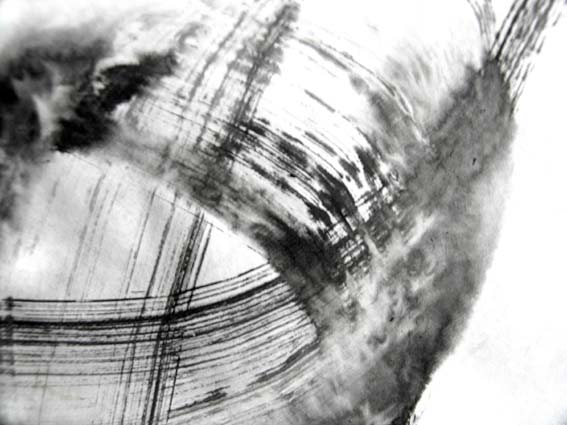
Wáng Bì 王弼 (226–249):
hànyǔ pīnyīn
人之生也柔弱,其死也堅強。
rén zhī shēng yě róu ruò ,qí sǐ yě jiān qiáng 。
草木之生也柔脆,其死也枯槁。
cǎo mù zhī shēng yě róu cuì ,qí sǐ yě kū gǎo 。
故堅強者死之徒,柔弱者生之徒。
gù jiān qiáng zhě sǐ zhī tú ,róu ruò zhě shēng zhī tú 。
是以兵強則滅,木強則折。
shì yǐ bīng qiáng zé miè ,mù qiáng zé shé 。
強大處下,柔弱處上。
qiáng dà chù xià ,róu ruò chù shàng 。
[ In the dialectical style of early Daoism, the cycles of human life and of all nature are presented by way of antagonistic word pairs.
The gentle, supple, soft are, of course, representatives of life; the violent, the rigid, the hard are those of death.
[ "The embryonic is closer to development, and the mature is closer to individuation."
In a one-sided picture of reality, one overlooks "... the hidden possibilities contained in the embryonic and in the hints and imponderables."
Unassuming and unnoticed, they contain "... those structures which are essential for the future and which, in contrast to their appearance, should occupy a higher rank than what has already been fixed. [Braunsperger p. 320]. Cf. ch. 10, 20, 36, 43, 55; 72-75.
01-06:
Men at their birth are soft and slight,
but at their death hard and rigid.
All living beings, if herbs or trees,
are soft and subtle at their birth,
but at their death dry and withered.
Hence, rigidity and strength
are companions of death,
softness and slightness
are companions of life.
01-02 "When people are alive they are supple and soft; when people are dead, they are hard and of violent [rigor]." [*Wáng Bì / Wagner].
Note: The term qiáng 強 denotes violence in the sense of both aggressive and unyielding. It is used in this zhang in both senses; for the dead, the aspect is the unyielding rigor; further down for the military, it is aggressive violence." [Wagner p. 495].
03-04 "When the ten thousand living beings, the grasses and trees live, they are supple and tender; when ... they are dead, they are dry and withered." [*].
05-06 "This is why hardness and violent rigor are the companions of death, suppleness and softness are the companions of life." [*].
07-10:
Therefore: are armies rigid, then not winning,
are trees rigid, then they break.
Rigidity and size stay inferior;
softness and gentleness stay superior.
"Where an army ruthlessly goes to war, merely trusting in its strength, this is already the indication that it will be defeated.
Where a tree has already reached the full extent of its growth, this is a sign that it will soon fall." [** v. Strauß 1870 p. 328].
07 "Someone who [makes use] of violent military [action] to impose his hegemony in All Under Heaven will be loathed by the other entities. That is why he will of necessity not reach [his natural] end." [*].
08 "This [breaking] will be done to [the 'tree'] by the other entities." [*].
"Like an army that is defeated, like a tree that is felled, like that whose life is exhausted and sinks to the ground in the face of death, they belong down, must be defeated, are unfit for royal reign, and will strive in vain to remain on top or to rise again." [**].
09-10 "... only those who, as mature people, retain tenderness and weakness, can hold themselves on top, like floating objects on the water." [Kalinke p.135].
"That is why the hard and violently rigid takes its place below – this refers to the root of the tree – and the supple and soft takes its place above – this refers to the twigs and branches." [*].
"Soft and weak in the noble sense denotes the generous gentleness and devotion of someone who forgets himself and, full of bubbling mental life, sees the well-being and salvation of all as his own, whose life, as if always starting again from the beginning, has a blessing effect and continually unfolds.
This is the royal mind, rightly constituted to be above, to be authority, and to persevere at its heights." [**].
[
77 - The Way of Nature
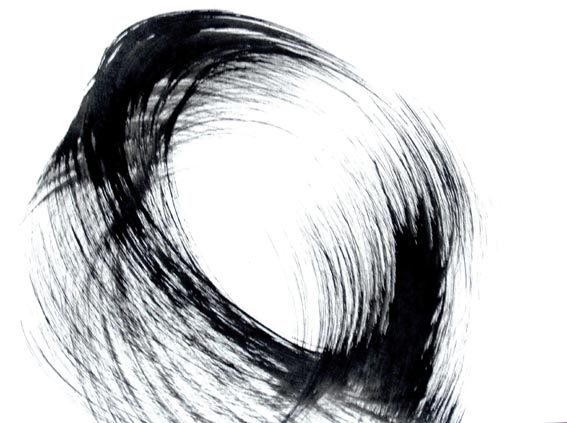
Wáng Bì 王弼 (226–249):
hànyǔ pīnyīn
天之道其猶張弓與。
tiān zhī dào qí yóu zhāng gōng yǔ 。
高者抑之,下者舉之。
gāo zhě yì zhī ,xià zhě jǔ zhī 。
有餘者損之,不足者補之。
yǒu yú zhě sǔn zhī ,bú zú zhě bǔ zhī 。
天之道,損有餘而補不足。
tiān zhī dào ,sǔn yǒu yú ér bǔ bú zú 。
人之道,則不然,損不足以奉有餘。
rén zhī dào ,zé bú rán ,sǔn bú zú yǐ fèng yǒu yú 。
孰能有餘以奉天下,唯有道者。
shú néng yǒu yú yǐ fèng tiān xià ,wéi yǒu dào zhě 。
是以聖人為而不恃,功成而不處。
shì yǐ shèng rén wéi ér bú shì ,gōng chéng ér bú chù 。
其不欲見賢邪!
qí bú yù jiàn xián xié !
[ Non-Dào rulers take the poor and give to the rich, Ellen M. Chen is reminded of the 'spirit of capitalism' and the 'Protestant ethic'. [1989 p.224].
[ "The loss of instincts and the rigid control of traditions allowed certain directions to escalate to the point of excess... (like upper and lower classes)". [Braunsperger p. 233].
[ The Dào, like the metaphor of the "archer drawing his bow" (used in other old texts and seeming obvious in Ancient China), compensates – to which secret societies in the Chinese history referred. [Simon 234-235].
01-06:
The Way of Heaven it is
like drawing a bow, isn’t it?
High things it pulls down,
low things it raises up;
abundancy to decrease,
insufficiency to supplement.
01-02 or: ...truly like someone drawing a bow!
03-06 "What is high up [in a bow] he presses down, what is down below he brings up, [in other words] what has to much it reduces, what is deficient it supplements." [*Wáng Bì / Wagner].
07-08:
The Way of Heaven decreases so
what has abundancy
and supplements
the insufficiency!
07-08 "While the Way of Heaven [thus] reduces excess by way of supplementing deficiency...] [*].
"The drawer of the bow 'lowers what is high up and raises what is down below' ... The tertium comparationis is the equalization of the unequal, there in the position of the bow ends, here in the distribution of goods; the former are brought closer together by increasing the tension on the bow, the latter by the process of heaven.
A similar thought with a similar connection can be found in 1 Sam. 2:7. 'Yahweh makes poor and makes rich, he nourishes and exalts.' ... Heaven takes away from those who have too much and gives to those who have too little." [** v. Strauß 1870 p. 331].
09-12:
The Dào of Man, however, is different:
it decreases insufficiency,
thereby offering to what has abundancy.
Who can have abundancy so
as to offer it all the world?
Only Dào followers.
09 "...this is not true for the way of men.
Only [a man who is a Sage] who ... is '[with his] Capacity in accord with [that of] Heaven and Earth' will be able to 'encompass them' [Heaven and Earth (Laozi 5.2 + 17.1)] as the Way of Heaven does ...
If someone has [only] the measure of a man then as each one [of them] has his [individual] person, they in no way can manage to rule each other equitably.
Only someone without an [individual] person who has eliminated his private [interests] form [his] That-which-is-of-itself-what-it-is will then indeed be able to 'be [with his] Capacity in accord with [that of] Heaven and Earth.'" [*].
10 "[The way of men] reduces what is [already] deficient by way of bringing up what [already] has excess." [*].
11-12 "What is [ultimately the only thing] capable of reducing the excess by way of bringing up what is deficient in All Under Heaven? Only [the] Way!
13-15:
Therefore: wise men act,
yet not relying on,
they complete
without dwelling on it,
they do not want to appear superior.
The 'holy man' 聖人 shèng rén has and does Dào, and he knows that he is doing meritorious things through Dào, so he 'does not rely on it' and 'does not dwell on it':
"Such a procedure can only emerge out of true wisdom, 賢 xián, moral spiritual significance, but he only proceeds thus precisely because he has Tào, not to show that he is wise..." [**].
"He is deserving of merit yet claims no credit because he has no desire to advertise his worth." [Cheng p. 221].
13-15 "That is why...
[ that the Sage acts, but does not presume [upon the other entities]; and that [his particular] achievements come about without his installing [himself in them] is due to his not wanting to display [his] capabilities.
[ This means: What is capable of residing in the overflowing but keeping intact [its] emptiness, reducing that which is to supplement, that which is not "mixes with [the other entities'] luster" and "joints in the same dust [with them]" [as the Laozi writes in 4.1, 56.5, and 56.6 about the Way and the Sage respectively] and is [undefinably] vast and rules equitably – only the Way!
[ That is why the Sage does not desire to display his capabilities, so as to equitably rule All Under Heaven." [*; Wagner p. 496]. (Cf. ch. 55, 56, 04, 77, 02).
[
78 - The Wisdom of Water
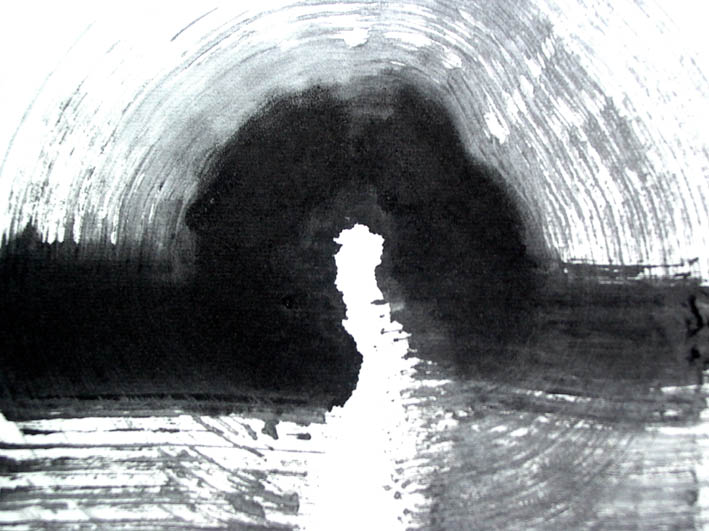
Wáng Bì 王弼 (226–249):
hànyǔ pīnyīn
天下莫柔弱於水。
tiān xià mò róu ruò yú shuǐ 。
而攻堅強者,莫之能勝,以其無以易之。
ér gōng jiān qiáng zhě ,mò zhī néng shèng ,yǐ qí wú yǐ yì zhī 。
弱之勝強。柔之勝剛。
ruò zhī shèng qiáng 。róu zhī shèng gāng 。
天下莫不知莫能行。
tiān xià mò bú zhī mò néng háng 。
是以聖人云,受國之垢是謂社稷主。
shì yǐ shèng rén yún ,shòu guó zhī gòu shì wèi shè jì zhǔ 。
受國不祥是為天下王。
shòu guó bú xiáng shì wéi tiān xià wáng 。
正言若反。
zhèng yán ruò fǎn 。
[ Water, supple and strong, is surpassing. embodying the unity of opposites in itself, that the seemingly weak overcomes the strong – that maxim that is easy to understand, but no one can obey.
[ Only the wise ruler, who accepts the shame and misfortune of his realm as a personal responsibility, is worthy of leading in a smooth and strong, gentle and sustainable way.
[ Paradox is the primordial, strictest form of truth.
01-04:
There is worldwide nothing
softer and weaker than water,
and yet:
in attacking the firm and strong,
nothing can surpass it,
for these have nothing
accordingly to replace it.
01-04 "Nothing in All Under Heaven is more supple and soft than water, but for one [a ruler] attacking the firm and violently rigid nothing is capable of surpassing [these features]. [If he acts] by means of it[s characteristics] there will be nothing by which he could be altered.
'By means of' means 'making use of.' 'It' refers to water. This [entire passage] means: If [a ruler] were to make use of the suppleness and softness of water, there would be no other entity that could change him." [* Wáng Bì / Wagner]. (Cf. ch. 13, 17, 78).
05-08:
The weak overcomes the strong,
the soft overcomes the hard.
In all world is no one
who would not know it,
yet no one can practice it.
05-06 "That the supple overcomes the hard and the soft the violently rigid is known to everyone in All Under Heaven." [*].
Cf. "For when I am weak, then I am strong. [2 Corinthians 12:10];
"Blessed are the meek, for they will inherit the earth." [Matthew 5:5].
07-08 "But no one is able to put [this] to practice." [*].
"But if you do not do what you know to be right, then a moral obstacle must be rendering one incapable of putting into practice what has been recognized:
The humility, which makes you mild, the selfless love, which makes you devoted, are lacking." [** per v. Strauß 1870 p. 334].
09-13:
Therefore wise men's saying:
“He, who bears the country's filth,
is called 'Lord of shrine and tilth';
he, who bears the realm's disaster,
is called 'all world's master'.”
09-13 "That is why in the statements of the Sage, '[Only] he who takes on himself the humiliation of the state I call the lord of the altars of the nation;
[Only] he who takes upon himself the misfortune of the state I call the king of All Under Heaven." [*].
Note: also 'grain shrine': dedicated by the feudal lord in archaic times to the fertility of the earth, sometimes with soil from the capital of the empire; 社稷 shè jì (god of) land and grain (earth and spirits).
Under prerogative of the Emperor, every year at the solstice sacrifices [(broomcorn) millet] were offered to the 'Spirit of the Earth'; according to Confucius, in the final analysis to the 'Supreme Lord' 上帝 Shàng dì.
As representative of his people, the emperor should himself bear, "... that which covers the state by virtue of the errors and sins of the people", placing it upon himself "in humble condescension" [**].
14:
True words sound paradoxical...
14 "Straight words seem paradoxical." [*] "This is the language of strict truth, though it seems paradoxical." [Chalmers].
More than everything else, water (soft and hard, weak and strong, etc.) best symbolizes the linguistic aspect of the unity of opposites, the inseparability of opposites:
Old words often have in themselves both opposites meanings (like Latin: altus), as part of evolution, here of language (see English examples in Ames & Hall p. 198)
terrific (bad + good),
prodigious (marvellous + ominous),
enormity (immense + horrendous),
awful (unpleasant + inspiring).
grandios (schlecht + gut),
erstaunlich (wunderbar + ominös),
Ungeheuerlichkeit (immens + horrend),
schrecklich (unangenehm + inspirierend).
[
79 - The Blessing of Tolerance
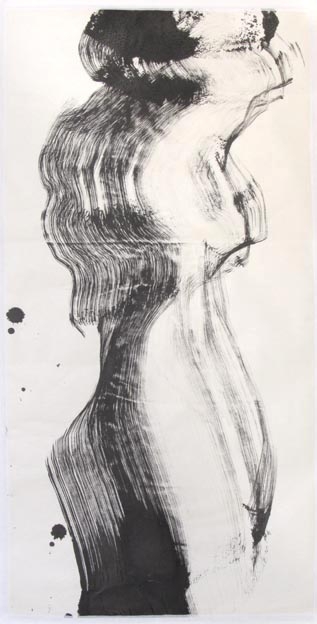
Wáng Bì 王弼 (226–249):
hànyǔ pīnyīn
和大怨必有餘怨。
hé dà yuàn bì yǒu yú yuàn 。
安可以為善。
ān kě yǐ wéi shàn 。
是以聖人執左契,而不責於人。
shì yǐ shèng rén zhí zuǒ qì ,ér bú zé yú rén 。
有德司契,無德司徹。
yǒu dé sī qì ,wú dé sī chè 。
天道無親常與善人。
tiān dào wú qīn cháng yǔ shàn rén 。
[ Rancor can be reconciled, but its cause cannot be undone.
[ Contracts were made concretely e.g., written on 'tally'-like bamboo sticks, the left side for the creditor, the right for the debtor. The sage, the 'holy man', and, ultimately, the ruler in the spirit of the Dào, can, if necessary, take over both sides by means of their unrestricted Dé and refuse to collect the claim.
[ In the higher sense, the ruler's contract is a 'Mandate of Heaven': to lead the world to naturalness and primordial communion, back to the roots, without favorites, but giving full of goodness.
Note: 莊子 Zhuāngzǐ (369-286 BC) in his 5th chapter Dé Chōng Fú 德充符 ('Signs of the Flourishing of Potency') gives extreme examples of "Character Satisfies the Tally" in this typical satirical form!
01-03:
Great grudge once appeased,
certainly there is a rest of resentment;
how could that accordingly
serve as 'make good' again?
Clemency and forgiveness overcome rancor, but its cause 'cannot be no more'!
01-03 "[Even after someone] has put aside a great rancor, there will necessarily be rancor left over.
By not being clear in the management of his [own part] of the contract, great rancor will be brought about [when the contractual obligations are not fulfilled by the other party].
[Even if,] once this [rancor] has come about, receptivity / power of comprehension {“receipt / capacity” – Wagner} is used to settle it*, the harm already done cannot be undone, that is why [the text says] 'there will necessarily be leftover resentments {rancor} [in oneself]'!
How can [such a procedure] be considered good? [It cannot]." [* Wáng Bì / Wagner].
04-07:
Therefore, wise men hold
the left side of contracts,
but not claiming from others.
With Inner Power,
you keep contracts,
without Inner Power
you stand on demands.
In order to erase the causes of rancor, the 'holy man' may, if necessary, take over both sides of the contract table, i.e. to renounce his legitimate claim - by the internal power of his unrestricted Dè.
04-05 "That is why the Sage holds on to the 'left contract' [which establishes the claim against a debtor and is presented for repayment] – [Holding on to] the 'left contract' blocks the basis on which resentments arise [by its not being presented for payment] – and does not claim payment from the other [contract partner]." [*].
06-07 "Thus he who has capacity pays attention to [his part of] the contract – A man with capacity [the Sage] is concerned [only] with his [part of the] contract. [Thus] he does not let a resentment arise and then claim payment from the other.** – while he who is without capacity pays attention to finding out." [*].
08-09:
"Heavenly Dào is impartial,
albeit giving constantly to good men."
08-09 "The Way of Heaven is without partiality. It constantly gives to the good people."***
Since enemies are never fully reconciled because they cannot be made good people, the holy man does not care if they sincerely reciprocate his gifts and good deeds.
He regards these as obligations which he has to fulfill, demands nothing from the others, and follows in this the Way of Heaven: that he gives preference to no one, but is always generous and benevolent towards good men." [** v. Strauß 1870 p 338].
____________________
* "This refers to Laozi 3.2: 'With regard to big and small, many and few [resentments], [he] reciprocates for the resentment by means of [his] receipt / capacity.'
Wang Bi's commentary: 'If there is a small resentment, it is not worth reciprocating. If it is a big resentment, then it is a case where All Under Heaven desires the execution [of the culprit].
[His] going along with what All Under Heaven agrees on is [meant by] receipt / capacity.'
The Sage, in other words, does not reciprocate." [*! = Wagner p. 497].
** "These two phrases were considered important enough by Wang Bi to be included in the Laozi's core program, as outlined in LZWZLL 2.44." [*!].
*** "The sparseness and partially bad transmission of the commentary in the zhang make an extrapolative reading well-nigh impossible." [*!].
[
80 - Simplify Your Life!
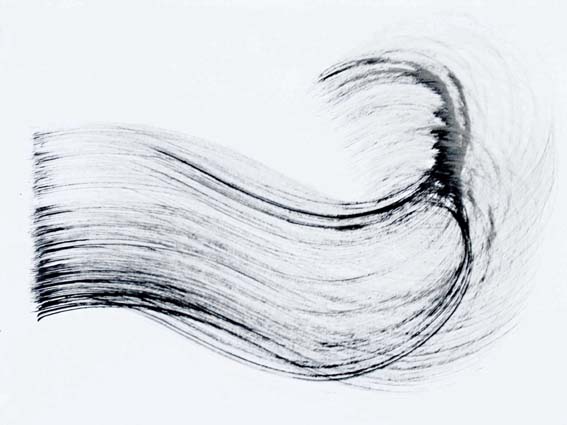
Wáng Bì 王弼 (226–249):
hànyǔ pīnyīn
小國寡民。
xiǎo guó guǎ mín 。
使有什伯之器而不用。
shǐ yǒu shí bó zhī qì ér bú yòng 。
使民重死而不遠徙。
shǐ mín zhòng sǐ ér bú yuǎn xǐ 。
雖有舟輿無所乘之。
suī yǒu zhōu yú wú suǒ chéng zhī 。
雖有甲兵無所陳之。
suī yǒu jiǎ bīng wú suǒ chén zhī 。
使民復結繩而用之。
shǐ mín fù jié shéng ér yòng zhī 。
甘其食、美其服、
gān qí shí 、měi qí fú 、
安其居、樂其俗。
ān qí jū 、lè qí sú 。
鄰國相望,雞犬之聲相聞。
lín guó xiàng wàng ,jī quǎn zhī shēng xiàng wén 。
民至老死不相往來。
mín zhì lǎo sǐ bú xiàng wǎng lái 。
[ The Daoist Utopia (past-oriented, not future-oriented!) of a simple, naturally living, happy little people, living in small, manageable units according to the rules of wisdom which originate from Dào and Dé! (ch. 31, 72, 74).
[ Given a mild form of government, no one needs to wander into the distance, since the idyllic home is sufficient, without excessive addiction to increasing one's life and experience (which would, then, make one fear death even more).
[ Defensive weapons for cases of necessity remain unused, because the ruler does not need to gain fame thanks to wars of aggression.
[ The return to simple customs ('the knotting of strings, "Quippu“, also for writing'), protects through Holy simplicity against the decay of morals. Relatively self-sufficient villages with satisfied people fulfill the Daoist goal of government.
[ Cf. partly quoted in 莊子 Zhuāngzǐ (369-286 BC), ch. 10: Utopias are not (completely) to realisable, but the idea alone can provide strength and a way:
Laozi displayed an ideal image, not "... so that it can be realised, but so that it may work as a force to prevent the technical pursuit of perfection from straying too far from nature." [Wilhelm 1928 p. 36].
01-11:
Smaller countries, fewer inhabitants!
Let them have tens or hundreds of tools,
yet not need them.
Let people take death seriously,
and not ramble far.
Although having boats and carriages:
without inducement to use them,
although having armour and weapons:
without cause to display them.
Let people return
to knotting cords,
and use them, as well.
01 "If, though the state were small and furthermore the people few, it would be possible to bring about a return to [the time in] antiquity [when order was established by 'knotted cords'], how much more would this be the case were the state big and the people numerous? That is why [the text] discusses [the return to antiquity] by taking the small state [as the example]." [*Wáng Bì / Wagner].
02-03 "This means: If people could already be induced although they possess [military] devices [to be collectively used by] ten or a hundred soldiers, not to make use of them at all, what deficiency would they then [still] be worried about? [None]." [*].
04-05 "The people could be induced to consider death important and not travel far.
[That is] if the people could be induced to treasure only their persons and not crave goods, they would then each [as the Laozi says further down] 'be content in their places,' 'consider death [i.e. their life!] important and not travel far.'" [*].
06-07 "[That is to say if they could be induced] although they had ships and carriages, absolutely not to board them." [*].
08-09 "Although they had the armor, absolutely not to field it." [*].
10-11 "[In short] if the people could be induced to return to the knotted cords [and according to Xici 8.3.a7 'in high antiquity knotted cords [were used] to establish order' {see above!}] and make use of these, this would be the epitome of the highest social order!" [*].
Note: Wang Bi undoubtedly assumed that the Laozi was referring to this passage in Xici. [Wagner p. 498].
12-15:
Relishable be their food,
beautiful their clothing,
peaceful their dwelling,
joyful their customs.
12-15 "People each would then enjoy their food and find pleasure in their clothing, their [local] customs and be content in their place." [*].
"A life is lived most fully in the immediacy and concreteness of ordinary experience. ...
Whatever the temptations to wealth and grandeur that lure us away from these relationships [that locate us in a specific time and place], such distractions from what we really are serve only to diminish our opportunities for consummate experience." [Ames & Hall p. 203].
16-19:
Neighboring communities
may see each other,
roosters' and dogs' sounds
can mutually be heard,
yet people would reach
old age and death,
without ever having gone
to visit each other.
16-19 "And,
[ [although] neighboring states would be in sight of each other
[ and could hear the sounds of each others' cocks and dogs,
[ the people until their old age and death, would never communicate with each other [through either trade or warfare].
[ They would have nothing they desire or crave." [*].
[
81 - True Words
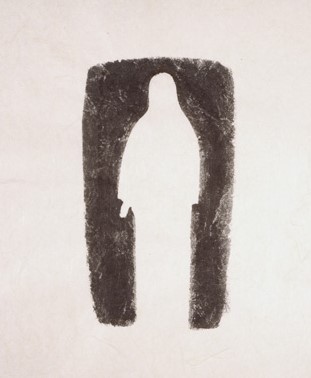
Wáng Bì 王弼 (226–249):
hànyǔ pīnyīn
信言不美。美言不信。
xìn yán bú měi 。měi yán bú xìn 。
善者不辯。辯者不善。
shàn zhě bú biàn 。biàn zhě bú shàn 。
知者不博。博者不知。
zhī zhě bú bó 。bó zhě bú zhī 。
聖人不積。既以為人己愈有。
shèng rén bú jī 。jì yǐ wéi rén jǐ yù yǒu 。
既以與人己愈多。
jì yǐ yǔ rén jǐ yù duō 。
天之道利而不害。
tiān zhī dào lì ér bú hài 。
聖人之道為而不爭。
shèng rén zhī dào wéi ér bú zhēng 。
At the end, the 'Old Master', 老子 Lǎo Zĭ himself, sums up three elementary traps in human thought in the form of three elegant short paradoxes:
[ to contaminate truth by pleasing adornment,
[ to lose the simple truth by quantity in dispute,
[ to sacrifice depth of cognition to the breadth of mere knowledge.
Not deluded by all this, giving, instead of pointless accumulation, is rather the focus of life in Dào and Dé: following the way of heaven:
do good, do not harm,
do create, do not compete.
01-02:
True words are not beautiful,
beautiful words are not true.
01-02 "Credible words are not beautified. The essential is in the [unadorned] substance.
Beautified words are not credible." [* Wáng Bì / Wagner].
True words are not sweet, lovely, pleasing, pleasant – pleasing words are not true.
信 xìn loyalty, trust: a behavior-oriented basic word in Chinese ethics, decisive also for the relationship between ruler and people (s. also ch. 08, 17, 21, 38, 49, 63).
03-06:
Good ones do not argue,
arguing ones are not good;
knowing ones are not learned,
learned ones are not knowing.
03-04 "He who is good, does not talk factitiously, he who talks factitiously, is not good.
“He who is good speaks the truth, and the consciousness that it (the truth) does not impress people cannot bring him cunningly and sophistically to tell people what they want to hear.
Rather, he who does this is not morally good, he lacks the serious moral foundation." [** v. Strauß 1870 p. 344].
05-06 "Someone [truly] knowledgeable is not broadly [learned]; someone broadly [learned] is not [truly] knowledgeable. The root is in the Unadorned." [*].
"Whoever knows in the sense of cognition is not a know-it-all, and whoever is a know-it-all does not know in the sense of cognition."
博 bó: "One who has seen and heard much, but not known.
Such a person, whose knowledge only extends into the breadth and not into the depths of true knowledge, we call 'know-it-all'." 河上公 Héshàng Gōng [**].
07-09:
Wise men do not hoard:
Thus, by doing for others,
they themselves have the more;
thus, by giving to others,
they themselves have the more in excess.
07-09 By 'amassing' are meant primarily spiritual-moral goods, which one "... should not pile up as a dead treasure, but only truly possesses, when one uses them for others, and which only become a lot or more (tō), when one gives them to others." [**].
[ Someone who really goes, does not go into quantity. ‘The absolute is in the One.’
Someone who puts emphasis on quantity does no good. That is why the Sage does not amass.
[ "Without having self-interest he has [things] spontaneously; he does nothing but give to the good and just puts himself into the service of other entities.
Thus because of acting for others, he has more himself. That is, he is being honored by the other entities.
Thus by giving to others, there will be more with him. That is, he is the one to whom the other entities submit themselves." [*].
[ "A wise person not only wants to know or only to act, he wants to realize himself as a spiritual being by combining knowledge and action.
That is why he is not concerned with accumulating possessions or prestige, since this is only external.
Rather he spends and gives himself away, and thereby increases himself in his inner substance, which ultimately is all that matters." [Braunsperger, p. 244-245]
10-11:
Heaven's Way:
to benefit and not to harm,
Wise men's Way:
to create and not to argue (compete).
10-11 "It is the Way of Heaven to be beneficial and not harmful. In its movement it constantly generates {creates} and perfects [and never harms] them [the entities]." [*].
It is the Way of the Sage to act, but not to quarrel. He adapts to the usefulness of Heaven and will not hurt other [entities].
"The Heaven's Taò (Taò in Heaven)
[ does well, and does no damage; the Taò (in the holy man) does, and does not quarrel.
[ If doing good and doing no harm is attributed to Heaven, then the action of the holy man points back to this in the following parallel theorem, because, as Héshàng Gōng recalls, what Heaven does is the saint's role model and law.
[ He does not dispute anything with anyone, for his polemic and apologetics consists only in doing and being.
[ The purpose of this statement is probably that Laò-tsè ... also wanted to have acted as the holy man does, and in the end he wanted to suggest to the reader: Go and do the same." [**].
[
Literature:
Dàodéjīng 道德經 ~ -400) by → 老子 Lǎozĭ.
Fù Yì 傅奕 (555−639) 574 / < -202.
Guōdiàn 郭店 ~ -300.
Hán Fēizǐ 韓非子 (-280-233) ch. 20+21.
Héshàng Gōng 河上公 > 100 .
Kǒng fū zǐ 孔夫子 (Confucius)
Lǎozĭ 老子~ -400: Dàodéjīng 道德經.
Lièzǐ 列子 ~ -440-360, ~ -350.
Lún yǔ 論語 = Analects by 孔夫子 Kǒng fū zǐ (Confucius)
Mǎwángduī 馬王堆 A < -206.
Mǎwángduī 馬王堆 B < -179.
Wáng Bì 王弼 (226–249) < 250.
Yì Jīng 易經 (Book of Change) .
Zhuāngzǐ 莊子 (-369-286) .
=
道德經 Dàodéjīng by 老子 Lǎozĭ.
傅奕 Fù Yì (-554−639 +574 / < -202 .
郭店 Guōdiàn ~ -300.
韓非子 Hán Fēizǐ (-280-233).
河上公 Héshàng Gōng > 100 .
孔夫子 Kǒng fū zǐ (Confucius)
老子 Lǎozĭ ~ -400: Dàodéjīng 道德經.
列子 Lièzǐ ~ -440-360 ~ -350.
論語 Lún yǔ = Analects 孔夫子 Kǒng fū zǐ (Confucius)
馬王堆 Mǎwángduī A < -206.
馬王堆 Mǎwángduī B < -179.
王弼 Wáng Bì (226–249) < 250.
易經 Yì Jīng (Book of Change) .
莊子 Zhuāngzǐ (-369-286) .
Abel-Rémusat, Jean-Pierre (P. VII des Mémoires de l'Académie des inscriptions et belles lettres), Imprimerie royale, Paris 1823. B) Le livre des récompenses et des peines, ouvrage taoïstes traduit du chinois avec der notes et des éclaircissements. Paris: A. – A. Renouard, 1816; Paris: Librairie Orientaliste Paul Geuthner, 1939 / 2 (Les Joyaux de l‘Orient, tome III) B) Mémoire sur la vie et les ouvrages de Lao-Tseu, philosophe Chinois du VI. siècle avant notre ère, qui a professé les opinions communément attribuées à Pythagore, à Platon et à leurs disciples. a) Vortrag 15. VI. 1823 in: Académie des inscriptions et belles lettres, tom. VII 1824. (Denkschriften) [auch: Rémusat's Mèlanges asiatiques, Sèrie I. , 1825-26].
Ames, Roger T. & David L. Hall Dao de Jing. A Philosophical Translation. “Making this life significant”. Featuring the recently discovered bamboo texts. Translated and with commentary. New York: A Ballantine Book. The Random House Publishing Group, (book + CD), Ballantine Books, 2003. 256 p. & Audio. .
Braunsperger Hubert 1992 Innere Geborgenheit durch Tao Te King. Dialog mit Laotse. Verlag der Österreichischen Staatsdruckerei, Wien. 245 P.
Chan, Wing-tsit Chu Hsi's appraisal of Lao Tzu. In: Philosophy East and West, 25, 29, 1975, 131-144.
Chang,Tsungtung, 1982 Metaphysik, Erkenntnis und Praktische Philosophie im Chuang-Tzu. Zur Neu-Interpretation und systematischen Darstellung der klassischen chinesischen Philosophie Gebundene Ausgabe. Verlag: Vittorio Klostermann (1982).
Chan, Wing-tsit, The Way of Lao Tzu. 1963. [Lao Tzu], übersetzt von Günther Schwarz aus: Encyclopedia of Philosophy, New York, 1967 (p. 107-111).
Chen, Ellen Tao, Nature, Man: A Study of the Key Ideas in the Tao Te Ching, PhD dissertation, Fordham University, 1966.
Debon, Günther (1921-2005) Lao-Tse. Tao-Tê-King. Das Heilige Buch vom Weg und von der Tugend. Philipp Reclam jun. , Stuttgart 1961.
Duyvendak, Jan [Julius Lodewijk] Tao te ching. The Book of the Way and its Virtue. The Wisdom of the East Series. London: John Murray, 1954 → Lao Tzu, Tau-Te-Tsjing, Het boek van Weg en Deugd … Arnhem: 1942; Amsterdam: Uitgeverij De Driehoek, 1980: → Tao tö king, le livre de la voie et de la vertu: texte chinois tabli et traduit avec des notes critiques et une introduction. Paris: Adrien-Maisonneuve, 1953 ff.
Heidegger in "The Thing" Lǎozĭ's 11, [Philosophy of Technology, 2th lecture].
Kalinke Viktor Laozi. Daodejing. Band 1 : Eine Wiedergabe seines Deutungsspektrums. Text und Übersetzung / Zeichenlexikon Edition Erata, Leipzig 1999. 121 p. Band 2 Eine Erkundung seines Deutungsspektrums. Anmerkungen und Kommentare; Edition Erata, Leipzig 1999. 134 p. Band 3 Nichtstun als Handlungsmaxime. Zur Rationalität des Mystischen im Laozi, Edition Erata, Leipzig 2011, 204 p. .
Karlgren, Bernhard The poetical parts in Lao-tsϊ. In: Kina Antiken. Göteborgs högskolas arskrift, 38, 3, 1932, 1–45 Göteborg: Elander, 1932. (schwedisch); Svenska Bokförlaget, 1964 → Poesie des Laozi: wohl nur Kapitel 31, 42, 48, 49, 50, 61, 74, 75 im Original ungereimt. / poetry of the daodejing: in the original text, only chapters 31, 42, 48, 49, 50, 61, 74, 75 might have been unrhymed.
Legge, James The Tâo Teh King. The writings of Kwang-Tze. [Translation of Lao Tzu and Chuang Tzu] In: Max Muller, ed. The Sacred Books of the East. 1891; The Texts of Tâoism, Part 1. The Tao Teh King. The Texts of Tâoism. Part 2. The writings of Kwang-Tze, Books I-XVII. The Sacred Books of the East, vol. 39. Oxford: The Clarendon Press, 1891, Oxford University Press, 1927; New York: The Julian press, 1959 et.al.
Lin Yutang Laotse. (Übs. Gerolf Coudenhove) Fischer Bücherei Frankfurt/M., Hamburg. 1955, 216 p. .
Möller, Hans-Georg Laotse, Tao Te King. Die Seidentexte von Mawangdui. 500 Jahre älter als andere Ausgaben. Fischer Taschenbuch Verlag, Frankfurt am Main. 1995 236 p.
Schwarz Ernst Laudse. DAUDEDSCHING. Aus dem Chinesischen übersetzt und herausgegeben von Ernst Schwarz. Philipp Reclam jun., Leipzig 1970. 226 p.; Laudse Daudedsching (Lao-tse Tao-te-king). Aus dem Chinesischen übertragen und mit einer Einführung, Anmerkungen sowie einem Literaturverzeichnis herausgegeben von Ernst Schwarz Deutscher Taschenbuch Verlag GmbH & Co. KG, München 1980.
Simon, Rainald Laozi Daodejing Das Buch vom Weg und seiner Wirkung. Philip Reclam jun. GmbH & Co., Stuttgart. 2009, 319 p.
Julien, Stanislas Le Livre de la Voie et de la Vertu. Par le Philosophe Lao-Tseu. .
(auch: Lao-Tseu Tao-Te-King, Le livre de la voie et de la vertu; traduit en français, et publié avec le texte chinois et un commentaire prepétuel. Paris: Imprimerie Royale), 1842, 304 S. [& Le livre des récompenses et des peines, en chinois et en français, accompagné de 400 légendes, anecdotes et histoires, qui font connaître les doctrines, les croyances et les mœurs de la secte des Tao-ssés. Paris: Crapelet-Barrois, 1835].
Ulenbrook Jan [Karl Gerhard Meier] LAU DSE. DAU DÖ DJING Das Buch vom rechten Wege und von der rechten Gesinnung. Ins Deutsche übertragen und mit einer wörtlichen Übersetzung,einer Einleitung und Erläuterungen versehen von Jan Ulenbrook. Carl Schünemann Verlag, Bremen. 1962, 248 p.
Von Strauß [und Torney], Victor LAO-TSE'S TAO TE KING. Aus dem Chinesischen ins Deutsche übersetzt, eingeleitet und commentirt von Victor von Strauß. Verlag von Friedrich Fleischer, Leipzig 1870. 357 p.
Wagner, Rudolf G. A Chinese Reading of the Daodejing: Wang Bi's Commentary on the Laozi with Critical Text and Translation. (SUN series in Chinese Philosophy and Culture. David L. Hall & Roger T. Ames, editors) Albany: SUNY Press (State University of New York Press), 2003, 532 p. B) Language, Ontology, and Political Philosophy in China: Wang Bi 's Scholarly Exploration of the Dark (Xuanxue). (SUN series in Chinese Philosophy and Culture. David L. Hall & Roger T. Ames, editors) Albany: SUNY Press (State University of New York Press), 2003, 261 p. C) The Craft of a Chinese Commentator: Wang Bi on the Laozi. (SUN series in Chinese Philosophy and Culture. David L. Hall & Roger T. Ames, editors) Albany: SUNY Press (State University of New York Press), 2000, 384 p. .
Waley, Arthur The Way and Its Power: A Study of the Tao Tê Ching and Its Place in Chinese Thought. With Introduction, Commentaries / Full Appendices and Notes. London: George Allen & Unwin Ltd. 1934, 1942 et.al. 262 S.; N. Y. Macmillan, 1934; Boston, MA: Houghton-Mifflin, 1935, 1942.
Wáng Bì → Wagner.
Wilhelm, Richard Laotse, Tao Te King, Das Buch des Alten vom Sinn und Leben. Aus dem Chinesischen verdeutscht und erläutert von Richard Wilhelm. Eugen Diederichs Verlag, Jena. 120 p. .
Wing R. L. Der Weg und die Kraft. Laotses Tao-te-king als Orakel und Weisheitsbuch. Mit Kalligraphien von Tse Leong Toy, Lam-po Leong und Johanna Yeung. Illustrationen von Scott Bartlett. Droemer Knaur, München. 1987.
Wittgenstein Ludwig: Logisch-philosophische Abhandlung, W. Ostwald (Hrsg.), Annalen der Naturphilosophie, Band 14, 1921, p. 185–262.
Wohlfart, Günter Der Philosophische Daoismus. Philosophische Untersuchungen zu Grundbegriffen und komparative Studien mit besonderer Berücksichtigung des Laozi (Lao-tse). (Reihe für Asiatische und Komparative Philosophie, Bd. 5); Köln: Edition Chora, 2001, 212 p.
© dr. hilmar alquiros, 2017+2022